The NFC was founded by Prof. Eva Kushner, President of Victoria University, in September of 1988 and officially inaugurated in September of 1989 with the participation and personal approval of Prof. Northrop Frye, who was then Chancellor of Victoria University. It had a double vocation:
- to encourage and sustain research on the writings and thoughts of Northrop Frye, and
- to encourage and sustain humanities research projects compatible with the thought of Northrop Frye.
After a brief period of inactivity, the NFC was reconstituted by President Paul Gooch and Principal Angela Esterhammer and came under the direction of Professor Robert Davidson.
2024-2025 Events
Sept. 9, 2024 | Literary Diasporas & Colonial Crisis: Spain, Cuba & the United States | Catherine Davies
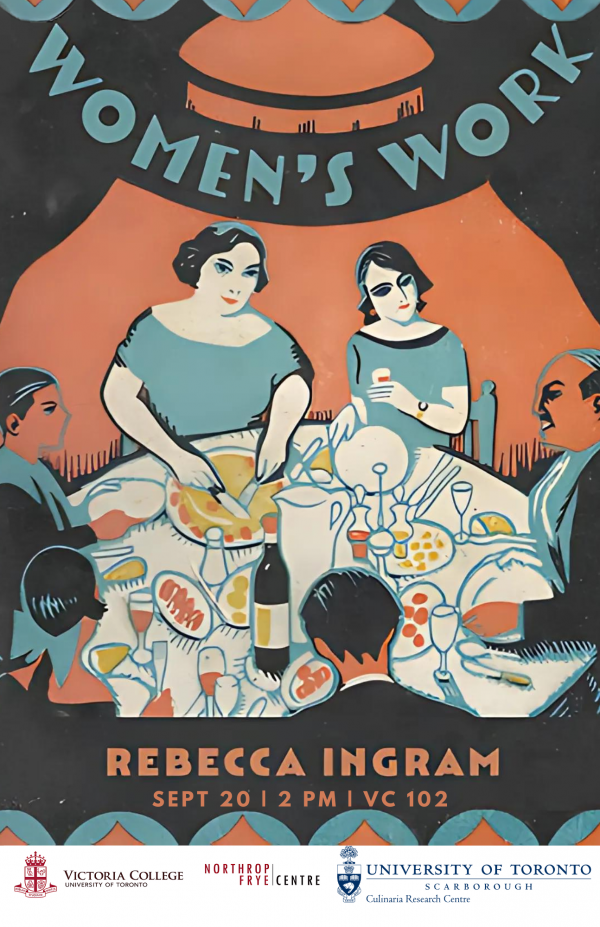
About the speaker
Catherine Davies is Professor Emerita and the Director of the Institute of Modern Languages Research at the University of London. She is the co-editor of Transnational Spanish Studies (2020), and has contributed chapters to a number of edited collections, including The Oxford Handbook on Gender, War and the Western World since 1600 (2018), Spain in the Nineteenth Century: New Essays on Experiences of Culture and Society (2018), Rethinking Past and Present in Cuba: Essays in Memory of Alastair Hennessy (2018), and The Oxford Research Encyclopedia of Latin American History (2017), among others. Her research interests are in 19th- and 20th-century Spanish and Spanish American history, culture and literature; the wars of Independence in Spanish American history and literature; Cuban history and literature; Abolitionism in Cuba and Puerto Rico; and literature and culture in Argentina.
Lecture presented in collaboration with the Centre for Comparative Literature.
Sept. 20, 2024 | Women's Work: How Culinary Cultures Shaped Modern Spain | Rebecca Ingram

About the talk
Famous chefs, Michelin stars, culinary techniques and gastronomical accolades attract moneyed tourists to Spain from all over the world. Even with this global attention, we know little about how Spanish cooking became a litmus test for demonstrating Spain's modernity and, relatedly, the roles ascribed to the modern Spanish women responsible for daily cooking.
Ingram will present her new book Women's Work and discuss how efforts to articulate a new, modern Spain infiltrated multiple genres and media, including those about food. Culinary writing engaged debates about women's roles in Spanish society and reached women at the site of much of their daily labor--the kitchen--and shaped thinking about their roles in modernizing Spain.
About the speaker
Rebecca Ingram is Professor of Spanish Languages, Cultures and Literatures, Honors Faculty Liaison, and the Interim Director of Interdisciplinary Humanities at the University of San Diego. Professor Ingram’s research involves food cultural studies in relation to Spain. She is the author of Women’s Work: How Culinary Cultures Shaped Modern Spain (Vanderbilt, 2022). Her volume Digestible Governance: Gastrocracy and Spanish Foodways, co-edited with Eugenia Afinoguénova and Lara Anderson, will be published later in 2024. In 2020, the Bulletin of Spanish Studies published the special issue she and Anderson edited titled “Transhispanic Food Cultural Studies,” the first extended study of food as a cultural text within the broader fields of Iberian and Latin American Cultural Studies.
Lecture presented in collaboration with Culinaria.
Sept. 24, 2024 | Foreign Bodies, Foreign Minds | Dorothea Olkowski
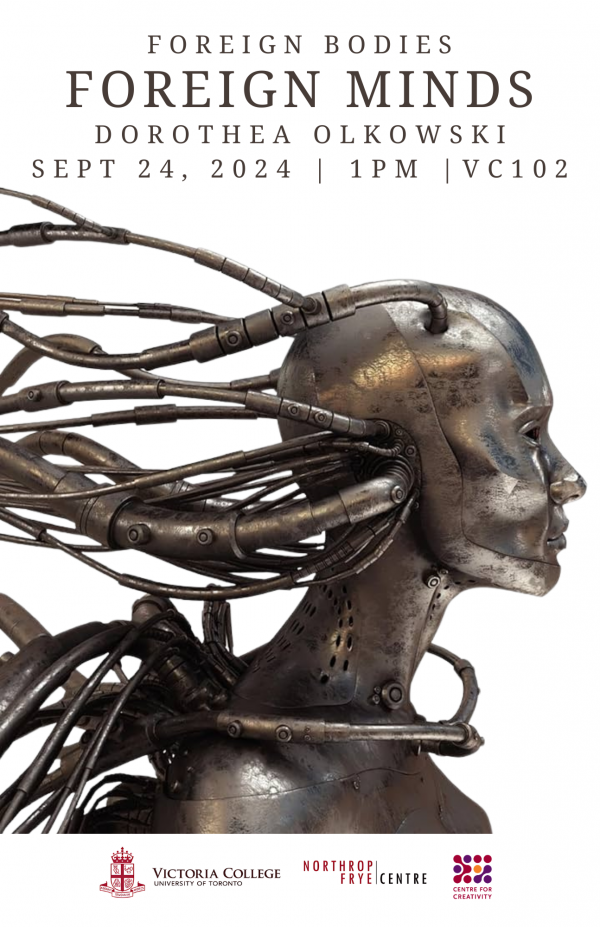
About the talk
One of the truly astounding things about postmodernism is that, whatever it became in the hands of less talented enthusiasts, it originated as more or less what many of its recent practitioners say it is not, that is, it began as a formal system or a series of formal systems. Formal systems are probably not well-known or understood outside of mathematics, computer and natural sciences, but they are pervasive across social sciences and humanities as well. This paper will examine the two sides of this question. On the one side, what takes place when a society only speaks with propositions that are determined to be either rationally or factually true, and on the other side, what happens when language is fully metaphorical?
About the speaker
Dorothea Olkwoski is University of Colorado Distinguished Professor of Philosophy at CU Colorado Springs. She is the Director of Cognitive Studies, former Director of Humanities, former Chair of Philosophy, and former founding Director of Women's Studies. Olkowski is the author of more than one hundred articles and fourteen books, including her most recent publication, Deleuze, Bergson, and Merleau-Ponty, The Logic and Pragmatics of Affect, Perception, and Creation (Indiana University Press, 2021).
Lecture presented in collaboration with the Centre for Creativity.
Sept. 26, 2024 | NFC Distinguished Lecture: Early Modern AI | William Egginton
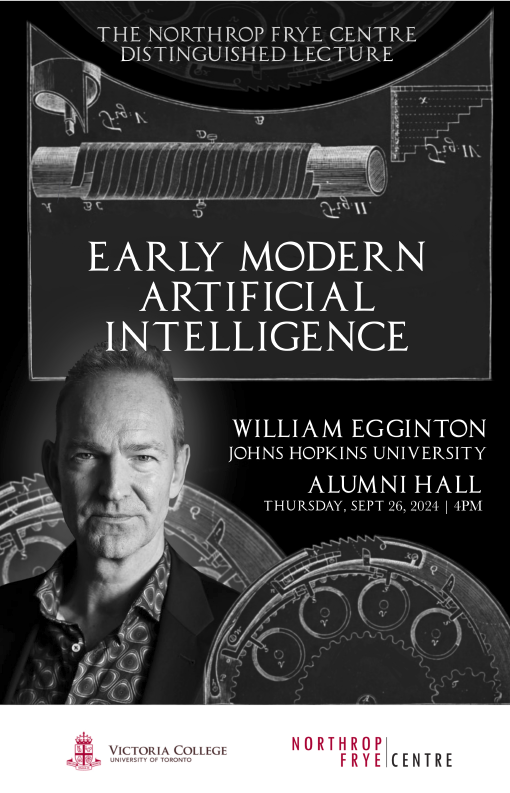
About the talk
As the world grapples with the promises and threats of AI, at the extreme ends of both wish-fulfillment and nightmare stands a common premise: the machine that not only follows instructions, but also chooses, invents, designs, and controls.
For some commentators, of course, we have already crossed that threshold. For others, we never will. While such disputes may entail different interpretations of today’s technological capacities, they are far more influenced by a lack of consensus concerning what we mean when we talk about human intelligence. And this is a debate that spans millennia.
While a thorough archeology of concepts like mind, spirit, soul—what is implicitly conjured by the promise or specter of thinking machines—would start at least with the ancient Greeks, early modern Europe provides us with a key moment and some vital protagonists in the story. In this lecture, William Egginton delves into a cross-cultural, transmedia conversation—involving thinkers and writers such as Llull, Cervantes, Descartes, Leibniz, and Kant—to unearth some of the basic problems and unspoken assumptions of today’s AI catastrophists and apologists alike.
About the speaker
William Egginton is the Decker Professor in the Humanities, chair of the Department of Modern Languages and Literatures, and Director of the Alexander Grass Humanities Institute at Johns Hopkins University. He is the author of multiple books, including How the World Became a Stage (2003), Perversity and Ethics (2006), A Wrinkle in History (2007), The Philosopher’s Desire (2007), The Theater of Truth (2010), In Defense of Religious Moderation (2011), The Man Who Invented Fiction (2016), The Splintering of the American Mind (2018), and The Rigor of Angels (2023), which was named to several best of 2023 lists, including The New York Times and The New Yorker. He is co-author with David Castillo of Medialogies: Reading Reality in the Age of Inflationary Media (2017) and What Would Cervantes Do? Navigating Post-Truth with Spanish Baroque Literature (2022). His latest book, on the philosophical, psychoanalytic, and surrealist dimensions of the work of Chilean director Alejandro Jodorowsky, was published in Jan. 2024.
Oct. 17, 2024 | The Archival Turn: Thailand’s Rise as the Neo-Global Capital for ‘Sex-Change’ Surgery in the Post-Cold War Era | Chanathip (Esther) Suwannanon
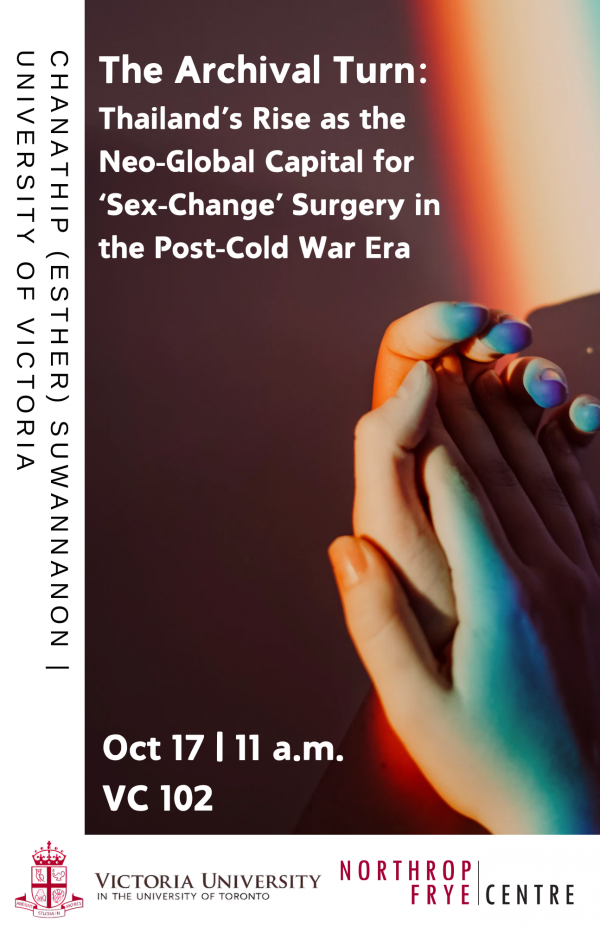
About the talk
Though researchers on the development of gender reassignment surgery (GRS) in Thailand come from a diverse variety of fields, they share the same curiosity on Thailand’s contemporary status as the surgical center for trans medical operations, and they largely focus on the same period of the 1970s to 2010s. Scholars traditionally mark the 1970s as a landmark decade in Thai medical history as Thai doctors began performing vaginoplasty in the country. Due to the many medical papers published by the pioneering Thai GRS surgeon Dr. Preecha Tiewtranon (2001; 2004; 2014; 2015) and his many interviews with scholars and the popular press (Sinhaneti and Pullawan, 2008; Aizura, 2011; Farber, 2019) in which he denotes 1975 as the beginning of Thai doctors’ engagement with trans medicine, scholars have adopted his chronology. Yet, this starting point contradicts archival sources as it obscures the period that Thai doctors began to medically study kathoey (trans feminine) people, and it obfuscates the experimental stage of related-genital surgery in Thailand.
Esther's presentation will re-narrate the history of “sex-change” surgery in Thailand through exploration of Thai archival records from 1951-1975. In doing so, she will make three historiographic interventions: (1) re-narrativize the 1970s decade as a starting period for sex-change surgery in Thailand, (2) emphasize how kathoey were studied from a Western medical perspective, and how Thai medical scientists attempted to embed this paradigm in Thai society, (3) demonstrate how post-war American soft power influenced the evolution of trans surgery in Thailand from earlier intersex-related surgical practices. She will close with some preliminary historical conclusions on the formation of trans medicine in Thailand based off of cross-continental connections between Thai and American doctors.
About the speaker
Chanathip (Esther) Suwannanon is a Thai kathoey trans woman scholar. At present, she is a PhD student in Interdisciplinary Studies (INTD) at the University of Victoria. Her dissertation blends oral histories with older Thai kathoeys with medical archives to trace the history of trans medicine in Thailand. Her project focuses on kathoey history, trans medical technology and Thai history from the 1950s to 1990s.
Oct. 22, 2024 | Making Soils Visible | Saskia Cornes
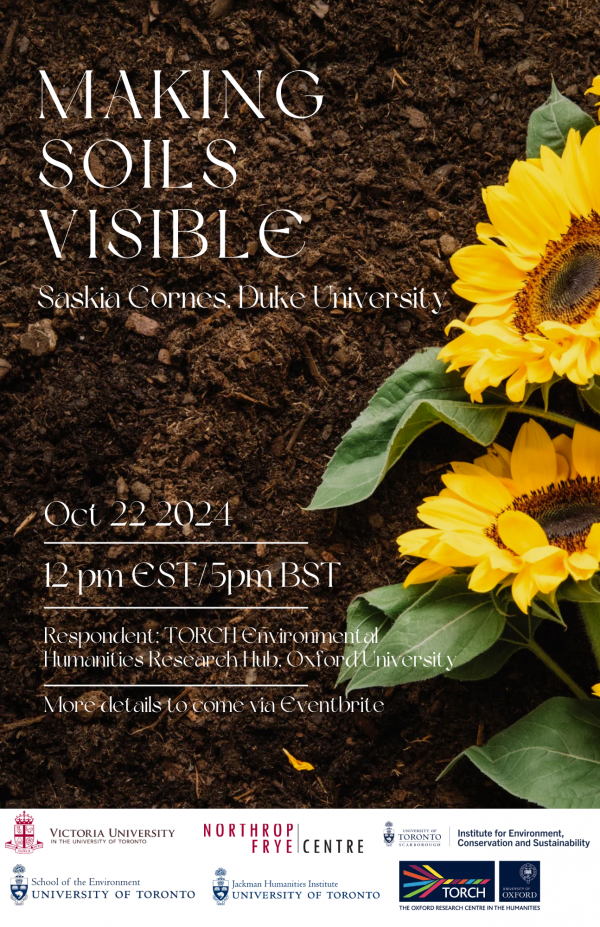
About the speaker
Dr. Saskia Cornes is an assistant professor of the practice at the John Hope Franklin Humanities Institute at Duke University and Director of the Duke Campus Farm. She holds a PhD in English and Comparative Literature from Columbia University, where her work focused on the emergence of private property as a guiding logic in the culture and agriculture of 17th century England, and as a key point of origin for the climate crisis. A farmer by vocation, she learned regenerative agriculture through a range of on-farm apprenticeships, and through post-graduate study at the Center for Agroecology at UC Santa Cruz. In her work now, she weaves teaching, farming and more traditional forms of research together to rework our relationship to food, and to the land and people that grow it.
Nov. 6, 2024 | Over My Dead Body: Formula and Poetry in Late Medieval Tomb Inscriptions | Bard Swallow
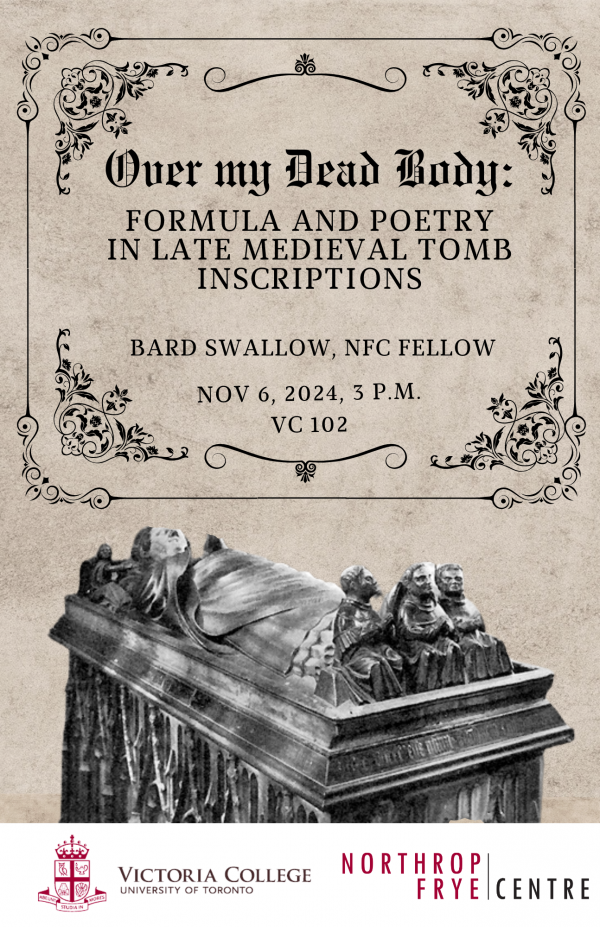
Over my Dead Body: Formula and Poetry in Late Medieval Manuscript
About the talk
When choosing an inscription to place on a tomb, whether one's own or that of a loved one, what information is most important to include? Why choose to have the inscription be a poem? Why choose one language over another? Medieval poetry usually survives in manuscript form, but another significant source of poetry is tomb inscriptions. This paper will consider poems inscribed on tombs in late medieval England and the composition choices behind them, especially the choice of language. It will also discuss the relationship of these poems with formulas used in prose inscriptions and the differences between tomb poetry in England as opposed to France.
About the speaker
Bard Swallow (they/them) is a PhD candidate at the Centre for Medieval Studies with a collaborative specialization in Book History and Print Culture. Their dissertation studies the choices made by poets in the multilingual environment of fourteenth-century England: does choosing to write in Latin give poets access to poetic forms and formulas that have no English or French analogues? Bard’s research interests more broadly include manuscript anthologies and how compilers chose their contents, (multilingual) wordplay as used in poetry, and medievalism in modern media—especially video games. Their research has appeared in the Journal of Medieval Latin and Games and Culture and is forthcoming in the Journal of the Early Book Society.
Nov. 6, 2024 | Faculty Reading Series: John Reibetanz and Kate Cayley
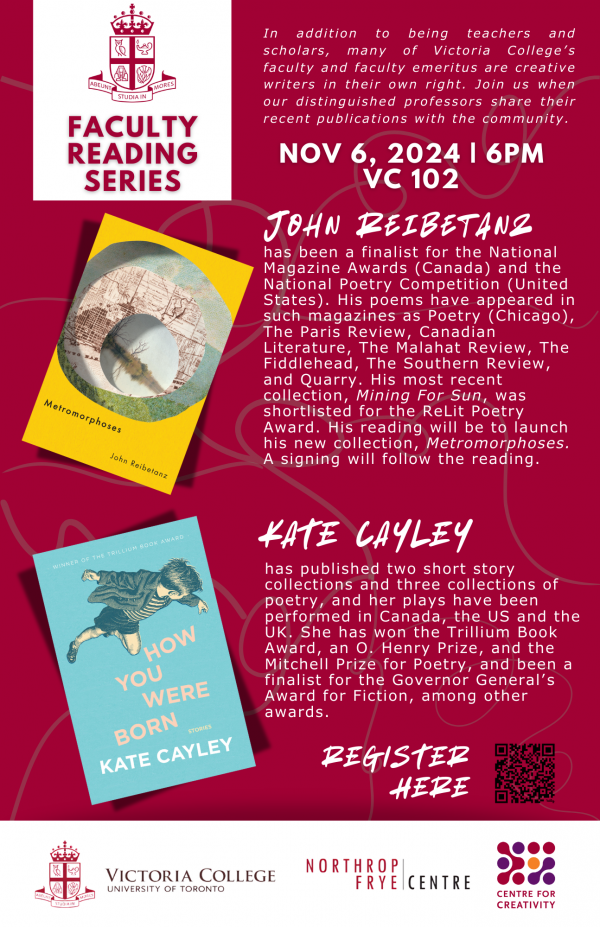
John Reibetanz has been a finalist for the National Magazine Awards (Canada) and the National Poetry Competition (United States). His poems have appeared in such magazines as Poetry (Chicago), The Paris Review, Canadian Literature, The Malahat Review, The Fiddlehead, The Southern Review, and Quarry. His most recent collection, Mining For Sun, was shortlisted for the ReLit Poetry Award. His reading will be to launch his new collection, Metromorphoses, and a signing will follow.
Kate Cayley has published two short story collections and three collections of poetry, and her plays have been performed in Canada, the US and the UK. She has won the Trillium Book Award, an O. Henry Prize, and the Mitchell Prize for Poetry, and been a finalist for the Governor General’s Award for Fiction, among other awards.
Hosted by Prof. Adam Sol in collaboration with the Centre for Creativity.
Nov. 8, 2024 | Donny Liszt; or Franz Hathaway? | I. Augustus Durham
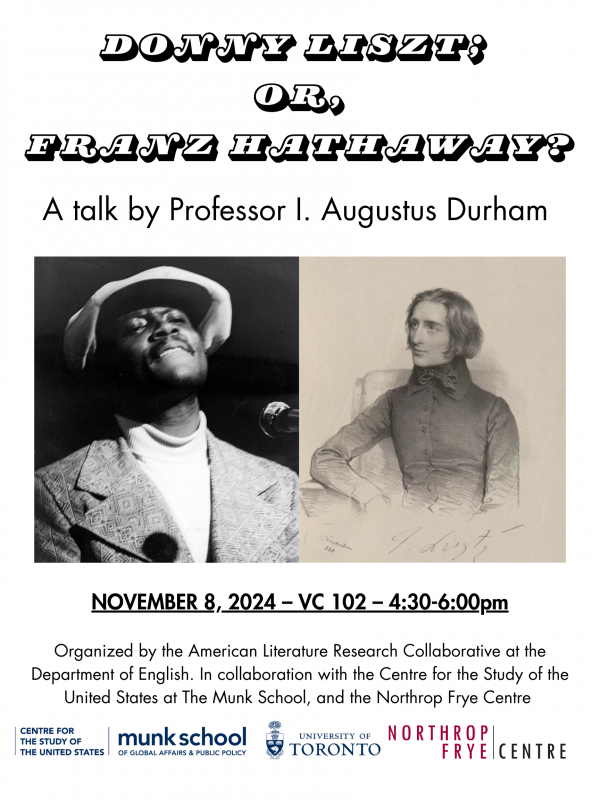
About the speaker...
I. Augustus Durham is Assistant Professor of English at the University of Toronto. A former President’s Postdoctoral Fellow in English at the University of Maryland, College Park, he worked in New York prior to his arrival at Toronto. His research interests span numerous centuries to account for the emergence, presence, and meaning of blackness in modernity. Durham’s first monograph, Stay Black and Die: On Melancholy and Genius (Duke University Press), takes up such ideas to examine the relationship between black mothers and sons whereby through abstraction, the black feminine/maternal maintains a psychoanalytic and affective role in the making of melancholy and genius in the black masculine. He has published work in Syndicate, Black Camera: An International Film Journal, Palimpsest: A Journal on Women, Gender, and the Black International, and Journal of Religion and Health; and an essay on the film Moonlight for an edited collection on Tarell Alvin McCraney. Durham is currently working on three new projects regarding a singer, a calendar year and (re)invention.
Nov. 16, 2024 | Materiality, Memory, and the Military | A Symposium by Cathie Sutton and the Material Culture and Semiotics Students

In the dark and wet conditions of the WWI trenches objects became imbued with memories and stories, taking on larger-than-life meanings and acting as a mediator between wartime and civil life.
After the First World War, student veterans returned to University of Toronto and responded to the trauma of war through the writing and staging of a memory play. The cast members and writers all contributed their uniforms, gear, and personal equipment to the production. The collective experience of war was illustrated through the material culture that was brought back and presented in the production.
This symposium discusses the use of war souvenirs, equipment, paraphernalia, museum pieces and curiosities to materialize memory and to make sense of an extraordinary historical moment. How did the war’s material objects impact the making of modernism? What role did objects that came out of the trenches and conflict have on nation-building and identity formation in post WWI Canada?
About the keynote
Keynote address, 10-11 a.m., by Dr. Sarafina Pagnotta | From "From Somewhere in France" to Somewhere in the Collections: Recovering Soldier Art at the Canadian War Museum
Dr. Sarafina Pagnotta completed her PhD in Public History at Carleton University, Ottawa, ON, in September 2024. Her research focuses on ‘unofficial’ artworks made by Canadians (soldiers, civilians, and prisoners of war, among others) during the First and Second World Wars both on and behind the front lines. Her goals are: to find ways to engage with these works as war art, artifact and historical document, to recommend updates to the cataloging best practices of these works (especially when they appear in a textual archive, rather than in a war art collection), and to explain the important connections between national institutions such as archives, museums and art galleries and their impact on public/collective memory. She has been a contract research assistant at the Canadian War Museum since 2017 and does independent research consulting including family military histories and genealogical research.
With a lecture by Professor Alan Filewod
Supporting lecture, 10-11 a.m., Prof. Alan Filewod: From Hart House to Vimy Ridge and Back: Student Vets Restage their War
About the speaker
Alan Filewod is a Professor Emeritus of Theatre Studies at the University of Guelph, where he specializes in Canadian and political theatre history. He has published widely on Canadian theatre and drama, with a focus on political intervention theatre. His most recent book is Reliving the Trenches: Memory Plays by Veterans of the Great War (2021, Wilfrid Laurier UP).
Lunch from noon to 1 p.m., followed by the opening of the exhibit "Reliving the Trenches: Cultural Artifacts and the Embodiment of War Memories" in the Pratt Library Foyer.
Hosted and organized by Prof. Cathie Sutton.
Nov. 18, 2024 | Humanitarian Encounters: Bessie Head, Patrick van Rensburg and the Politics of Development in Southern Africa | Matthew Hilton
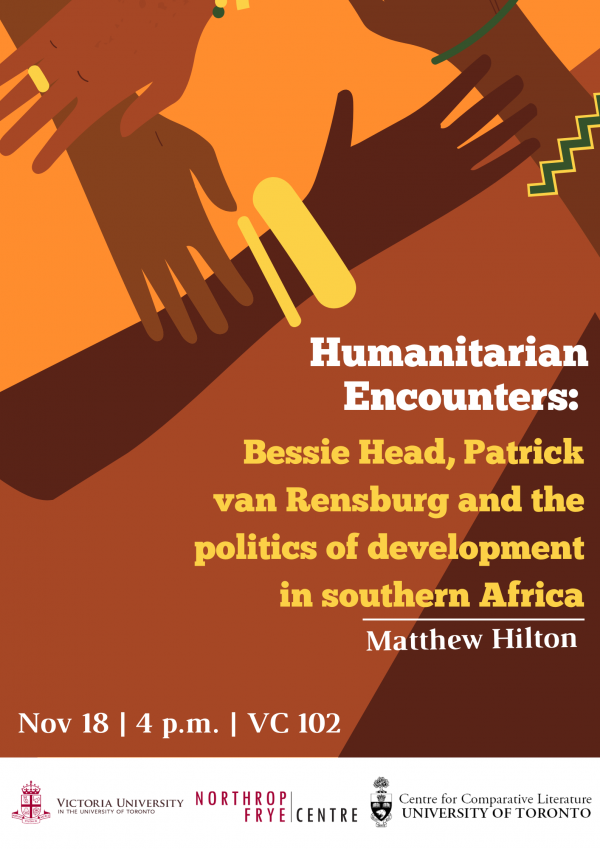
About the talk
Patrick van Rensburg was a renowned humanitarian worker and an anti-apartheid activist. In 1982 he was the recipient of the Right Livelihood Award for his pioneering model of ‘education with production’ practiced at his famous Swaneng Hill School and in the Serowe Brigades. Bessie Head became Botswana’s most famous novelist. Her fiction and non-fiction drew heavily on van Rensburg’s projects. Both admired one another, though at times they had a tempestuous relationship. By framing the development encounter through Head’s letters and writing, Hilton explores how aid work served the interests of so many and not only the intended beneficiaries. Moreover, by uncovering both protagonists’ psychological breakdowns, Hilton amplifies the ‘nervous conditions’ of development during the decades of decolonisation.
About the speaker
Matthew Hilton is a social historian with interests in the history of humanitarianism, consumer society and social activism, both in Britain and globally. He did his PhD at Lancaster University before spending nearly twenty years at the University of Birmingham. Hilton joined Queen Mary in 2016 as Vice-Principal for Humanities and Social Sciences.
Nov. 28, 2024 | The Dr. Sally L.D. Katary Memorial Lecture: Slavery and the Athenian Sex Trade | Allison Glazebrook
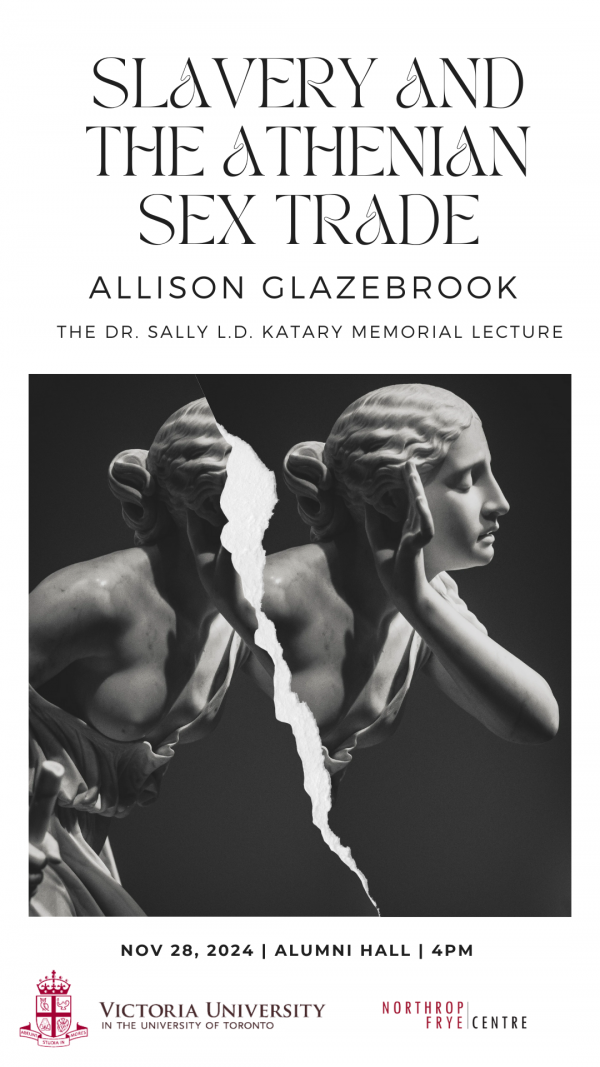
About the talk
Recognizing that the ancient Greek sex trade depended on enslaved labour, Glazebrook focuses on the connection between slavery and the Athenian brothel to examine Greek slaving practices as a cycle. The evidence available for sex labourers in Athens is plentiful, unlike other types of enslaved people, including evidence from acquisition to manumission and even integration into the system of slavery as enslavers. In addition to the practices around managing and freeing sex labourers, she considers the enslaved phase of (mostly) women employed in this same industry.
About the speaker
Allison Glazebrook is Professor in the Department of Classics and Archaeology at Brock University. She specializes in women, gender, sexuality, and slavery in ancient Greece. Her publications include Sexual Labor in the Athenian Courts (2021), Themes in Greek Society and Culture: An Introduction to Ancient Greece, 2nd edition (2022, edited with C. Vester), Houses of Ill Repute: The Archaeology of Brothels, Houses and Taverns in the Greek World (2016, edited with B. Tsakirgis) and Greek Prostitutes in the Ancient Mediterranean, 800 BCE-200 CE (2011, edited with M. M. Henry).
2023-2024 Events
Sept 15, 2023 | Hurricane Culture: For an Ecopoetics of Relations beyond the Hispanic Caribbean | Yairen Jerez Columbié
Hurricane Culture: For an Ecopoetics of Relations beyond the Hispanic Caribbean
SEPTEMBER 15th, 2023 | 2:00PM
Northrop Frye Centre (VC 102)
91 Charles St West Toronto, ON M5S1K5

About the talk...
In January 2021, three wind-battered palm trees cast in bronze occupied New York City’s High Line public space. Artist Teresita Fernández’s sculptures stood in stark contrast to disengaged billboard and print depictions of the Caribbean, in which palm trees feature prominently as key components of idyllic landscapes and purchasable holiday experiences. Just like the dyad of hurricane and palm—an omnipresent couple in the Caribbean imaginary—the pair formed by hurricane and culture, tells a story of devastation and resistance. In this paper, I discuss and exemplify the concept of hurricane culture, which refers to the evolving knowledges, beliefs, narratives, practices, and artistic expressions acquired and co-developed over the centuries by diverse peoples and ecosystems that have had to deal with storms and environmental degradation. From the first hurricane warning, issued by Catalan-Cuban Jesuit priest Benito Viñes in the 19th century, to current cultural representations, I argue that both written and visual portrayals of storms can help expand understandings of past, present, and future socioecological interactions in the Atlantic Hurricane Belt, a region that includes the northern coast of South America, the Gulf of Mexico, the Antilles, the Lucayan Archipelago, and the North American Atlantic Coast. Drawing upon Édouard Glissant’s concept of a poetics of relations, the paper articulates the relational quality of the Atlantic World from an ecocritical perspective and considers what hurricanes and the environment tell us about our entangled histories and cultures.
About the speaker...
Dr Yairen Jerez Columbié is Assistant Professor in Latin American Studies and Intercultural Communication at Trinity College Dublin. She is the author of the monograph Essays on Transculturation and Catalan-Cuban Intellectual History (Palgrave Macmillan, 2021) and co-editor of the open-access edited volume Creating Resilient Futures: Integrating Disaster Risk Reduction, Sustainable Development Goals and Climate Change Adaptation Agendas (Palgrave Macmillan, 2022). Her first poetry collection,Fósiles de Lluvia [Fossil Rain] (Betania, 2022), was published through a Trinity Association and Trust Grant. Dr Jerez Columbié is Deputy Director of the Trinitty Centre for Global Intercultural Communications. She grew up and started her career in Havana, Cuba.
Oct 10, 2023 | A Beauty That Hurts: Life and Death in Guatemala | George Lovell
A Beauty That Hurts: Life and Death in Guatemala
OCTOBER 10th, 2023 | 4:00PM
Northrop Frye Centre (VC 102)
91 Charles St West Toronto, ON M5S1K5
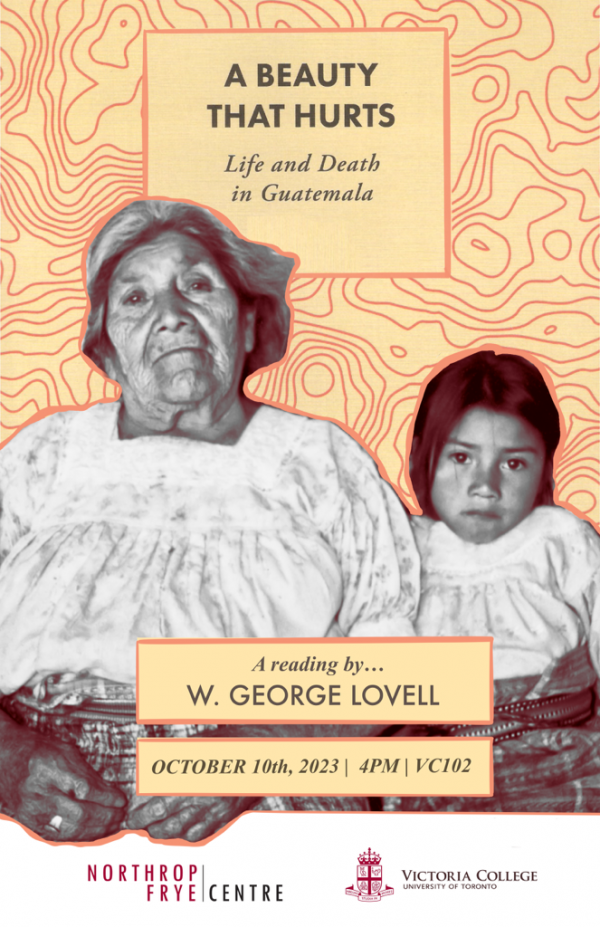
Oct 13, 2023 | Participatory Action Partnerships in Ghana for Global Food Sovereignty | Siera Vercillo
Participatory Action Partnerships in Ghana for Global Food Sovereignty
OCTOBER 13th, 2023 | 4:00PM
Northrop Frye Centre (VC 102)
91 Charles St West Toronto, ON M5S1K5
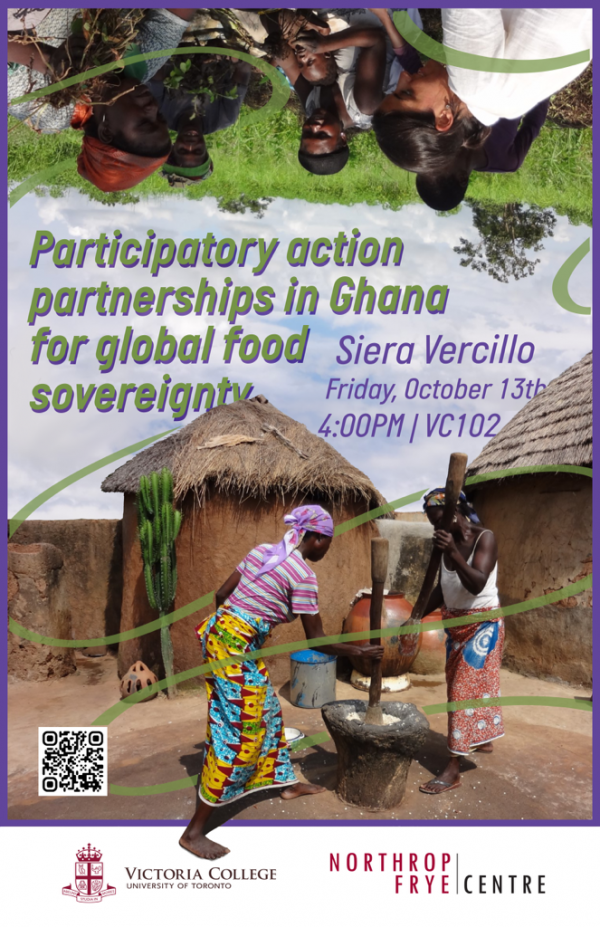
About the talk...
The unprecedented state of global hunger is exposing the fragility of food systems, which are the political economic processes and infrastructures that feed people. This fragility is caused by systems that privilege the commodification of food and profit over ecological sustainability and equity. For decades, scholarship has demonstrated how the agricultural development approaches of the Green Revolution focused on intensifying yields across the Global South, generally degrade soil, decrease biodiversity and increase debt burdens, trapping smallholders in poverty. This trapping inhibits smallholders’ household food security and adaptive capacity to climate change. A donor evaluation recently demonstrated that food insecurity has intensified across the African countries currently targeted for the Green Revolution like Ghana, which is inciting resistance across the continent. Major alternatives to the African Green Revolution generally advocate for food sovereignty, which is the right of people to define their own food systems instead of corporations, so that healthy, diverse, delicious and culturally appropriate food is more accessible. In this presentation, I will illustrate how we as scholars are supporting Ghanaian partner organizations’ efforts towards food sovereignty using grounded, participatory action and interdisciplinary research into agroecology and disappearing indigenous culinary ingredients as alternatives to the African Green Revolution. Learning from food sovereignty movements such as these partners’ efforts has the power to transform notions of who holds expertise and how change can happen. Preserving and promoting local food production and culinary knowledge and practices for climate change adaptation and resistance to unjust political economic power dynamics can provide more sustainable incomes than those that privilege productivity.
About the speaker...
Siera Vercillo is an Assistant Professor of Food Studies (teaching stream) at the University of Toronto, Scarborough and Coordinator of the Sustainable Food and Farming Futures Research Cluster. She pursues participatory action research in the fields of feminist geography, political ecology and critical development studies. Her work focuses on linking the literature on agrarian and nutrition transitions, smallholder livelihood development, rural-to-urban food systems, and household food security in northern Ghana where she has been working within communities for over a decade. Siera's scholarship also mobilizes research for advocacy coalitions, donors, NGOs and government policy and practice to advocate for agroecology and food sovereignty. She holds bylines in Aljazeera and publishes in scholarly journals like Ambio and Third World Quarterly.
Oct 19, 2023 | The 1970s and Us: Revolution and Liberation, From Past to Present | Michael Hardt
The 1970s and Us: Revolution and Liberation, From Past to Present
OCTOBER 19th, 2023 | 5:00PM
Victoria College Chapel (2nd floor, Old Vic)
91 Charles St West Toronto, ON M5S1K5
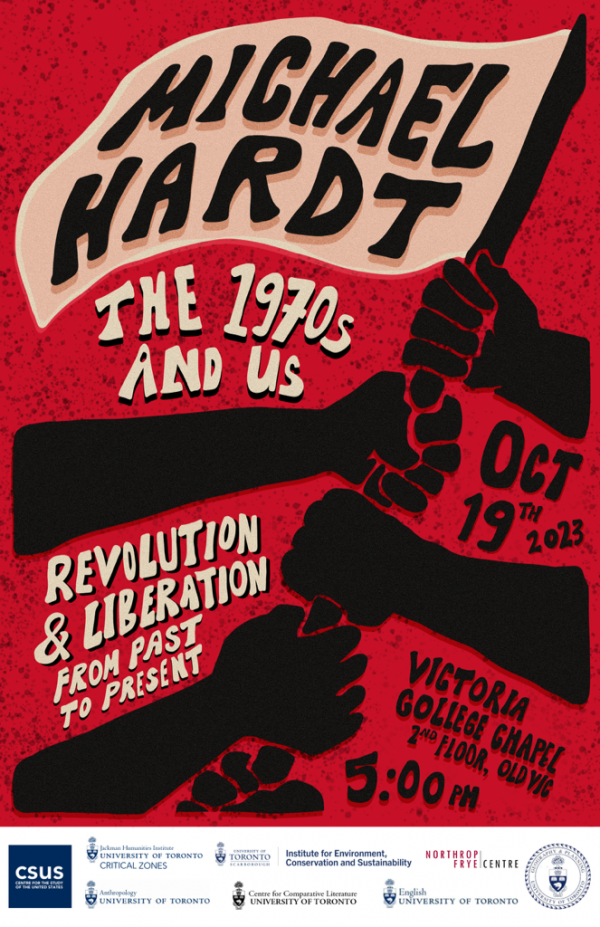
About the talk...
Revolutionary and liberation movements of the 1970s were a first great attempt to confront the structures of power that still rule over us today. In some respects, we can recognize in those movements the seeds of practices, concepts, and political aspirations that have developed since; but in other respects, the movements of the 1970s were ahead of us and we need to catch up to them. With examples from a variety of countries, I will argue for the relevance of those movements for political thinking and organizing today.
About the speaker...
Michael Hardt teaches political theory in the Literature Program at Duke University. He is co-author, with Antonio Negri, of the Empire trilogy and, most recently, Assembly. He is co-director with Sandro Mezzadra of The Social Movements Lab.
The NFC co-sponsors this talk with a variety of University of Toronto collaborators, including: the Institute for Environment, Conservation and Sustainability (UTSC), The Critical Zones Research Collective (Jackman Humanities Institute), the Centre for the Study of the United States (CSUS), the Department of Geography & Planning, the Centre for Comparative Literature, the Department of English, and the Department of Anthropology.
Oct 25, 2023 | (Re)flections on Lucy Lippard's I See / You Mean | NFC Doctoral Fellow, Rhiannon Vogl
(Re)flections on Lucy Lippard's I See / You Mean
OCTOBER 25th, 2023 | 1:00PM
Northrop Frye Centre (VC 102)
91 Charles St West Toronto, ON M5S1K5
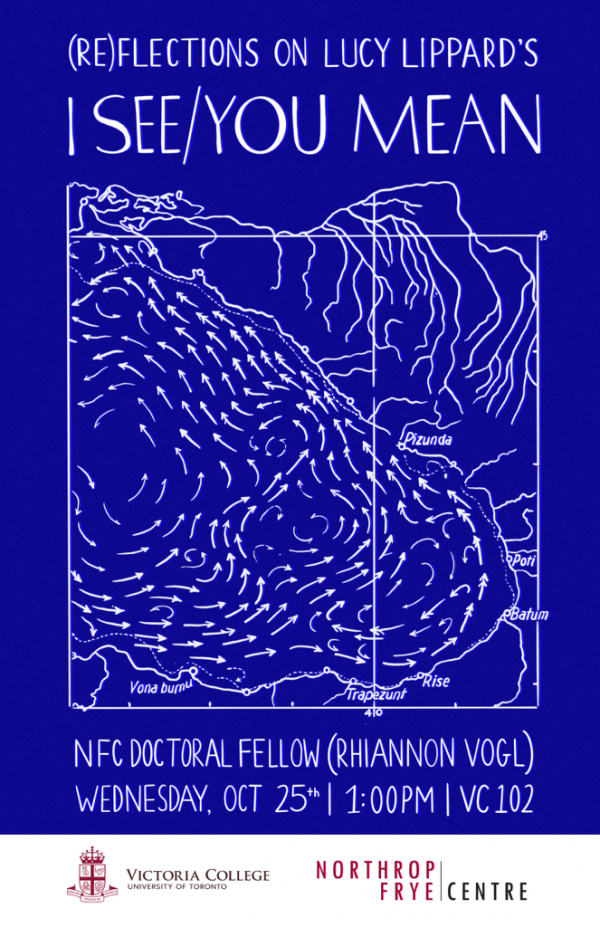
About the talk...
Lucy Lippard’s only published novel, I See / You Mean, began as a wry conceptual experiment and became a sensual and provocative self-exploration. It is intimately tied to Lippard’s experiences within the contemporary art world, the rising feminist movement, and her desire to explore her relationship to both. In it, she moves away from conceptual ways of experiencing the world to more earthbound sensorial ones, blurring the complexities of her identity as a writer, critic and woman. This presentation explores the development of collage-as-methodology in Lippard’s writing, suggests the “sensuous grid” as a new framework for contextualizing Lippard’s approach to her practice, and offers a new understanding of Lippard’s relationship to Dan Graham, Sol LeWitt and Lee Lozano. It resituates I See / You Mean as a nodal point in Lippard’s career and emphasizes the importance of fiction writing in the critic’s work.
About the speaker...
Rhiannon Vogl (she/her) is a PhD candidate in Art History at the University of Toronto. Her research is broadly concerned with the intersections of art criticism and publishing with conceptual and postmodern art and on self-reflexive modes of art writing. Her dissertation focuses on the lesser-known fiction writing of art critic Lucy Lippard, and its present-day republication. This research was funded by a Joseph Armand Bombardier Canada Graduate Scholarship. Her writing has been published in RACAR, The Brooklyn Rail, C Magazine, Border Crossings, Canadian Art, and BlackFlash Magazine. Before starting her PhD, Rhiannon was a curator of Contemporary Art at the National Gallery of Canada.
Nov 16, 2023 | Faculty Reading Series: Maria Cichosz & Noor Naga
Faculty Reading Series: Maria Cichosz & Noor Naga
NOVEMBER 16th, 2023 | 6:00PM
Northrop Frye Centre (VC102)
91 Charles St West Toronto, ON M5S1K5
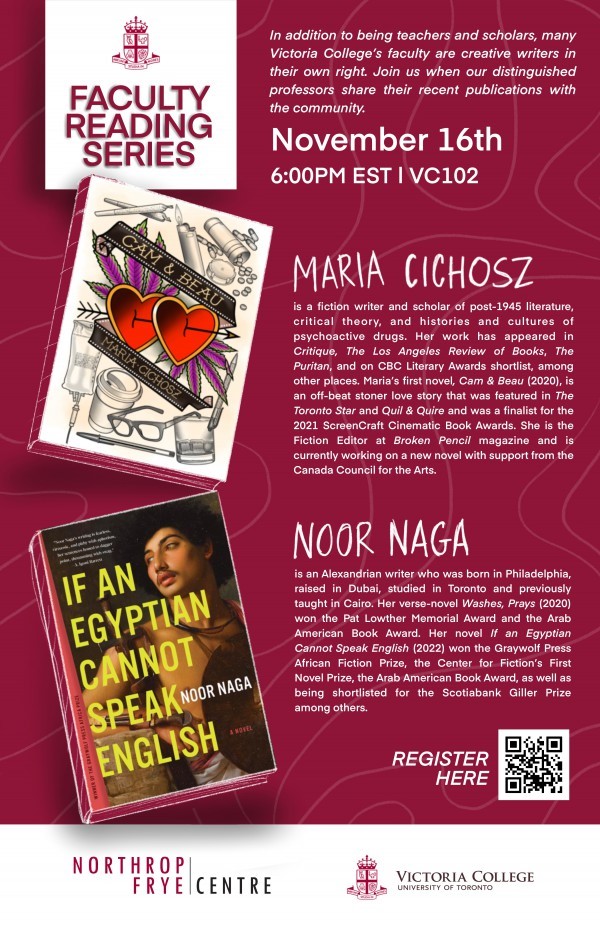
In addition to being teachers and scholars, many of Victoria College's faculty are creative writers in their own right. Join us when our distinguished professors share their recent publications with the community.
Maria Cichosz is a fiction writer and scholar of post-1945 literature, critical theory, and the histories and cultures of psychoactive drugs. Her work has appeared in Critique, The Los Angeles Review of Books, The Puritan, and on the CBC Literary Awards shortlist, among other places. Maria's first novel, Cam & Beau (2020), is an off-beat stoner love story that was featured in The Toronto Star and Quill & Quire and was a finalist for the 2021 ScreenCraft Cinematic Book Awards. She is the Fiction Editor at Broken Pencil magazine and is currently working on a new novel with support from the Canada Council for the Arts.
Noor Naga is an Alexandrian writer who was born in Philadelphia, raised in Dubai, studied in Toronto and previously taught in Cairo. Her verse-novel Washes, Prays (2020) won the Pat Lowther Memorial Award and the Arab American Book Award. Her novel If an Egyptian Cannot Speak English (2022) won the Graywolf Press African Fiction Prize, the Center for Fiction’s First Novel Prize, the Arab American Book Award, as well as being shortlisted for the Scotiabank Giller Prize among others.
Jan 8, 2024 | Reparative Archival Work: Sharing the Stories of Chinese North America's First Families | Mary Chapman
Reparative Archival Work: Sharing the Stories of Chinese North America's First Families
JANUARY 8th, 2024 | 4:00PM
Alumni Hall (Old Vic)
91 Charles St West Toronto, ON M5S1K5
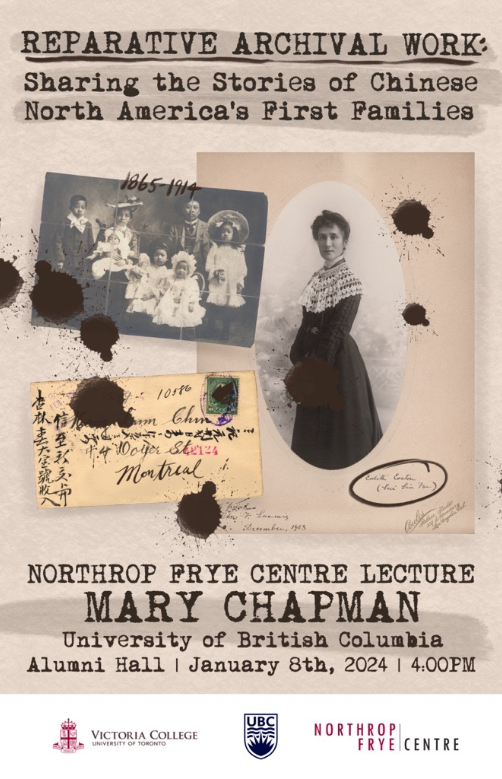
About the talk...
Since the “biographical turn”, scholars of the African diaspora have recovered diasporic Black lives that fill in an abstract and anonymous Black Atlantic history, but Asian North Americanist scholars have struggled to uncover personal stories of the earliest Chinese immigrants to Canada that write back to the dehumanizing bureaucratic records collected during the Exclusion Era.
On the centenary of Canada’s Chinese Exclusion law and during a period of heightened anti-Asian violence, this lecture shares research about 1890s Chinese families living in Montreal. Drawing on her biographical research on Sui Sin Far/Edith Eaton (1865-1914), the first Asian North American writer, her journalism about these families, and research done collaboratively with students and descendants, Chapman traces efforts to repair the archives of the earliest Chinese Canadians.
About the speaker...
Mary Chapman is a Professor of English at the University of British Columbia and Director of The Winnifred Eaton Archive, which was granted an Honorable Mention for the Canadian Social Knowledge Institute (C-SKI) Open Scholarship Award. She is the author of Making Noise, Making News: Suffrage Print Culture and US Modernism (2014) which won the Society for the Study of American Women Writers Book Prize and the Canadian Association of American Studies Robert K. Martin Book Prize and was one of four finalists for the Modernist Studies Association Book Prize. Her edited volumes Becoming Sui Sin Far: The Uncollected Fiction, Journalism and Travel Writing of Edith Eaton (2016) and (with Angela Mills) Treacherous Texts: US Suffrage Literature 1846-1946 (2011) were both awarded the Popular Culture Association/American Culture Association’s Susan Koppelman Award for best edited feminist book in American Popular Culture. Chapman is currently writing a biography of Sui Sin Far’s family.
Jan 10, 2024 | NFC Workshop: Learn to Use StoryMaps to Tell Interactive Histories | Mary Chapman
NFC Workshop: Learn to Use StoryMaps to Tell Interactive Histories
JANUARY 10th, 2024 | 1:00PM
EJ Pratt Library
71 Queen's Park Crescent East, ON M5S1K7
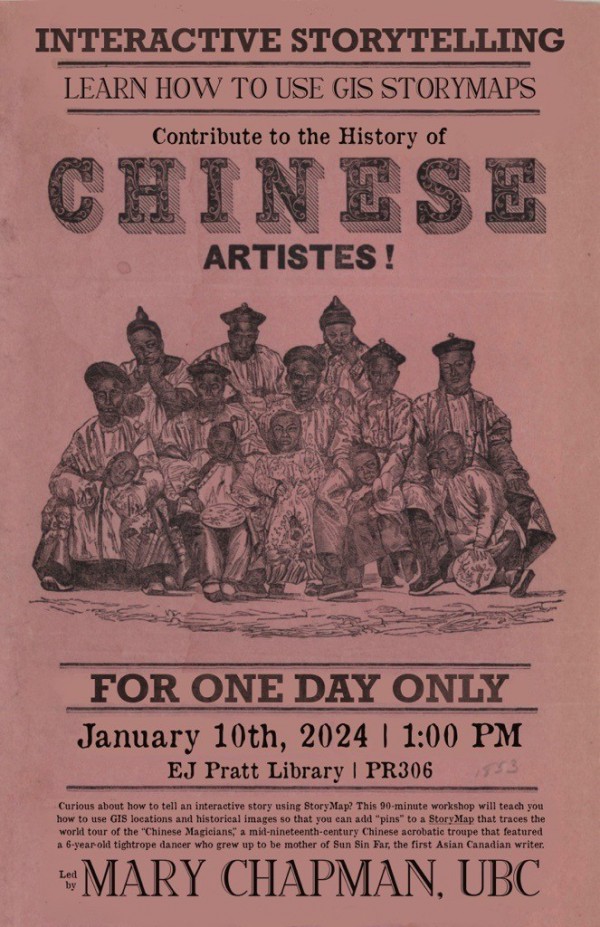
Curious about how to tell an interactive story using Storymap? This #-minute workshop will teach you how to find GIS locations and historical images so that you can add “pins” to a StoryMap that traces the world tour of the “Chinese Magicians,” a mid-nineteenth-century Chinese acrobatic troupe that featured a 6-year-old tightrope dancer who grew up to be the mother of Sui Sin Far, the first Asian Canadian writer. Mary Chapman leads this workshop.
Mary Chapman is a Professor of English at the University of British Columbia and Director of The Winnifred Eaton Archive, which was granted an Honorable Mention for the Canadian Social Knowledge Institute (C-SKI) Open Scholarship Award. She is the author of Making Noise, Making News: Suffrage Print Culture and US Modernism (2014), which won the Society for the Study of American Women Writers Book Prize and the Canadian Association of American Studies Robert K. Martin Book Prize and was one of four finalists for the Modernist Studies Association Book Prize. Her edited volumes Becoming Sui Sin Far: The Uncollected Fiction, Journalism and Travel Writing of Edith Eaton (2016) and (with Angela Mills) Treacherous Texts: US Suffrage Literature 1846-1946 (2011) were both awarded the Popular Culture Association/American Culture Association’s Susan Koppelman Award for best edited feminist book in American Popular Culture. Chapman is currently writing a biography of Sui Sin Far’s family.
Jan 12, 2014 | Overtourism and Culture in Europe: The Resident Gaze | Dr. Guillem Colom-Montero
Overtourism and Culture in Europe: The Resident Gaze
JANUARY 12th, 2023 | 4:00PM
Northrop Frye Centre (VC102)
91 Charles St West Toronto, ON M5S1K5
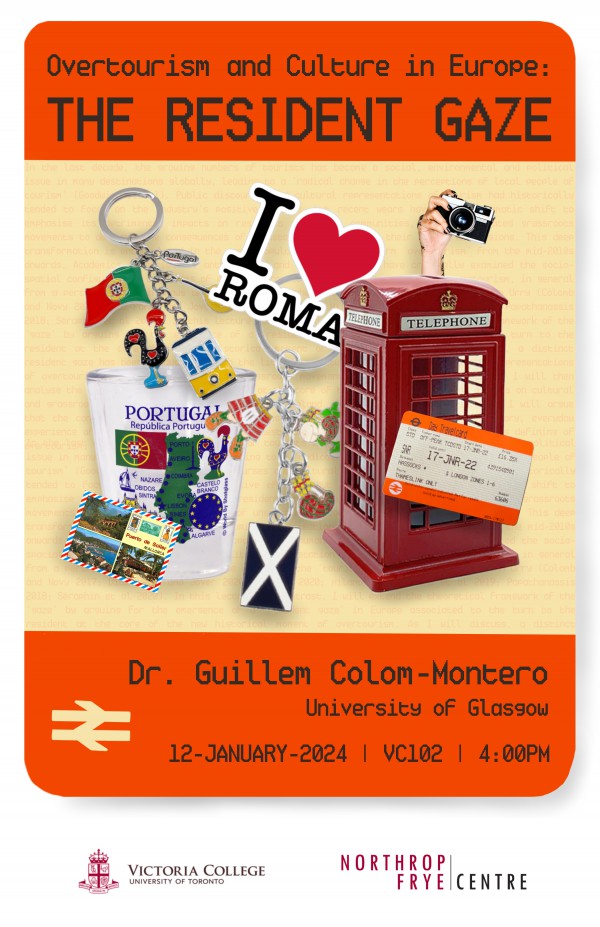
About the talk...
In the last decade, the growing numbers of tourists has become a social, environmental and political issue in many destinations globally, leading to a ‘radical change in the perceptions of local people of tourism’ (Goodwin 2017: 1). Public discourses and cultural representations of tourism had historically tended to focus on the industry’s positive effects, but recent years have seen a dramatic shift to emphasise its detrimental impacts on residents and local communities, who have created grassroots movements to denounce the consequences of unsustainable tourism on their cities and regions. This deep transformation is encapsulated in the rapid popularisation of the term ‘overtourism’ from the mid-2010s onwards. Academics in sociology, anthropology and human geography have critically examined the socio-spatial configurations and forms of political contestation that are specific to overtourism, in general from a perspective which draws upon the notion of the ‘tourist gaze’ as theorised by John Urry (Colomb and Novy 2017; Díaz-Parra and Jover 2020; Mihalic 2020; Milano 2018; Milano et al 2019; Papathanassis 2018; Séraphin et al 2020). In this lecture, by contrast, I will extend the theoretical framework of the ‘gaze’ by arguing for the emergence of a ‘resident gaze’ in Europe associated to the turn to the resident at the core of the new historical moment of overtourism. As I will discuss, a distinct resident gaze has been produced through the literary, cultural, artistic and discursive representations of overtourism by authors, artists and grassroots movements in overcrowded destinations. I will then analyze the main narratives and imaginaries at the core of the resident gaze through a focus on cultural and grassroots production from Spain, Portugal, England, Scotland and Italy. Ultimately, I will argue that the concept of the ‘resident gaze’ allows for a better understanding of the ordinary, everyday experience of residents in overtouristified destinations and, in turn, of the key features defining of overtourism.
About the speaker...
Dr Guillem Colom-Montero is a Lecturer in Hispanic Studies at the University of Glasgow’s School of Modern Languages and Cultures and co-director of the research group ‘Discourses of Sustainability’ at the College of Arts & Humanities. His research focuses on contemporary Catalan literature and culture, the construction of identity in the Catalan-speaking lands within the wider Spanish context, and the interrelations between tourism, culture and local communities in Europe. Through a focus on the interactions between cultural production, collective and grassroots demands for community self-determination, and forms of socio-political independence, Guillem’s research seeks to engage with global debates of our time: political authority and popular empowerment, multilingualism and cultural identity, nationalisms and the representation of the Other, the impacts of leisure mobilities on community well-being and climate emergency. Guillem is the author of the monograph Quim Monzó and Contemporary Catalan Culture: Cultural Normalization, Postmodernism and National Politics (Legenda, 2021) and has published extensively on Catalan Studies in English and Catalan. His current research project focuses on the discourses and cultural representations of unsustainable tourism by resident communities, authors and artists in Spain, and he has recently extended his work to study cultural depictions of tourism in Scotland, England, Portugal and Italy. For this project, he has published two peer-reviewed outputs and has two forthcoming book chapters in 2024. Guillem regularly publishes articles disseminating his research to non-academic audiences in printed and online media in English, Catalan and Spanish, in outlets such as El País, elDiario.es, Diari Ara, Núvol and Brave New Europe. Finally, Guillem is currently working on a book analyzing cultural responses to overtourism in the Mediterranean island of Mallorca, tentatively entitled ‘Overtourism and Culture in Mallorca’.
Jan 25, 2023 | Family Values: John Waters' Concept of Cult | Kate J. Russell
Family Values: John Waters' Concept of Cult
RESCHEDULED TO JANUARY 25th, 2023 | 1:00PM
Northrop Frye Centre (VC102)
91 Charles St West Toronto, ON M5S1K5
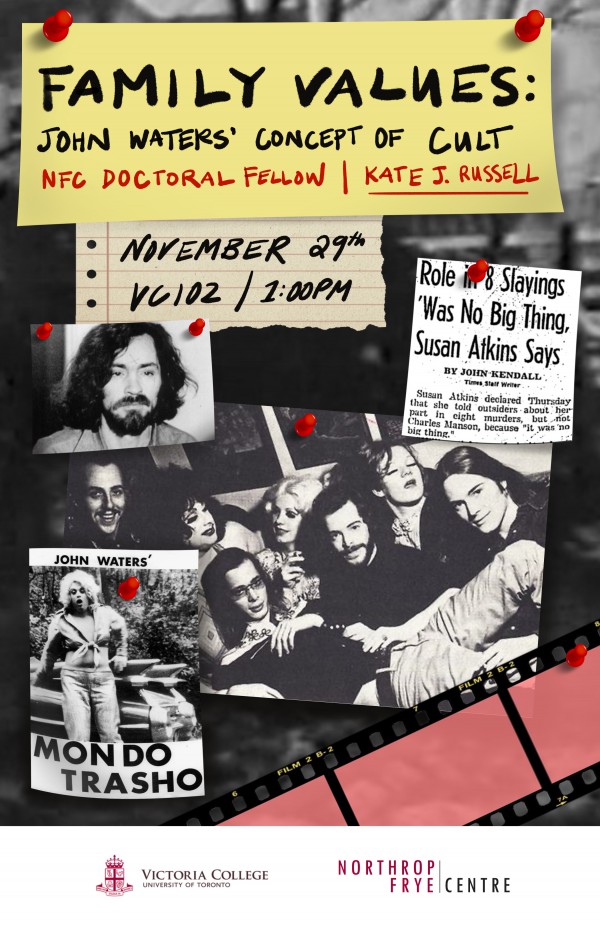
About the talk...
An image of Mary and Joseph holding their newborn son is glued onto a page of John Waters’s scrapbook from 1970, a startling inclusion by one of American cinema’s foremost provocateurs until one notices that pasted over the infant Jesus is Charles Manson’s face. This manipulated image, I argue, encapsulates how Waters approaches the concept of cult. Waters’s early feature films (1969-1977) are often cited as canonical cult texts due to their stylistic excesses, technical ineptitude, and transgressive subject matter that lend themselves to subcultural appeal. While cult film scholarship has focussed on reception contexts that valorize stylistic and thematic transgression, this talk will instead turn to rethinking what “cult” means as a concept, examining Waters’s provocations of blaspheming Catholic imagery and the influence of the Manson Family as strands of cult that intertwine in his transgressive comedy. It will read the formal composition of the scrapbooks and film texts through theories of comedy to examine how Waters’s humour works between a ridiculing of organized religion and murderous cult activity.
About the speaker...
Kate J. Russell is a PhD candidate in Cinema Studies at the University of Toronto where she is writing her dissertation on John Waters and humour in cult cinema. Her writing appears in Velvet Light Trap, Discourse: Journal for Theoretical Studies in Media and Culture, Monstrum, and ReFocus: The Films of William Castle.
Jan 31, 2024 | "What's Inside This Box": Unpacking McSweeney's Quarterly Concern | NFC Doctoral Fellow, J Hughes
"What's Inside This Box": Unpacking McSweeney's Quarterly Concern
JANUARY 31st, 2023 | 4:00PM
Northrop Frye Centre (VC102)
91 Charles St West Toronto, ON M5S1K5
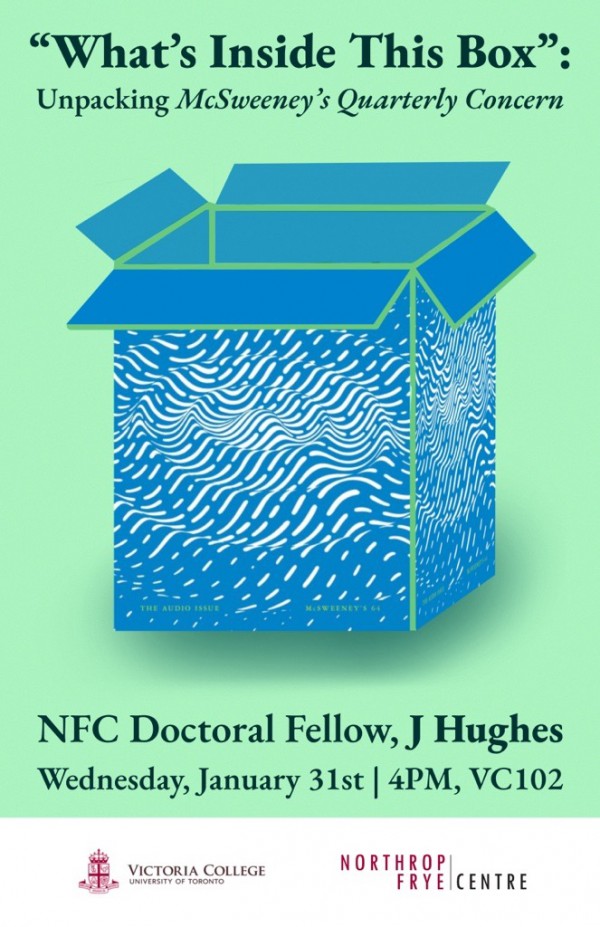
About this talk...
How do you unpack a book? How do you hold an inflated story? When a book gives you its number, do you give it a call? Since 1998, with issues ranging from party balloons to newspapers to handsome hardcovers, the experimental and materially-diverse contemporary literary journal Timothy McSweeney’s Quarterly Concern has “challenge[d] conventional expectations” for readers and scholars alike.
My dissertation incorporates critical frameworks developed for studying artists’ books in its investigation of twentieth and twenty-first century works of experimental narrative. I focus on works and narrative strategies that, like McSweeney’s, self-reflexively make visible the formal and editorial choices made by their creators and invite readers to reflect on or even participate in those choices. This presentation integrates historical context and critical lenses from experimental narrative and artists’ book studies in order to explore how McSweeney’s encourages multivalent, creative, and collaborative reading.
About the speaker...
J Hughes is a PhD candidate at the University of Toronto in the Department of English and the Book History and Print Culture collaborative specialization. J’s research integrates artists’ books and experiential learning in their investigation of twentieth and twenty-first century experimental narratives whose methods of making and of reading foster activated readers. Their professional and creative experience in book arts research and education includes exhibition curation, public programming development, book design, and print production.
Feb 6, 2024 | Writing for the Future: Exile, Resistance, and the Hope for Utopia in Klaus Mann's Narratives | Michel Mallet
Writing for the Future: Exile, Resistance, and the Hope for Utopia in Klaus Mann's Narratives
Feb. 6, 2024 | 4 p.m.
Northrop Frye Centre (VC102)
91 Charles St West Toronto, ON M5S1K5
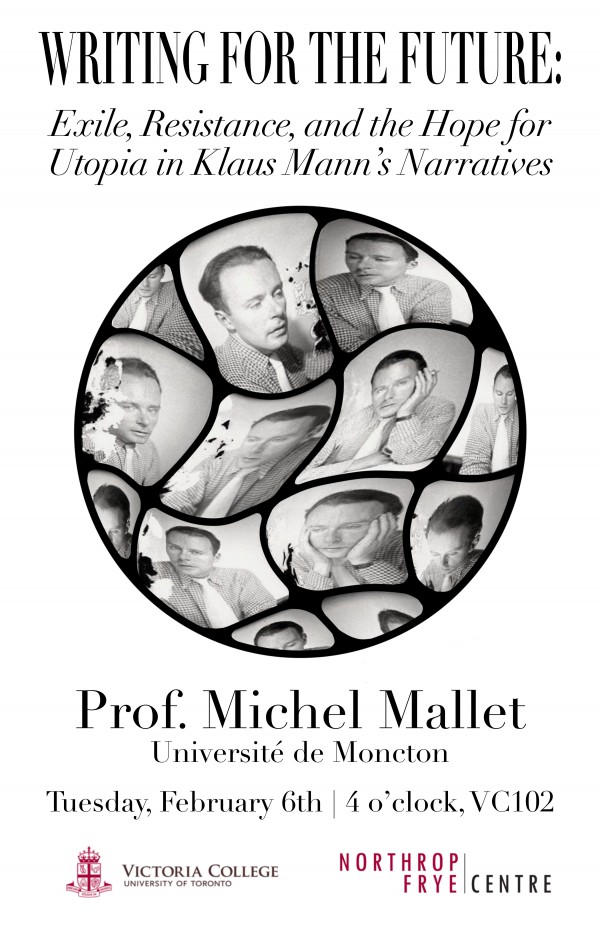
About the talk...
A prolific writer, Klaus Mann (1906-1949) was confronted from an early age with the challenges posed by his father's notoriety, drug addiction and his homosexuality, in addition to the socio-political upheavals of his time. Imbued with these personal and historical challenges, his work embodies aesthetic curiosity, a rejection of societal norms and taboos, and a forward-looking optimism.
An avowed idealist, Mann's utopian vision of a collective, humanistic and transnational European awakening contrasts sharply with the disheartening reality he observed within his own 'Nachkriegsgeneration'. Identifying himself as a member of a lost generation, Mann nevertheless believed in the potential of future generations to defend utopian ideals. In so doing, he drew inspiration from Ernst Bloch's concept of "concrete utopia" as an ideological counterpoint to the historical events of his time. Forced into exile and fleeing Nazi Germany in 1933, Mann became an important figure in the Other Germany, taking an active part in the anti-fascist struggle abroad, including in Roosevelt's America. Seeing America as a protector of democratic values and freedom, he regarded it as a beacon of hope and a 'utopian' model from which his generation and future generations in Germany and Europe should draw inspiration in their struggle against fascism.
Examining the intersecting themes of exile, anti-fascist resistance, and the pursuit of utopia in his literary output, this talk aims to shed new light on Mann's legacy, thereby providing a more comprehensive portrait of this politically engaged author, and of the pan-European humanist spirit that permeates his essays and works of fiction.
About the speaker...
Michel Mallet is Associate Professor of German at the Université de Moncton, in New Brunswick, Canada. He is currently Bithell Visiting Fellow at the Institute of Languages, Cultures & Societies - School of Advanced Study at the University of London, UK (2023–2024), and Visiting Fellow at the Northrop Frye Centre (Winter 2024). Particularly interested in the themes of Heimat (homeland), exile, and nostalgia, his research projects explore Herta Müller’s oeuvre, as well as extending to other twentieth- and twenty-first-century German-language authors of immigration and exile, such as Klaus Mann and Saša Stanišić, who address such themes in their works.
Feb 28, 2024 | Dr. Sally L.D. Katary Memorial Lecture | Alison Keith
“Servius’ Daughter Sulpicia: Life, Love and Literature in Ancient Rome” | Alison Keith
Febr. 28, 2024 | 5 p.m.
Alumni Hall, Old Vic
91 Charles St West Toronto, ON M5S1K5
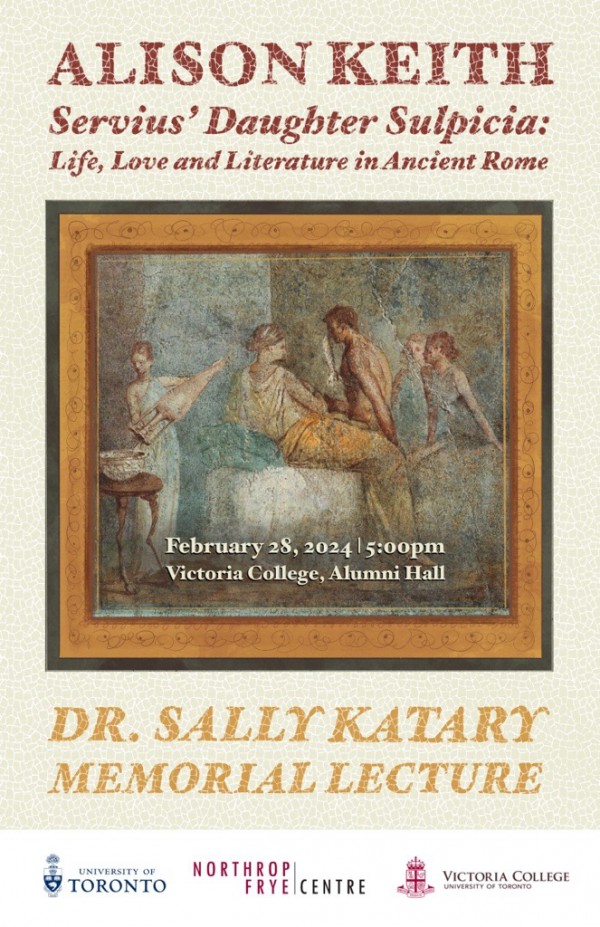
The late Dr. Sally L. D Katary taught Ancient Studies and Classics at Thorneloe University for 30 years until her sudden passing on August 6, 2016. A world-renowned Egyptologist with a Ph.D. from the University of Toronto, Dr. Katary was filmed by National Geographic on the subject of ancient Egypt and was well-known for her courses “Greek Mythology” and “Women in the Ancient World”; her students deeply appreciated her gift for storytelling.
First established at Thorneloe University in her memory in 2017, The Dr. Sally L. D. Katary Memorial Lecture Series has recently moved to the Northrop Frye Centre at Victoria University. This inaugural lecture at Victoria College features guest speaker Dr. Alison Keith, Director of the Jackman Humanities Institute and University Professor of Classics at the University of Toronto, where she also holds cross-appointments at the Centre for Medieval Studies and the Women and Gender Studies Institute.
This talk aims to shed light on the historical and literary contexts of Sulpicia, “Servius’ daughter,” known to us only from a cycle of poems, celebrating her amatory trysts and tribulations with a man named Cerinthus, included in the third book of Tibullus’ poetry.
Feb 29, 2024 | Alumni Reading Series: A. Light Zachary & Bronwyn Fischer
Alumni Reading Series: A. Light Zachary & Bronwyn Fischer
Feb. 29, 2024 | 6 p.m.
Northrop Frye Centre (VC102)
91 Charles St West Toronto, ON M5S1K5
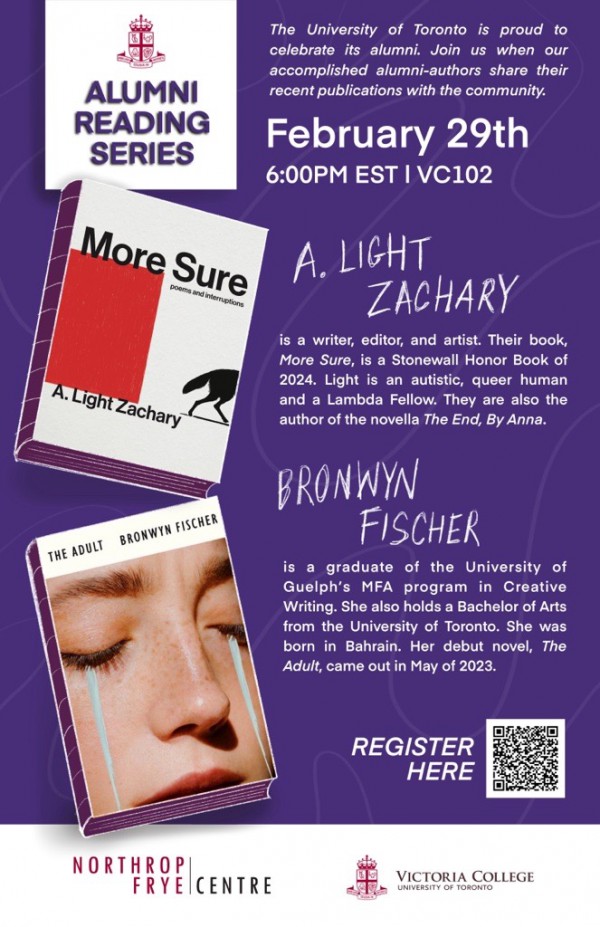
The University of Toronto is proud to celebrate its alumni. Join us when our accomplished alumni authors share their recent publications with the community.
A. Light Zachary is a writer, editor, and artist. Their book, More Sure, is a Stonewall Honor Book of 2024. Light is an autistic, queer human and a Lmabda Fellow. They are also the author of the novella The End, By Anna.
Bronwyn Fischer is a graduate of the University of Guelph's MFA program in Creative Writing. She also holds a Bachelor of Arts from the University of Toronto. She was born in Bahrain. Her debut novel, The Adult, came out in May of 2023.
March 6, 2024 | Standing on Colonial Ruins | NFC Doctoral Fellow, Aliju Kim
Standing on Colonial Ruins: Decadence as a Place of Beginning in Ruins (P’yehŏ; 1920-21)
March 6, 2024 | 4 p.m.
Northrop Frye Centre (VC102)
91 Charles St West Toronto, ON M5S1K5
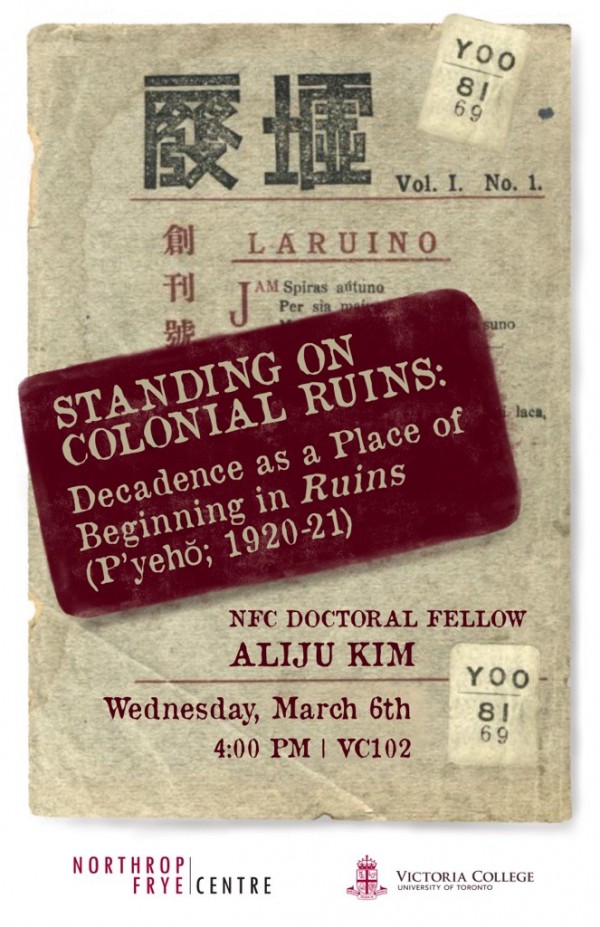
About the talk...
What does it mean for young writers of modern Korean literature in the first two decades of the 20th century to have understood their times as decadent? In this talk, I discuss the emergence and development of decadence as an aesthetic style in the magazine Ruins, one of the earliest and most prominent coterie magazines to be published in Korea. As a little magazine, Ruins immediately throws into light the transnational and translational literary networks that foreground debates over modernity and modern literature that arose in early 20th century Korea. What really sets apart Ruins from the myriad magazines from this period, however, is its literary commitment to decadence, revealing the interesting ways in which an aesthetic voice and identity, ostensibly rooted in negativity, paradoxically seems to fuel the emergent field of modern literature in Korea. As I will show, decadence is used as an important discursive mode of imagining and representing the modern, as one that is always on the brink of collapse and re-invention.
About the speaker...
Aliju Kim (she/her) is a PhD Candidate in East Asian Studies at the University of Toronto. Her dissertation examines the aesthetic sensibility of decadence as an analytic to index the paradoxical sensibility of a modernity in decline in Korean literature. More broadly, she is interested in exploring how decadence builds upon global processes of modernization and empires. Her other research interests include memory, space-time, and family sagas.
March 7, 2024 | Faculty Reading Series: Rawi Hage & Claire Battershill
Faculty Reading Series: Rawi Hage & Claire Battershill
MARCH 7th, 2024 | 6:00PM
Northrop Frye Centre (VC102)
91 Charles St West Toronto, ON M5S1K5
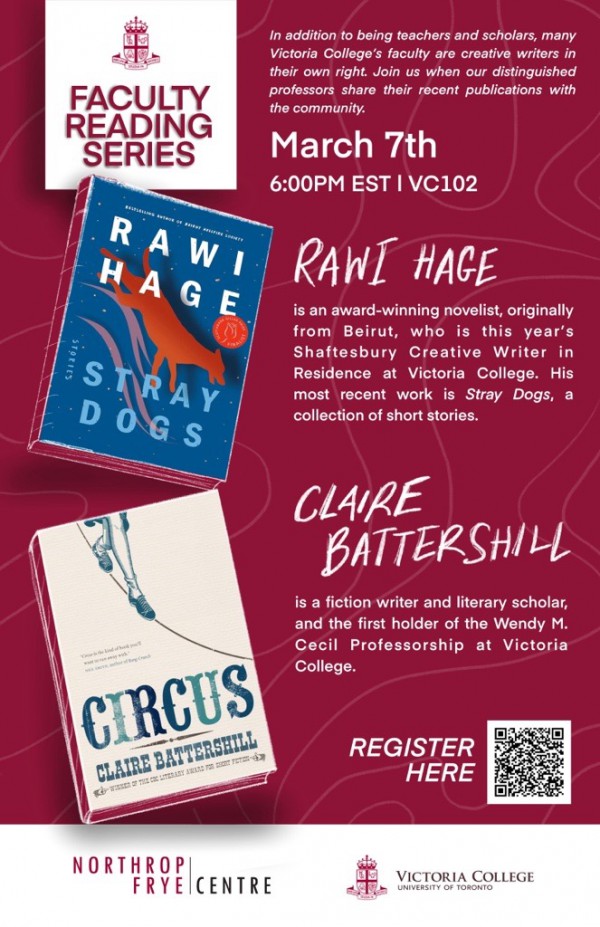
In addition to being teachers and scholars, many of Victoria College's faculty are creative writers in their own right. Join us when our distinguished professors share their recent publications with the community.
Rawi Hage is an award-winning novelist, originally form Beirut, who is this year's Shaftesbury Creative Writer is Residence at Victoria College. His most recent work is Stray Dogs, a collection of short stories.
Claire Battershill is a fiction writer and literary scholar, and the first holder of the Wendy M. Cecil Professorship at Victoria College.
March 13, 2024 | How the Anthropocene Made Modernity | Prof. Amanda Power, Oxford University
How the Anthropocene Made Modernity
MARCH 13th, 2024 | 12:00PM
Northrop Frye Centre (VC102)
91 Charles St West Toronto, ON M5S1K5
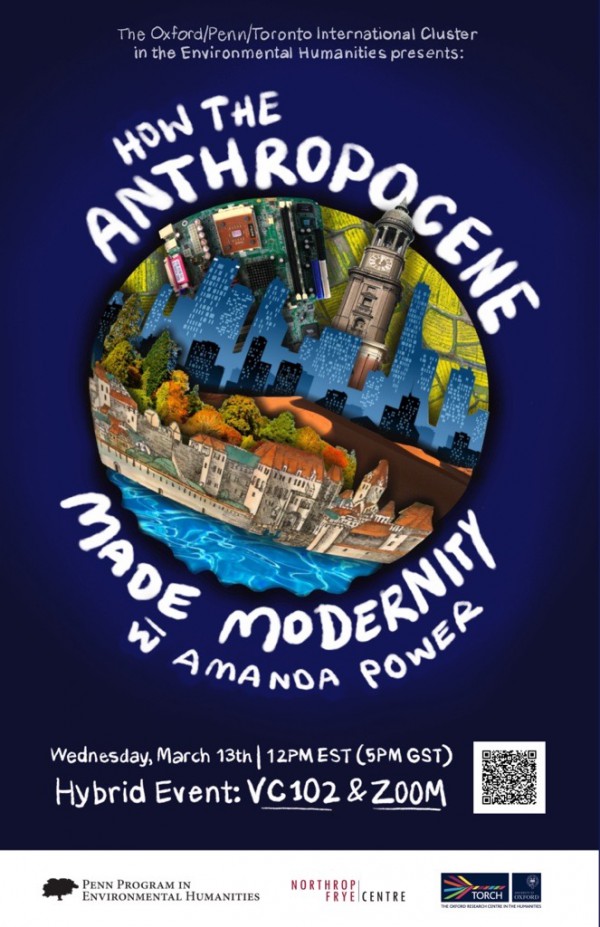
About the talk...
The formal diagnosis of Anthropocene through physical markers of human transformations of the earth priorities a materiality that asks ‘when’ before ‘how’ and ‘why’. In this talk Amanda Power shows how early expansionist policies across the globe envisaged ‘civilization ’as the successful exploitation by elites of landscapes, ecologies, and human and non-human life, such that ceasing to dominate the earth was an illegitimate choice.
About the speaker...
Amanda Power, Sullivan Clarendon Associate Professor in History at the University of Oxford, is a historian of religion, power, and intellectual life in medieval Europe. She is involved in an AHRC-funded collaborative network concerning‘ stateless ’spaces in the global Middle Ages, and her current monograph project, Medieval Histories of the Anthropocene, queries the relations of religion, power, and the construction of public rationality in building states across Eurasia.
April 6, 2024 | Franz Kafka's World Before the Law | William E. Conklin
Franz Kafka's World Before the Law
APRIL 6, 2024 | 2 p.m.
Northrop Frye Centre (VC102)
91 Charles St West Toronto, ON M5S1K5
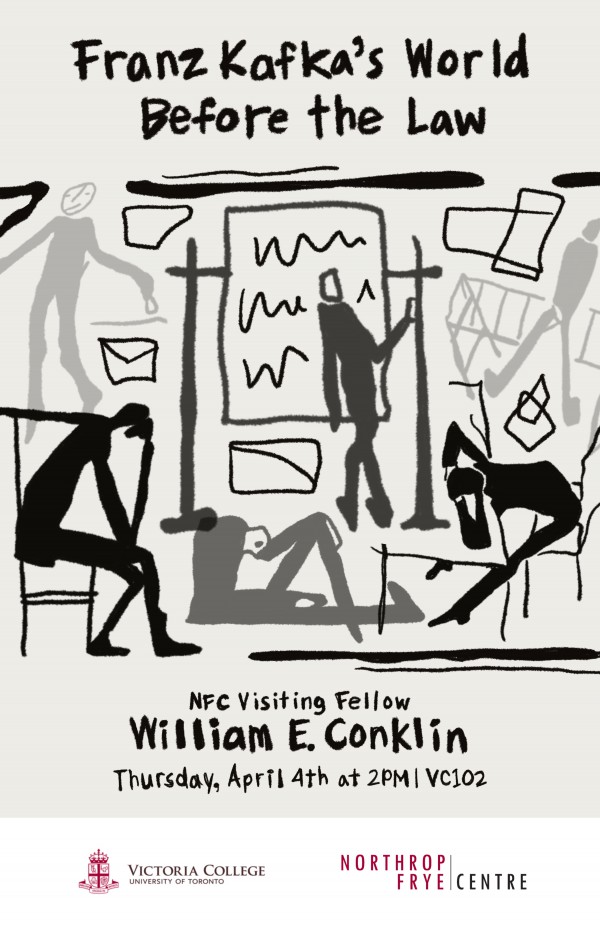
About the talk...
In his parable about a man from the country who seeks justice before the law, Franz Kafka, an insurance lawyer, describes how the man waits to be recognized by the legal officials before he can gain entrance to the Law. Alas, waiting indefinitely before the Law, the legal officials inside the Law never recognize the man, let alone the harm which generated his desire to access the Law. Instead, the doorway otherwise opened into the law is closed. Two boundaries separate the man from the Law, the one is the boundary of legal knowledge from inside the Law and the other is the boundary as conceived by the man. I shall focus upon the territorial-like space between the two boundaries of knowledge. I shall argue that such a space opens into a world before the Law. I shall suggest the nature of such a world.
About the speaker...
Elected as a Fellow of the Royal Society of Canada in 2014, William E. Conklin has authored seven books, co-edited two anthologies, was the chief editor for six volumes and the first editor-in-chief of the Windsor Yearbook of Access to Justice, and authored over 70 peer-reviewed articles. His recent research and publications are preoccupied with the study of legal experience and especially the experiential senses of law shared by communities excluded from the dominant formal and state-centric sense of law. Drawing heavily from Phenomenology, his examples pertain to de jure, diplomatic and effectively stateless peoples as well as nomadic and quasi-nomadic communities.
May 27, 2024 | The Lighthouse as Tree | Dr. Emily Kopley
The Lighthouse as Tree: Vanessa Bell’s Cover of To the Lighthouse and Virginia Woolf’s 1902 Edition of Wordsworth
MAY 27th, 2024 | 4:00PM
Northrop Frye Centre (VC102)
91 Charles St West Toronto, ON M5S1K5
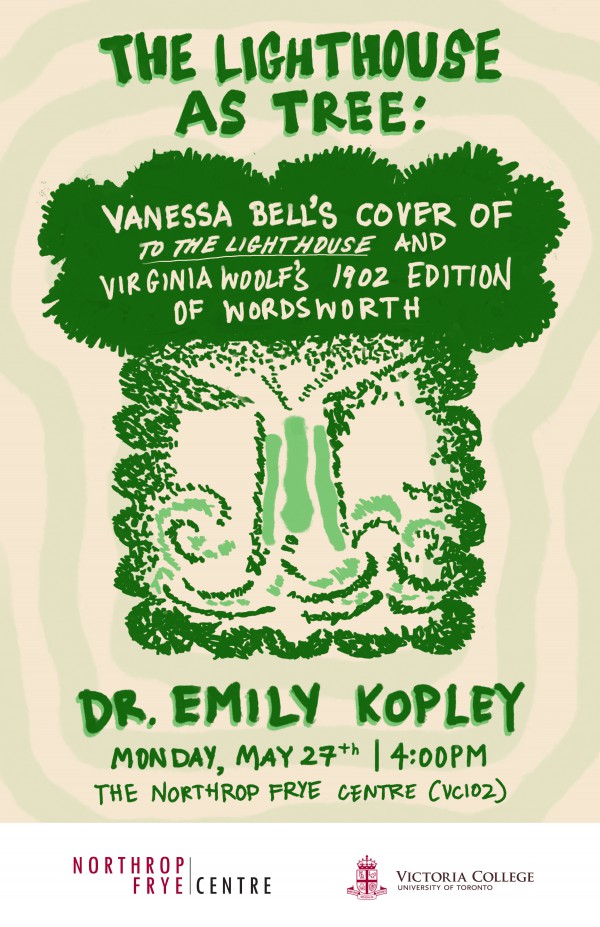
About the talk...
Vanessa Bell’s dust jacket for To the Lighthouse (1927) features an abstract lighthouse that doubles as a tree. The novel’s concern with trees supports this reading, as does an apparent source for Bell’s cover design, a sketch of three trees on the back endpapers of Virginia Woolf’s 1902 edition of Wordsworth. Recognizing the sketch as a source for Bell’s cover enriches the novel’s memorialization of Leslie and Julia Stephen, the parents of Woolf and Bell.
After defending the cover design as both lighthouse and tree, I trace the provenance of Woolf’s 1902 Wordsworth—or as much of the provenance as I have been able to determine. I explore the novel’s textual debt to Wordsworth, particularly his Immortality Ode. I then explore the book’s material debt to the poet, or rather to Woolf’s copy of his works. Leslie Stephen turned to Wordsworth when mourning his first wife and, later, his second, and wrote of Wordsworth’s consoling power in his letters, in the essay “Wordsworth’s Ethics” (1876), and in a memoir that his children called “the Mausoleum Book.” Woolf and Bell followed their father in their reading: they looked to Wordsworth, and to the 1902 volume specifically, to help them make remarkable art that immortalizes their dead.
About the speaker...
Emily Kopley (BA Yale, PhD Stanford), is the author of Virginia Woolf and Poetry (OUP, 2021), a critical biography. Her essays on Woolf appear in the TLS, Review of English Studies, English Literature in Transition, Teaching Modernist Women's Writing in English (MLA, 2021), Unpacking the Personal Library (Wilfred Laurier UP, 2022), and elsewhere. She is on the board of Woolf Studies Annual and has received grants from the Mellon Foundation, the Robert B. Silvers Foundation, and the Conseil des arts et des lettres du Québec. She teaches at McGill University, in the Department of Jewish Studies.
2022-23 Events
Oct. 25, 2022 | Performing Dialogue in Courtly Poetry from Medieval England and Wales | Morgan Moore
Performing Dialogue in Courtly Poetry from Medieval England and Wales
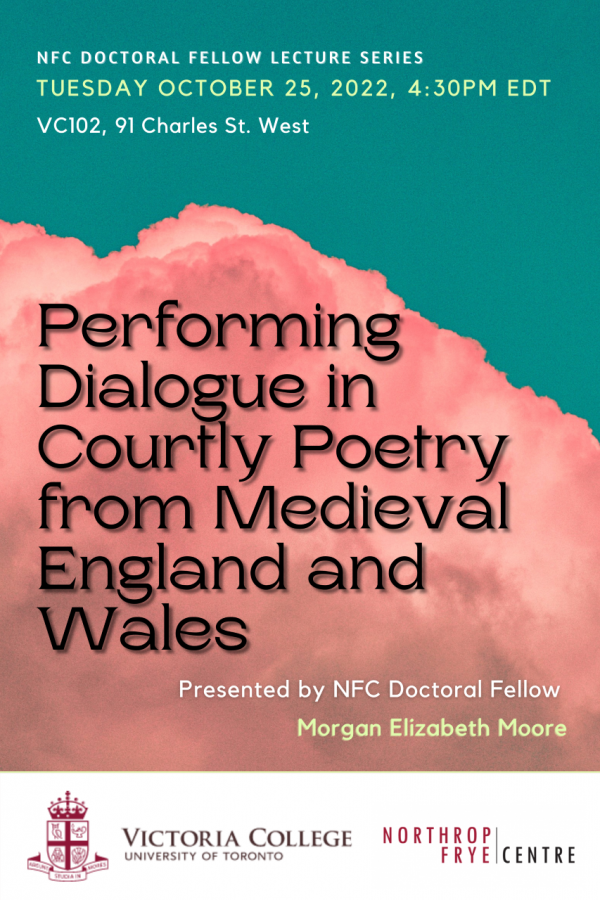
About the talk
About the speaker
Nov. 24, 2022 | If You Give a German Some Film | Eriks Bredovskis
If You Give a German Some Film: Three Sources and the Voyage of the Falke in the Pacific Northwest, 1905
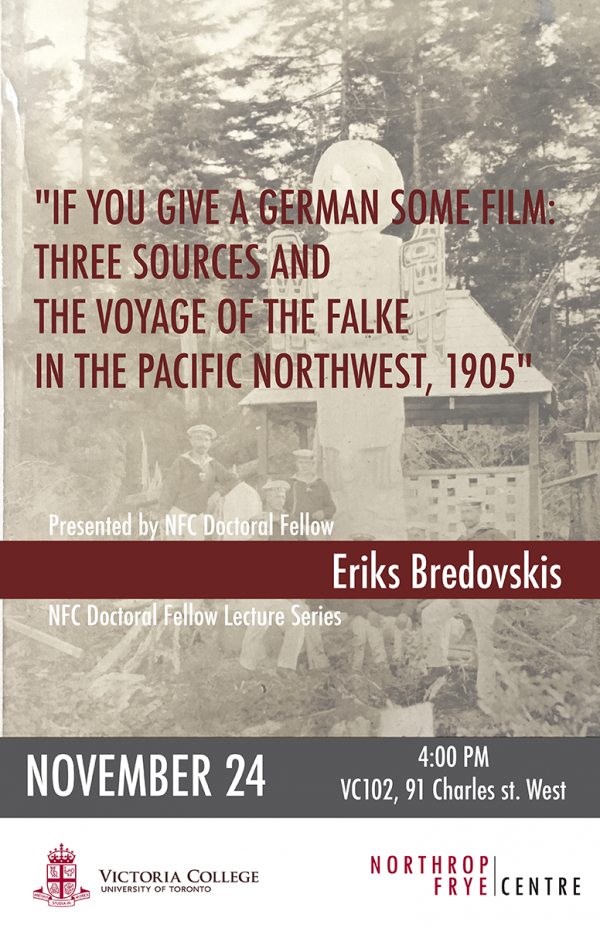
About the Talk
What happens when a German naval captain, who travels around the world, gets his hands on a camera? This paper, taken from one chapter of my dissertation, asks that question. I follow a German cruiser, the Falke, in the Summer of 1905 when it travelled up and down the west coast of North America on a multi-year tour of the Americas. Three sets of documents remain of his voyage: his official reports to the Imperial Naval Office, his private diary, and his scrapbook. Taken separately, each set of documents narrates a very different experience in the Pacific Northwest. The official reports prioritize American and British military and economic expansion—it also portrays the region as void of women and Indigenous people. Behncke’s diary and scrapbook, however, recount the various parties Behncke attended, the landscapes he enjoyed, and the white settlers he met, thus suggesting the west coast as a lively space for socialization and forming global connections, albeit for Europeans. The postcards and personal photographs in Behncke’s scrapbook further show how cultural assumptions (German, masculine, or European) affected what he thought was worth spending valuable film on or be remembered through a commercially purchased postcard. When we look at these sources together, we see how even when Germans were visitors to non-German colonies, they behaved like it was their own. Behncke’s voyages (and these three sets of documents) provides a unique window through which we can examine the making of Germany’s ideas of a globalized and interconnected imperial world.
Feb. 9, 2023 | Gothic Mediums | Colleen McDonell
Gothic Mediums
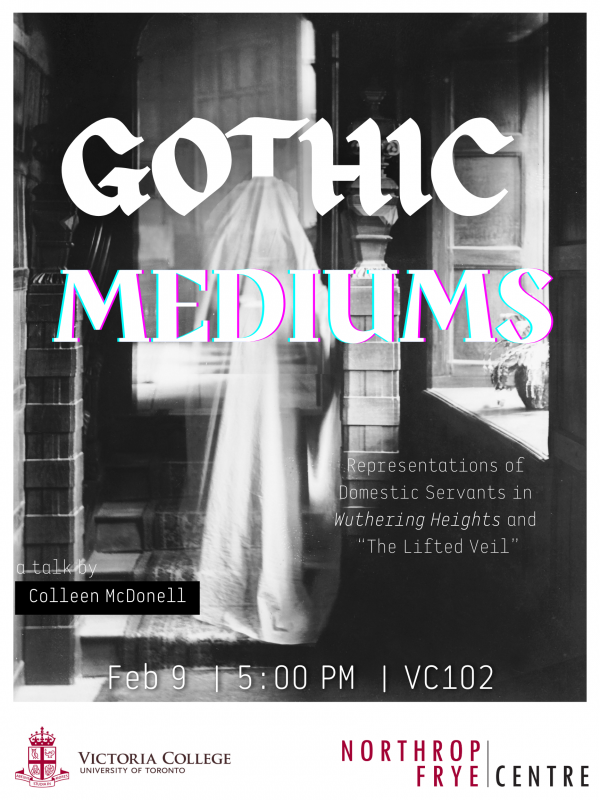
About the talk
For most of Queen Victoria’s reign, domestic servants were the largest category of workers, labouring and often living under the same roofs as their employers. At the same time, Gothic fiction became increasingly domesticated: moving away from the remote pasts and foreign places of eighteenth-century Gothic novels, the genre was projected instead onto more familiar, everyday settings for middle-class British readers. My dissertation analyzes servant characters in Victorian Gothic fiction, arguing that these maids, butlers, and housekeepers are often represented as “mediums” in how they interact with the dead and serve as channels of communication between different social classes. In this talk, I take Emily Brontë’s Wuthering Heights (1847) and George Eliot’s “The Lifted Veil” (1859) as case studies for exploring this servant-medium dynamic and turn briefly to its depictions in magazines of the period. Studying the servant figure in Victorian Gothic fiction provides insight into theories of non-realist genres as well as (mis)conceptions of domestic labour—conceptions that may continue to haunt contemporary literature.
Colleen McDonell is a Ph.D. candidate in English and the collaborative Book History and Print Culture program. Her dissertation analyzes servants in Victorian Gothic fiction and how these characters can act as “mediums” within the home. More broadly, this work examines domestic space as a nexus between fear and fraught representations of class and labour.
Outside of her research, Colleen has served as the Canadian Graduate Representative for the North American Victorian Studies Association, as a co-convener for the Nineteenth Century Reading Group in the Department of English, and as a printing volunteer at the Massey College Bibliography Room. In her free time, she enjoys painting, practicing yoga, and going on ghost tours.
Mar. 2, 2023 | Equivocal Image-Writing | Hong Liu
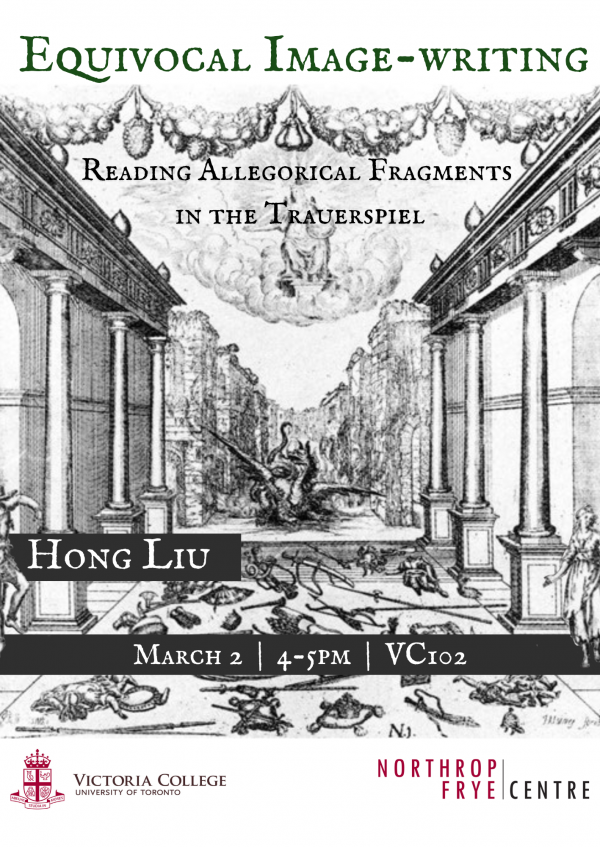
About the speaker
Hong Liu is a PhD candidate in the Centre for Comparative Literature at the University of Toronto. Her research traces the entanglement of tragedy and history in early-modern European theatrical culture and intellectual history (1597-1665) by exploring cultural-historical concepts including melancholy and allegory. Her work explores how early-modern theatre's organization of social affects and historical consciousness continues to inform contemporary theorization of sovereignty, freedom, and democracy.
Before starting her PhD study, Hong worked in theatre and publishing. She continues to work as a translator of non-fiction books about art and nature. She is also a volunteer and advocate for reproductive rights and justice.
Mar. 16, 2023 | NFC Annual Lecture | Julie Beth Napolin
NFC Annual Lecture: Julie Beth Napolin
"Unrecordable Sound"
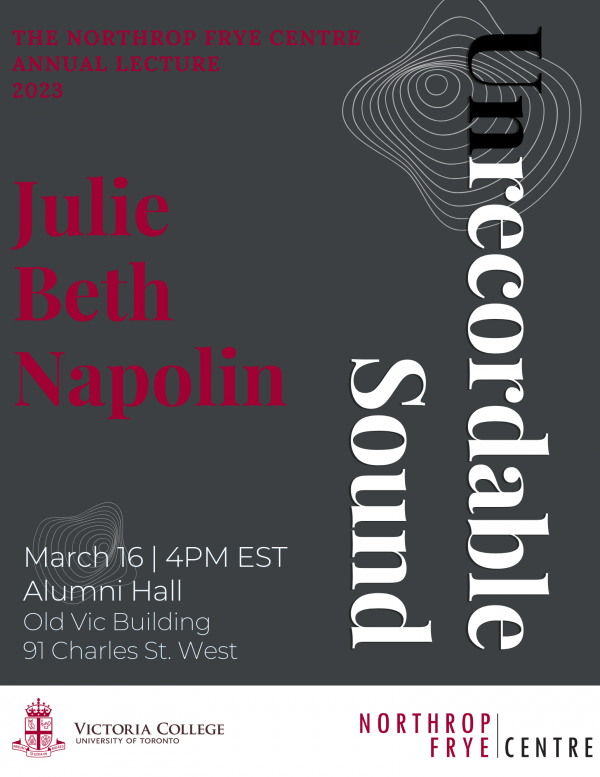
About the talk...
This is a talk about the history of sound technology and the racial unconsciousness, and the ways sound technology is implicated in the history of racist violence in America. Technology is part and parcel of the racial unconscious, or what it means to imagine race. My talk touches on literature as it records sounds that other media cannot, both representing the sonic imaginary of racist terror and lynching, while also stepping into future worlds. Drawing on literary cases from William Faulkner and Harlem Renaissance writer Angelina Weld Grimké, I argue for what I call “heterophonia” in literature, wherein it becomes impossible to determine whether a sound has been recorded or is naturally vibrating, and for literature as predicting technologies like the microphone and headphones.
About the Speaker...
Julie Beth Napolin is a scholar, musician, and radio producer. She is the co-President of the William Faulkner Society, a member of the editorial board of Sound Studies: An Interdisciplinary Journal, and a member of the MLA Sound Forum executive committee.
She works across sound, modernism, memory studies, digital humanities, film and media, race, gender and sexuality, narrative and novel theory, and psychoanalysis. She is particularly interested in the history of sound reproduction and its intersections with the history of the novel, art, and film and media, asking what practices of technological listening can tell us about the politics of memory and form. Her essays on sound in the work of Joseph Conrad have been awarded the Bruce Harkness Prize (2013) and the J.H. Stape Conradiana Prize (2020). She completed a PhD in Rhetoric at UC Berkeley with Ramona Naddaff, Trinh T. Minh-ha, Judith Butler, and Carolyn Porter.
The Lecture will be held in-person at Alumni Hall, Old Victoria College Building (91 Charlest St. West).
Mar. 23, 2023 | NFC Visiting Fellow Lecture 2022-23 | Thomas Peattie
"'...the mud on our shoulders...': Luciano Berio and the Postwar Historical Imagination"
This is a virtual event; a Zoom link will be sent out to those who register for a virtual attendance ticket.
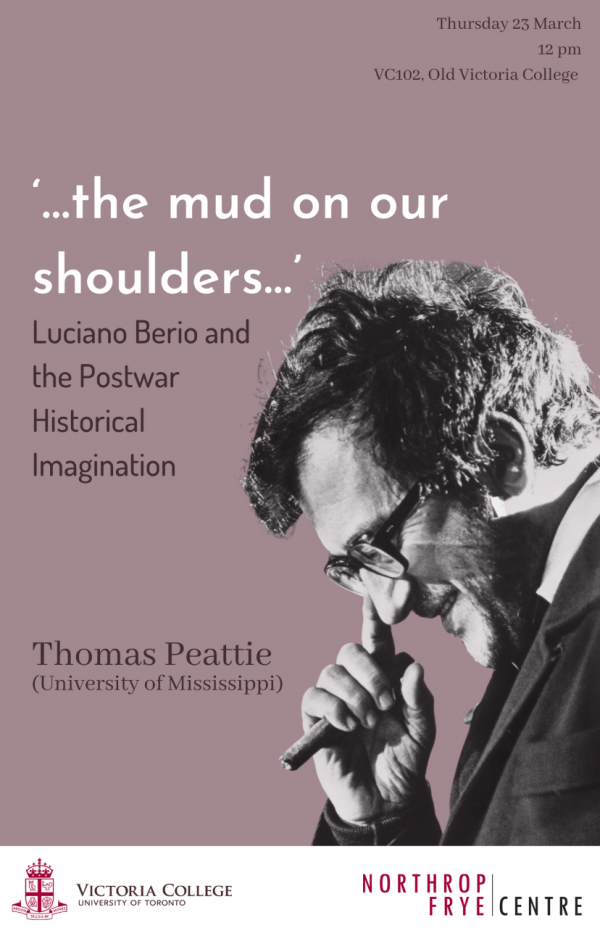
About the talk...
In a 1999 interview, Luciano Berio offered an admiring description of what is perhaps the most singular feature of Gustav Mahler’s songs and symphonies: namely, that this music is, at its core, “inhabited by other music.” Although most works are in dialogue with a wide range of historical models, there is much in Berio’s deceptively straightforward observation that deserves more careful attention, especially as it concerns the composer’s own relationship to music history. Indeed, Berio’s evident attraction to the idea that music might be inhabited by other music reveals a clear understanding of the more general idea that works of art are always marked by their precedents, “the mud on our shoulders” as the composer’s sometime collaborator Edoardo Sanguineti put it. Whereas for Berio one of the most important generating forces of a work’s musical identity is an explicit dialogue with its own history, it is ultimately the self-conscious nature of this dialogue that allowed Berio to see the composers he transcribed as fellow travellers in a landscape in which music is, by definition, always about music. In this paper I consider two categories of “music about music” in Berio’s transcribing practice in order to highlight the composer’s unique attitude toward the musical past in the context of the postwar avant-garde. The first category concerns the use of quotation and allusion, a practice that in Berio’s hands shares a number of surprising similarities with the kind of intertextual strategies found in much nineteenth-century music. The intertextual references in the second category, by contrast, have their origins in a far broader sound world drawn from Berio’s own [re]construction of specific sonic events both real and imagined.
About the speaker...
2021-22 Events
In 2021-22, the Northrop Frye Centre adapted to the changing circumstances caused by the COVID-19 global pandemic by continuing to grow our virtual community. While the majority of events took place online, happily, we were able to hold our celebration of the research of our 2021-22 Undergraduate Research Fellows in person. Some highlights for this year include the 2021 Brian Merrilees Lecture delivered by John McClelland in the Northrop Frye Centre and broadcasted on Zoom, our annual Doctoral Fellow Lecture Series, and our Northrop Frye Centre Lecture delivered by Ursula K. Heise (UCLA).
Nov. 16, 2021 | NFC Doctoral Fellow Lecture | Dur-e-Aden
The Recruitment of Individuals Within Radical Right-wing Groups in Canada
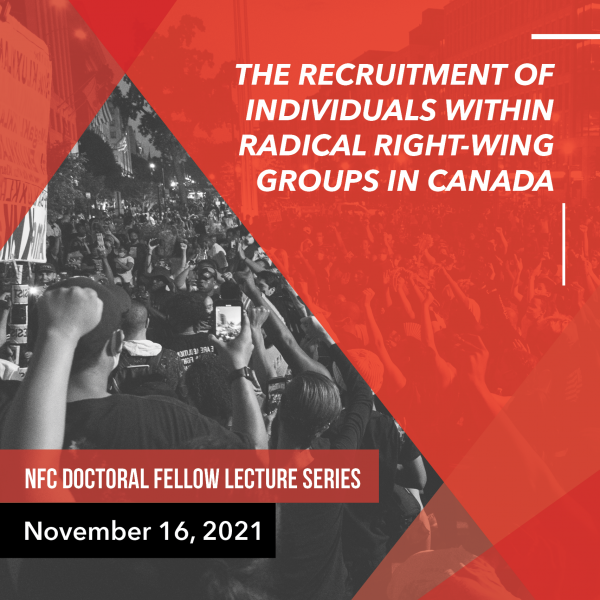
Date: Tuesday, Nov. 16, at 4:00pm EST.
Speaker: Dur-e-Aden
YouTube Link: https://youtu.be/Yjb3K0l2Orw
About the talk
At any given time, a lot of individuals in society have social, political, or economic grievances. Yet only a few become mobilized to in support of a cause, group, or a movement. By focusing on radical right-wing milieu in Canada, my research asks the following question: Why are some men and women becoming mobilized in support of radical right-wing groups in Canada? Drawing on ethnographic field work and primary interview data collected from 2018-2020 by talking to active members of these groups and attending their protest activities, I begin to answer this question by understanding the motivations of individuals at the micro (individual), meso (friends and family), and macro (socio-political factors) levels. I find that despite an intense focus on social, political, economic, or cultural grievances, mobilization is a complex process involving an interaction between all three levels in a person’s life. I conclude by discussing the implications of my findings for government policies against radicalization, along with a discussion of the importance of primary source data in moving the academic field of security studies forward.
Nov. 19, 2021 | The 2021 Brian Merrilees Lecture | Speaker John McClelland
The 2021 Brian Merrilees Lecture
Date: Nov. 19, 2021
Speaker: John McClelland
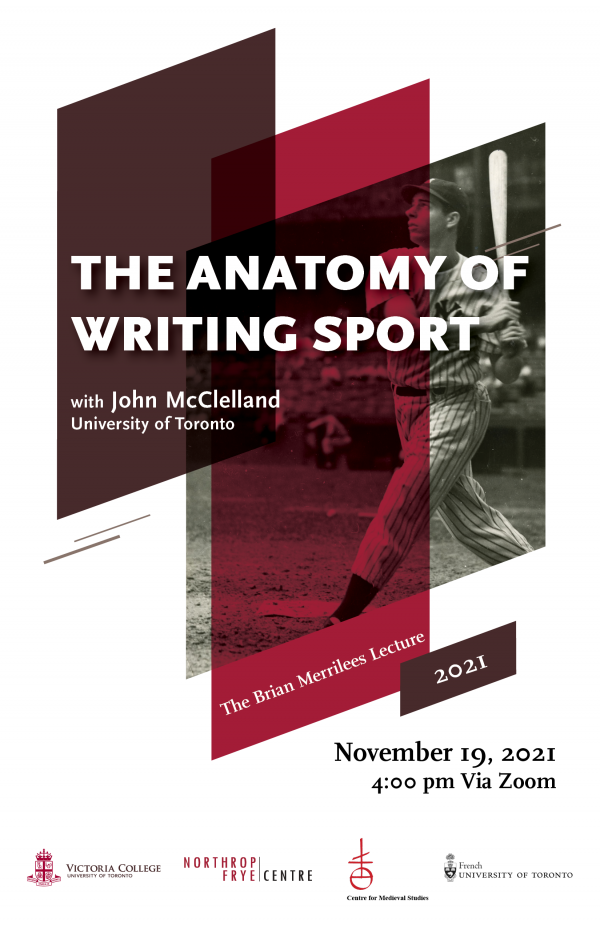
About the talk
The first part of the lecture will be devoted to what I mean by “syntax” and “anatomy” and why I use the phrase “writing sport” instead of the more common “sports writing.” I will then examine (though not in chronological order) three genres of verbal accounts of sport and athletic contests: chronicles of historical sports events, from the 5th century C.E. to more or less the present; discursive descriptions and analyses of athleticism and of the practice of specific sports from Galen and Philostratus to Joe Di Maggio and George Will; and the formulation of sports rules, from the late 13th century to the mid-18th, with some reference to the 21st-century versions of these rules. In the final part of the lecture I will attempt to integrate writing sport into the larger concerns of the ambient culture
About the speaker
A graduate of Victoria College (Honours Modern Languages, 5T6), M.A. in French Literature at U. of T. (1958) and Ph.D. in Romance Languages at the University of Chicago (1965) with a thesis on Pontus de Tyard, a sixteenth-century poet and polymath. Prior to accepting a tenurable position in the Vic French Department in 1964, taught English at the Collège National Technique et Moderne de Garçons in Reims (France) and both French and Spanish at Mount Allison University and the University of Western Ontario. Also held visiting professorships at the Centre d’Études Supérieures de la Renaissance in Tours (France), at the International Summer Institute for Semiotic and Structural Studies (Toronto), at the Institut für Sportwissenschaften in the Georg-August Universität (Göttingen, Germany), at the University of California in Santa Barbara (U.S.A.), and at the Université de Rennes-II Haute Bretagne (France).
In addition to ongoing teaching, research, and publication in French literature of the 16th and (to a lesser extent) the 19th centuries, has done extensive work on the relations between poetry and music, on rhetoric (both ancient and modern), on textual criticism, and most especially and recently, on sport from Roman times to the European 17th century.
Nov. 30, 2021 | NFC Doctoral Fellow Lecture | Marina Dumont-Gauthier
Transatlantic Exposures: German Photographers in Buenos Aires and the Female Lens
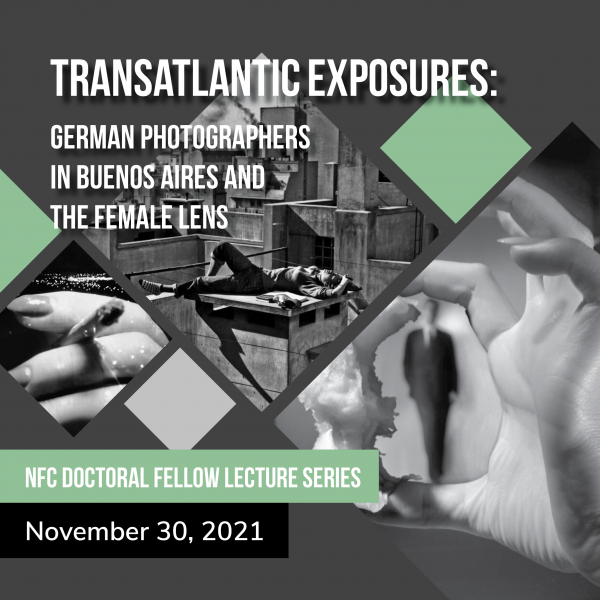
Date: Tuesday, November 30, 2021, 4:00pm EST
Speaker: Marina Dumont-Gauthier
To watch the livestream on Youtube, click here.
Focusing on the role played by female photographers in the wake of Buenos Aires’ photographic avant-garde, my research investigates the works of German-born photographers Annemarie Heinrich, Grete Stern, and Gisèle Freund, who all emigrated to Argentina between the mid-1920s and early 1940s. My protagonists, all being female Jewish German photographers from a similar age group, and all living in Buenos Aires during the 1940s, would have been aware of each other’s works. And yet, despite their impact on the photographic history of Argentina, there has yet to be a comprehensive account of how their works collectively influenced the development of photography in the country.
The compelling trajectory of these women is made even more notable considering the enduring uneasiness to approach “non-Western art” on the same plane as “Western art.” Where do we place these women? Are they German or Argentine? Do they belong to what has been labelled as the “centre” or to the “peripheries”? How does that impact the ways in which their works is read and evaluated? In an effort to answer these questions my dissertation also explores the role played by Buenos Aires. Dubbed, “the Paris of the South” around the end of the nineteenth century, it resisted exoticizing stereotypes associated with Latin America perhaps more than any other of its cities. As such, Buenos Aires, and the presence of these women in it, allow for a critical reassessment of how we have come to understand cross-cultural encounters, gender dynamics, non-Western spaces, and the modern art canon.
Marina Dumont-Gauthier is a PhD candidate in the Graduate Department of Art History at the University of Toronto. Her current research explores the role played by female photographers in the wake of Argentina's photographic avant-garde and its subsequent development in the country, focusing on the works of German-born photographers Gisèle Freund, Annemarie Heinrich, and Grete Stern, between the mid-1930s and the early 1950s.
Since starting her PhD, Marina was a Graduate Intern in the Department of Photographs at the J. Paul Getty Museum (2019–20). She also completed a research internship in the Department of Photography at the Museum of Modern Art in New York (2017). Her doctoral research is funded by the Ontario Graduate Scholarship (2016–2017, 2020–2021) and the Joseph-Armand Bombardier Doctoral Award (2017–20).
Feb. 16, 2022 | NFC Doctoral Fellow Lecture | Nattapol Ruangsri
Lessons from Environmental Narratives in Post-WWII Italy
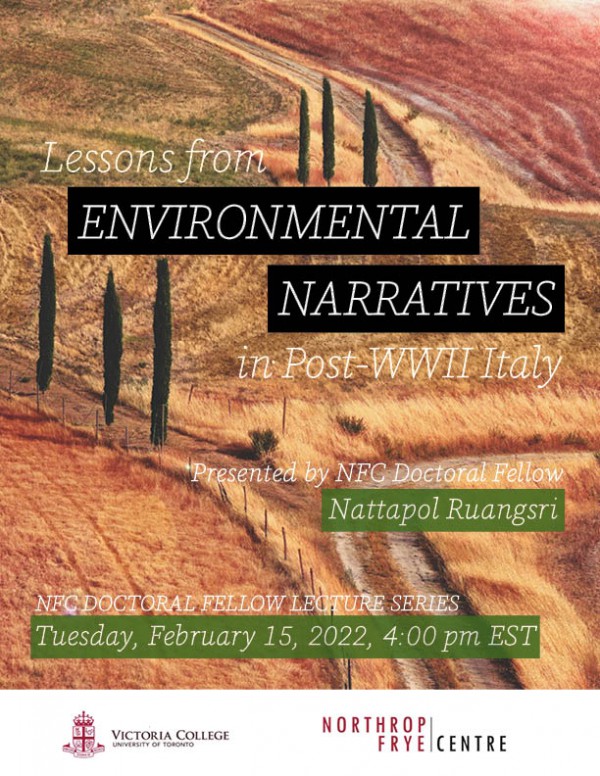
Date: Tuesday, Feb. 16, 2022, 4:00 pm EST
Speaker: Nattapol Ruangsri
Youtube Link: https://youtu.be/PUIlsiPNucI
About the talk
About the speaker
Mar. 9, 2022 | NFC Doctoral Fellow Lecture | Filippo Sposini
From Persons to Cases: The Global History of Lunacy Certificates (1850s-1890s)
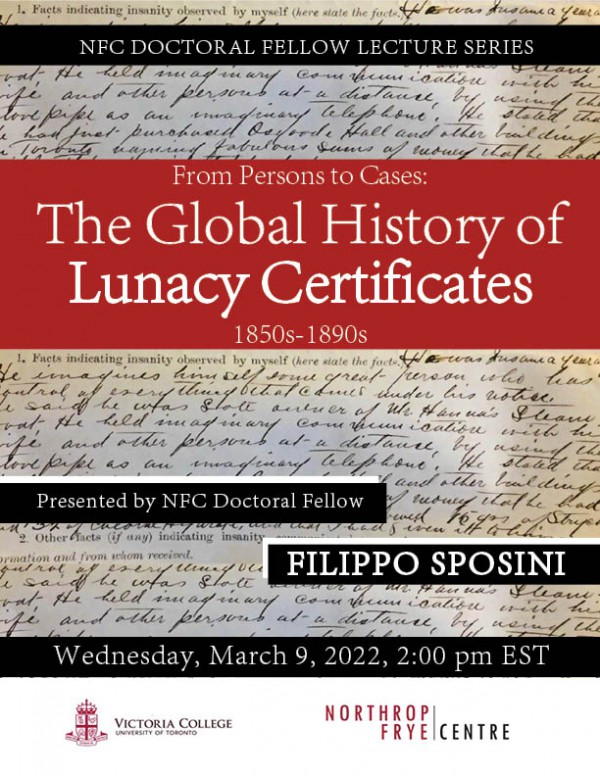
Date: Wednesday, March 9, 2022, 2:00 pm EST
Speaker: Filippo Sposini
Youtube Link: https://youtu.be/3fD3aRUch5A
About the talk
The certification of insanity was a medico-legal procedure that became an essential step for civil confinement into lunatic asylums. By mid-nineteenth century, many jurisdictions followed the so-called “British system of certification” which involved two medical practitioners personally examining the alleged insane. Each doctor was required to fill a standardized certificate which required them to indicate “facts of insanity personally observed” and “facts of insanity communicated by others”. Only after the completion of this form, people could be officially certified as insane and be recommended for asylum treatment.
Despite the medical, legal, and social impact of the certification process, we still know very little about this procedure. This presentation will trace the development of the “British system of certification” for then exploring its international diffusion in the British empire during the second half of the nineteenth century. It will explore how practitioners engaged with their role as certifiers, how they proposed to depict “facts of insanity”, and the legal bearings of their actions.
By considering its transnational trajectory, the presentation will suggest that the certification of insanity provides an interesting opportunity for addressing the origins of stigma in mental health and disability. As statutory documents holding legal power, certificates of insanity transformed family concerns into a medical, social, and political issue. Not only personal examination exposed intimate family dynamics to the public, but it also created a written record difficult to erase from bureaucracy and social memory.
About the speaker
Trained as a psychologist in Italy and the US, Filippo Sposini is a PhD Candidate at the Institute for the History and Philosophy of Science and Technology (IHPST). Before moving to Canada, he worked as a health promoter in several reception centers for refugees in Italy and as a head-hunter for a Dutch multinational firm. His dissertation, entitled The Certification of Insanity: Local Origins and Global Consequences, explores the emergence of the "medical certification of insanity" in the nineteenth century. Taking a transnational approach, he looks at the influence of the "British system of certification” around the world. His research engages with some of the most delicate issues in contemporary health policy, including stigma, expertise, and human rights. He collaborates with the WHO’s Mental Health Unit on the MindBank Project. Passionate about Digital Humanities, he created mindthepast, a website dedicated to health and disability rights in history. In his free time, Filippo enjoys Delta Blues and Trail Running.
Mar. 17, 2022 | The Northrop Frye Centre Lecture | Ursula Heise
The Northrop Frye Centre Lecture, Beyond Apocalypse: Climate Change and Urban Narrative
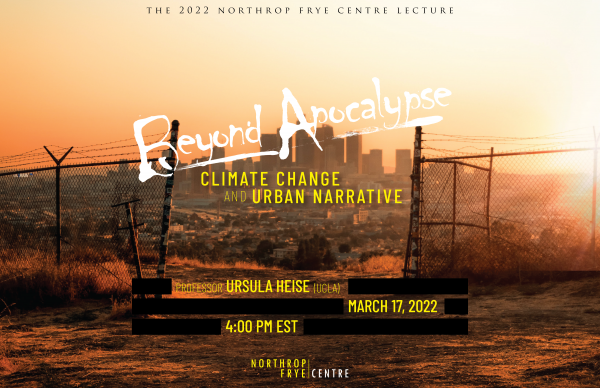
Date: Mar. 17, 2022
Northrop Frye Centre Lecture
Speaker: Ursula Heise (UCLA)
YouTube Link: https://youtu.be/kO3jHFUTLDw
About the talk...
This talk centers on the topic of climate change and narrative form. Beginning with a consideration of the Anthropocene and how it has become shorthand for climate change before moving to the challenges of representing the climate emergency in conventional, realist narrative, Professor Heise considers speculative narrative’s capacity to measure up to the challenge of global heating. Special attention will be given to Nguyễn-Võ Nghiêm-Minh's 2014 film Nước 2030 [Water 2030] and Kim Stanley Robinson's New York 2140 from 2017.
About the speaker...
Ursula K. Heise is Chair of the Department of English at UCLA. She holds the Marcia H. Howard Term Chair in Literary Studies and serves as Interim Director of the Lab for Environmental Narrative Strategies (LENS) at the Institute of the Environment and Sustainability at UCLA. She is a 2011 Guggenheim Fellow and former President of ASLE (Association for the Study of Literature and the Environment). Her research and teaching focus on contemporary literature and the environmental humanities; environmental literature, arts, and cultures in the Americas, Western Europe, and Japan; literature and science; science fiction; and narrative theory. Her books include Chronoschisms: Time, Narrative, and Postmodernism (Cambridge University Press, 1997), Sense of Place and Sense of Planet: The Environmental Imagination of the Global (Oxford University Press, 2008), Nach der Natur: Das Artensterben und die moderne Kultur [After Nature: Species Extinction and Modern Culture] (Suhrkamp, 2010) and Imaging Extinction: The Cultural Meanings of Endangered Species (University of Chicago Press, 2016), which won the 2017 book prize of the British Society for Literature and Science. She is editor of the series Natures, Cultures, and the Environment with Palgrave, and co-editor of the series Literature and Contemporary Thought with Routledge. She is co-editor of the Routledge Companion to the Environmental Humanities (Routledge, 2017) and Managing Editor of Futures of Comparative Literature: The ACLA Report on the State of the Discipline (Routledge, 2017). She is also the producer and writer of Urban Ark Los Angeles, a documentary created as a collaboration of LENS with the public television station KCET-Link.
April 6, 2022 | NFC Undergraduate Fellows' Research Presentations
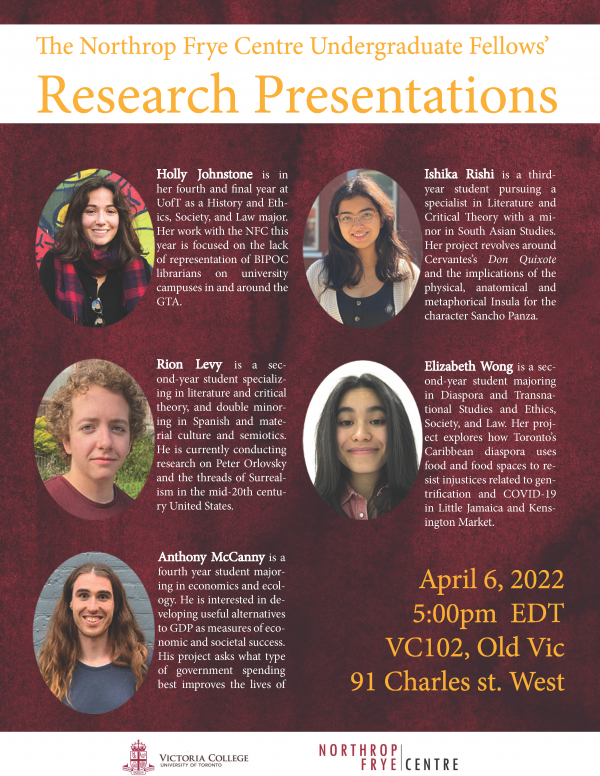
We're pleased to invite you to our annual Northrop Frye Centre Undergraduate Fellows' Research Presentations on Wednesday, April 6 at 5:00 pm. The event will take place in-person in VC102, Old Vic, 91 Charles st. West, Toronto.
Join us to learn more about the incredible research of our Undergraduate co-hort.
All are welcome! Please feel free to circulate widely.
2020-21 Events
2020-21 and the COVID-19 pandemic posed a challenge to the NFC: How do we continue to create a cross-generational academic community in this uncertain time? We did our best to rise to the occasion by offering virtual lectures, seminars and reading groups. Our seventh annual Northrop Frye Centre Lecture, “The Scarlet Thread: Unravelling the Fabric of Crime”, was delivered by Professor Alison Matthews David (Ryerson) . We had excellent engagement with our doctoral fellows, who communicated the results of their ongoing research throughtout the year. And once again, the NFC Undergraduate Fellows shone during Vic’s annual Research Day.
Oct. 16, 2021 | Making Sense | Anastasiya Lyubas
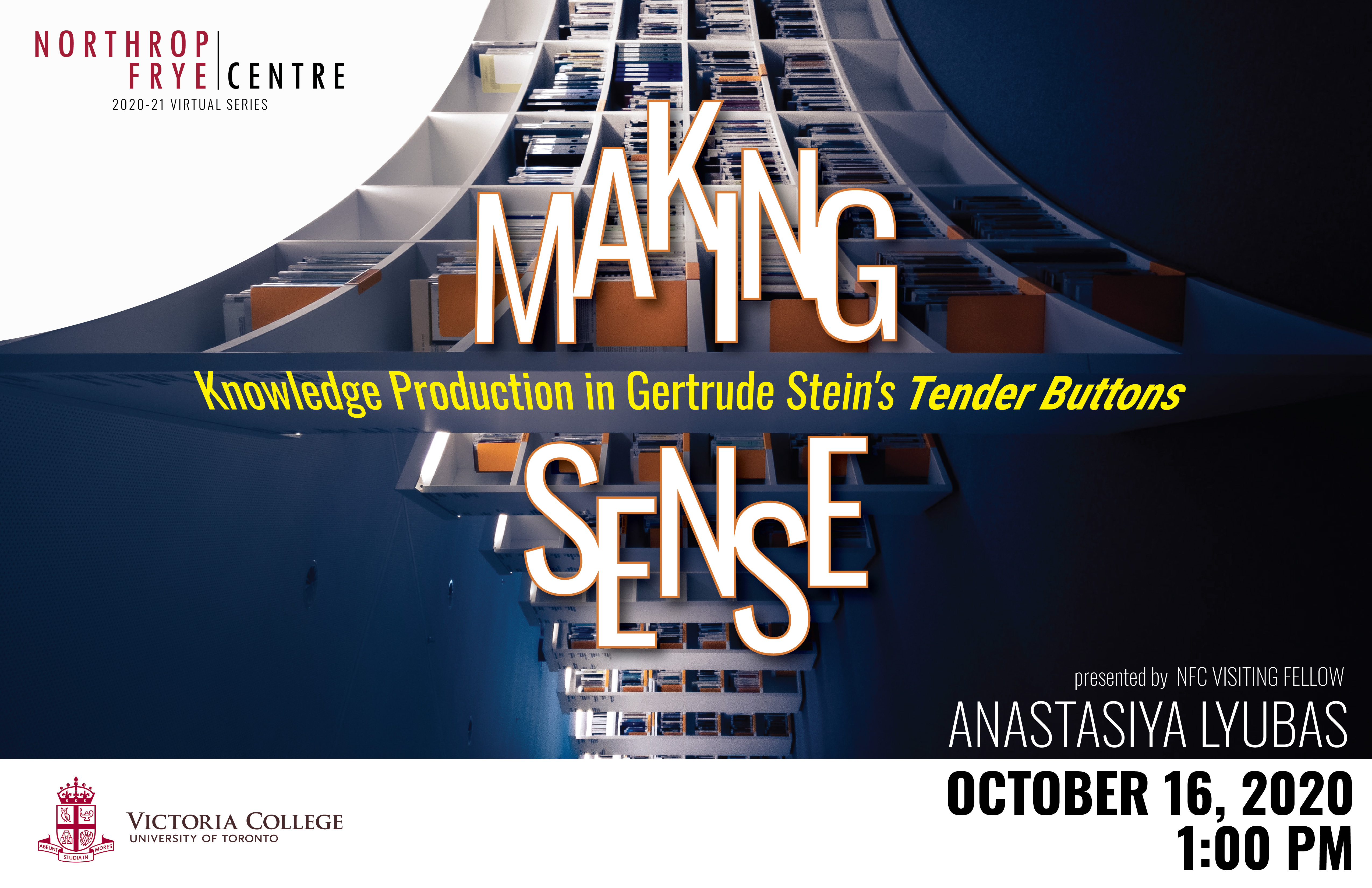
Making Sense: Knowledge Production in Gertrude Stein’s Tender Buttons
Oct. 16, 2021
Visiting Fellow lecture
Speaker: Anastasiya Lyubas (Binghamton)
YouTube Link: https://youtu.be/ZMcDO0qgl50
What does it mean to make sense? To know? What does it mean to know in language? And what is the interaction between sense and sensuous, the philosophical and the literary/fictional? These questions will be discussed through examination of Gertrude Stein's collection of prose poems Tender Buttons (1914). This talk will highlight that Gertrude Stein's "making sense" and the problematic of knowledge—defined as knowing—has to do with the interaction between the philosophical and the literary. Despite possible indications to the contrary, Gertrude Stein’s knowledge in Tender Buttons is not “knowledge about,” i.e. description, rather, it is knowing that comes from sensation, the intermingling of the sense and the sensuous.
About the speaker
Anastasiya Lyubas holds a PhD in Comparative Literature from Binghamton University (2018). She is the author of Blooming Spaces: The Collected Poetry, Prose, Critical Writing and Letters of Debora Vogel, a ground-breaking scholarly collection dedicated to the work of the Polish and Yiddish Modernist writer Debora Vogel (Boston: Academic Studies Press, October 2020). She is also the author of White Words: Essays, Letters, and Reviews by Debora Vogel, a scholarly volume of Vogel's texts in Ukrainian translations (Kyiv: Dukh i Litera, 2018). Anastasiya was a Visiting Research Fellow at the Modern Literature and Culture Research Centre (MLCRC) at Ryerson University, a Research Fellow at the YIVO Institute of Jewish Research in New York, a Translation Fellow at the Yiddish Book Center, and a Fulbright scholar. Her research has appeared or is forthcoming from Routledge Encyclopedia of Modernism, Nashim: A Journal of Jewish Women's Studies and Gender Studies, Translation: A Transdisciplinary Journal, and In Geveb: A Journal of Yiddish Studies. At NFC, Anastasiya will be working on her monograph project which investigates the limit shared between art and philosophy and the epistemological claims they make on the world. The study of the limit, or the site of plasticity between the sense (the philosophical, speculative) and the sensuous (the literary, fictional) will be explored through the works by Debora Vogel, John Dos Passos, Gertrude Stein, Béla Balázs, Rudolf Brunngraber, and Lu Märten.
Nov. 20, 2020 | Blackness, Decadence and the Crumbling Texts | Catia Dignard
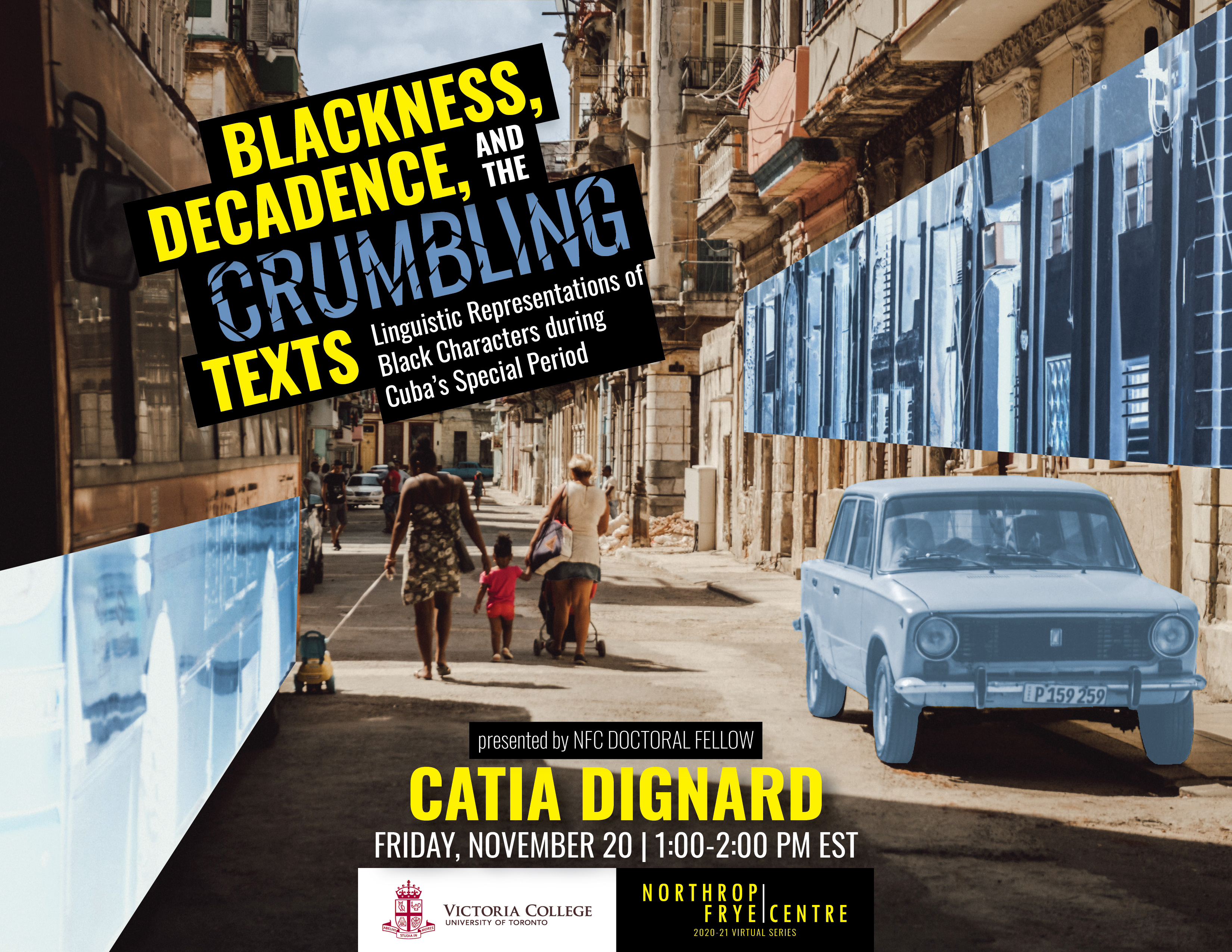
Blackness, Decadence and the Crumbling Texts: Linguistic Representations of Black Characters During Cuba’s Special Period
Friday, Nov. 20, 2020
NFC Doctoral Fellow Lecture Series
Speaker: Catia Dignard (Spanish & Portuguese)
YouTube Link: https://youtu.be/kXDRhidndX8
This talk is based on the analysis of El Rey de La Habana (1999) by Pedro Juan Gutiérrez, a novel that marks a turning point in Cuban contemporary fiction for touching upon the topics of Black marginality and racial discrimination that State discourse and equalitarian public policy had helped silence for over three decades. If scholarship has focused on the return to the stereotypical portrayals of Black characters during the 1990s, and that were common to the pre-revolutionary era, what has not yet been addressed is how differentiating linguistic traits (manner of speech) have been used to represent Black characters in more recent Cuban fiction, a narrative strategy that goes back to colonial times. I will argue that, apart from conveying “authenticity” (i.e. the details of the Havana slang) when building fictional characters, such as literary device, which is also present in El Rey de La Habana, can be considered a way to emphasize the Island’s socioeconomic and cultural decadence or “involution” during this decade of economic upheaval.
About the speaker
Catia Dignard is a doctoral candidate in the Department of Spanish and Portuguese. Her dissertation examines the topic of linguistic representations of Black characters in contemporary Cuban fiction, and how these reflect evolving notions of nationhood, class and race relations on the island. Her doctoral research is funded by the Social Sciences and Humanities Research Council of Canada, and draws upon literary and critical theory (postcolonial, critical race and disability studies), sociolinguistics and anthropology. Catia has previously coordinated student cultural exchanges in Nicaragua, Cuba and Italy as an Economics and Intercultural Studies professor. She is presently a course instructor with the Department of Spanish and Portuguese, a singer-songwriter and frequent visitor of Havana.
Jan. 28, 2021 | Archival Stories of Food, Airplanes, and Museums | Mihalache, Zanoni
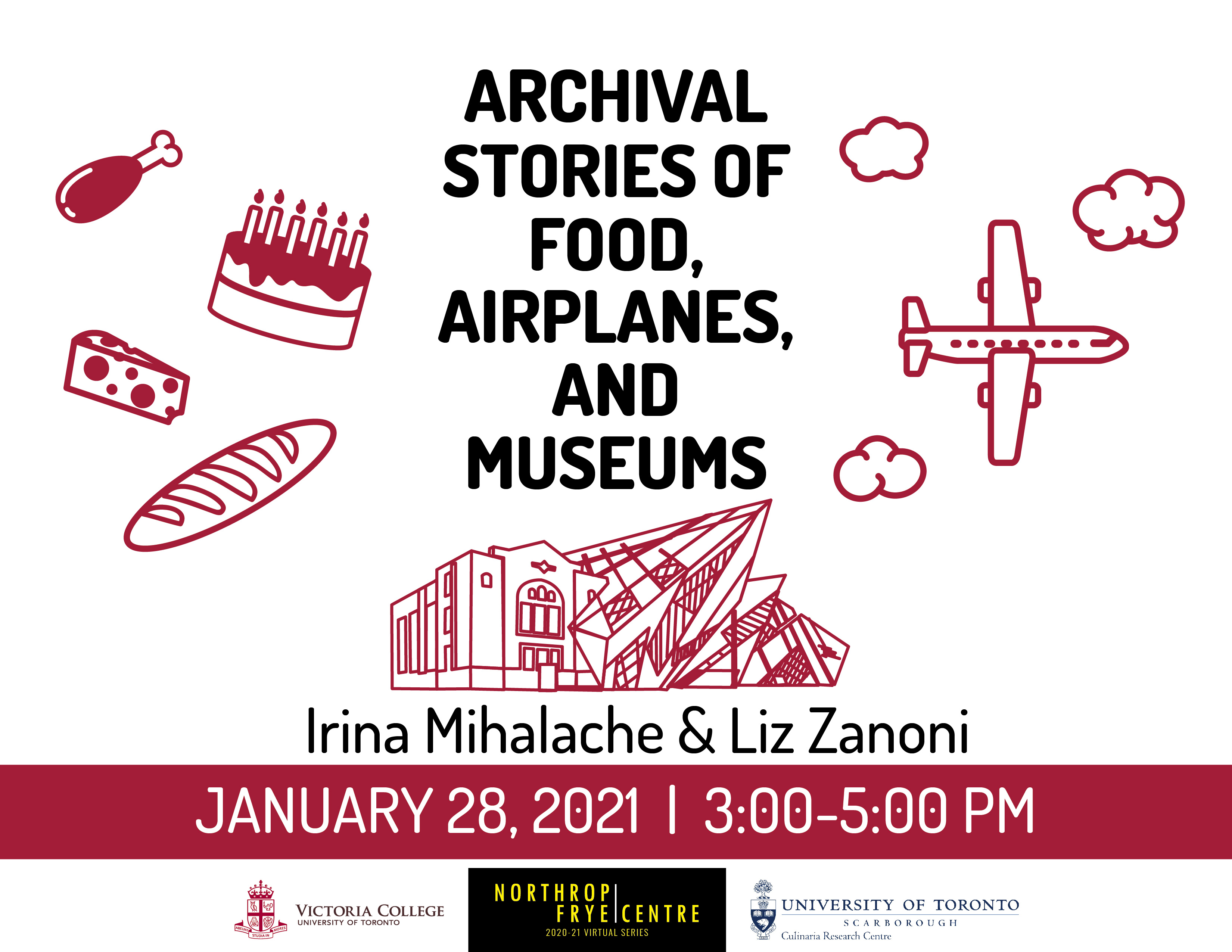
Archival Stories of Food, Airplanes, and Museums
Jan. 28, 2021
Co-sponsored lecture with the Culinaria Research Centre
Speakers: Irina D. Mihalache & Elizabeth Zanoni
Dr. Elizabeth Zanoni is Associate Professor of History at Old Dominion University in Norfolk, Virginia. She’s the author of Migrant Marketplaces: Food and Italians in North and South America (Urbana: University of Illinois Press, 2018) as well as scholarly chapters and articles on immigration, gender, food, and consumer culture.
Dr. Irina D. Mihalache is Associate Professor & Master of Museum Studies Director at the Faculty of Information, University of Toronto. She is co-editor of Food and Museums (Bloomsbury, 2017) as well as scholarly chapters and articles on women's committees in art museums, food and material culture, and museum interpretation.
Mar. 5, 2021 | Justice and Shame | Patrick Marshall
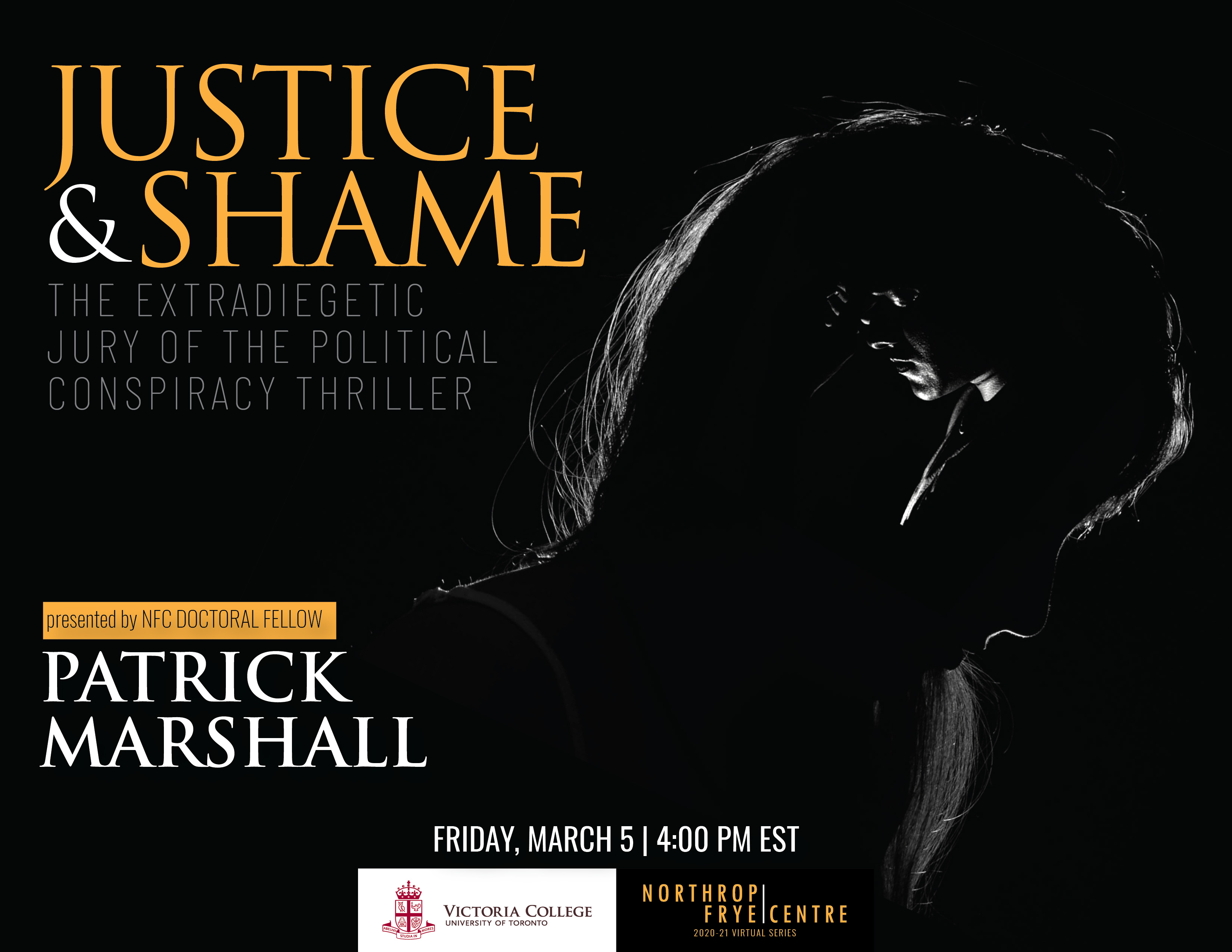
Justice and Shame: The Extradiegetic Jury of the Political Conspiracy Thriller
Mar. 5, 2021
NFC Doctoral Fellow Lecture Series
Speaker: Patrick Marshall (Cinema Studies)
YouTube Link: https://youtu.be/ouM8lmuD8wQ
Costa-Gavras’s 1969 Z – a classic of the political thriller genre – depicts the assassination of left-wing Greek politician Grigoris Lambrakis by nationalist military figures: an event that some consider integral to the formation of the Greek military dictatorship (1967-1974). In so doing, the film emphasizes the investigation of the assassination, the trials that followed, and the eventual repression of the judiciary by the military in the coup of 1967. In this talk I argue that because the State could not contain Greek nationalism, Z deploys this narrative to attempt to transform the cinema into an international court of law: The film reproduces – through reenactment – the events of history and in so doing it presents those events as evidence for an international art film audience expected to play the role of extra-diegetic jury. Understanding what is at stake in this particular use of the cinema, I argue, requires that we make a distinction between the court of law and it’s putative goal of serving justice on the one hand, and the public sphere on the other hand, in which affects and moral categories like shame, disgrace, and scandal are expected to do the political work of de-legitimizing the State.
About the speaker
Patrick Marshall is a PhD candidate at the Cinema Studies Institute. His Ontario Graduate Scholarship funded dissertation examines the proliferation of the political conspiracy thriller across Europe and America in the 1970s by situating this genre in relation to radical and reactionary insurgency of the 1960s and 1970s. The project focuses on the way that this genre deployed the moral-aesthetic codes of melodrama, the discourse of objectivity of documentary, and the narrative conceit of conspiracy to explore questions of law, right, and violence in the political sphere and to re-position the citizen-spectator in relation to the State. His interests include 1970s film theory, political theory, and Marxism.
Mar. 12, 2021 | Torn Intimacies | Tavleen Purewal
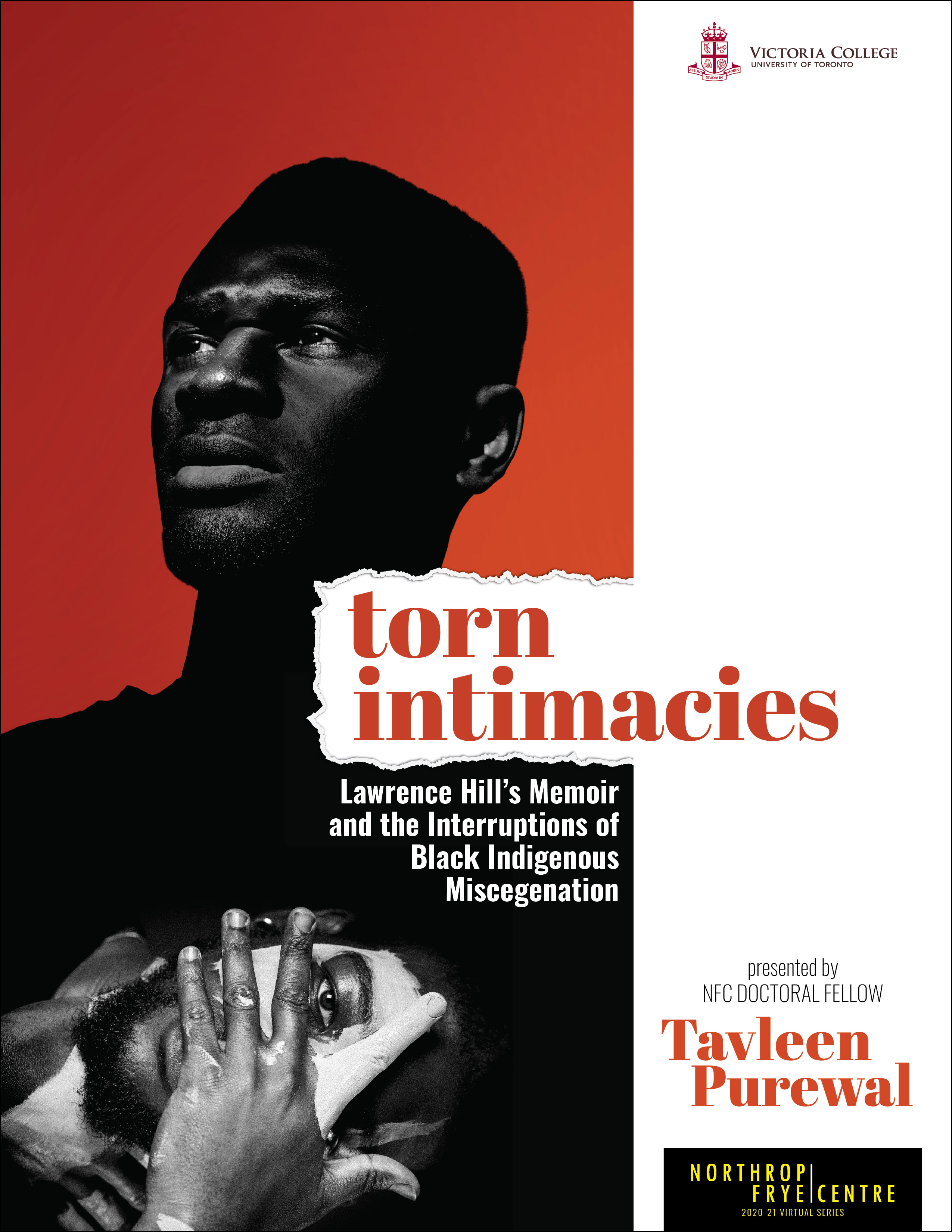
Torn Intimacies: Lawrence Hill’s Memoir and the Interruptions of Black Indigenous Miscegenation
Mar. 12, 2021
NFC Doctoral Fellow Lecture Series
Speaker: Tavleen Purewal (English)
YouTube Link: https://youtu.be/SlvOIRriWR8
In conversation with Robyn Maynard, Michi Saagiig Nishnaabeg writer Leanne Betasamosake Simpson states: “The kind of future I’m interested in is the kind of present I’m interested in: one that is based on Black and Indigenous freedom, self-determination and one that continually generates Black and Indigenous life” (in Until We Are Free, 77). Simpson here acknowledges the futural, political, and affective entanglements of Black and Indigenous realities on Turtle Island. This cross-racial solidarity has its counterpart in Black Canadian literatures. Across genres and history, Black Canadian writers reveal the set of relations that have emerged between Black, Black Indigenous, and Indigenous histories, communities, and stories. In this talk, I construct the conceptual and critical framework of my dissertation that explores these relations as inscriptions of Indigeneity in contemporary Black Canadian writing. I am most interested in the aesthetics of negative and ambivalent feelings that emerge from these textual inscriptions. Then, to present an example, I turn to Lawrence Hill’s memoir Black Berry, Sweet Juice: On Being Black and White in Canada (2001). As he re-evaluates his representation of a Black Indigenous historical figure in his earlier work, Any Known Blood, Hill offers an account of the affinities and anxieties that characterize the encounter between Blackness and Indigeneity in a white supremacist Oakville of the 1930s. Even the most painful cross-racial encounters can produce a kind of intimacy and desire for a co-liberatory future.
About the speaker
Tavleen Purewal is a PhD Candidate and Course Instructor in the Department of English. Her previous and ongoing work explore the affects of solidarity in Dionne Brand and Lee Maracle, Black diaspora and Black indigeneity in M NourbeSe Philip, BlackLivesMatter-Toronto poetics, Black Indigenous miscegenation, and the Black Canadian documentary poem.
Mar. 15, 2021 | Savages and 'sauvages' | Robert Twiss
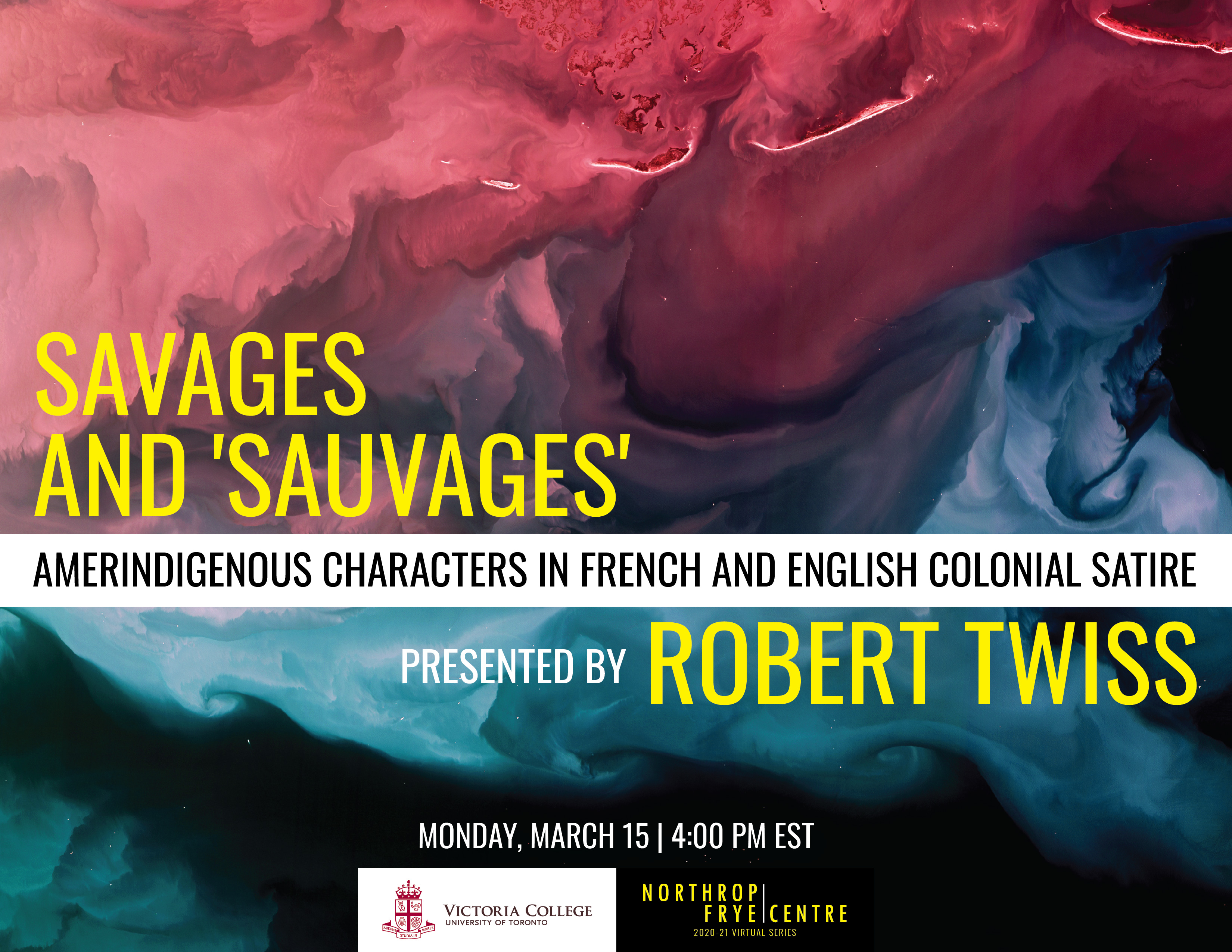
Savages and 'sauvages': Amerindigenous Characters in French and English Colonial Satire
Mar. 15, 2021
NFC Doctoral Fellow Lecture Series
Speaker: Robert Twiss (Comp Lit)
YouTube Link: https://youtu.be/hBgU7kEhukM
As is well known, Eighteenth-century European authors often found Amerindigenous characters to be effective vehicles for social critique. Depictions of the era’s conception of “natural man” drew on pre-existing literary primitivist tropes while accommodating themselves to the descriptions of America emerging from the proto-ethnographic travel narratives popular at the time. This talk examines the tension and affinities between the didactic strategies of European proto-ethnographic writing and the normative aims of satire at a time when European nations’ colonial endeavours were doing so much to determine the shape of our modern world.
About the speaker
Robert Twiss is a PhD candidate at the University’s Centre for Comparative Literature. His dissertation explores how, in the eighteenth century, beliefs and ideas about indigenous American peoples, which had reached Europe in texts written by colonial missionaries and explorers, were used for sociopolitical polemics by French and English satirists. He also works as a translator, and his research interests include translation theory and film.
Mar. 26, 2021 | The Scarlet Thread | Alison Matthews David
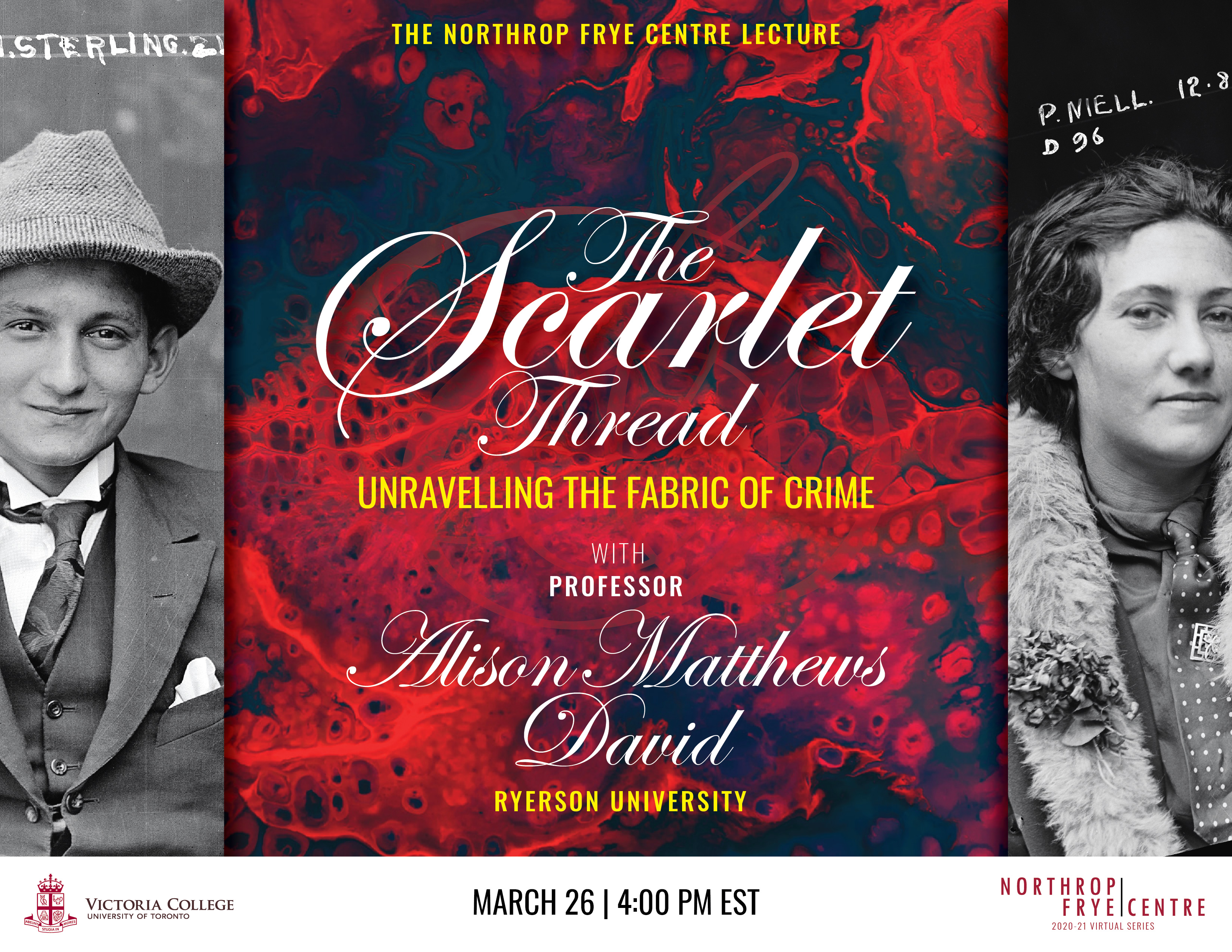
The Scarlet Thread: Unravelling the Fabric of Crime
Mar. 26, 2021
Northrop Frye Centre Annual Lecture
Speaker: Alison Matthews David (Ryerson)
To the detective Sherlock Holmes, a stained cuff or battered hat could reveal a man’s inner secrets and prove his guilt or innocence. Today’s TV series depict forensic experts identifying victims or convicting criminals based on a few fibres, a single footprint, or a bloodstained shirt. Clothing can be the most important clue in a criminal case, but dress and accessories play a much more complex role in crime than these narratives suggest.
The word clue comes from the history of cloth—a “clew” was a ball of yarn or thread that could help guide people in or out of a labyrinth. Clues were linked to crime only in the nineteenth century, when they became forms of evidence in formal police investigations. This project posits the dress historian as investigator, and I seek to sleuth out the central but complex role of dress and accessories used as weapons and protection, examined as forensic evidence, and as actors in the process of disguising and identifying individuals. Like Theseus following Ariadne’s thread or “clue” through the maze, the Fabric of Crime book and exhibition project will unravel how dress and accessories were used to commit and investigate crime from ca.1840-1940.
About the speaker
Dr. Alison Matthews David is an Associate Professor in the School of Fashion and the Graduate Program Director, MA Fashion, at Ryerson University. She has a PhD from Stanford University, has published on nineteenth-century dress and material culture, and launched the open access journal Fashion Studies with Dr. Ben Barry in 2018. Her most recent research project, Fashion Victims, looked at how clothing physically harmed the health of its makers and wearers. It was published as a book in 2015, was a co-curated exhibition at the Bata Shoe Museum in Toronto, and a co-authored book for children 9-12 years old called Killer Style.
Her current project, The Fabric of Crime: A Forensic History of Fashion, investigates the theme of crime and clothing as weapon, evidence, and disguise. Exhibit A, the exhibition she is co-curating with Elizabeth Semmelhack at the Bata Shoe Museum in Toronto on footwear and crime, will open in November 2022.
Mar. 30, 2021 | Vic Research Day
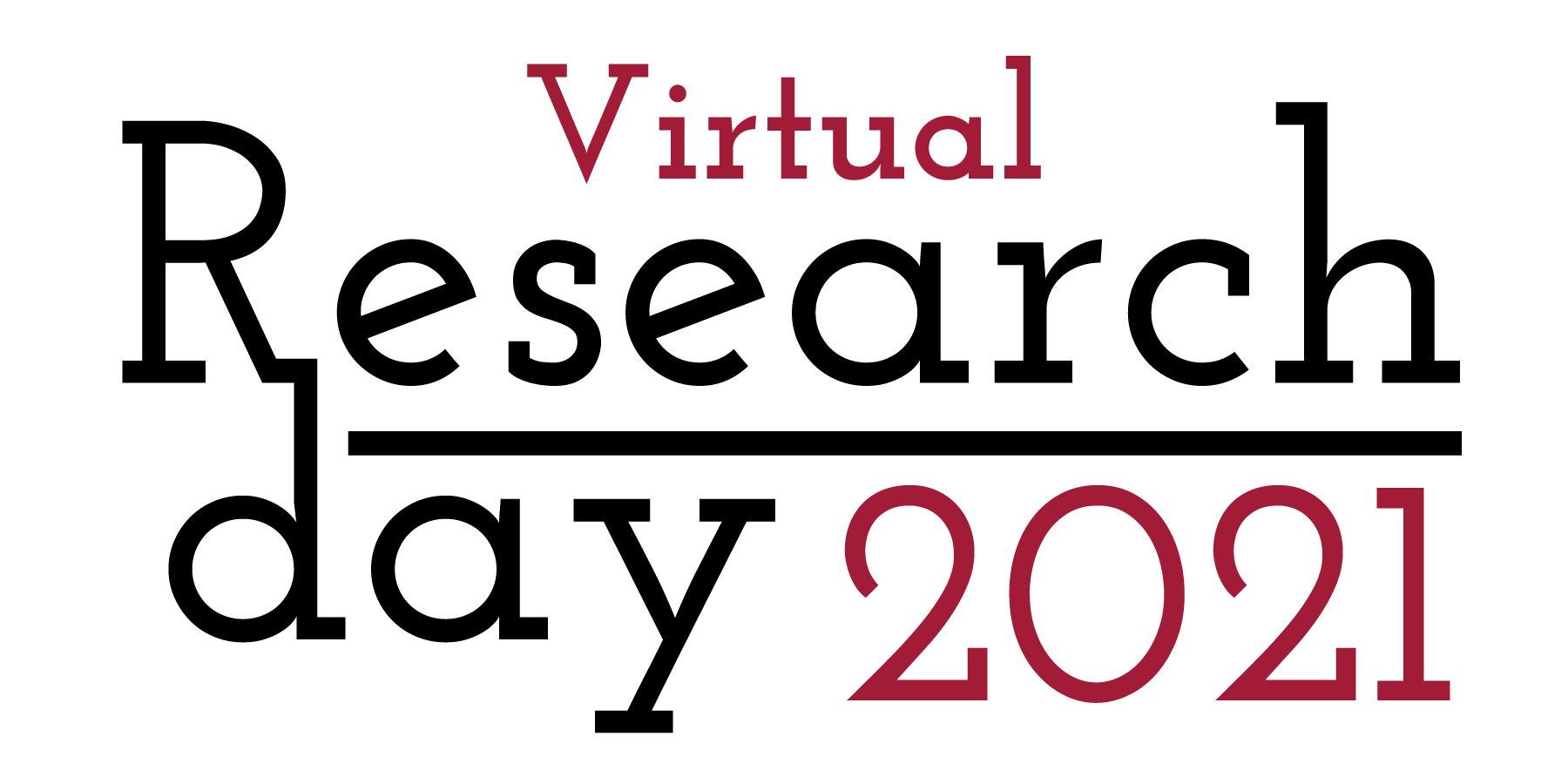
Vic Research Day
Mar. 30, 2021
Undergraduate Fellow Research Presentations
Speakers: Cheryl Cheung, Lana Glozic, Ori Gilboa and Kate Schneider
Follow the Money: Understanding the Effect and Implications of American Presidential Campaign Ads on Facebook
Speaker: Cheryl Cheung
Cheryl Cheung's analysis of Trump and Biden's campaign ads on Facebook reveals a sharp disparity in the tone and identities of the Facebook pages publishing sponsored advertisements. Whereas Trump's campaign funding was funneled to sponsor posts published by Facebook pages run by his campaign (e.g. Team Trump, Pennsylvania for Donald Trump 2020), Biden's campaign funds supported news outlets' posts in his support (e.g. Buzzfeed's Tasty, GQ Magazine). This suggests a precedent for digital advertising that has not previously been explored. Most journalistic coverage on Facebook ads leans towards the power and implications of microtargeting, but Cheryl's research suggests there is not extreme variation in ad copy across targeted demographics. Instead, what is more troubling is the proliferation of campaign funds into non-partisan news outlets. In this presentation, she will present a model for Trump and Biden's Facebook advertising strategies, and present the possibilities for future Facebook ads published according to each model.
Quotations and Revelations: Clement of Alexandria’s Eclecticism
Speaker: Lana Glozic
This presentation is a brief recap of the research that I have been doing on Clement of Alexandria with Professor George Boys-Stones. Clement, one of the church fathers, is generally a lesser-known figure in Ancient Philosophy. The eclecticism in his work makes him somewhat of a cipher, and he is often seen as useful only in theology or for fragments of lost ancient works. Many of the existing English translations are stilted and archaic. Therefore, to renew scholarly interest in Clement as a philosopher, we have been working on a modern translation and commentary of Clement’s Second Stromata. I will explain my methodology in tracking down Clement’s philosophical and literary sources, and how my research progressed over time to an investigation of his Aristotelian influence. His varying methods of quotation make for a surprising revelation: There are certain philosophical figures whose influence he is proud to demonstrate – but he downplays the role that other figures play, an act which is most likely deliberate.
The Banality of Evil? On the Depiction of Criminal Motives by Prosecutors at the International Criminal Court
Speaker: Ori Gilboa
How do prosecutors at the International Criminal Court present the criminal motives of the accused during trial? How does this differ (if at all) from popular, collective narratives concerning the motives of persons tried at the Court? And, finally, how can we begin to explain the characterization that the prosecutors choose to pursue? Drawing on the opening statements made by prosecutors during the trial phase of proceedings, I show that in most cases prosecutors portray the defendants’ motivations as rooted in financial or political interests. This is in contrast with the more prevalent narrative that depicts war crimes, crimes against humanity, genocide, and aggression as driven by extraordinary motives. In the process, I offer four explanations that may clarify the prosecutorial approach.
Following Decisions and Online Clout: The Influence of Canadian Political Leaders on Twitter
Speaker: Kate Schneider
The increasing centralization of influence towards party leaders and away from backbenchers in political parties and parliamentary institutions has been a long-documented trend in Canadian politics. This study considers whether these trends have expanded beyond formal political institutions and are now seen on the popular social media platform Twitter. It provides a look at the publicly available follower data of Canadian politicians during June and July 2020, comprising 9,654,596 following relationships and 6,000,238 unique users. The findings of this study suggest that "frontbenchers," especially party leaders, tend to dominate backbenchers in the online sphere, albeit with some variations among the political parties. Overall, this paper offers a look at trends visible in Canadian politics on Twitter to a scale not previously studied, with the hopes that future research will help to illuminate the exact causes behind the observed patterns.
2019-20 Events
The NFC’s 2019-2020 was packed with interdisciplinary research and scholarly exchange. Highlights include: a special public lecture with Professor Rebecca Haidt (Ohio State University), our sixth annual Northrop Frye Centre Lecture delivered by Professor Homi Bhabha (Harvard U) and the Brian Merrilees Lecture with Professor Christopher Baswell (Columbia U). In addition to these events, we collaborated with the Culinaria Research Centre to host a 1-day symposium on taste, “Taste Affinities”, which brought a community of scholars from around the world together to share their research.
Sep. 27, 2019 | Image, Presence, Trace | Rebecca Haidt
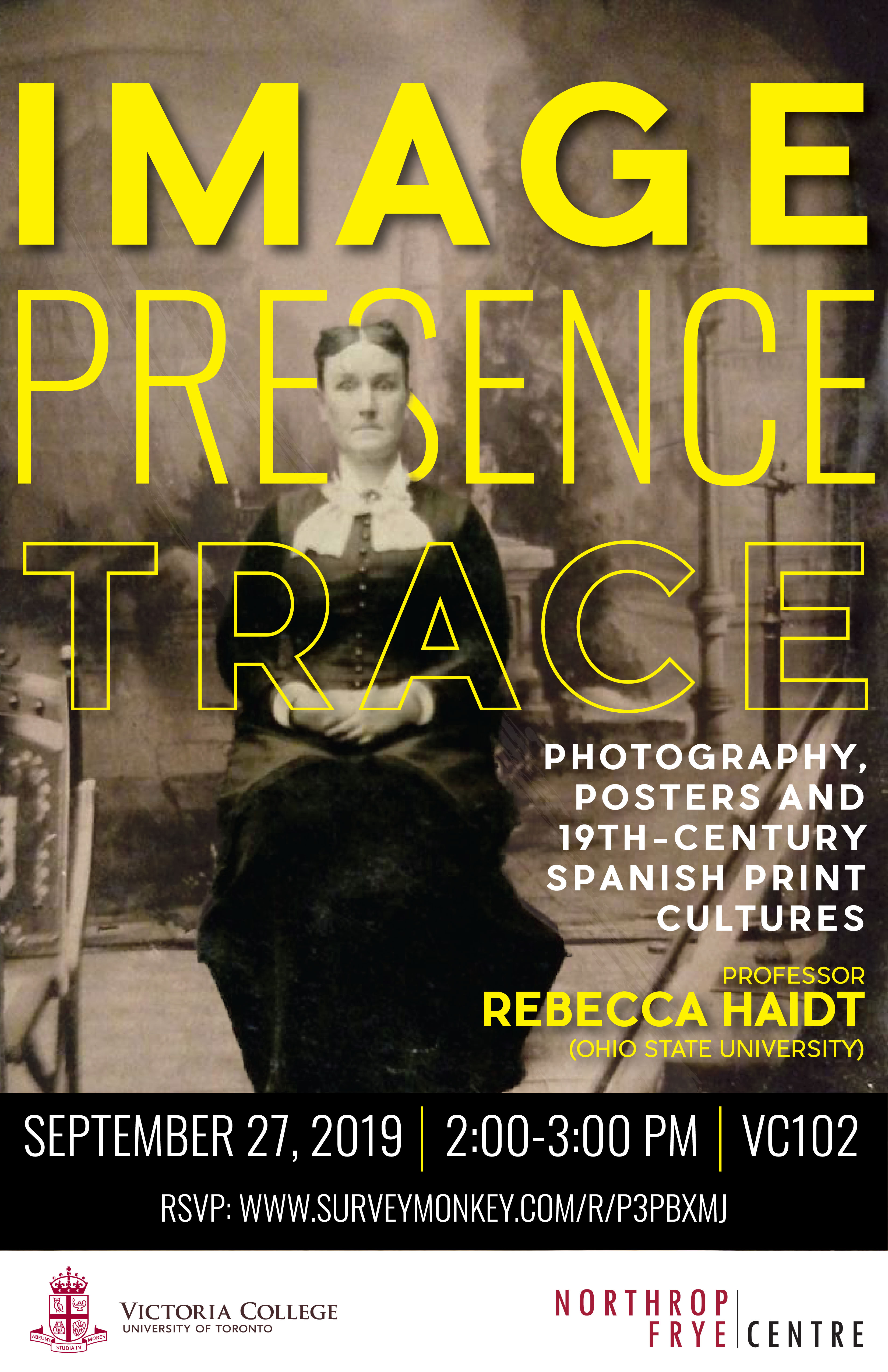
Image, Presence, Trace: Photography, Posters and 19th-Century Spanish Print Cultures
Sep. 27, 2019
Public Guest Lecture
Speaker: Rebecca Haidt (Ohio State University)
Mid-nineteenth century European observers noted that streets and urban spaces were awash in printed imagery. Literary Costumbrismo, a period print genre purporting to capture “sketches” and “scenes” of everyday life, registered mediated seeing among newly ubiquitous advertisements and changing visual entertainments. Narrated in a humorous or satirical mode, costumbrista sketches nevertheless depicted handbills and other print ephemera as a collective event of environmental presence that seemed to demand new forms of attention and change frameworks for experience. Focusing on examples from Spain, this talk considers “presence” and “trace” useful concepts for thinking about phenomenological challenges to perception, cognition, and experience posed by mass-produced and -distributed graphic, and print imagery in urban environments.
About the speaker
Rebecca Haidt trained in Comparative Literature at Washington University in St. Louis. She has taught at The Ohio State University since 1992. Her research covers a range of topics in eighteenth- and nineteenth-century Spanish cultural studies. Areas of inquiry include body, gender, urban imaginaries, early photography, eighteenth- and nineteenth-century visual cultures, urban studies, material culture, costume and clothing histories, costumbrismo, popular theatre, narrative, exchange networks, and print cultures. She is on the advisory and editorial boards of Revista de Estudios Hispánicos, Decimonónica, Dieciocho, and Studies in Voltaire and the Eighteenth Century. Her three books are Embodying Enlightenment: Knowing the Body in Eighteenth-Century Spanish Literature and Culture (St. Martin's Press, 1998; winner of the MLA's Katherine Singer Kovacs Prize); Seduction and Sacrilege: Rhetorical Power in Fray Gerundio de Campazas (Bucknell University Press, 2002): and Women, work and clothing in eighteenth-century Spain (The Voltaire Foundation-University of Oxford, 2012). Currently she is working on three book projects: a study of early nineteenth century urban visual cultures; a study of majos; and a translation of nineteenth-century poetry, with a critical introduction and notes.
Oct. 9, 2019 | Remember, Confectioner: You are Dust, not Dough | Marta Manzanares Mileo
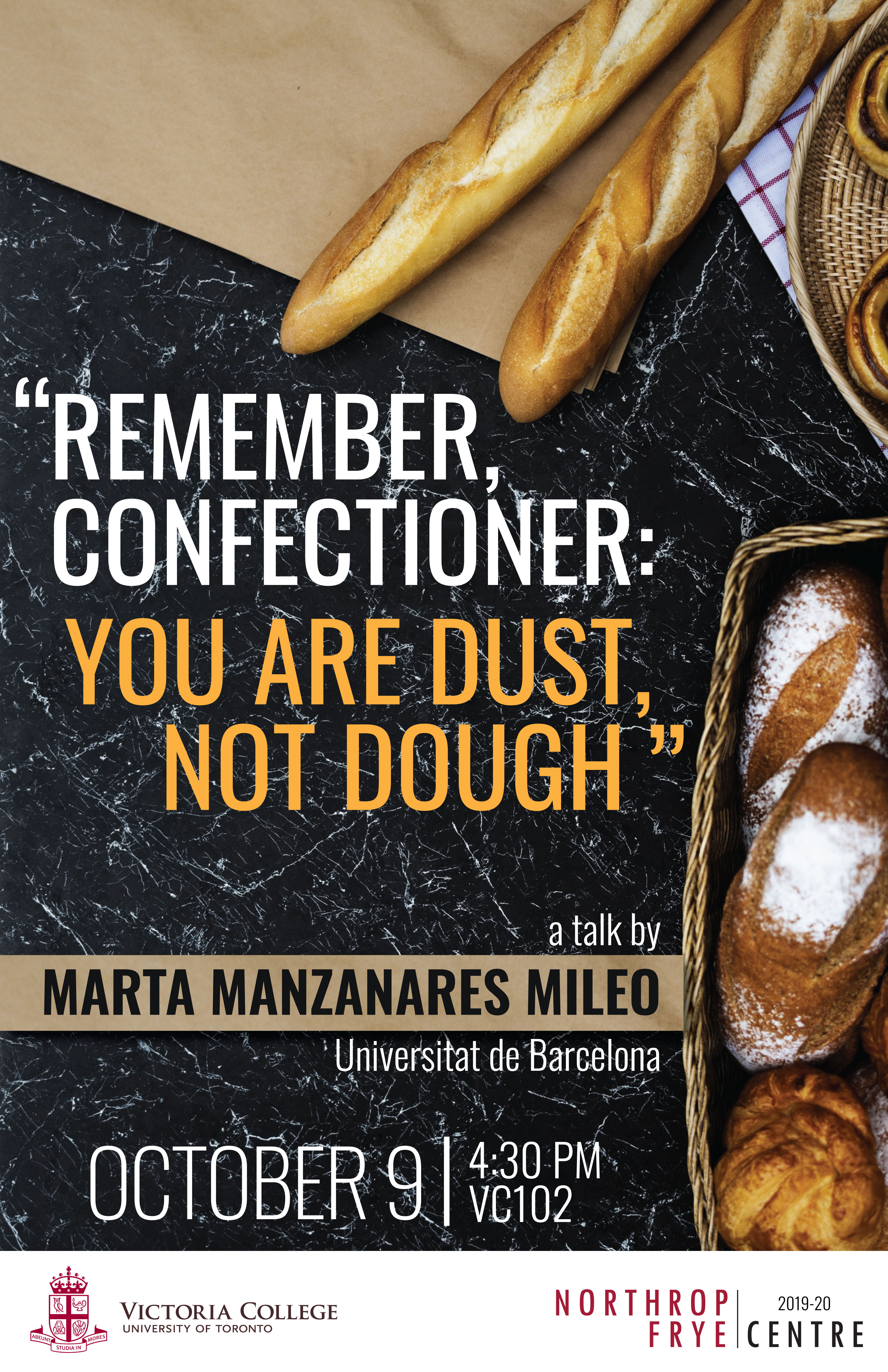
Remember, Confectioner: You are Dust, not Dough’: Tensions Over the Confectionary Trade in Early Modern Barcelona
Oct. 9, 2019
Visiting Fellow Lecture
Speaker: Marta Manzanares Mileo (Universitat de Barcelona)
In 1673, the guild of confectioners of Barcelona condemned the baker Josep Cortes for baking and selling melindros, a light ladyfinger-like sponge cake made of flour, sugar and eggs. Confectioners accused the baker Cortes of infringing on their privilege to make and sell confections. On his end, Cortes argued that melindros were baked-goods, and could not be understood as sweets.
This case study examines the debates between bakers and confectioners over the nature and the categorization of sweets, which were held at high court in the late seventeenth century. Shedding new light on the practices of food provisioners is essential to understanding the increasing specialization of guild systems and the rise of urban consumerism.
About the speaker
Marta Manzanares Mileo holds a PhD from the University of Barcelona in History, which she completed in November of 2018. She holds a European Master's Degree in Food History and Culture and a BA in History from the same university. She made a research stay at the University of Cambridge as Visiting graduate student, and she previously participated in the 'Food and drink studies Summer University' organized by the European Institute for the history and cultures of food and the University Francois Rabelais (Tours). Her doctoral dissertation, 'Confectionery in early modern Catalonia: practices and meanings around sweetmeats, 1500-1800', examined the production and consumption of sweetmeats in Barcelona from the perspective of the guild of confectioners. It explored the transmission of knowledge within an urban corporation and illustrated the tensions over the sweet marketplace. Focusing on Barcelona, this study also re-examined the consumption of sweetmeats beyond the aristocratic circles. At the Northrop Frye Centre, she will be working on her current research project, which addresses the process of feminization of sweet taste in Barcelona during the seventeenth and eighteenth centuries.
Oct. 21, 2019 | A Press of One’s Own | Claire Battershill
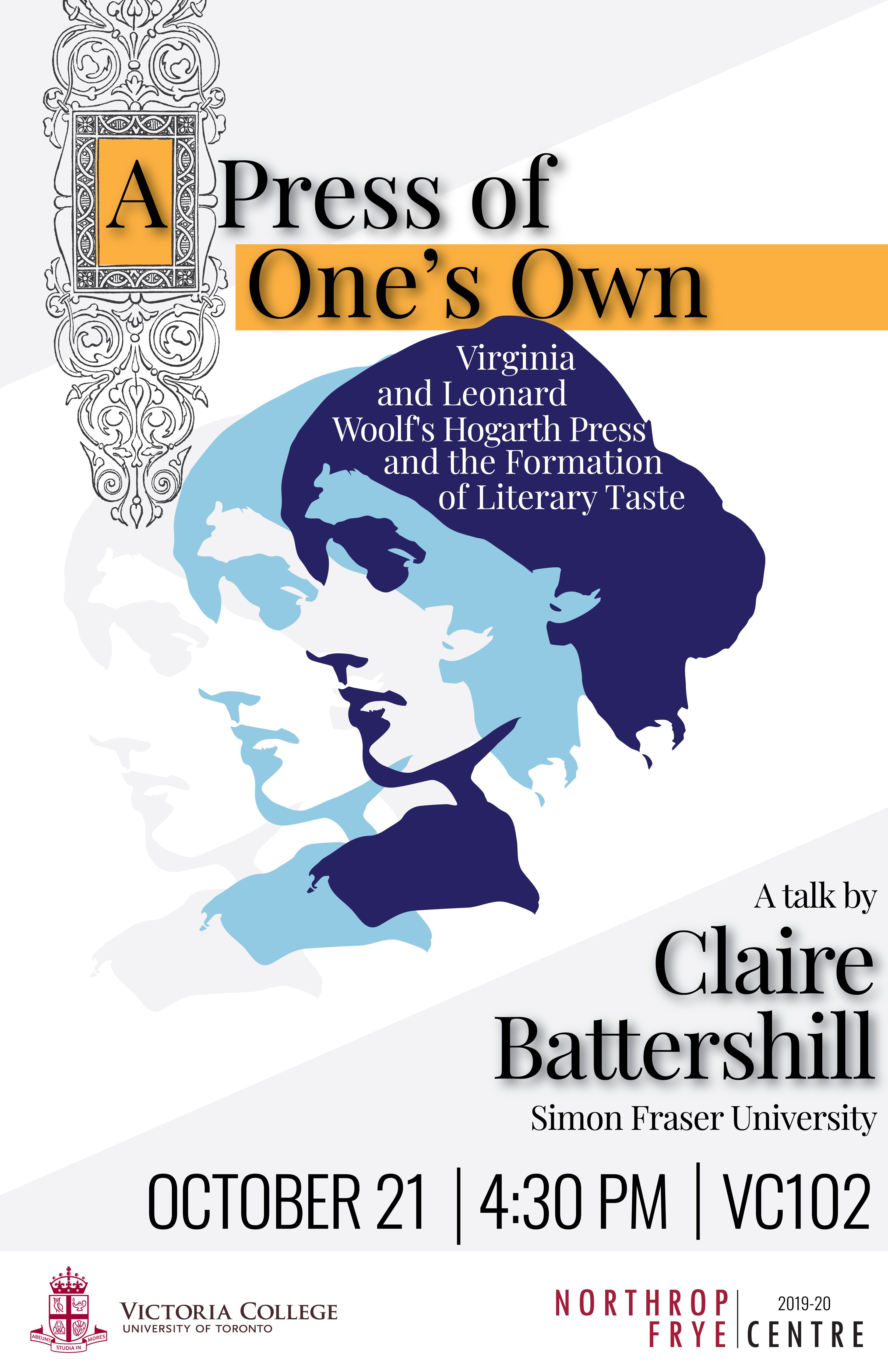
A Press of One’s Own: Virginia and Leonard Woolf’s Hogarth Press and the Formation of Literary Taste
Oct. 21, 2019
Visiting Fellow Lecture
Speaker: Claire Battershill (Simon Fraser University)
Over tea at Buszards Tea Rooms in Oxford Street on Virginia Woolf’s 33rd birthday, Leonard and Virginia Woolf decided that they would buy a printing press and a bulldog. The dog never materialized, but in the years that followed they created a publishing house and an imprint that brought an eclectic range of books to the public. From surprising titles including biographies for children, health manuals, and guides to etiquette, to modernist experimental novels and poetry, the Hogarth Press list was based primarily on the Woolfs’ own shifting and varied tastes. This talk will trace the history of Hogarth books from their composition to their reception by readers and critics and position the Woolfs as modernist cultural influencers.
About the speaker
Claire Battershill is a fiction writer and a Banting Postdoctoral Fellow and SSHRC Impact Talent Fellow in the Department of English at Simon Fraser University. She is the author of a collection of short stories, Circus (McClelland & Stewart 2014); an academic monograph, Modernist Lives: Biography and Autobiography at Virginia and Leonard Woolf's Hogarth Press (Bloomsbury 2018); two collaboratively written academic books (Scholarly Adventures in Digital Humanities, Palgrave 2017, and Using Digital Humanities in the Classroom, Bloomsbury 2017); a handful of poems; some book reviews; and many academic articles and book chapters on book and publishing history, digital humanities, and 20th-century literature. She is the co-director of the Modernist Archives Publishing Project (MAPP), a critical digital archive of publishers' records, and the co-curator of Make Believe: The Secret Library of M. Prudhomme - A Rare Collection of Fakes, an experimental collaborative art and creative writing exhibition on tour in libraries across Canada in 2019.
Oct. 29, 2019 | Barcelona Noir | Teresa Solana
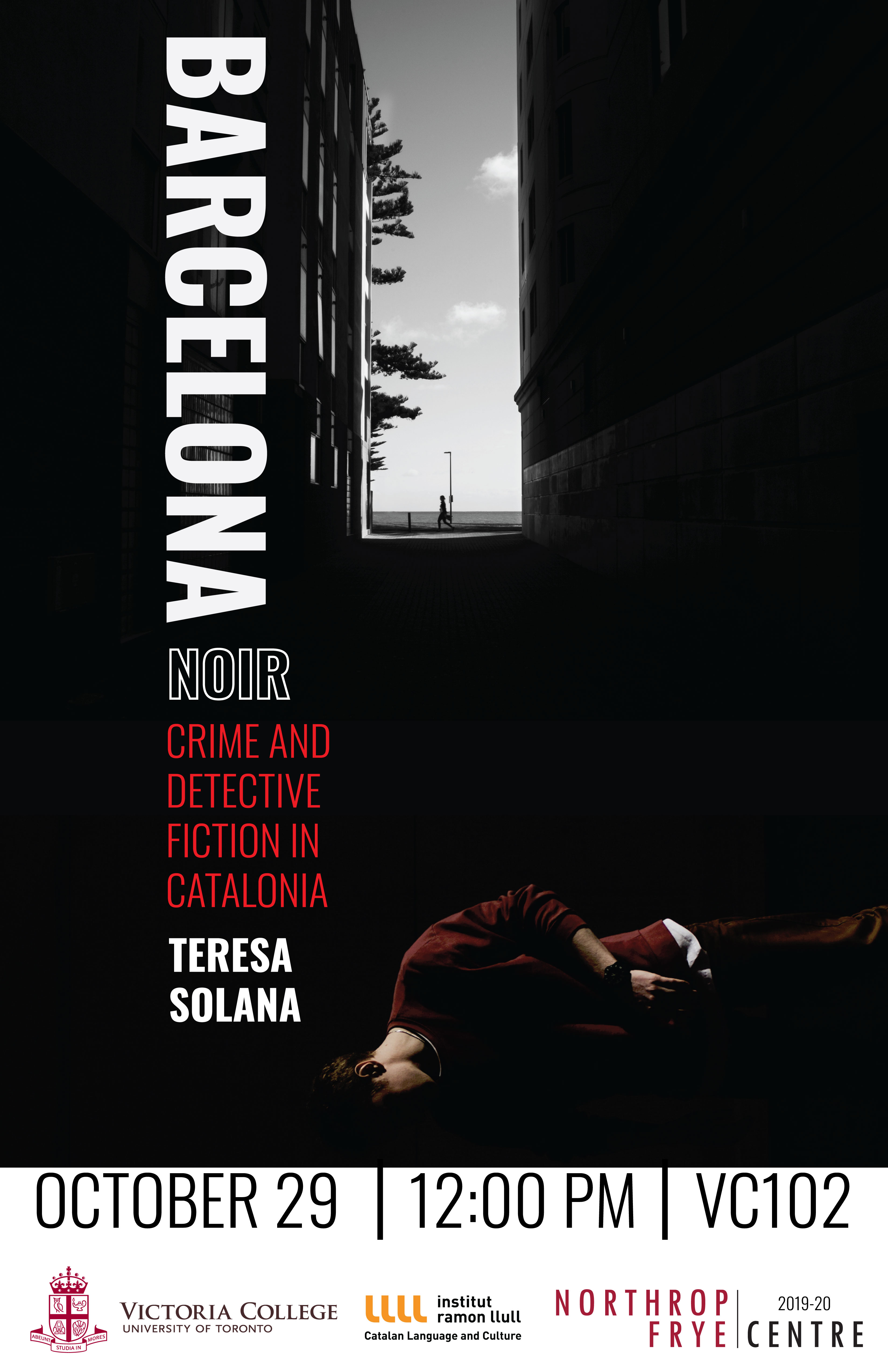
Barcelona Noir: Crime and Detective Fiction in Catalonia
Oct. 29, 2019
Public Lecture
Speaker: Teresa Solana
This talk introduces us to the genre of Catalan crime fiction via a discussion of its translations in the twenties, the difficulty of writing crime fiction during Franco’s dictatorship, and the current boom.
About the speaker
Teresa Solana was born in Barcelona, where she has lived most of her life. Before becoming a writer, she was a professional literary translator and for seven years directed «The Translators’ House», an institution dedicated to promoting translation.
She published her first book, A Not So Perfect Crime, in 2006. She writes in Catalan and her novels and stories, full of irony and humor, have been translated into several languages and won several awards. She has also written children's books.
Her latest work, The First Prehistoric Serial Killer and Other Stories, was published in English in 2018 by Bitter Lemon Press.
Currently she lives in Oxford.
Nov. 14, 2019 | Kings and Cripples | Christopher Baswell
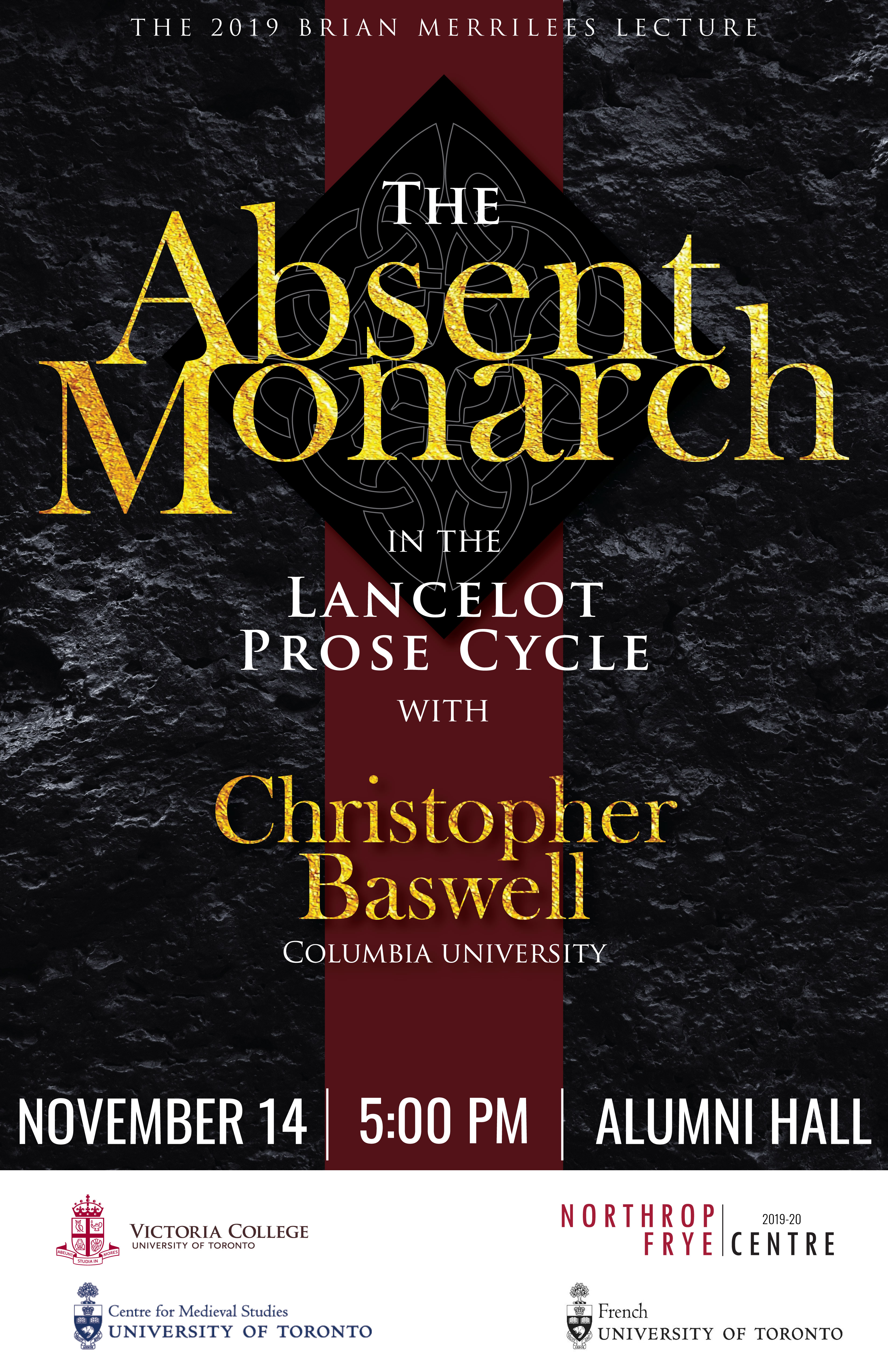
Kings and Cripples: The Absent Monarch in the Lancelot Prose Cycle
Nov. 14, 2019
The Brian Merrilees Lecture
Speaker: Christopher Baswell (Columbia U)
The demographic reality of medieval disability was largely a spectacle of poverty, disease, begging, and dependence. And depending on the nature and timing of disability, body difference could bar a person from being a legal subject or, in cases of adult madness, from managing property. At first glance, this is a world away from aristocratic culture and such aristocratic pursuits as battle or courtly practice. Yet in the cultural imagination of the high and later Middle Ages, there is at some points an intriguing convergence between disabled and aristocratic, even royal bodies, especially in scenes of largesse and miracle cure. At the same time, medievalists have tended not to register the frequency with which chivalric knights suffer temporary disabilities from battle, even moving about in litters. This is especially true in the Lancelot Prose Cycle. And at certain moments of cultural extremity, there is a conjuncture of ruling and disabled bodies, both historical (the leper King Baldwin IV of Jerusalem, the blind Enrico Dandalo doge of Venice, blind King John of Bohemia) and fictional. No king is at once so disabled and so central as the Rich Fisher King in the prose cycle. And yet, he is both strangely absent and constantly sought, in the narrative and the manuscript illustrations. This lecture explores the prevalence of aristocratic disability in the Lancelot Prose Cycle, and the simultaneous evocative force and general absence of the Rich Fisher King.
About the speaker
Christopher Baswell holds degrees in Classics and English from Oberlin College and Yale University. He also studied at Oxford University and the Warburg Institute, University of London. He has taught at the Université de Genève, Barnard College, UCLA, York University (UK), and Columbia University; and has held fellowships from the NEH, the National Humanities Center, and the Institute for Advanced Study. He is currently Anne Whitney Olin Chair of English at Barnard, and Professor of English and Comparative Literature at Columbia. He has published widely on classical tradition in medieval literature and pedagogy, and currently on medieval cultures of disability.
Jan. 22, 2020 | Futures in Flight | Emily Doucet
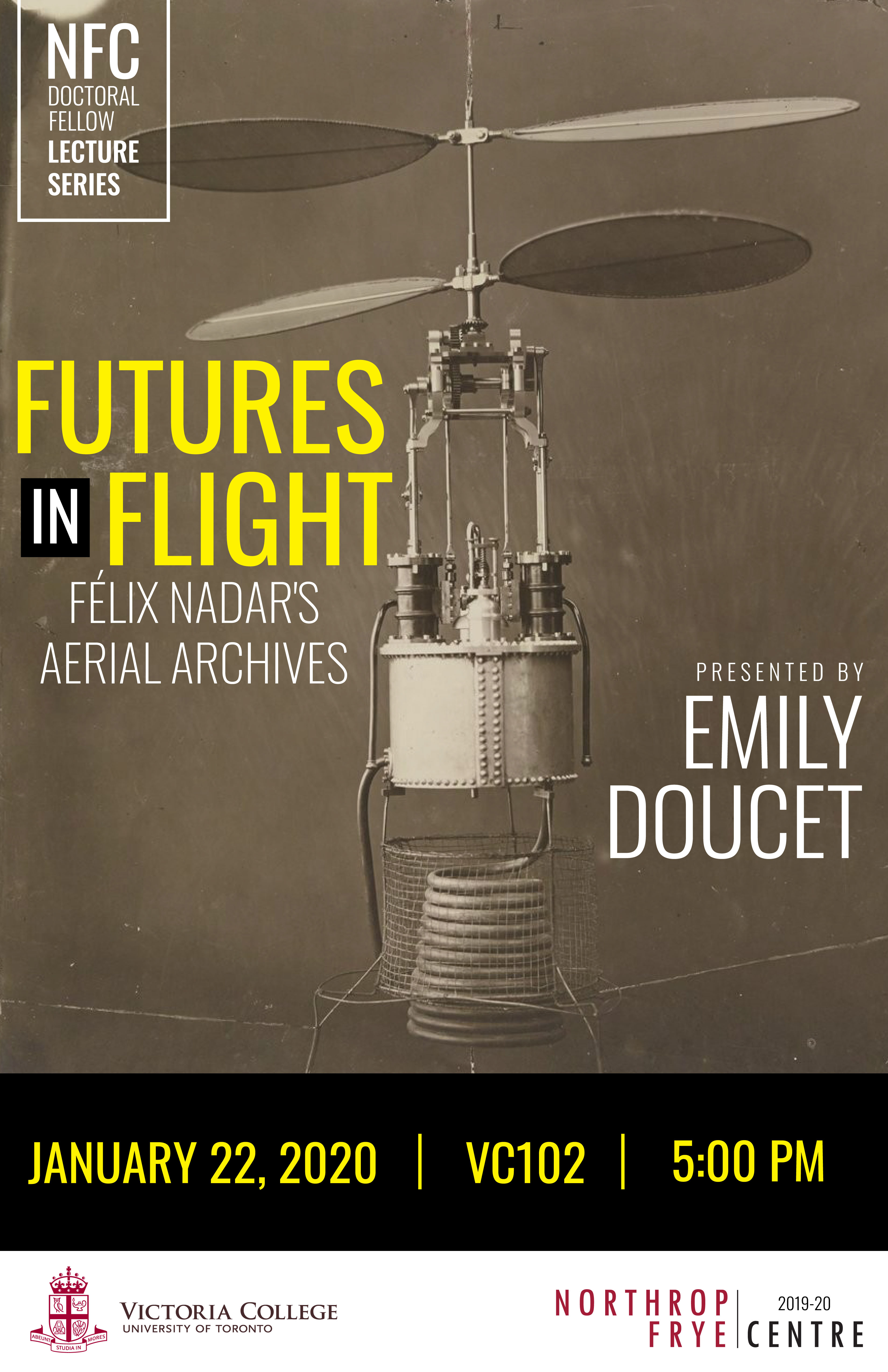
Futures in Flight: Félix Nadar's Aerial Archives
Jan. 22, 2020
NFC Doctoral Fellow Lecture Series
Speaker: Emily Doucet (Art History)
In 1897 the photographer Félix Nadar wrote to the municipal council of Paris to offer his collection of “documentary items of all types (books, prints, letters, portraits, assorted objects, etc…) relating to the history and technology of aerial navigation before and since the Montgolfiers” to the city of Paris. This “very curious” collection is now housed between the musée Carnavelet and the Bibliothèque historique de la ville de Paris (BhvP). The collection features a large array of objects, documents and books, signalling the scope of the aerial imagination in the eighteenth and nineteenth centuries. This talk explores the contents of Nadar’s aerial archive as a means by which to contextualize several other key documents of Nadar’s aerial experiments, most prominently his (notoriously difficult to date) experiments with aerial photography. Through his extensive collection on the history and future of aerostation and aviation, Nadar demonstrated the ways in which a visual compendium and archival store of documents might have the power to construct a world of possibility for a technology still in its infancy. Through his purposely elusive and unclear narratives of the “invention” of aerial photography, Nadar tells us the story of what could be—clear, crisp, photographic views from the air. In this sense, these examples are testaments to the ways in which the stories (and images) we make and tell about technology have the power to shape the future world we deem possible.
About the speaker
Emily Doucet is a PhD candidate in the Department of Art History. Her dissertation examines the photographer Félix Nadar’s experiments with new applications of photography, exploring the ways in which his investment in developing technologies provided a model with which to articulate theories of historical, technological, and social change. Her doctoral research is funded by the Social Science and Humanities Research Council of Canada. Emily also writes regularly on contemporary art for exhibition catalogues and art publications such as BorderCrossings and C Magazine.
Feb. 12, 2020 | Up from the Avernus | Billy Johnson
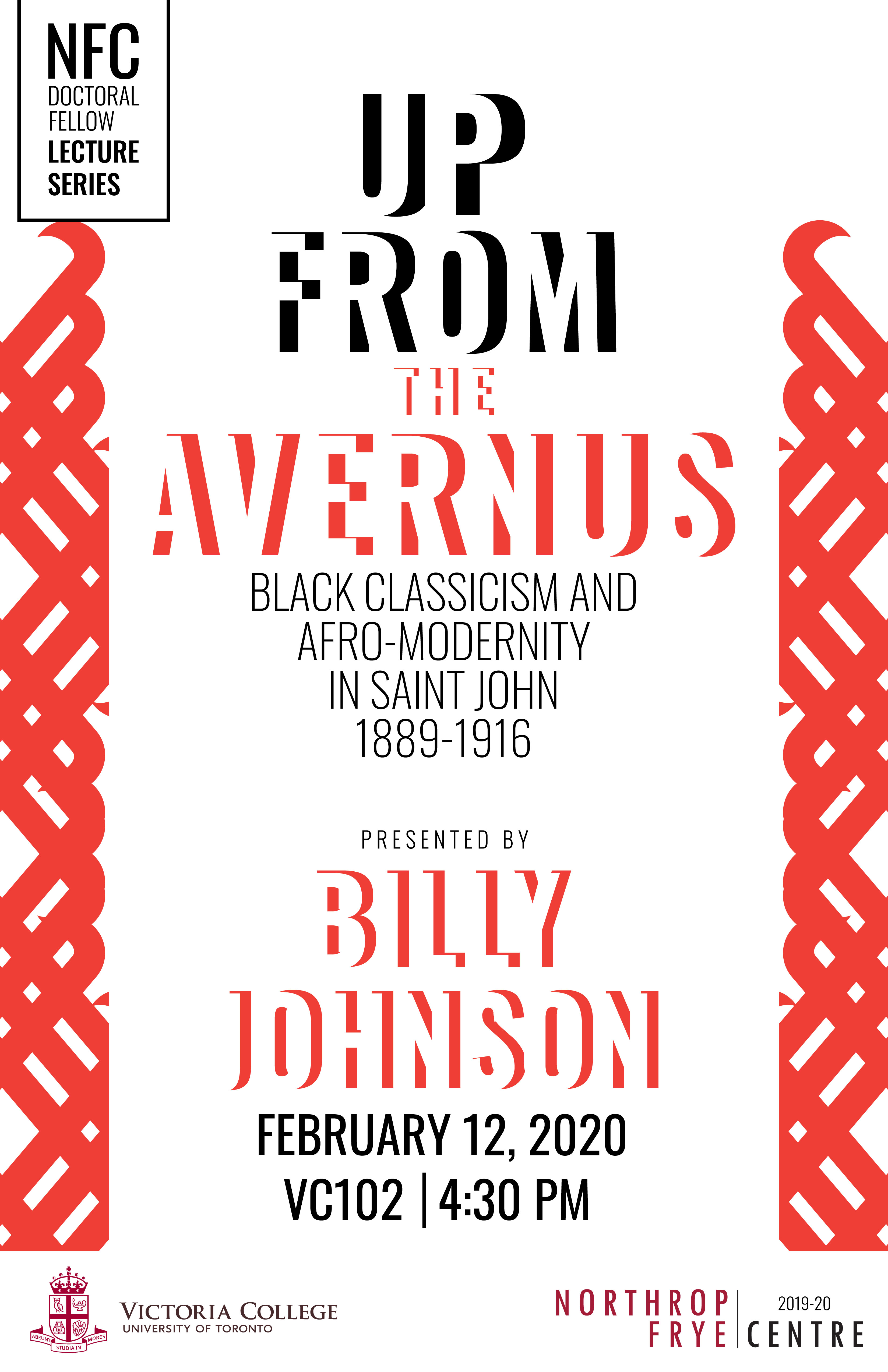
Up from the Avernus: Black Classicism and Afro-modernity in Saint John, 1889-1916
Feb. 12, 2020
NFC Doctoral Fellow Lecture Series
Speaker: Billy Johnson (Department of English)
On 15 November 1889 a notice appeared in the Saint John Daily Sun announcing the publication of Classical Translations by Rev. H.A.S. Hartley, pastor of St. Philips African Methodist Episcopal Church in Saint John, New Brunswick. The reviewer of this “neat volume of 134 poems” singled out its “printing and binding” as especially praiseworthy but offered little by way of comment on the text itself. Though it has since been almost entirely forgotten, Hartley’s collection marked a watershed in the history of Black print culture in Canada. It also directly influenced other important Black intellectuals in Saint John, most notably Abraham Beverly Walker. Focusing on three documents—Hartley’s Classical Translations (1889), Walker’s magazine Neith (1903-1904), and a letter to W.E.B Du Bois from the British Negro Protective Association (1916)—this talk explores the evolution of antiracist protest in Saint John across three decades. Despite the profound differences between Hartley’s integrationist appeals and Walker’s Black nationalism, their shared commitment to classicism and Afro-Protestantism constitutes a unique contribution to anti-colonial and anti-racist discourse in the late-19th and early-20th centuries. At once registering a strong tradition of local protest in Saint John and revealing their authors’ situatedness in the diasporic culture of the Black Atlantic, these critically neglected documents suggest the need for a more sustained engagement with the rich but scattered archives of early-20th-century Black epistolary culture, periodicals, and ephemera.
About the speaker
Billy Johnson is a doctoral candidate in the Department of English. His dissertation examines the intersection of identity, literary culture, and regionalism in periodicals published in the Maritime Provinces of Canada during the first half of the 20th century. Taking a cue from recent theorizing of “region” as a constructed sense of cohesion and community, his project explores how writers and editors in the Maritimes negotiated competing forms of identification and aesthetic practice that variously reinforced and contested homogenizing, exclusionary models of regionalism. Ultimately, these periodicals and the literature they published reveal a cultural and social space marked by contestation and internal division, providing a basis for more complex understandings of community, identity, and belonging within the transatlantic world.
Feb. 25, 2020 | Enclosing Animals, Opening Minds | Matthew Thompson
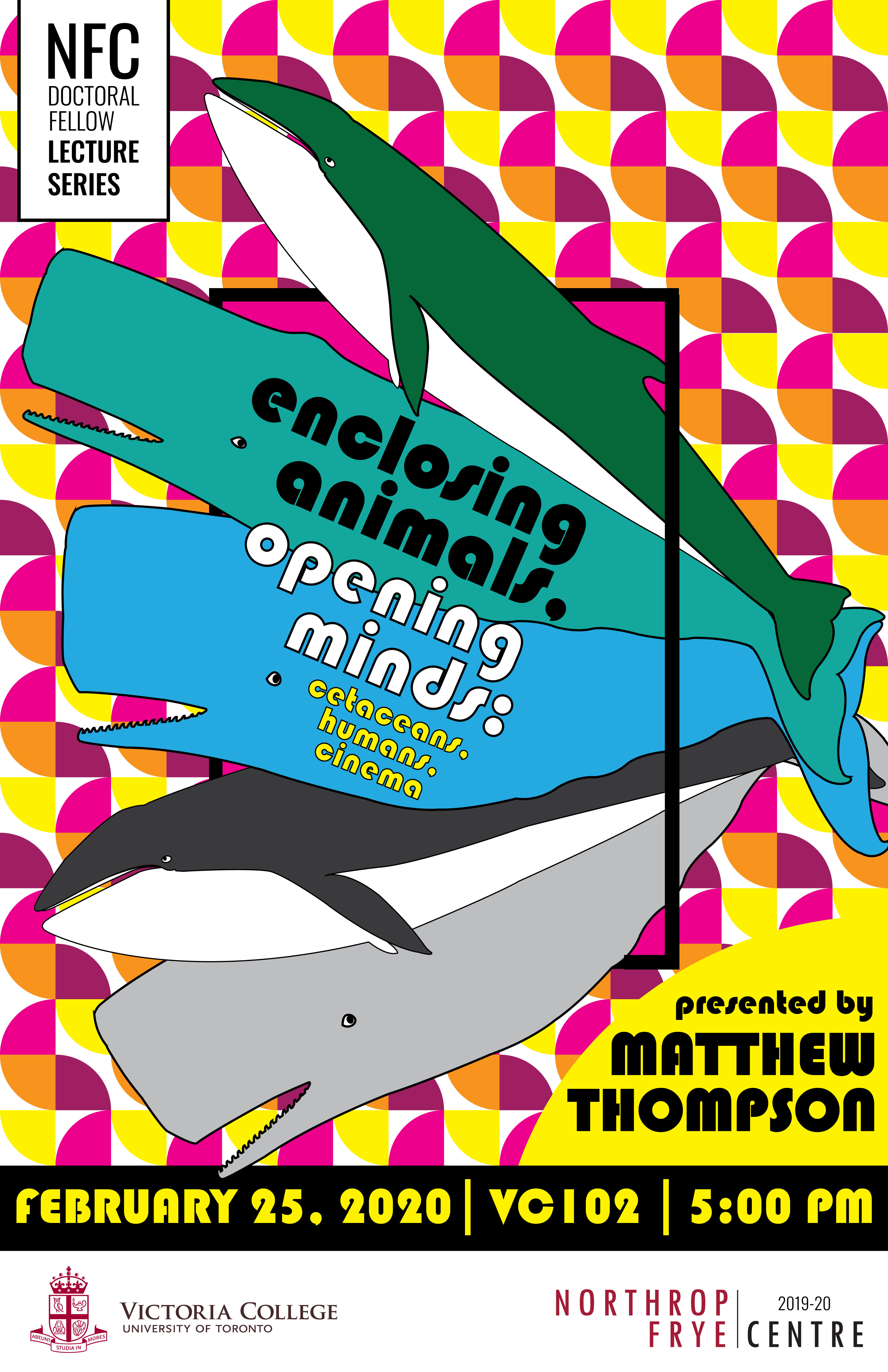
Enclosing Animals, Opening Minds: Cetaceans, Humans, Cinema
Feb. 25, 2020
NFC Doctoral Fellow Lecture Series
Speaker: Matthew Thompson (Cinema Studies Institute)
During the 1960s and 70s whales and dolphins changed form in the popular imagination from a monstrous, but profitable source of fats and oils to the benevolent poster children of the environmental movement. This talk focuses on The Day of the Dolphin (1973), a film that emerged during the height of the “Save the Whales” campaign. Reading this film alongside the controversial scientific work performed by the cetologist John C. Lilly demonstrates the human desire, whether exploiting or defending cetaceans, to contain and control whales and dolphins by enclosing them in the holds of a ships, aquaria, or cinematic frames. The Day of the Dolphin is a crystallization of the North American fascination with whales and dolphins and is heavily influenced by the complex and interconnected web of cetacean science, modern whaling, and environmentalism. As such, by reading this film as a visualization of the rhetoric of cetacean compassion it is possible to expose a consistent human propensity to enclose cetaceans within pools, frames, and rhetorics which then lead us to proclaim them open and free.
About the speaker
Matthew Thompson is a PhD candidate studying at the Cinema Studies Institute of the University of Toronto. His dissertation explores the representational strategies shared by space exploration, environmentalism, and science fiction during the 1960s and 70s. He has an article on insects and cinematic technology in the journal Spectator and an interview with Raffaele Mirelli in the journal World Picture.
Mar. 10, 2020 | Scriptural Relations | Roxanne Korpan
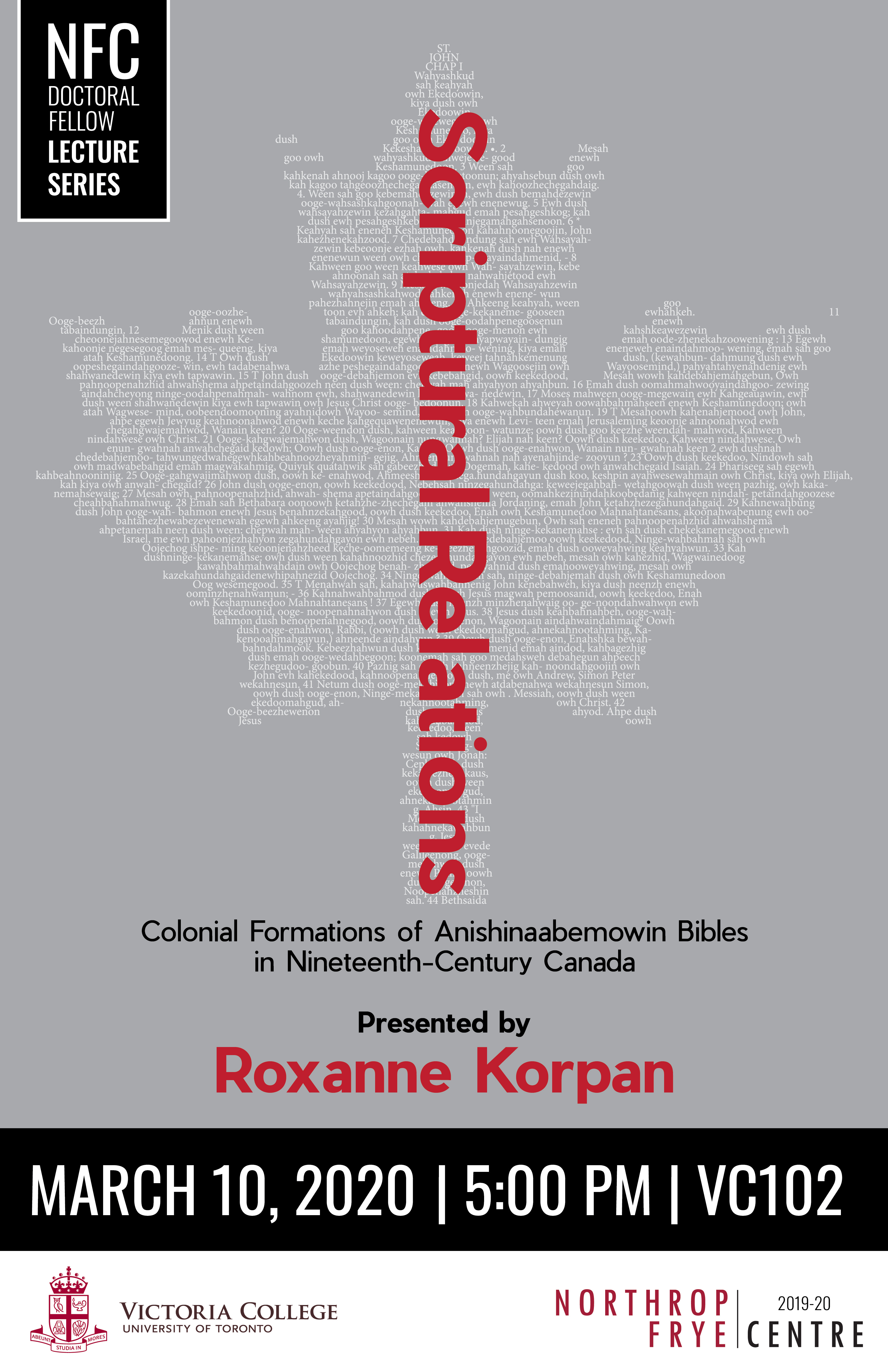
Scriptural Relations: Colonial Formations of Anishinaabemowin Bibles in Nineteenth-Century Canada
Mar. 10, 2020
NFC Doctoral Fellow Lecture Series
Speaker: Roxanne Korpan (Dpt. of the Study of Religion; Book History and Print Culture)
In 1829 Anishinaabe chief and Methodist minister Kahkewaquonaby, or Peter Jones, published his first translation of the Christian bible into Anishinaabemowin (Ojibwe), an edition of the first seven chapters of the Gospel of Matthew printed in Toronto by the colonial government in Canada. This publication was soon followed by Anishinaabemowin translations of other Christian scriptures including the Gospel of John published by the British and Foreign Bible Society in London, England (1831) and Genesis published by the Toronto Auxiliary Bible Society in Toronto (1835). This talk analyzes the materiality of these bibles to explore how bible translations mediated a range of colonial relations. More specifically, I draw out how Anishinaabemowin bible publishing relied on collaborative labour between Indigenous peoples, missionary societies, bible societies, and government agents and how Anishinaabemowin bibles were used to build, imagine, and refuse relationships within and between these same groups. Throughout, I consider how books can serve as useful archival objects in constructing histories of religion and colonialism in Canada, and how bibles, as a particular kind of book, perhaps unexpectedly open up space for stories that reveal Indigenous sovereignty and self-determination.
About the speaker
Roxanne Korpan is a doctoral candidate in the Department of the Study of Religion and the collaborative program in Book History and Print Culture. Her dissertation research examines histories of Anishinaabemowin bible translation in 19th-century Canada. She focuses her analysis on the materiality of these books, looking at missionary translators and local language experts, publishing institutions and printing presses, physical features of the bibles, and their circulation and use. Her research draws out the multivocality of Indigenous-language bibles: from working as colonial agents intended to impose a foreign religion on Indigenous populations in Canada to serving as archives of Anishinaabe language, labour, culture, and creativity.
Roxanne is also a course instructor with the Department for the Study of Religion, a letterpress printer in the Massey College Bibliography Room, and a contemporary dance artist.
Mar. 5, 2020 | Camera Mortis | Homi K. Bhabha
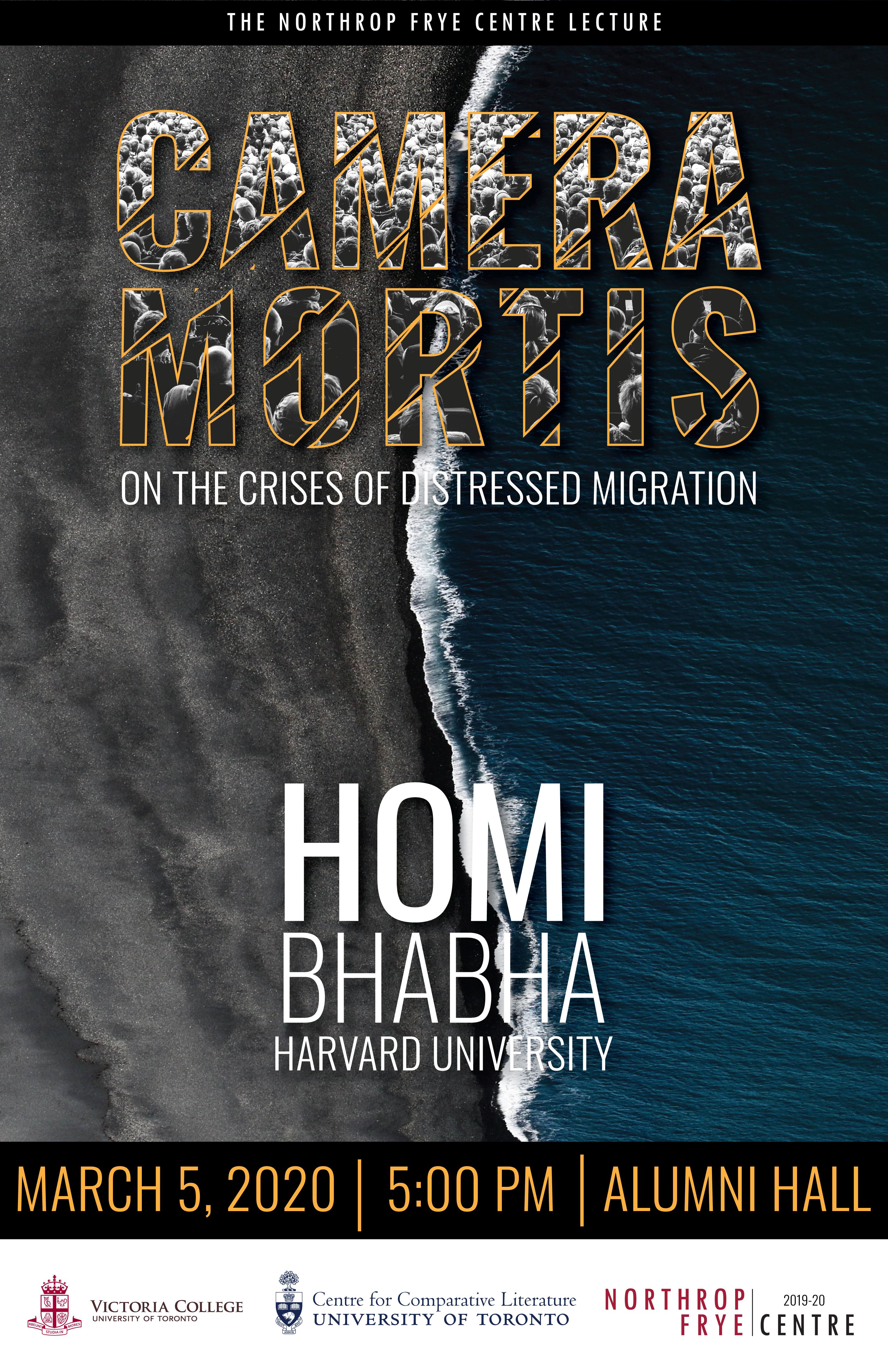
Camera Mortis: On the Crises of Distressed Migration
Mar. 5, 2020
The Annual Northrop Frye Centre Lecture
Speaker: Homi K. Bhabha (Harvard U.)
About the speaker
Homi K. Bhabha is the Anne F. Rothenberg Professor of the Humanities in the English and Comparative Literature Departments at Harvard University. He was founding director of the Mahindra Humanities Center at Harvard University from 2011-2019 and director of the Harvard Humanities Center from 2005-2011. From 2008-2019, he held the inaugural position of Senior Adviser on the Humanities to the President and Provost at Harvard University and from 2005-2008 served as Senior Adviser in the Humanities at the Radcliffe Institute for Advanced Study.
Bhabha is the author of numerous works exploring postcolonial theory, cultural change and power, contemporary art, and cosmopolitanism. His works include Nation and Narration and The Location of Culture, which was reprinted as a Routledge Classic in 2004. His next book will be published by the University of Chicago Press. Bhabha has written on contemporary art for Artforum and has written a range of essays on William Kentridge, Anish Kapoor, Taryn Simon, and Mathew Barney, amongst others. He is a member of the Academic Committee for the Shanghai Power Station of Art, advisor on the Contemporary and Modern Art Perspectives (CMAP) project at the Museum of Modern Art New York, and Curator in Residence of the Boston Museum of Fine Arts. Bhabha served on jury for the 53rd Venice Biennale in 2009 and the 2018 Sharjah Biennial. In 2019, he was honored by the Institute of Contemporary Art in London for his influential work in studies of colonialism, postcolonialism, and globalization.
With the support of the Volkswagen and Mellon Foundations, Bhabha is leading a research project on the Global Humanities. In 1997 he was profiled by Newsweek as one of “100 Americans for the Next Century.” He holds honorary degrees from Université Paris 8, University College London, and the Free University Berlin. In 2012 he was awarded the Government of India’s Padma Bhushan Presidential Award in the field of literature and education and received the Humboldt Research Prize in 2015. In 2018 Bhabha received an honorary doctorate at Stellenbosch University in Cape Town, South Africa.
Mar. 13, 2020 | Taste Affinities Symposium
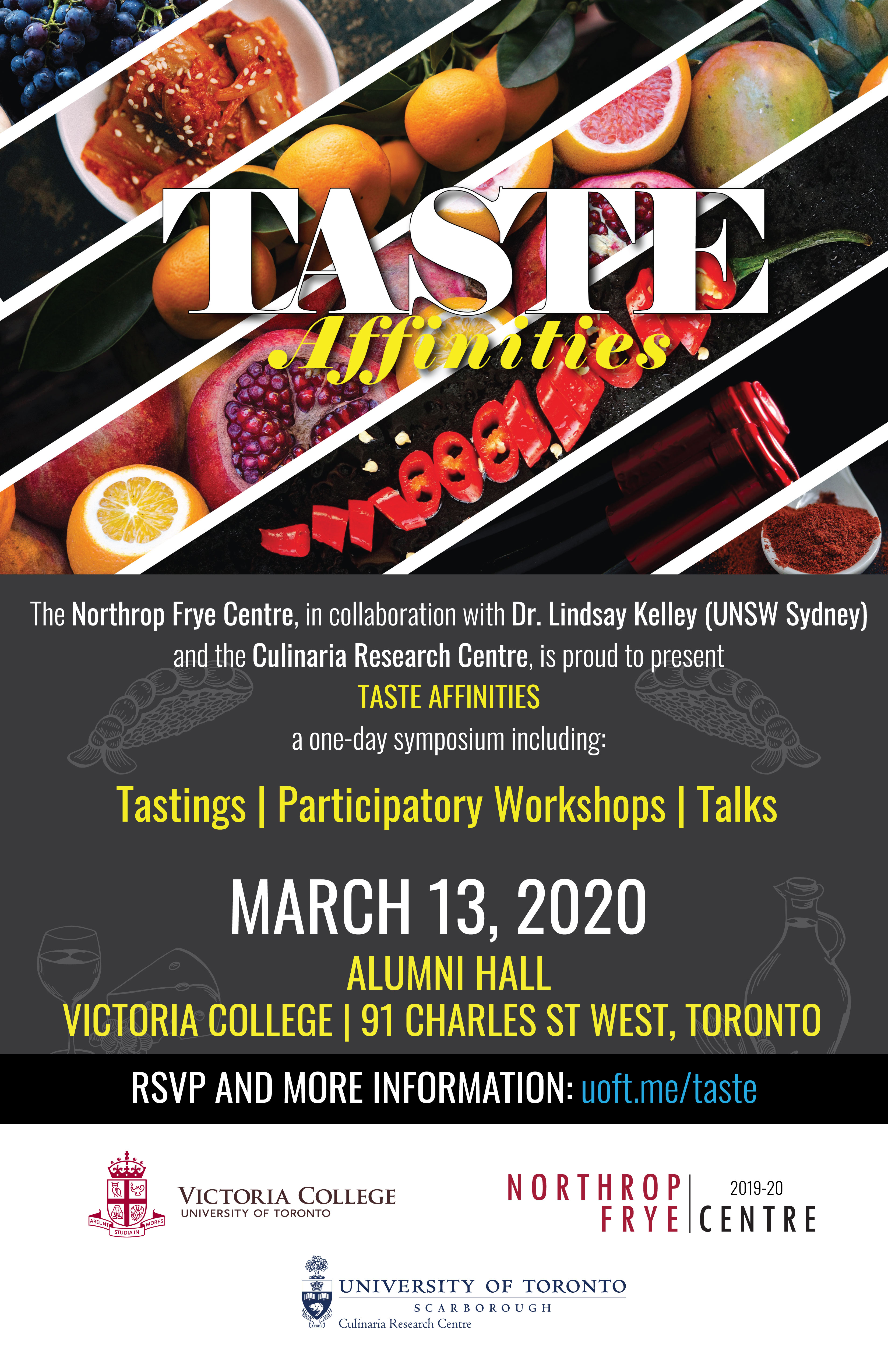
Taste Affinities
Mar. 13, 2020
1-day public symposium on taste, including tastings, participatory workshops, and lectures
Speakers:
- Christy Spackman (Arizona State U), “Flavor Stories”
- Stephanie Springgay (University of Toronto), “Chocolate Elementary: Young Children as ‘Taste-Makers’”
- Rosi Song (Durham U), “Creating a Taste for Barcelona: Memory, Identity, Politics”
- Anne Urbancic (University of Toronto), “Setting Italian Tables, Setting Italian Taste”
- Ken MacDonald (University of Toronto), “Acquiring the ‘t(T)aste’ of Wine and Cheese”
- Eric C. Rath (University of Kansas), “Some Tasting Notes on Year-Old Sushi”
- Lindsay Kelley (UNSW Sydney), “Digesting the Dull Dish” (Keynote)
What are the socio-cultural and political commitments of food and eating? How does taste intersect with gender, class, nationhood and place? What are the intangibles of our palate and where might taste be coded? In what ways is taste disrupted and what might be found in its absence?
The Northrop Frye Centre, in collaboration with Dr. Lindsay Kelley (UNSW Sydney) and the Culinaria Research Centre, proudly presents Taste Affinities, a one-day symposium that will include, in addition to talks, innovative and participatory workshops and tastings.
In the past two decades, the long history of the study of taste has evolved and expanded rapidly, adding credence to Davidson’s cheeky affirmation that “taste has become the new space.”[1] To that end, the symposium engages with recent research and debates on the ways that taste has been understood – from its disruption through to how it is being marketed and deployed.
[1] Robert Davidson. “Terroir and Catalonia.” Journal of Catalan Studies. 10 (2007): 58-72
2018-19 Events
In 2018-2019, the Northrop Frye Centre hosted a series of events aimed at building our community of humanist scholars. These included the fifth annual Northrop Frye Centre Lecture with Professor Helena Buffery (UC Cork), a special talk by Professor Peter Bly (Queen’s), our NFC Visiting Fellowship lectures with Professor Daniel Gallimore (Kwansei Gakuin University) and Professor Nandhi Bhatia (Western), and a newly-branded NFC Doctoral Fellow Lecture Series.
Oct. 4, 2018 | Traumatic Translations | Helena Buffery
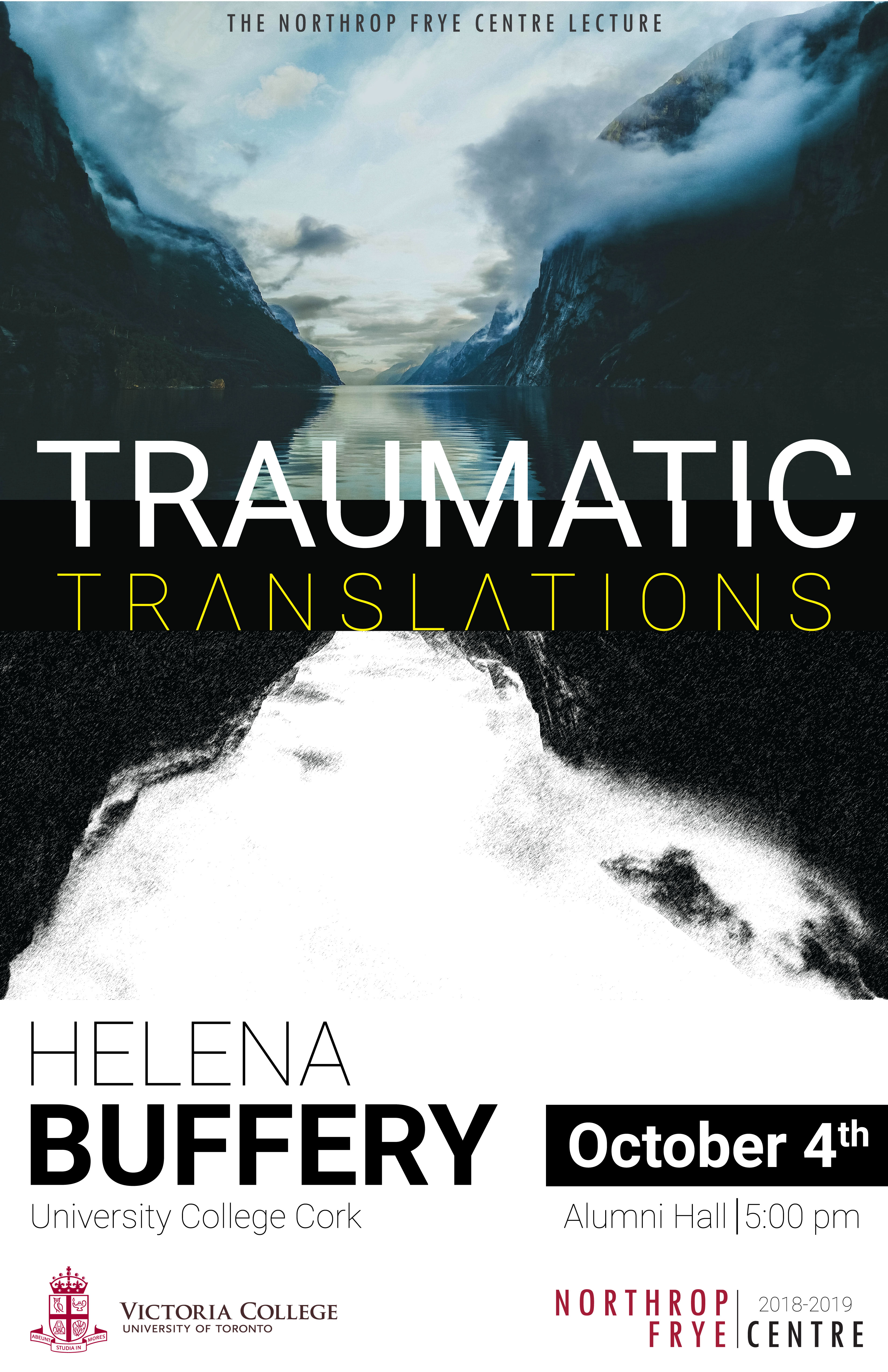
Traumatic Translations: Transmitting Cultural Narratives
Oct. 4, 2018
The Annual Northrop Frye Centre Lecture
Speaker: Helena Buffery (University College Cork)
If translation is invoked repeatedly in the literature on trauma as a metaphor for the problematics of identifying, metabolizing and expressing the origin and impact of traumatic experience, in Translation Studies the process of translation itself has often been represented as structurally analogous to trauma in its association with temporal and spatial displacement of origins, with repetition, with anxiety over the relationship to the source text, identity and equivalence. Here I will explore the multiple potential affordances evoked by the concept of traumatic translations in reference both to the ways in which experiences of individual and social trauma are “translated” into cultural narrative and, most especially, what happens to these narratives in translation into other social narrative frames. This paper brings together two aspects of my recent work: on the one hand, performance-inflected work on the way in which memories of the Spanish Civil War and its aftermath are performed in contemporary theatre and performance cultures; on the other translation studies-inflected work centering on processes of interlinguistic translation between Catalan and other languages. Here I will attend to three case studies which will allow me to reflect further on the relationship between trauma and translation: 1. the translation of Catalan trauma narratives into English; 2. the translation and reception of trauma narratives about the Irish struggle for Independence; 3. the transmission and reception of the theatre of Lebanese-Canadian playwright Wajdi Mouawad on European stages.
About the speaker
Helena Buffery teaches and researches in the Department of Spanish, Portuguese and Latin American Studies, University College Cork, Ireland. Currently Vice-Head of College for Research, she has a particular interest in interlinguistic and intercultural translation and reception, and her work is characterised by translational approaches to comparative cultural history and production. As Chair of the Board of Translation Studies for the past five years, she has been committed to developing the interdisciplinary ethos of the programme as a key pillar in contemporary research in the Modern Languages. She has supervised to completion numerous MA and PhD students in the field. Publications include Shakespeare in Catalan: Translating Imperialism (2007); Stages of Exile: Spanish Republican Exile Theatre and Performance Cultures (2011); Barcelona: Visual Culture, Space and Power (2012, with Carlota Caulfield). In 2018 she completed a special journal issue on Contaminated and Dislocated Bodies in Catalan Visual and Performance Art in conjunction with Eva Bru-Dominguez (forthcoming 2019), and has co-translated Maria-Mercè Marçal’s The Passion according to Renée Vivien with Kathleen McNerney. She is at present putting the final touches to a monograph on Living in Translation: Catalan Women Republican Exiles in Mexico.
Oct. 29, 2018 | To Catch or not to Catch a Train? | Peter Bly
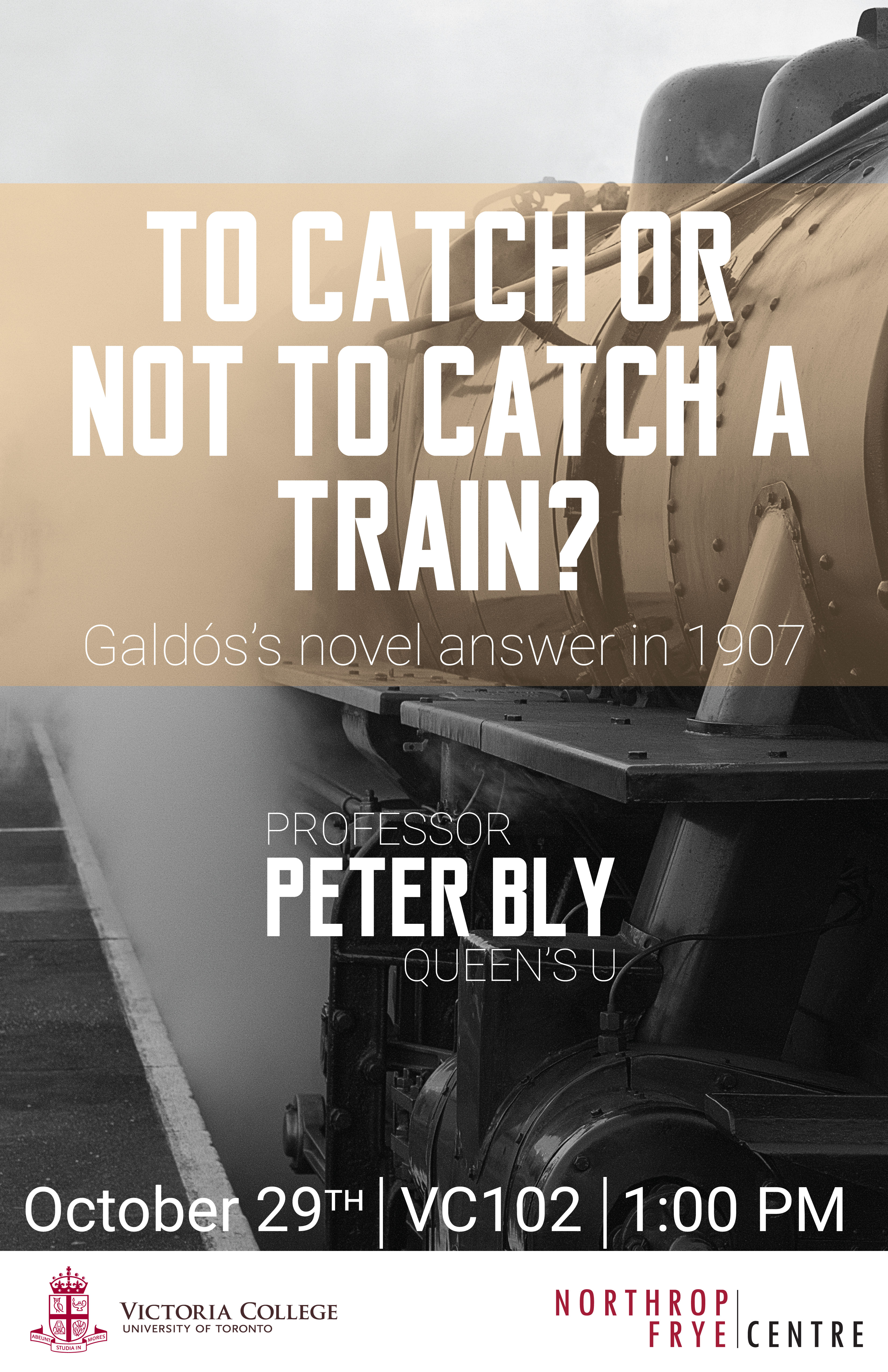
To Catch or not to Catch a Train? Galdós’s novel answer in 1907
Oct. 29, 2018
Public Guest Lecture
Speaker: Peter Bly (Queen's University)
Regime changes or revolutions occur periodically in the history of most countries. Spain is no exception. For those deposed rulers who survive with their lives the question of how to escape to another country becomes the most immediate concern. Spain’s Glorious Revolution of 1868 forced the reigning monarch, Isabel II, to seek asylum in France. The most obvious means to achieve that goal was a train journey to Paris. Benito Pérez Galdós (1843-1920), Spain’s most famous and prolific novelist after Cervantes, chronicles this important event in his historical novel of 1907, La de los tristes destinos. However, he goes beyond mere factual narration to question not only the relevance of the political change itself, but, moreover, the validity of that acclaimed symbol of modernity in the 19th century: the railway. In so doing, he assigns a special role to the women and geography of Spain.
Nov. 14, 2018 | Canonizing Shakespeare in 1920s Japan | Daniel Gallimore
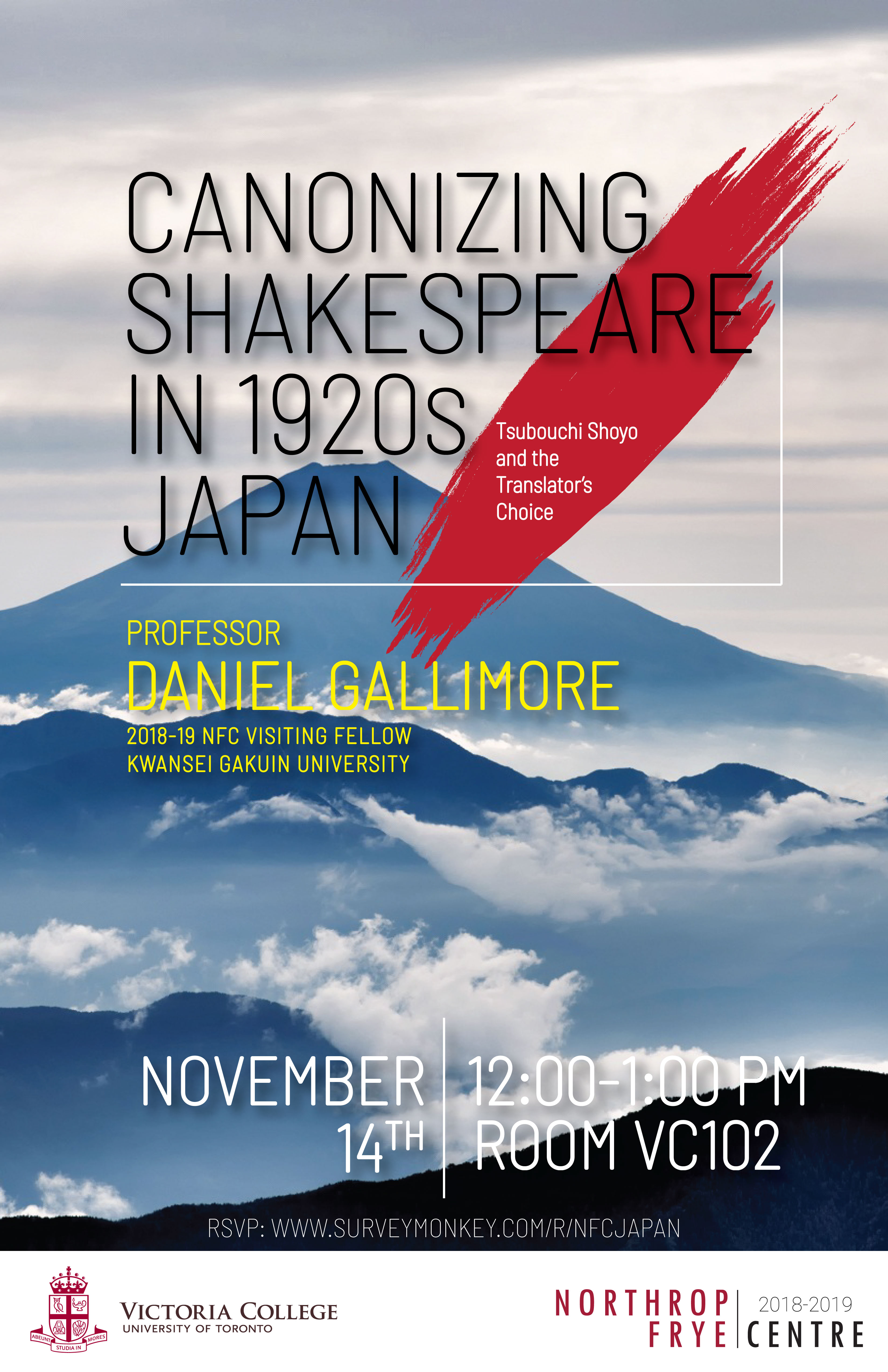
Canonizing Shakespeare in 1920s Japan: Tsubouchi Shoyo and the Translator’s Choice
Nov. 14, 2018
Visiting Fellow lecture
Speaker: Daniel Gallimore (Kwansei Gakuin University)
Tsubouchi Shoyo (1859-1935) first translated Shakespeare when he was 25 with a version of Julius Caesar in the style of classical Japanese drama, and it was through a process of rapid linguistic change and theatrical reform that he came to translate the complete plays and poems of Shakespeare between 1909 and 1927. This he did in a modern style interspersed with literary inflections, maintaining that ‘The natural and contemporary feel of contemporary colloquial Japanese recalls the unchanging naturalness of Shakespeare’s works’, and affordably priced with the translator’s scholarly forewords the series of forty volumes became a best seller. Tsubouchi was a distinguished and prolific writer in his own right, ‘the father’ of the modern Japanese novel, whose Selected Works were published in seventeen volumes in 1927-8. The latter included translations of eight of the plays alongside his original novels, plays and criticism, namely (in order of inclusion) The Tempest, A Midsummer Night’s Dream, King Henry IV, Parts 1 and 2, The Taming of the Shrew, Antony and Cleopatra, Macbeth, and Measure for Measure, but omitting much better known plays in early 20th century Japan such as Hamlet, Romeo and Juliet and The Merchant of Venice. My lecture will discuss this somewhat surprising choice in terms of Tsubouchi’s development as a Shakespeare translator and the various illuminating comparisons he makes in his forewords with his native drama.
About the speaker
Daniel Gallimore first came to Japan in 1987, and has been professor of English literature at Kwansei Gakuin University, near Kobe, since 2011. His research interest is in Japanese translations of Shakespeare. His book on the treatment of prosody in Japanese translations of Shakespeare's A Midsummer Night's Dream was published by Kwansei Gakuin University Press in 2012, and a book on Tsubouchi Shoyo, the pioneer of Shakespeare translation in early 20th century Japan, by Edwin Mellen Press in 2016. He was a contributor to A History of Japanese Theatre (ed. Jonah Salz, Cambridge University Press, 2016), is a regular participant in international conferences such as the World Shakespeare Congress, and has also translated contemporary plays for Kinokuniya's Half a Century of Japanese Theatre series. His fellowship at the Northrop Frye Centre will be spent in making a detailed study of the Shakespeare translations and criticism of Tsubouchi Shoyo (1859-1935).
Jan. 23, 2019 | Literature on Trial in Colonial India | Nandi Bhatia
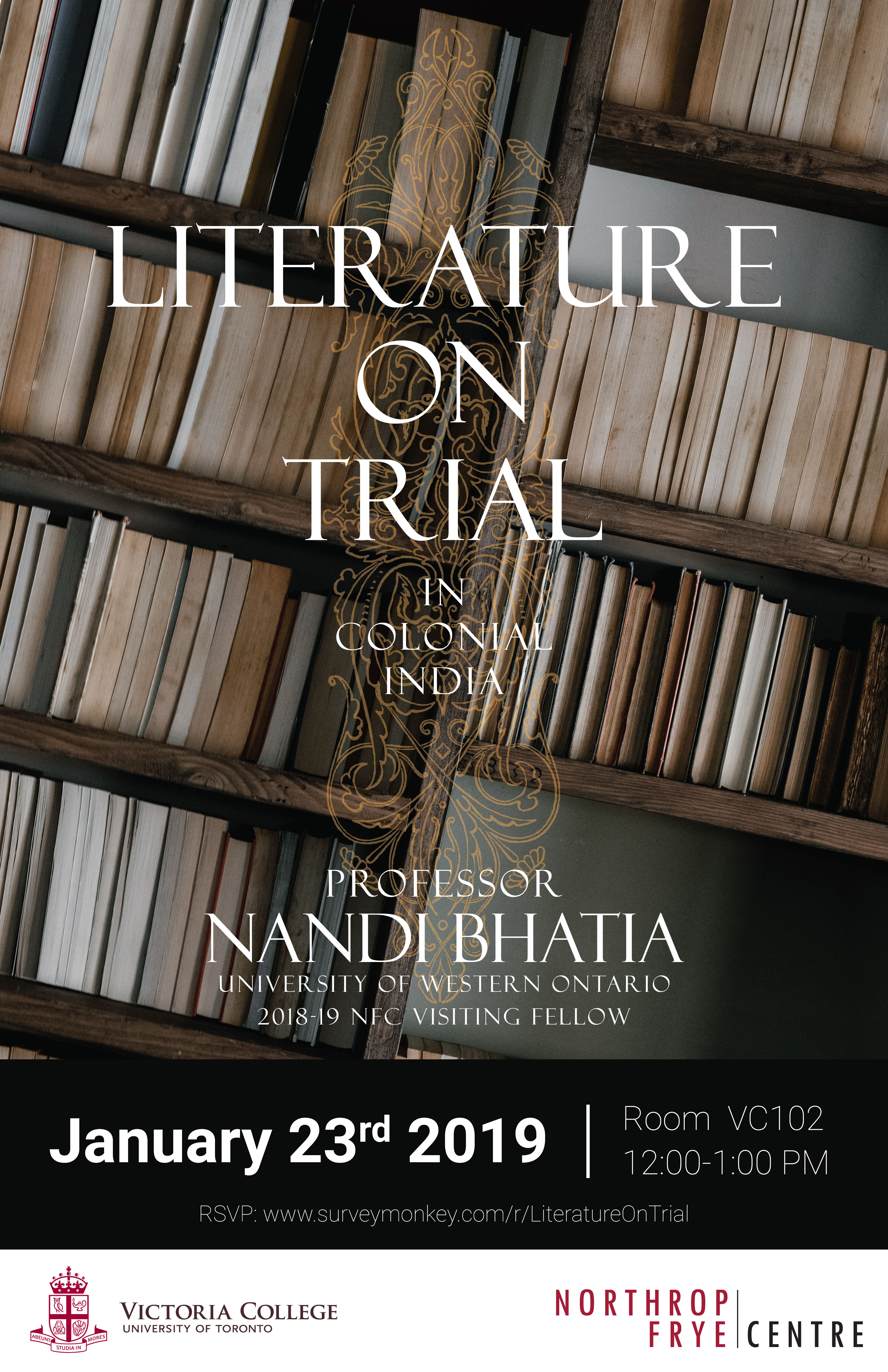
Literature on Trial in Colonial India
Jan. 23, 2019
Visiting Fellow Lecture
Speaker: Nandi Bhatia (U Western)
Among the most overt yet under-explored mechanisms of British rule that produced knowledge about India in the interest of imperial governance, were controls over literary, cultural and dramatic productions exercised through various laws. Regulations such as the Dramatic Performances Act of 1876, the Vernacular Press Act of 1878 and the Press Act of 1910 were initiated and implemented after the 1857 Mutiny, when political power shifted from the East India Company to the British Crown. Such regulations resulted in the banning of numerous plays and publications, including, for example, Gandhi’s Hind Swaraj (1910), a document about Home Rule, Rishabcharan Jain’s Gadar (Mutiny, 1930), a novel on the 1857 Mutiny, Angare (Sparks), a collection of short stories published in 1932 , Saadat Hasan Manto’s stories about sexual violence and Ismat Chughtai’s “Lihaaf,” for which she had to go to trial in the Lahore High Court. Although the pretext for censoring texts was often “obscenity” and/or “sedition,” they bound literature to administrative procedures that established the legal authority of British rule over literary production. With attention to Ismat Chughtai's "Lihaaf," a short story that invited controversy and an "obscenity" trial against the author, this presentation analyzes the motivations and implications of classifying texts as “obscene” and “seditious” at a time of increased demand for Home Rule. While the reasons for banning some of the above-mentioned texts resulted from the threat of intensifying anti-colonial nationalism, such censorship, I suggest, ultimately served the interests of a masculine nationalism and social reform movements that imagined the nation's women as "good" wives and mothers. Reading "Lihaaf" in tandem with Chughtai's own account of the trial reveals alliances and complicities among local and colonial power groups, exposing in the process the paradoxical underpinnings of regulatory controls over literature in colonial India.
About the speaker
Nandi Bhatia is a Professor in the Department of English at The University of Western Ontario and Associate Dean (Research) in the Faculty of Arts and Humanities. A specialist in Postcolonial Literature and theory, her research explores the connections between literary and theatrical practices, nationalism, and colonialism, and examines the ruptures and crossovers that resulted from the British Empire's longstanding engagement with India. Such connections have been analyzed in her monographs, Acts of Authority/Acts of Resistance: Theatre and Politics in Colonial and Postcolonial India (University of Michigan Press and Oxford University Press: 2004), Performing Women/ Performing Womanhood: Theatre, Politics and Dissent in North India (OUP, 2010), edited collections Modern Indian Theatre (ed., OUP, 2011) and Partitioned Lives: Narratives of Home, Displacement and Relocation (co-ed. with Anjali Gera-Roy, Pearson, 2009) and in journal articles and anthologies. Professor Bhatia is now working on a SSHRC funded project on the inter-linkages between colonial laws, nationalist practices, and the alternative public sphere of female performance in India. For her research, she was awarded the John Charles Polanyi Prize for Literature and was named UWO Faculty Scholar.
Feb. 13, 2019 | Optimism without a Future | Chiara Graf
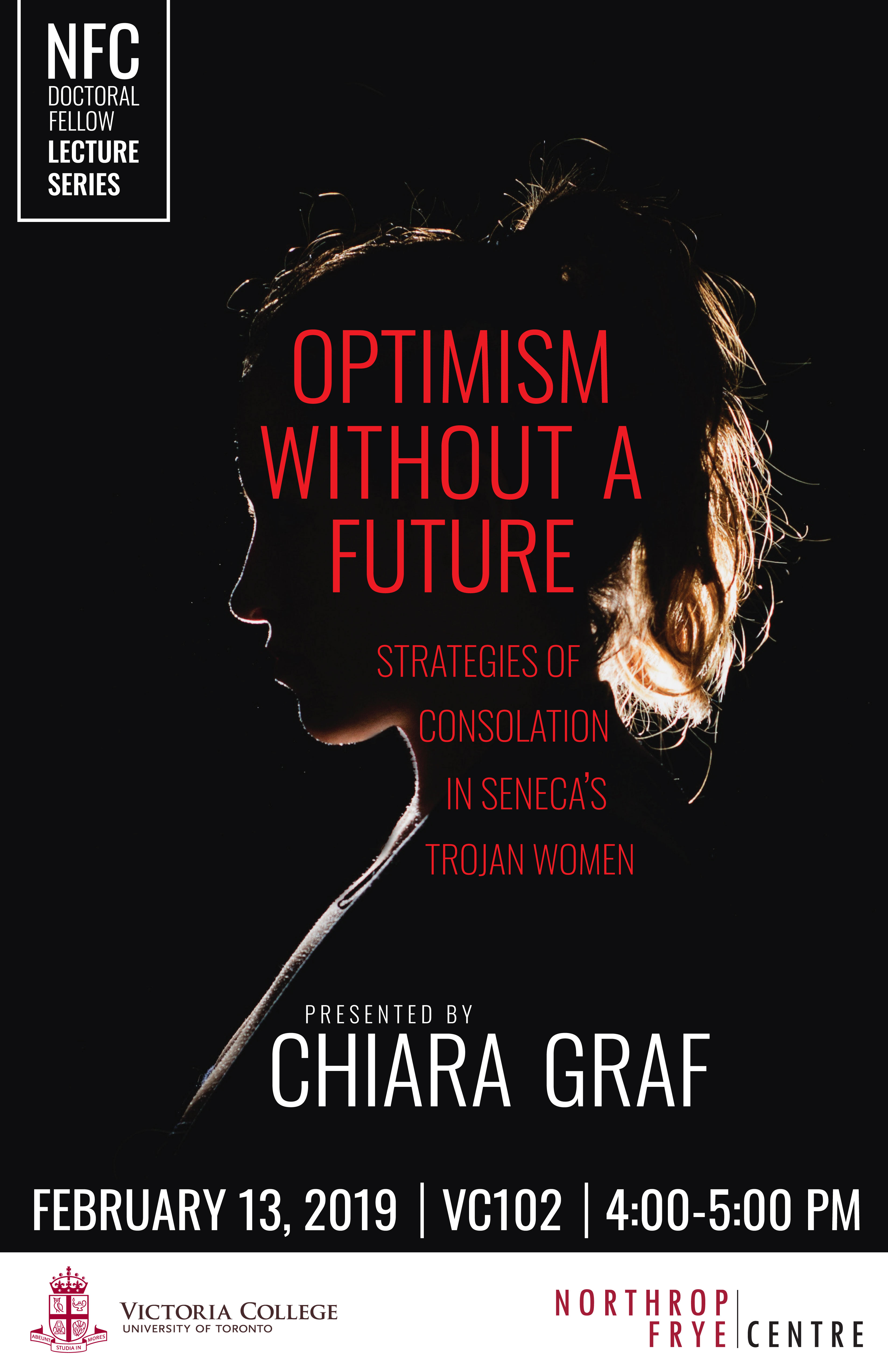
Optimism without a Future: Strategies of Consolation in Seneca’s Trojan Women
Feb. 13, 2019
NFC Doctoral Fellow Lecture Series
Speaker: Chiara Graf (Classics)
The Roman author Lucius Annaeus Seneca penned two major bodies of works, whose relationship to each other has generated much controversy and discussion. On the one hand, in his philosophical treatises, Seneca espouses Stoicism, a belief system geared towards eradicating the emotions through reason and achieving a state of affectively flattened apathy. Yet Seneca also penned eight tragedies, which portray a wide array of passions with unbridled gusto and intensity. To make matters worse, the most emotional protagonists of Seneca’s tragedies often express quasi-philosophical ideals and make frequent reference to Stoic maxims and buzzwords. How should we interpret the coexistence in the tragedies of these explicitly Stoic elements with the overabundant passions of flawed characters? This paper will treat the relationship of these two strands of Senecan thought in his tragedy Trojan Women. This play narrates the condition of the women who have survived the fall of Troy at the hands of Greek forces, and who must cope both with the total destruction of their own society and with the prospect of a life of captivity to Greek masters. The women in this play turn to a variety of methods of consolation in the face of this uncertain future—some take comfort in Stoic rationalization and affective flattening, whereas others find paradoxical solace in extreme forms of grief. I argue that, in this play, the latter, “tragic” form of consolation proves more effective than “proper” philosophical methods. In fact, consolatory methods rooted in extreme grief expose the ways in which strictly rational approaches to a troubling future gloss over, aestheticize, and sometimes even take enjoyment in, human suffering. Thus, the Trojan Women engages with, yet ultimately parodies and undercuts, the ideals of affective flattening set forth in his philosophical works.
About the speaker
Chiara Graf is a doctoral candidate in the Department of Classics. Her dissertation explores the ethical potential of affect in the literary, philosophical, and scientific works of the Roman author Lucius Annaeus Seneca. She argues that we should not formulate affect primarily as an obstacle to or distraction from rational knowledge; rather, affect can provide alternative routes to wisdom and define the relationship of the subject to his universe. She has a strong interest in critical theory, particularly modern affect theory.
Feb. 27, 2019 | Atomic Mediation | Carrie Reese
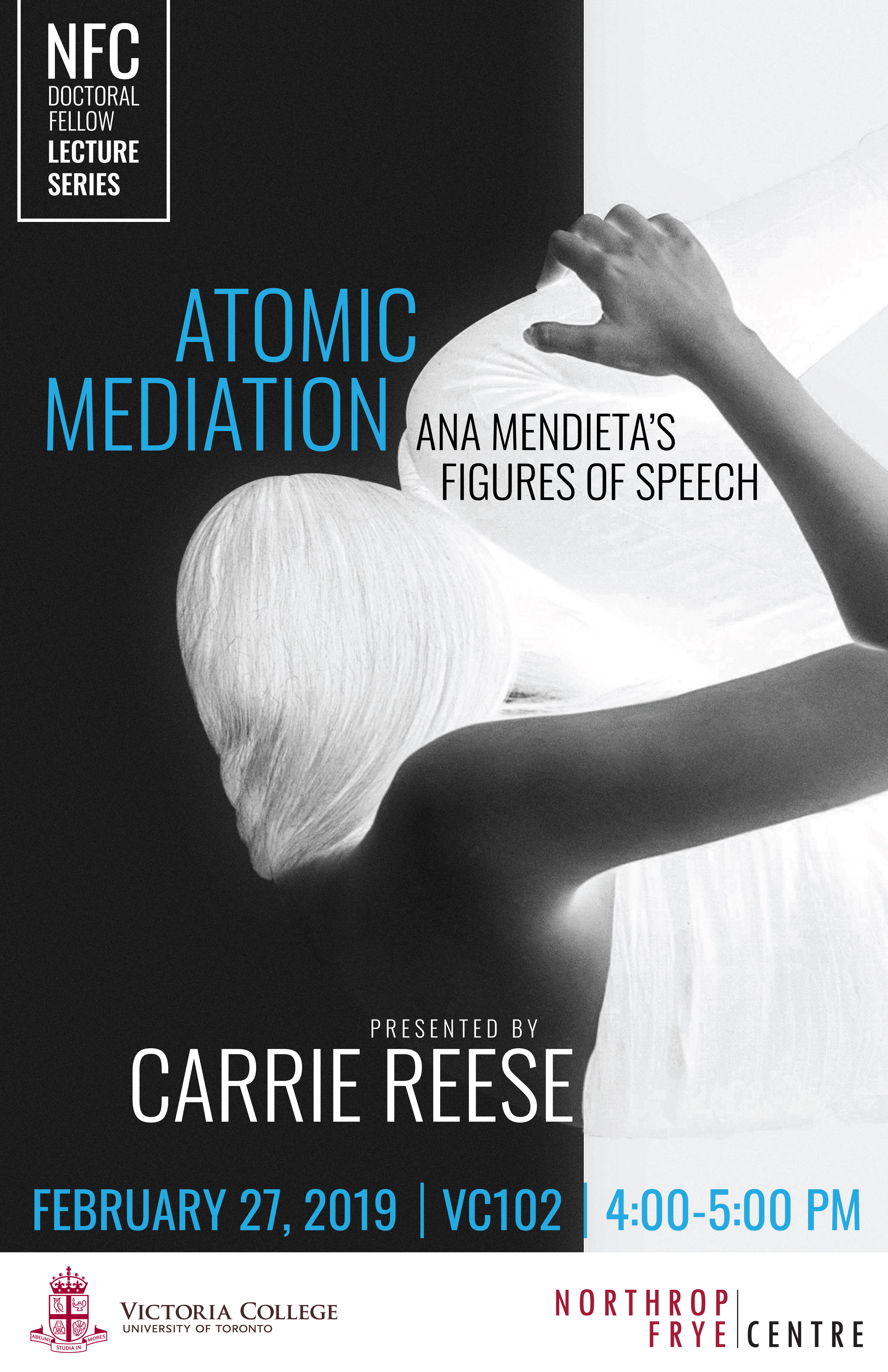
Atomic Mediation: Ana Mendieta’s Figures of Speech
Feb. 27, 2019
NFC Doctoral Fellow Lecture Series
Speaker: Carrie Reese (Cinema)
Ana Mendieta’s short film X-Ray (1975) unsettles viewers as the monotone phonetic screams that accompany it emphasize the disjunctive nature of the film’s figure. Deriving from a chapter of my dissertation on the Cuban-American artist's intermedial artworks, this talk will focus on the questions that this film, and intermedial practice at large, produce. These questions include how the figure in Mendieta’s work functions and what it teaches us; how X-ray technologies and speech pathology materials used in the film change the way we might think of the silhouetted figure that abounds in her work; and how the role of the atom moves from Mendieta’s work with the body to her history with Cuba and the Cold War. Using Mendieta as a way to open up conversations about violence, politics, and interdisciplinary media, I propose that the figural and linguistic modes that occupy Mendieta’s X-Ray show how intermedia artwork, as it engages interdisciplinary thought, may register theoretical and political potential that comes about solely through the process of mediation—and intermediation at that.
About the speaker
Carrie Reese is a doctoral candidate at the Cinema Studies Institute. Her research interests lie at the intersection of experimental film and media, continental philosophy, intermediality, and the concept of violence. Linking the work of experimental artist Ana Mendieta to these ideas, her dissertation focuses on the ways in which Mendieta's work can change current methods of approaching media theory and philosophy. Carrie is an assistant editor of World Picture Journal and has published in an anthology titled "Jouer l'actrice" with Ecole normale supérieure.
Mar. 6, 2019 | Digging up Discovery | Christina Turner
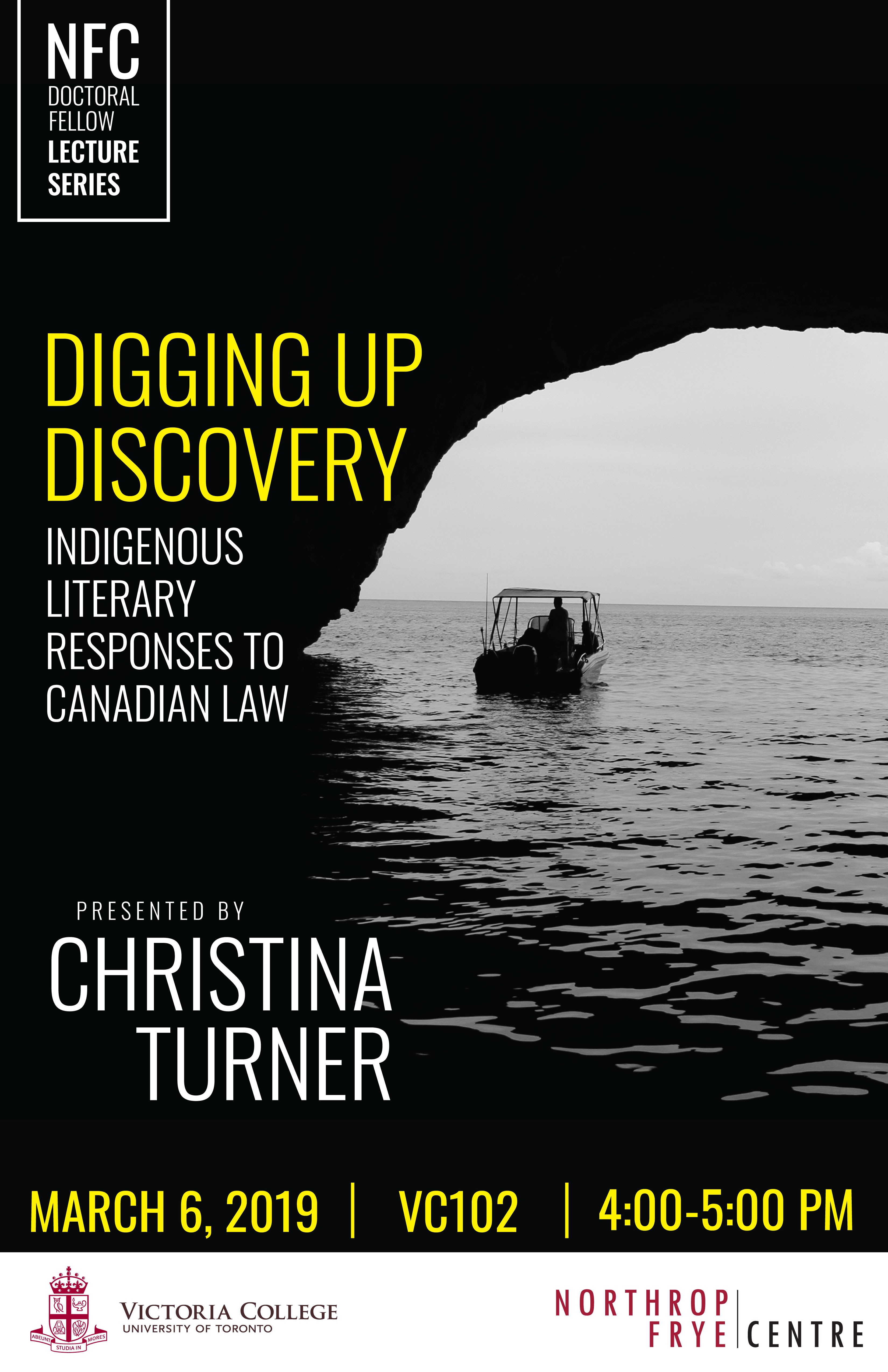
Digging up Discovery: Indigenous Literary Responses to Canadian Law
Mar. 6, 2019
NFC Doctoral Fellow Lecture Series
Speaker: Christina Turner (English)
The Doctrine of Discovery is an international law which originated in the Middle Ages and enabled European nations to ostensibly claim the lands they discovered in the Americas. While discovery as a legal doctrine has been formally repudiated in both Canadian and international law, it continues to structure the way the Supreme Court in Canada understands both Indigenous rights and legal systems. Michi Saagiig Nishnaabeg poet Leanne Betasamosake Simpson takes up the ways in which legal discovery continues to influence Indigenous-settler relations in Canada in her 2013 collection Islands of Decolonial Love. Through an analysis of Simpson’s work, I argue that discovery is not only a legal doctrine, but a particular way of seeing the land which entails erasing Indigenous law. Indigenous literary texts illuminate both how the violence of discovery accumulates through time and the difficulties of reviving Indigenous legal systems in the wake of discovery.
About the speaker
Christina Turner is a PhD candidate and settler scholar in the Department of English. Her dissertation examines representations of human rights in contemporary Indigenous writing from Turtle Island (North America). She argues that Indigenous writers such as Eden Robinson, Shirley Sterling, Leanne Betasamosake Simpson, and Jordan Abel critique normative definitions of human rights as conceptualized around the visual recognition of alterity. Instead, these writers propose that freedom, political autonomy, and Indigenous sovereignty is represented and realized through sound -- through certain postures of listening and through echoes and impressions which travel across the borders of settler polities and endure through time.
Christina is also the books editor at rabble.ca and is always trying to perfect her recipe for sourdough bread.
Mar. 11, 2019 | How Ring the Communal Bell? | Fan Wu
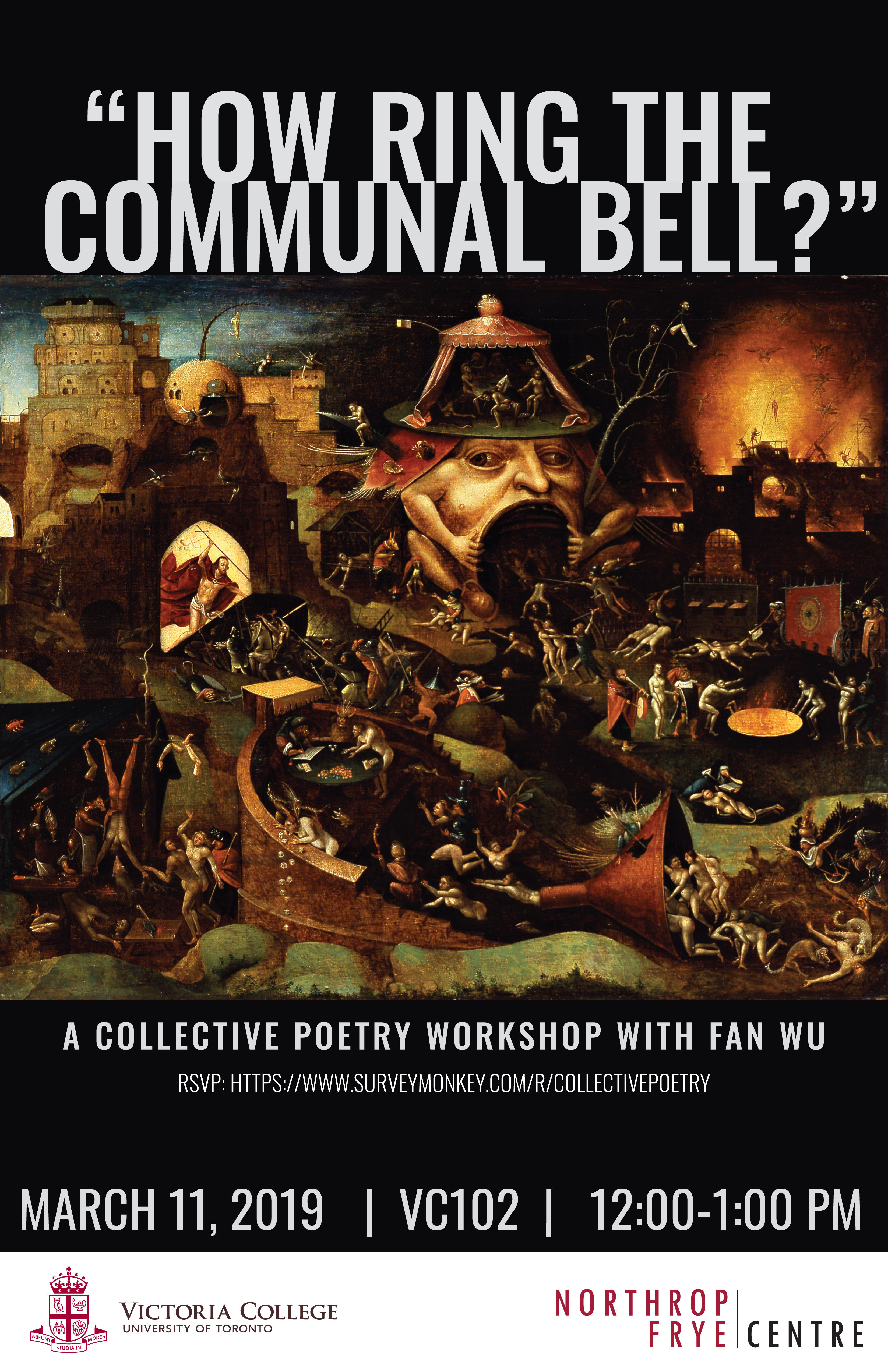
How Ring the Communal Bell? A Collective Poetry Workshop
Mar. 11, 2019
Public Poetry Workshop
Speaker: Fan Wu (Writer & Community Organizer)
If the monologic is the predominant principle of our western institutions—are we satisfied? In this workshop we together shall rev up the possibilities of collective practice through poetics, histories of collaboration, and writing engagements. We'll move through prompts including soundtracked cinematography generation, sharing-circle exquisite corpses, and mashup remix translations. I wanna promise a lunchtime blitz of playful intensity, of gentle melding with the inner & outer languages of others.
About the speaker
Fan Wu is a plasmatic fantasist fumbling toward a dream of one day having boundaries. He has published two chapbooks, Hoarfrost & Solace and Thom Gill's Now & Neverending, and edits the chapbook series What Queer Reading (Knife/Fork/Book). He hosts critical reading and creative writing workshops in partnership with Toronto galleries, on such themes as translation, masochism, and mourning. Please contact him for collaboration or companionship at fanwu2@gmail.com.
Mar. 20, 2019 | The Ikumen Backlash | Nick Feinig
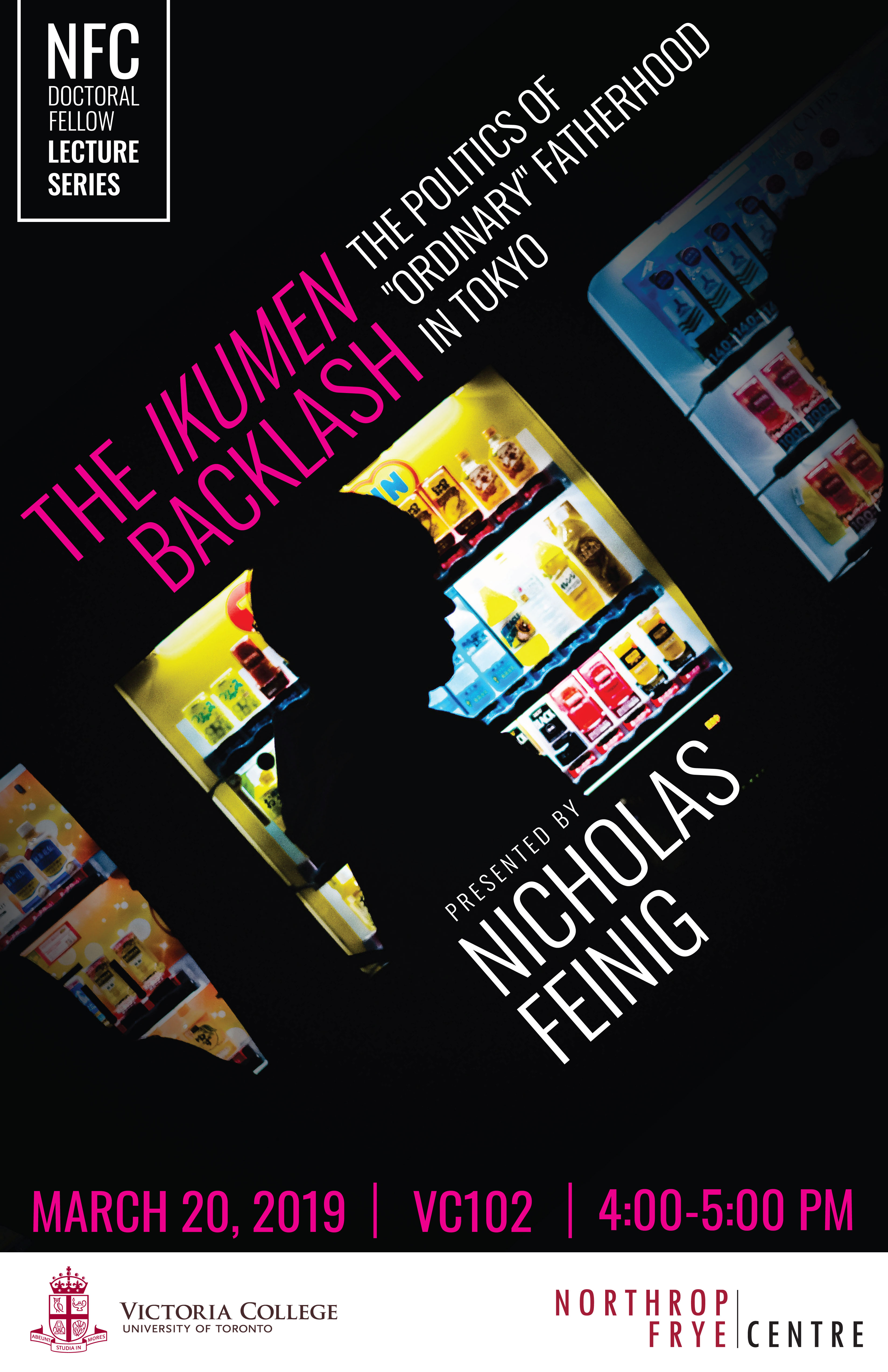
The Ikumen Backlash: The Politics of “Ordinary” Fatherhood in Tokyo
Mar. 20, 2019
NFC Doctoral Fellow Lecture Series
Speaker: Nick Feinig (Anthropology)
In 2016, a Japanese politician championing paternity leave was embroiled in a sex scandal. This case drew attention to simmering resent directed towards "ikumen". Derived from the Japanese term “ikuji” (child rearing) and the English term “men”, ikumen invert the hegemonic gendered division of labour in Japan: they play with children, help with homework, organize events at school, and assist with cooking and cleaning. Held in contrast with the absentee salary men of the nation's boom years, ikumen once appeared as champions of a radical shift towards gender equality in the home. However, much has changed since the term was first popularized in 2006. From talk show panels and mommy blogs to the National Diet, men and women are increasingly vocal in their criticism of these fathers. Drawing on data collected over 12 months of ethnographic fieldwork in Tokyo, this talk attends to an important question: why has public opinion turned against ikumen? Against the backdrop of this conflict, Feinig sketches out an emerging ideal of fatherhood in Japan organized around the slippery concept of "common sense".
About the speaker
Nicholas Feinig is a doctoral candidate in the Department of Anthropology. Against the backdrop of Japan's rapidly aging society and falling birthrate, his research examines non-profit organizations dedicated to promoting active and engaged fathering. His fieldwork was conducted in Tokyo alongside members of these groups, and incorporates translations of parenting textbooks and management training material.
2017-18 Events
In 2017-18, the NFC continued to engage with the Vic community and strengthen our commitment to undergraduate research through a variety of activities. These included: the fourth annual Northrop Frye Centre Lecture with guest speaker Prof. Josiah Blackmore (Harvard U), special visiting lectures with Prof. Ruth Ben-Ghiat (NYU), Prof. Jordi Falgàs (Stanford U), and Prof. Alex Csiszar (Harvard U), and a series of seminars and workshops held in our beautiful space on the main floor of Old Vic.
Oct. 12, 2017 | Fascist Empire Cinema | Ruth Ben-Ghiat
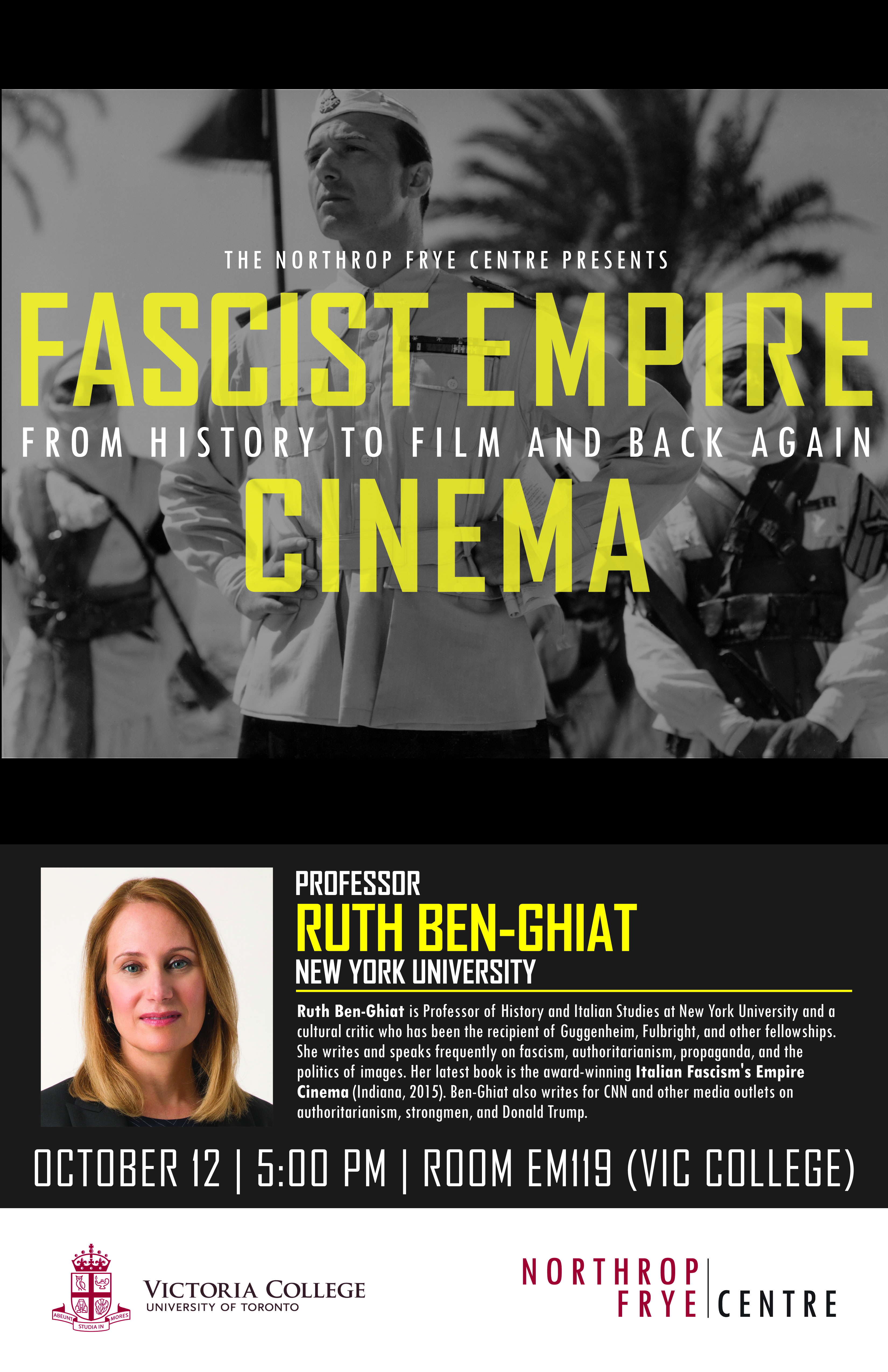
Fascist Empire Cinema: From History to Film and Back Again
Oct. 12, 2017
Public Guest Lecture
Speaker: Ruth Ben-Ghiat (New York University)
What are the challenges of doing interdisciplinary work? Drawing on her experiences in coming to film studies as a historian, Ruth Ben-Ghiat will bring the methodologies and questions of one field to bear on another. Using her work on Fascist empire cinema as a case study, Ben-Ghiat will explore the task of conveying the place of history in images, and the place of images in history. This talk will also consider the interpretative issues posed in studying objects and texts about which little is known, and the place of what Ben-Ghiat calls "informed intuition" in such circumstances, while also reflecting on why interdisciplinary work is so vital to the humanities today.
About the speaker
Ruth Ben-Ghiat is Professor of History and Italian Studies at New York University and a cultural critic who has been the recipient of Guggenheim, Fulbright, and other fellowships. She writes and speaks frequently on fascism, authoritarianism, propaganda, and the politics of images. Her latest book is the award-winning Italian Fascism's Empire Cinema (Indiana, 2015). Ben-Ghiat also writes for CNN and other media outlets on authoritarianism, strongmen, and Donald Trump.
Oct. 23, 2017 | Early Dalí | Jordi Falgàs
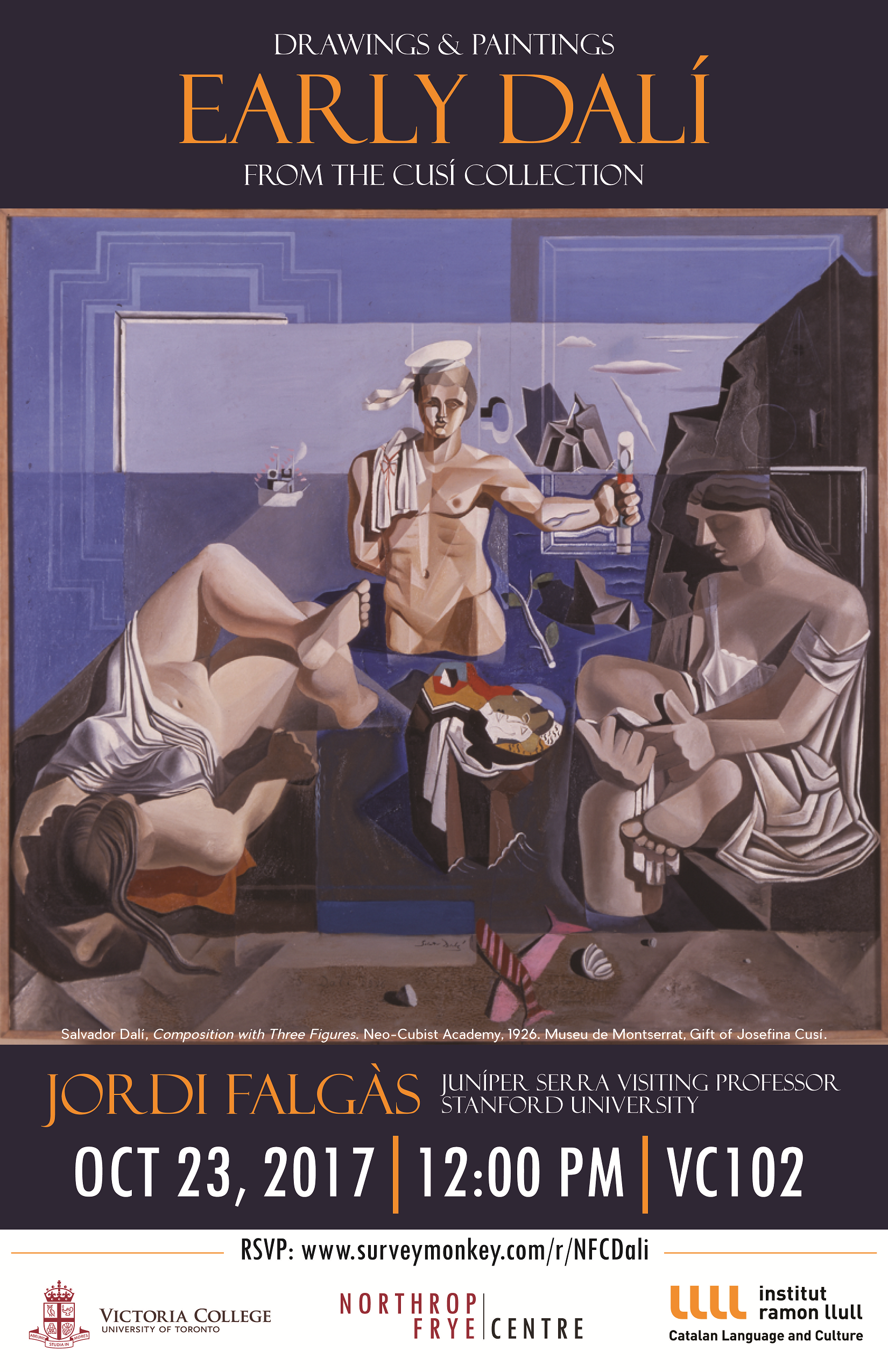
Early Dalí: Paintings and Drawings from the Cusí Collection
Oct. 23, 2017
Public Guest Lecture
Speaker: Jordi Falgàs (Stanford University)
Joaquim Cusí was a friend of Salvador Dalí’s father and he became an enthusiastic supporter of the young artist. Cusí was a successful pharmacist with no training in art, and yet he was the first one to purchase numerous paintings and drawings from Dalí’s earliest individual shows in Barcelona. The works acquired by Cusí were not seen again on display during his lifetime, and scholars were never allowed to see the full extent of the collection. Jordi Falgàs is the first art historian to study and publish these works, which constitute a significant chapter in Dalí’s early years. In this lecture, he will present the results of his research for the first time outside of Spain.
About the speaker
Jordi Falgàs is an art historian who specializes in Catalan modern art and architecture. He is currently the Lecturer in Catalan Studies at Stanford University. Since 2008, he has been the Director of the Rafael Masó Foundation, a house museum, research and exhibition center in Girona, Catalonia. He holds PhDs in Art History from the University of Wisconsin-Madison and the University of Barcelona. He was Cleveland Fellow in Modern Art at the Cleveland Museum of Art (2004-2007) and Assistant Executive Manager at the Gala-Salvador Dalí Foundation (1996-2003). He has been a museology consultant for Gaudí's Casa Vicens in Barcelona (2014-2016) and project coordinator for the future Museum of Modern and Contemporary Art in Girona (2014-2017). For the last twenty-five years, he has worked as a curator on numerous exhibitions in Catalonia and the United States, such as Barcelona and Modernity: Picasso, Gaudí, Miró, Dalí (Cleveland Museum of Art and Metropolitan Museum of Art, 2006-2007). His latest books are Masó: interiors (2016) and Dalí: Neo-Cubist Academy and Other Works (in press).
Nov. 16, 2017 | The Sea | Josiah Blackmore
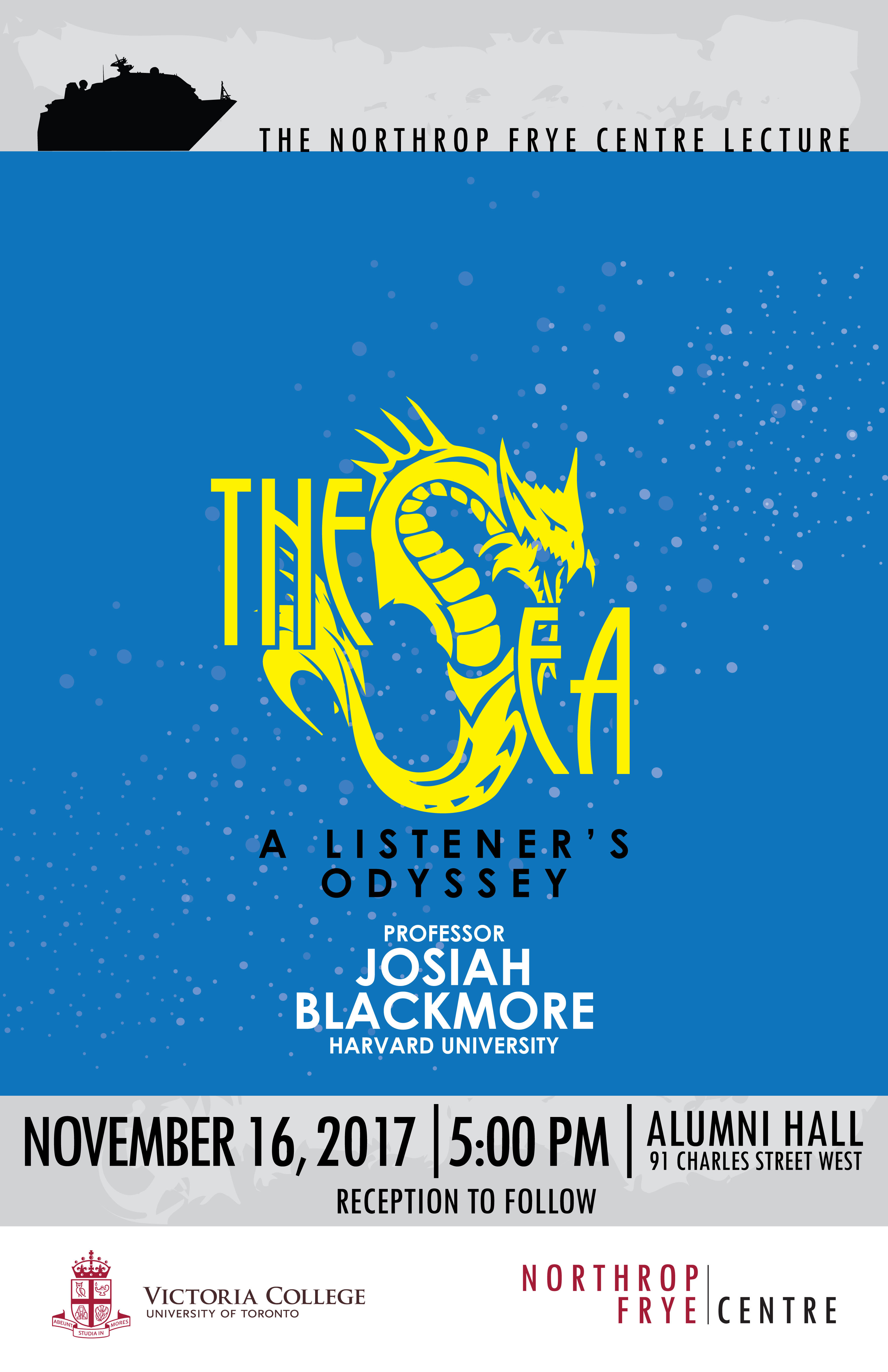
The Sea: A Listener’s Odyssey
Nov. 16, 2017
The Annual Northrop Frye Centre Lecture
Speaker: Josiah Blackmore (Harvard University)
The sea has surrounded people, countries, and civilizations throughout time. It has provided food, threatened destruction, and carried daring travelers into other worlds of languages, climates, and wonders. The sea invades the senses of beachcombers, mariners, and of those who live by or travel on it. This lecture takes a journey through literary evocations of and engagements with the sea and seascapes, and ponders how individuals and cultures listen to the sea. In this voyage, we will hear oceanic voices that sometimes become indistinguishable from the authors who record them. Using the writings of the seaside and seaborne nation of Portugal from the early Middle Ages to later centuries, this listener’s odyssey will gather together human artists, gods of mythology, and monsters of the deep.
About the speaker
Josiah Blackmore is the Nancy Clark Smith Professor of the Language and Literature of Portugal at Harvard University. From 1992 to 2013 he taught in the Dept. of Spanish and Portuguese at the University of Toronto, and has been visiting professor at Harvard and the Univ. of Chicago and visiting scholar at the University of the Witwatersrand, South Africa. His research focuses on all aspects of medieval and early modern Portugal, especially the writings and culture of maritime expansion, medieval poetry, and the dramatic semantics of shipwreck and oceanic peril. Among his books are Manifest Perdition: Shipwreck Narrative and the Disruption of Empire (2002), Moorings: Portuguese Expansion and the Writing of Africa (2009), and the forthcoming The Inner Ship.
Nov. 24, 2017 | Indefensible | Tom Fraser
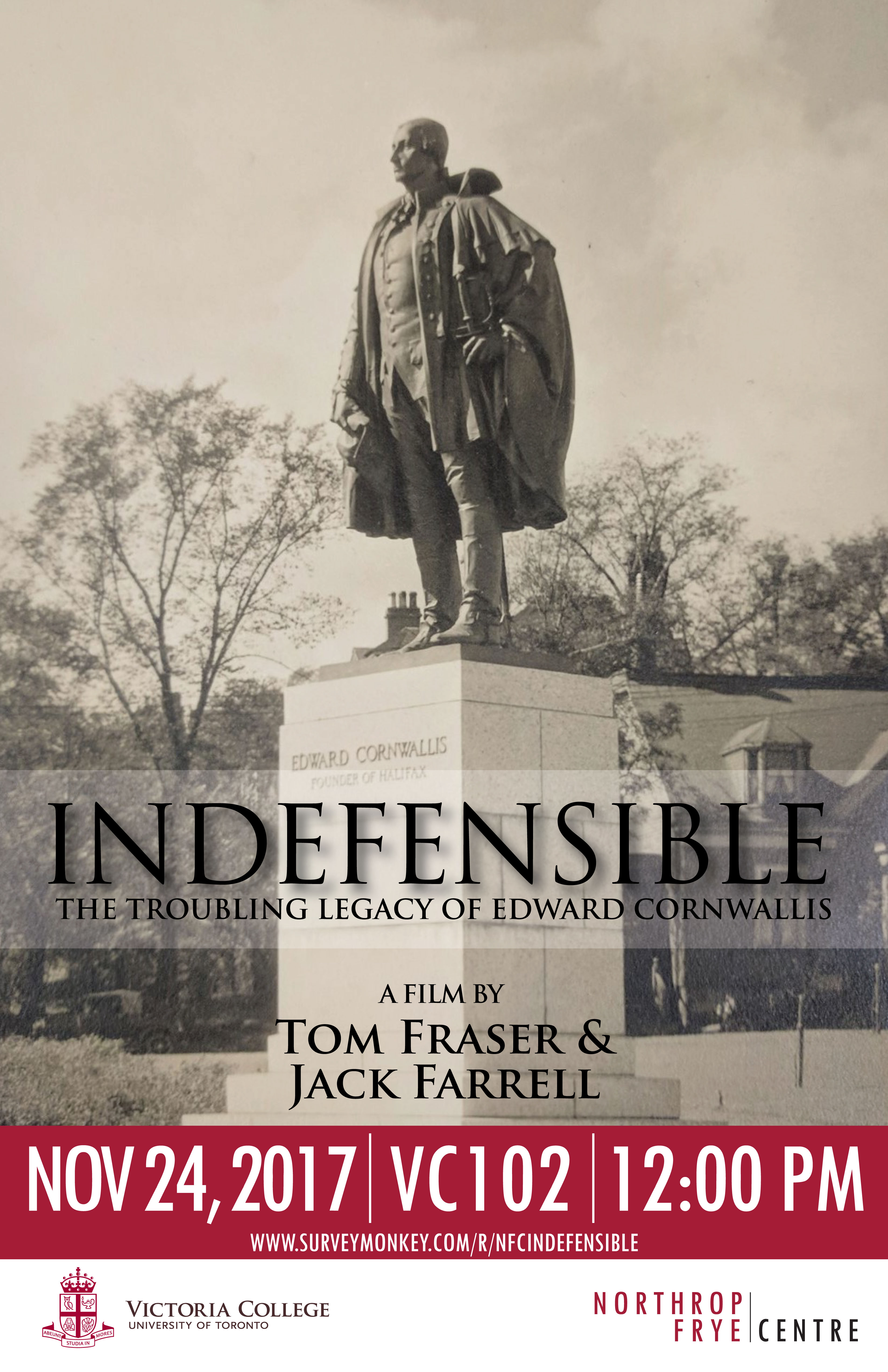
Indefensible: The Troubling Legacy of Edward Cornwallis
Nov. 24, 2017
Public Film Screening and Q&A
Speaker: Tom Fraser (2017-18 Undergrad Research Fellow)
On 1 July 2017, a group of men from the far-right group “The Proud Boys” interrupted a Mi’kmaq protest and ceremony in south-end Halifax, putting a national spotlight on the debate surrounding the statue where the protest took place. Although it has now garnered nationwide interest, the debate surrounding Edward Cornwallis and his mistreatment of the Mi’kmaq started in the early 1990s when Mi’kmaq historian Daniel Paul published his book We Were Not the Savages, the first exposé of “the founder of Halifax.” The campaign to remove the statue has since accelerated, with Halifax City Council recently responding to vocal activism by taking the first steps towards its eventual removal. In the documentary, directors Jack Farrell and Tom Fraser explore Cornwallis’s actions in the 1750s, the process which led to the erection of his statue in the 1930s, and the political activist process to challenge the imperial narrative in the 21st century.
The Northrop Frye Centre is pleased to invite you to the film screening of “Indefensible: The Troubling Legacy of Edward Cornwallis” directed and produced by Jack Farrell and NFC Undergraduate Fellow Tom Fraser. There will be a Q & A following the 30 minute-long documentary screening.
Jan. 31, 2018 | Peer Review | Alex Csiszar
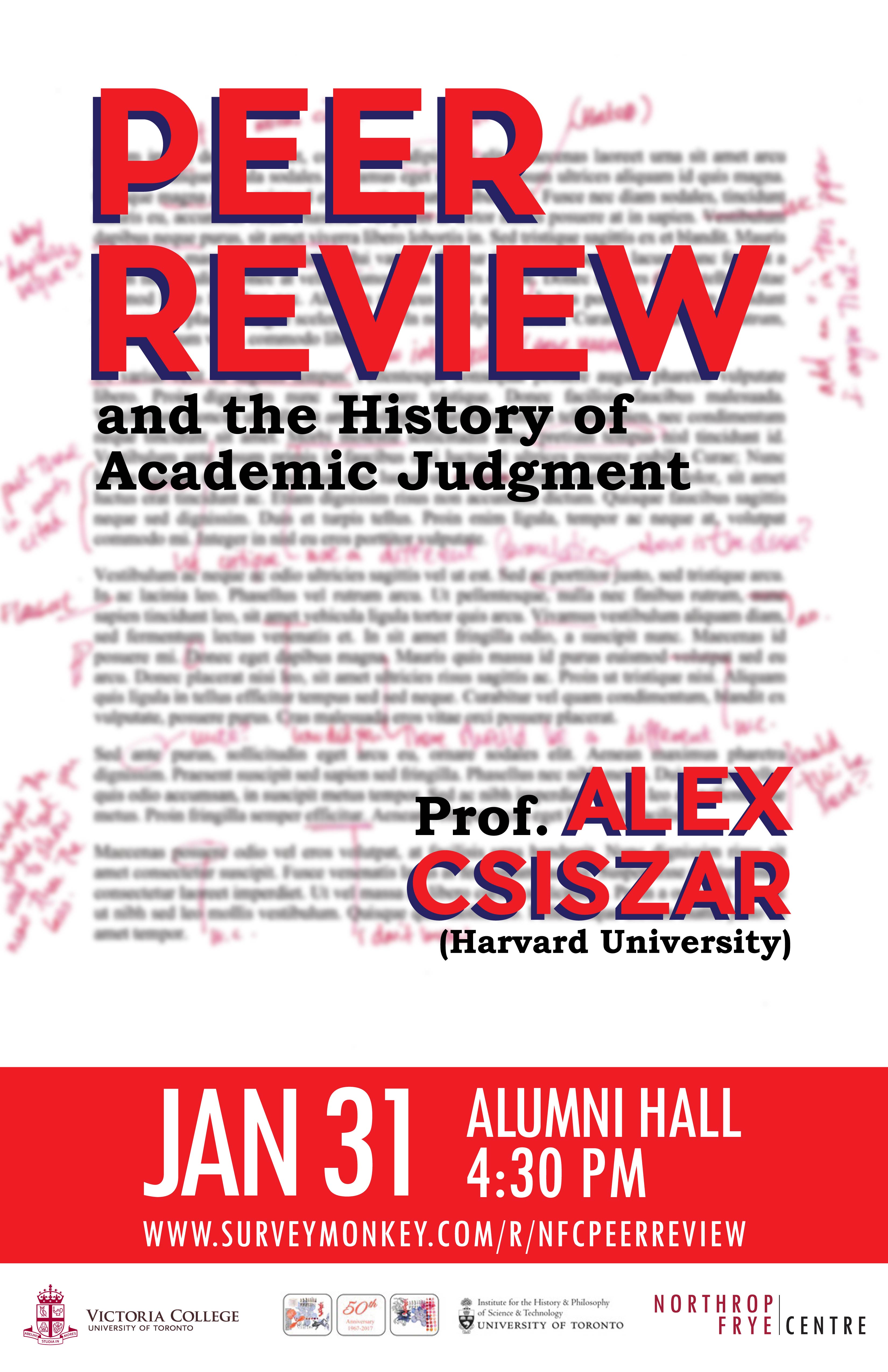
Peer Review and the History of Academic Judgment
Jan. 31, 2018
Public Guest Lecture
Speaker: Alex Csiszar (Harvard University)
In this talk, Professor Alex Csiszar will discuss the history of refereeing practices in the sciences (now known as peer review), expanding on his public piece published in Nature in April 2016.
About the speaker
Alex Csiszar is Associate Professor of the History of Science at the Department of the History of Science at Harvard University. He studies the history of science in nineteenth-century Western Europe and publishes primarily on the history of communications media and information technology in the sciences. He is the author of The Scientific Journal: Authorship and the Politics of Knowledge in the Nineteenth Century, forthcoming from University of Chicago Press.
Mar. 13, 2018 | Considering Non-Human Persons | Aleksa Alaica
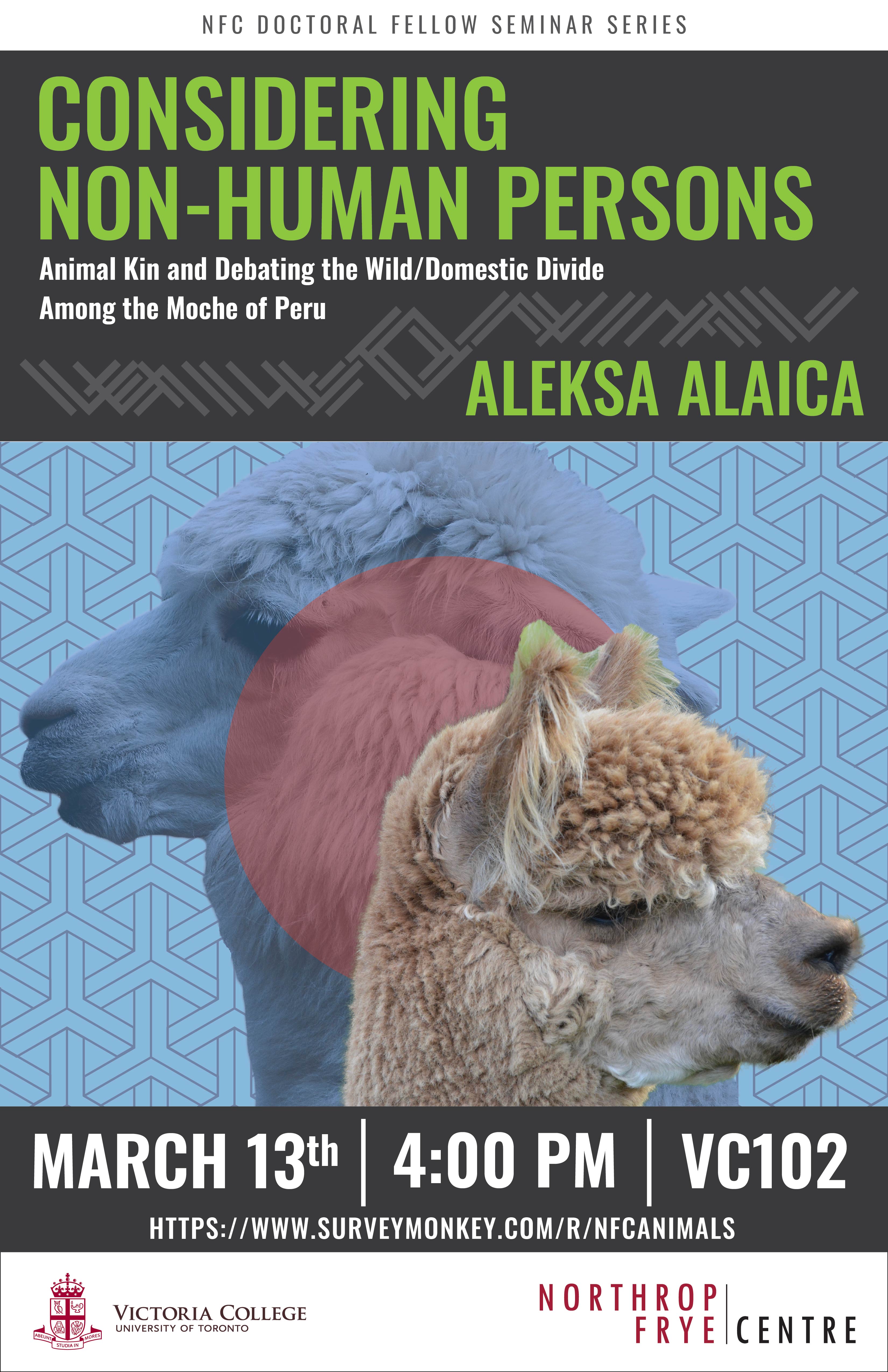
Considering Non-Human Persons: Animal Kin and Debating the Wild/Domestic Divide Among the Moche of Peru
Mar. 13, 2018
NFC Doctoral Fellow Lecture Series
Speaker: Aleksa Alaica (Anthropology)
The Moche of northern Peru depicted animals in their large corpus of iconography, herded llamas and alpacas across hundreds of kilometers and buried animal offerings alongside humans in elite tombs and in sacrificial offerings. Through an examination of the animal bone remains and iconographic record that include animal images from the Moche period (AD200-850), Aleksa offers a posthumanist critique of animal selves, considering the links between the wild and domestic animal categories, non-human being temporalities and materiality.
About the speaker
Aleksa Alaica is a PhD Candidate in the Department of Anthropology. Her research focuses on pre-Columbian herding strategies during the Late Moche period (AD650-850) on the north coast of Peru. She utilizes animal bone remains, chemical analyses and iconographic evidence to consider how domesticated llamas and alpacas were used in past social, political and ritual spheres of society. Aleksa also explores posthumanist theory to question the central role of humans as the prime movers of change in past and contemporary society.
Mar. 20, 2018 | Education Inequality | Beyhan Farhadi
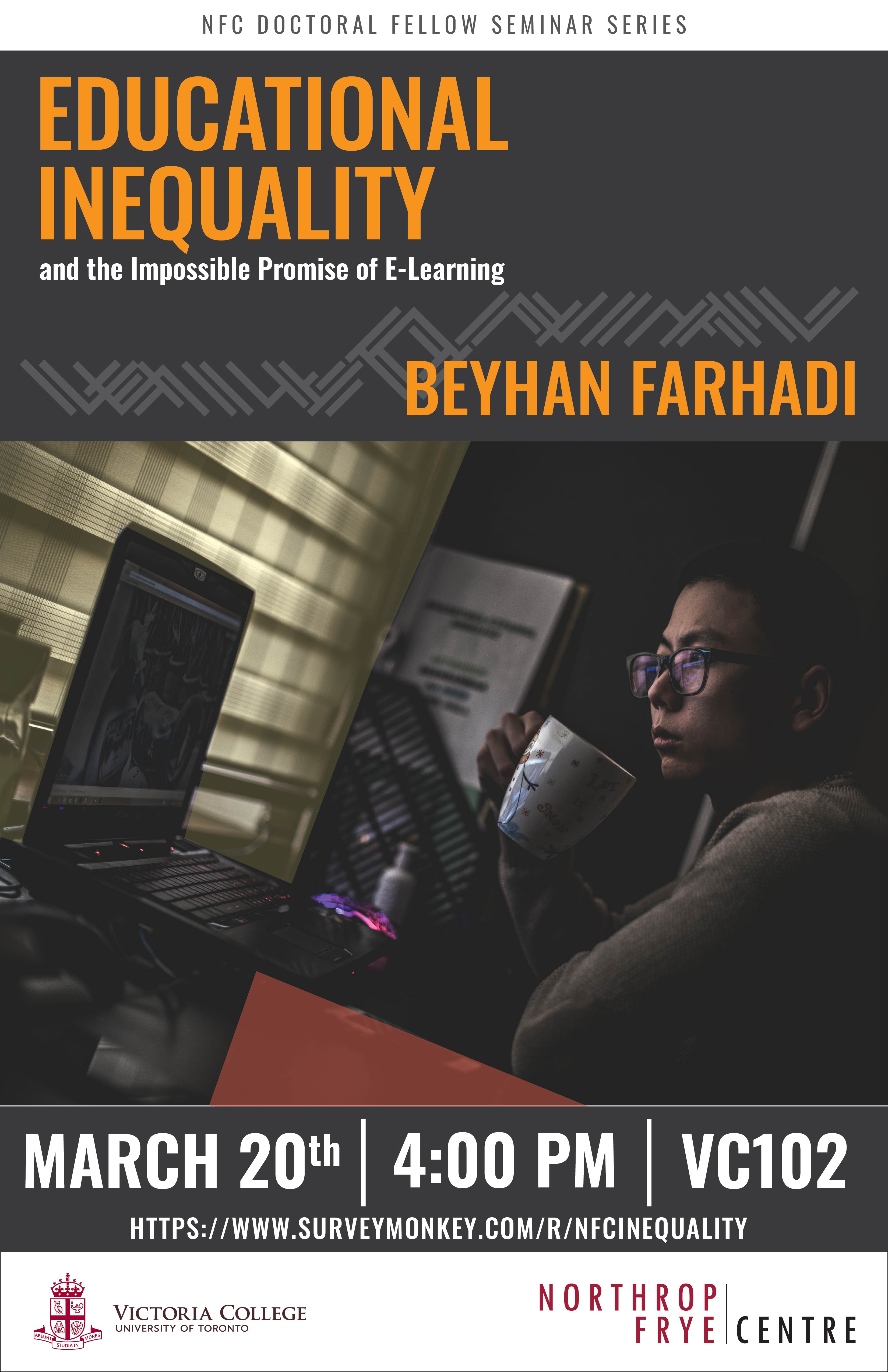
Education Inequality and the Impossible Promise of E-Learning
Mar. 20, 2018
NFC Doctoral Fellow Lecture Series
Speaker: Beyhan Farhadi (Geography)
This talk will present findings from a 10-month long ethnographic study on electronically delivered instruction (e-Learning) in the Toronto District School Board. Set against the promise e-Learning makes to democratize schooling, and in so doing alleviate educational inequality, results of the study highlight greater disparity in access, not only in the offering of courses, most of which are university preparation, but also geographically, since students taking e-Learning are concentrated in areas of the city with greater learning opportunities. Rather than frame the research problem as one which solely emerges out of a ‘global’ organization of economies, Beyhan also considers the cultural and political systems through which social stratification is legitimated through the nation-state in formal systems of schooling. By drawing on participant observation in seven e-Learning classrooms and 90 interviews with students, parents, administrators, and teachers, Beyhan will illustrate the effects of the impossible promise of e-Learning on student identity, whose emergence is conditioned by entrepreneurial aspiration and a neoliberal imaginary of educational reform.
About the speaker
Beyhan Farhadi is a doctoral candidate in the Department of Geography and Planning. Her dissertation research, which was inspired by her work teaching at the secondary level, investigates how the provision of electronically delivered instruction is affecting inequalities in education and shaping student identity in high schools across the Toronto District School Board. She has also published on narratives of safety and the work of place-making on social media, identity in the city, and is currently in the final stages of co-editing a special issue for Emotion, Space, and Society on the politics of desire.
Mar. 29, 2018 | Light in the Shadow of Empire | Will Fysh
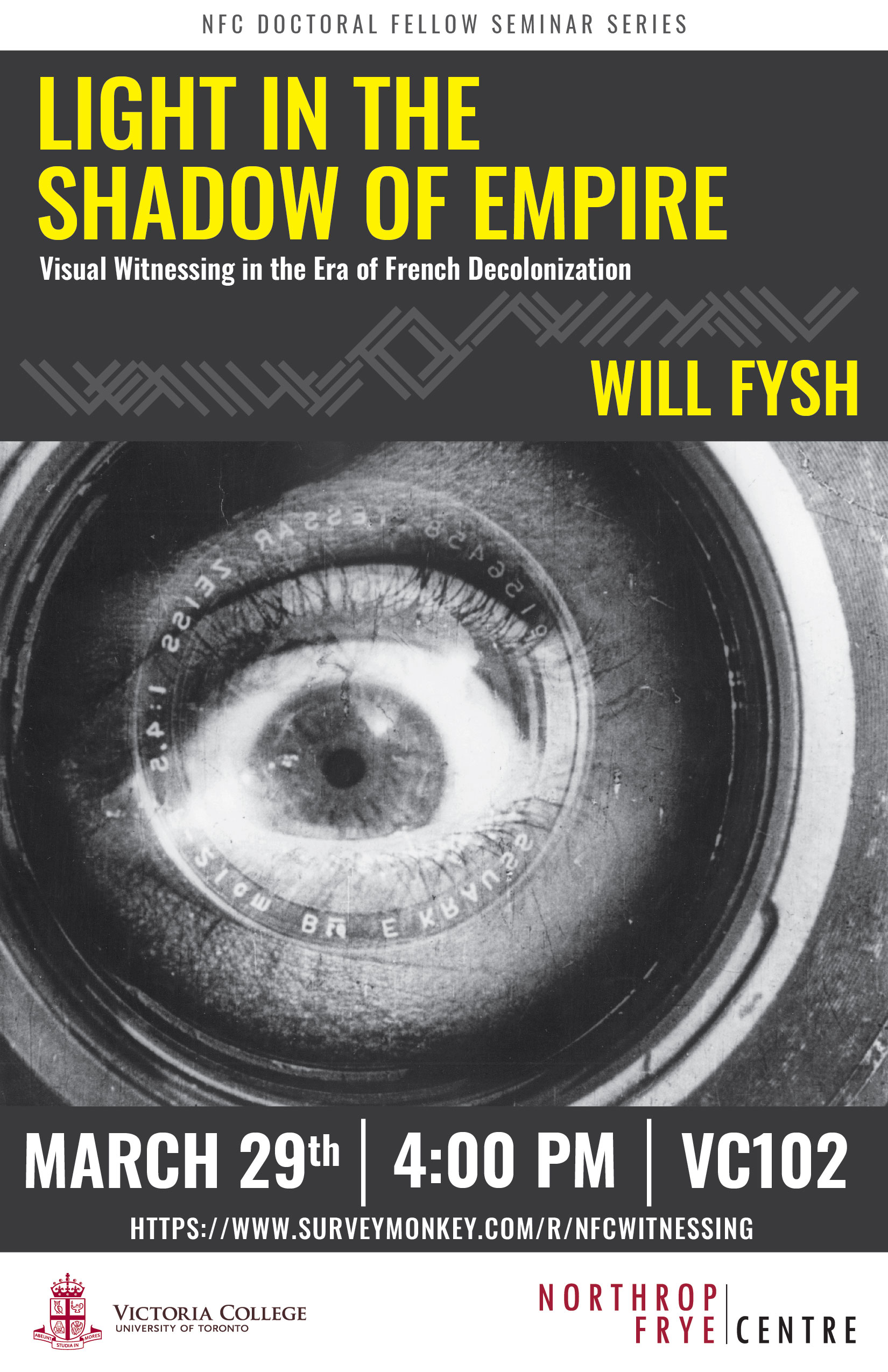
Light in the Shadow of Empire: Visual Witnessing in the Era of French Decolonization
Mar. 29, 2018
NFC Doctoral Fellow Lecture Series
Speaker: Will Fysh (History)
What does it mean to bear witness and how do we account for its cultural currency? If a mediatized, globalized “era of the witness” emerged in the mid-twentieth century, how and why did the camera make that happen? Examining colonial and anticolonial desires to transform spectators into witnesses in response to World War Two and the struggles of French decolonization, Will Fysh shows how photographers, filmmakers, television figures, journalists, civil servants and missionaries strove to envision new futures out of the spectacular realities of the past.
About the speaker
Will Fysh is a PhD candidate in the Department of History. His research interests lie in French colonialism and decolonization, the legacies of the Holocaust, and histories of visual media.
Apr. 4, 2018 | Shamanic Specimens | Marisa Karyl Franz
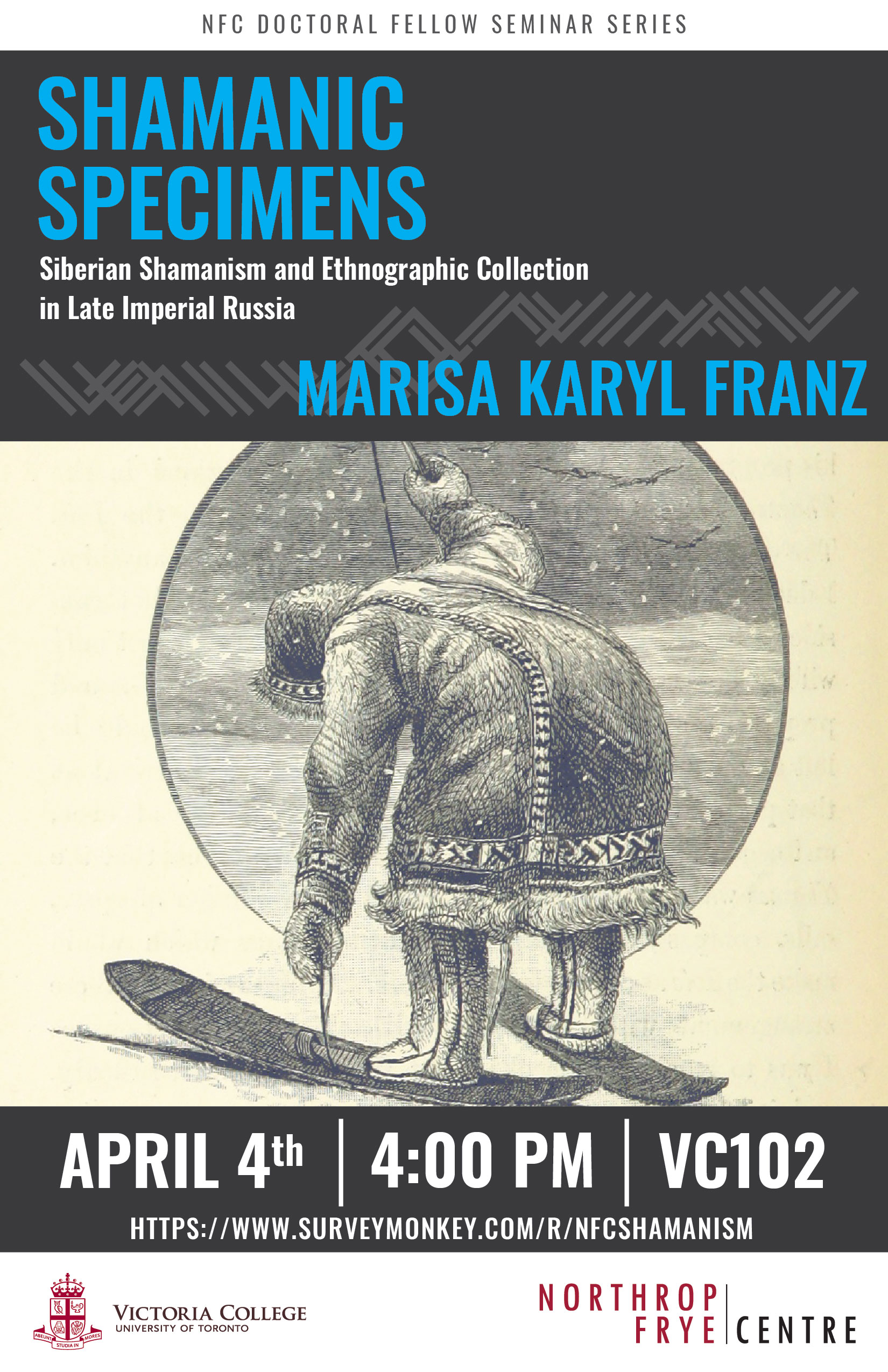
Shamanic Specimens: Siberian Shamanism and Ethnographic Collection in Later Imperial Russia
Apr. 4, 2018
NFC Doctoral Fellow Lecture Series
Speaker: Marisa Karyl Franz (Religion)
This paper examines the collection of Siberian shamanic artefacts between 1880 and 1910 in order to discuss how the classification and categorisation of these objects informs not only our perception of Siberian shamanism, but also the status of the ethnographic object within late Imperial Russian museums.
About the speaker
Marisa Karyl Franz is a doctoral candidate in the Department for the Study of Religion. Her research examines the collection practices of late imperial Russian museums for the gathering of Siberian shamanic materials. Through archival work conducted in Saint Petersburg, Yakutsk, and Irkutsk, her dissertation explores the development of taxonomical systems of collection, imperial Russian modernity, and the constructive nature of desire.
Apr. 11, 2018 | The Visitors’ Book | Kevin James
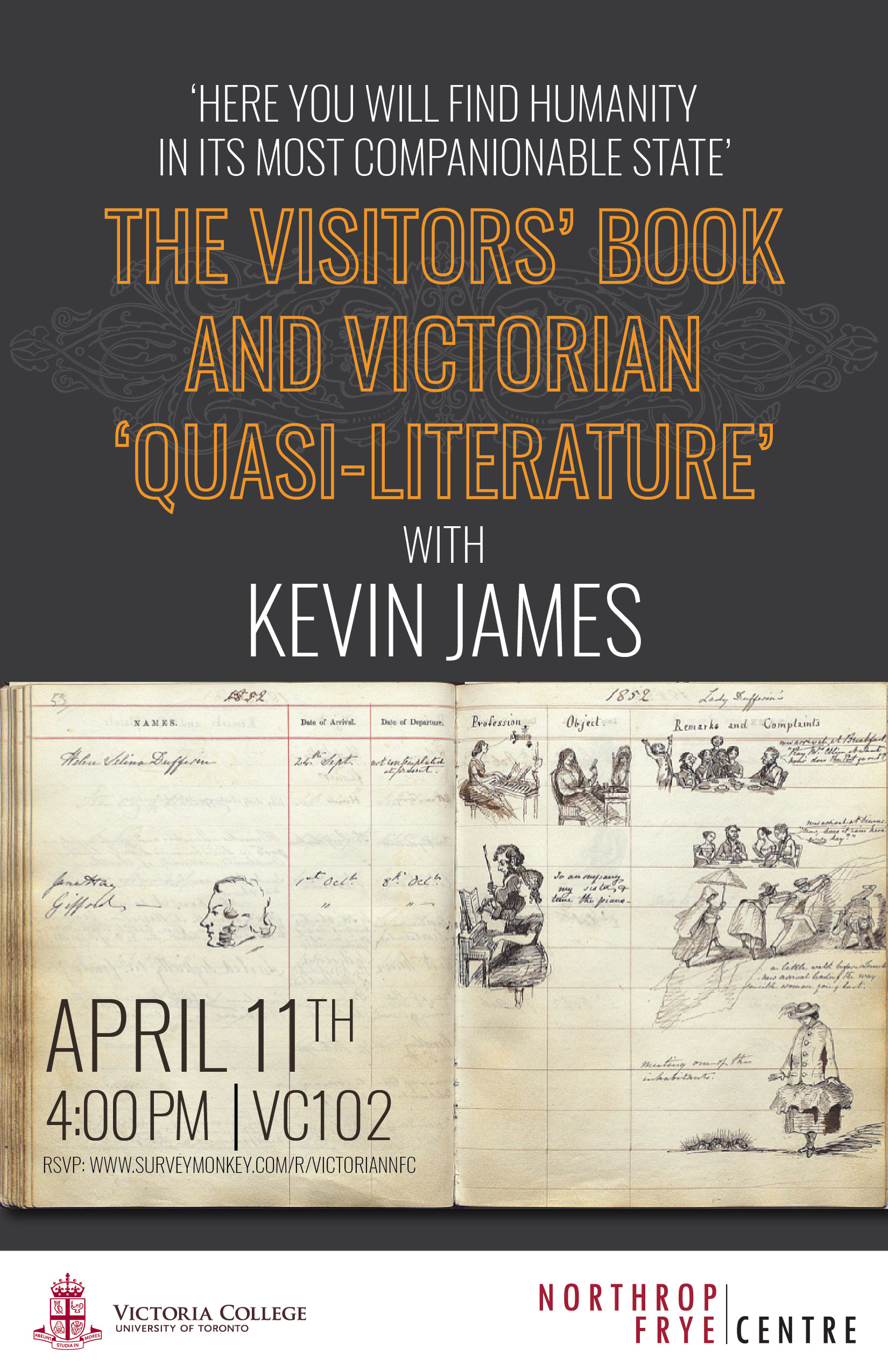
Here You Will Find Humanity in its Most Companionable State’: The Visitors’ Book and Victorian ‘Quasi-Literature’’
Apr. 11, 2018
Visiting Fellow Lecture
Speaker: Kevin James (Guelph U)
This paper explores the visitors’ book as a commodity, a technology, and a tool of self-and social-fashioning in the nineteenth century. Long overlooked as a travel text, the Victorian hotel visitors’ book illuminates reading, writing and travel practices, the expansion of album culture into institutions, and the burgeoning market for specialised hotel stationery in the second half of the nineteenth century. The hotel book was also subject to denigration in meta-narratives that charted its alleged descent from a inspired codicil associated with medieval monasteries and other places of elite travel, to the parlours of inns, where acts of reading and transcription were treated as mere distractions through wet days and dark nights. An analysis of its forms and functions illuminates the growth of the specialised hotel stationery market, reveals complex subjectivities of travel writers as they wrestled with this peculiar text, and also provides a window onto strategies of social and self fashioning enacted in its page.
About the speaker
Kevin James is Professor of History at the University of Guelph. He is author of two monographs, including Tourism, Land, and Landscape in Ireland: The Commodification of Culture (London: Routledge, 2014). He has published widely in journals and edited collections on the development of the tourism sector in the nineteenth-century United Kingdom. The recipient of numerous major national and international grants and fellowships, Kevin is deputy editor of the Journal of Tourism History, and founder of the Tourism History Working Group. His current research program explores the history of the hotel as a social, cultural, and commercial institution in Britain and Ireland from 1832-1922. As an extension of his SSHRC-funded project on hotel texts, Kevin is also currently engaged in a collaborative research program with Professor Patrick Vincent of the University of Neuchatel on visitors' books as historical sources.
2016-17 Events
In 2016-17, the NFC worked to build its community of scholars through lectures and workshops. Some highlights include the third annual Northrop Frye Centre Lecture with guest speaker Prof. C.W. Marshall (UBC) and the second annual special lecture in honour of Brian Merrilees with guest speaker Prof. Helen Solterer (Duke U).
Sep. 28, 2016 | On the Afflictions of Second Thoughts | Ato Quayson
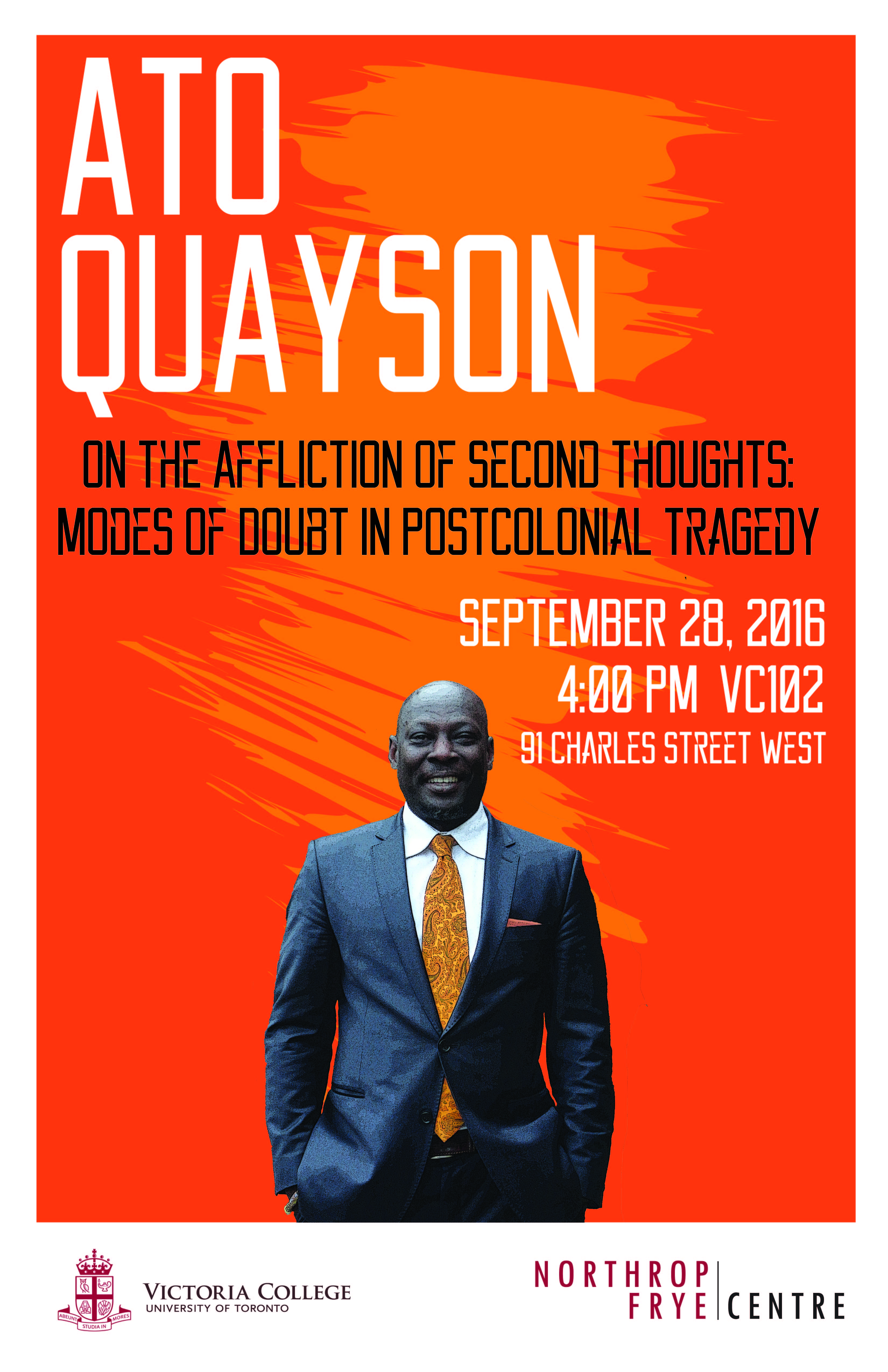
On the Afflictions of Second Thoughts: Modes of Doubt in Postcolonial Tragedy
Sep. 28, 2016
Public Guest Lecture
Speaker: Ato Quayson (University of Toronto)
Paul Rayment, in JM Coetzee’s Slow Man, describes himself as being “afflicted by second thoughts”. Not only can this passing statement be taken as a profound description of all of Coetzee’s characters, it in fact provides a good window for understanding the crises of various postcolonial tragedies, ranging from Chinua Achebe’s Arrow of God to Yvonne Vera’s Without a Name, Toni Morrison's Beloved, and Arundhathi Roy’s God of Small Things, among many others. One suspects that the second-thought affliction is really an effect of modernist modes of writing. While this is a perfectly plausible explanation, this seminar traces the prototypes of second thoughts in postcolonial tragedy to two completely different sources. First is the form of the soliloquy deployed in St. Augustine’s aptly named Soliloquia, where he wrestles mightily with Reason posed as a skeptical interlocutor to his internal self-investigations. The second route is through Frantz Fanon’s Black Skin, White Masks where the affliction of second thoughts is shown to deeply affect the bodily schema of the colonized.
Professor Quayson's interest in this exercise is ultimately to distinguish the affliction of second thoughts from prevarication, and instead to align it closely to the problematic of giving an account of oneself when the instruments and narratives by which one might provide such an account are judged to be either compromised or somehow anachronistic. As Professor Quayson will demonstrate, in various instances thoughts also take on the guise of a strong feeling or emotion and are bound to images, thus forming an intractable thought-affect-image nexus that troubles thought as such. Second thoughts are as much signifiers of unruly internal states as they are the correlates of specific modes of historical transition.
About the speaker
Ato Quayson is Professor of English and Director of the Centre for Diaspora and Transnational Studies at the University of Toronto. He is an accomplished scholar with 14 books to date on topics of African literature, postcolonial studies and literary theory. His most recent publications include The Cambridge Companion to the Postcolonial Novel (Cambridge University Press, 2015), and Oxford St., Accra; Urban Evolution, Street Life and Itineraries of the Transnational (Duke University Press, 2014). He is founding editor of the Cambridge Journal of Postcolonial Literary Inquiry, and is currently working on a new book provisionally titled On Postcolonial Tragedy that takes a sweep of tragedy and tragic philosophy from the Greeks through Shakespeare to the present day and explores key themes on the links between suffering and ethics through postcolonial examples.
Nov. 10, 2016 | Humans, Animals, and Nazis | Gary Bruce
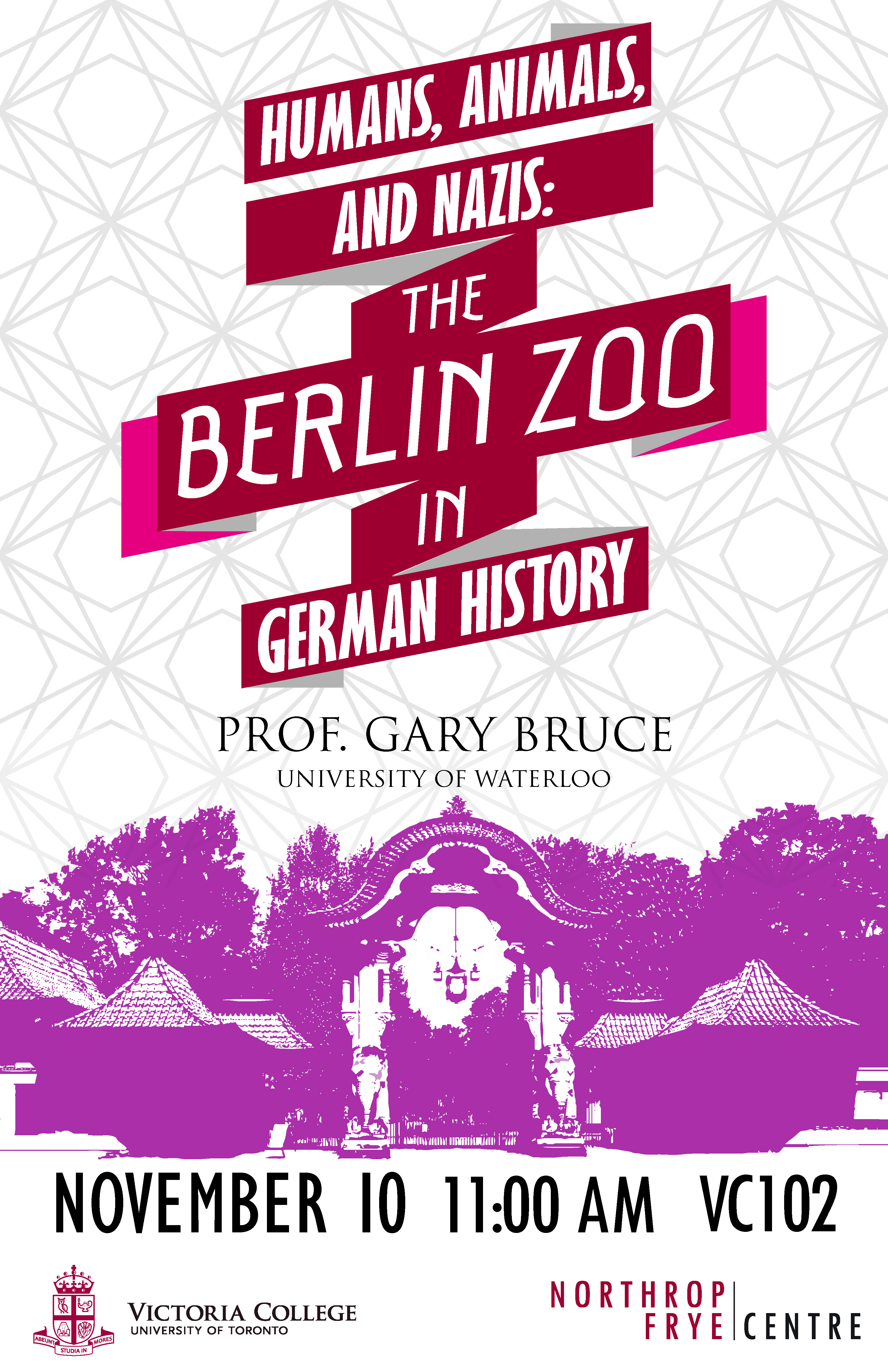
Humans, Animals, and Nazis: The Berlin Zoo in German History
Nov. 10, 2016
Public Guest Lecture
Speaker: Gary Bruce (University of Waterloo)
In 1943, fierce aerial bombardment razed the Berlin zoo and killed most of its animals. But only two months after the war’s end, Berliners had already resurrected it, reopening its gates in the heart of a shattered city. How do we explain this profound attachment of Berliners to their zoo? Much of the answer lies in the history of this enormously popular attraction, one that embedded itself into the day-to-day cultural life of the German capital. Given its enormous reach, German governments of various stripes used the zoo to spread their political message, from the colonialist display of Africans, Inuit, and other “exotic” peoples in the late nineteenth century to the Nazis’ bizarre attempts to breed back long-extinct European cattle. The Berlin zoo therefore helped to shape German views not only of the animal world but also of the human world for more than 150 years.
About the speaker
Gary Bruce is Professor of History at the University of Waterloo. He is the author of The Firm: The Inside Story of the Stasi (Oxford University Press, 2010) and Resistance With the People: Repression and Resistance in Eastern Germany 1945-1955 (Rowman and Littlefield, 2003). Prof. Bruce's newest project, Through the Lion Gate: A History of the Berlin Zoo (forthcoming with Oxford University Press) examines the Berlin Zoo from its founding in 1844 to the union of the two Berlins in 1990, examining changing perceptions of the role of animals in human existence, popular notions of the 'other' and the 'exotic' and the growing attraction in both the German scholarly community and the general population to the world beyond German borders.
Oct. 6, 2019 | Subsequent Medeas | C.W. Marshall
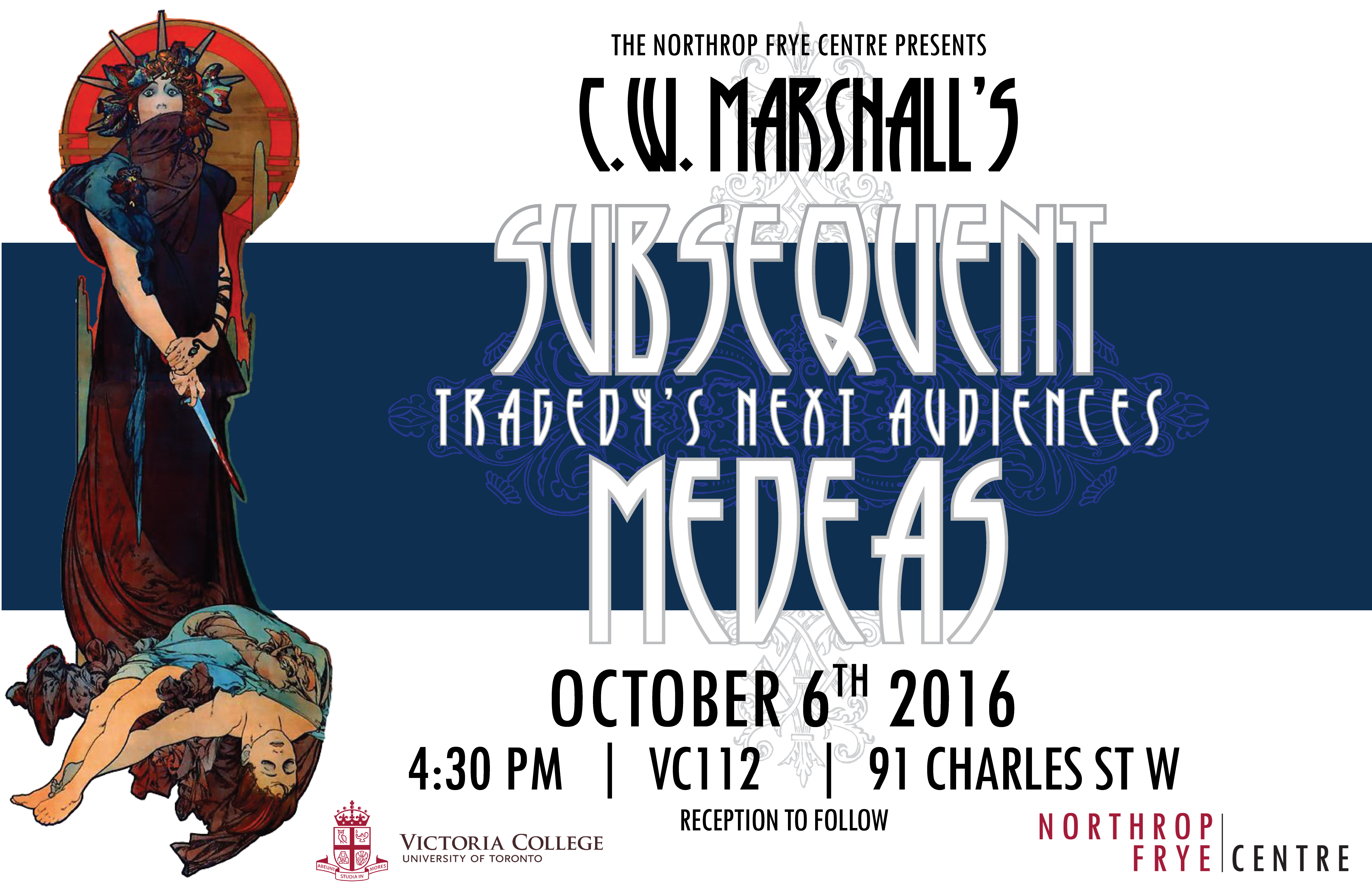
Subsequent Medeas: Tragedy's Next Audiences
Oct. 6, 2019
The Third Annual Northrop Frye Centre Lecture
Speaker: C.W. Marshall (University of British Columbia)
For the third annual Northrop Frye Centre Lecture, we invited C. W. Marshall to present on the re-performance of fifth-century tragedy in the 4th century BCE, paying particular attention to the example of Euripides’ Medea. It develops an understanding of ancient theatre that foregrounds the performative experience and external factors rather than the words of the surviving script.
About the speaker
C.W. Marshall is Professor of Greek at the University of British Columbia. He is the author of The Stagecraft and Performance of Roman Comedy (CUP 2006), The Structure and Performance of Euripides' Helen (CUP 2014), and has co-edited books on ancient comedy, modern comics, and American television.
Nov. 21, 2016 | Another Pre-Modern North | Helen Solterer
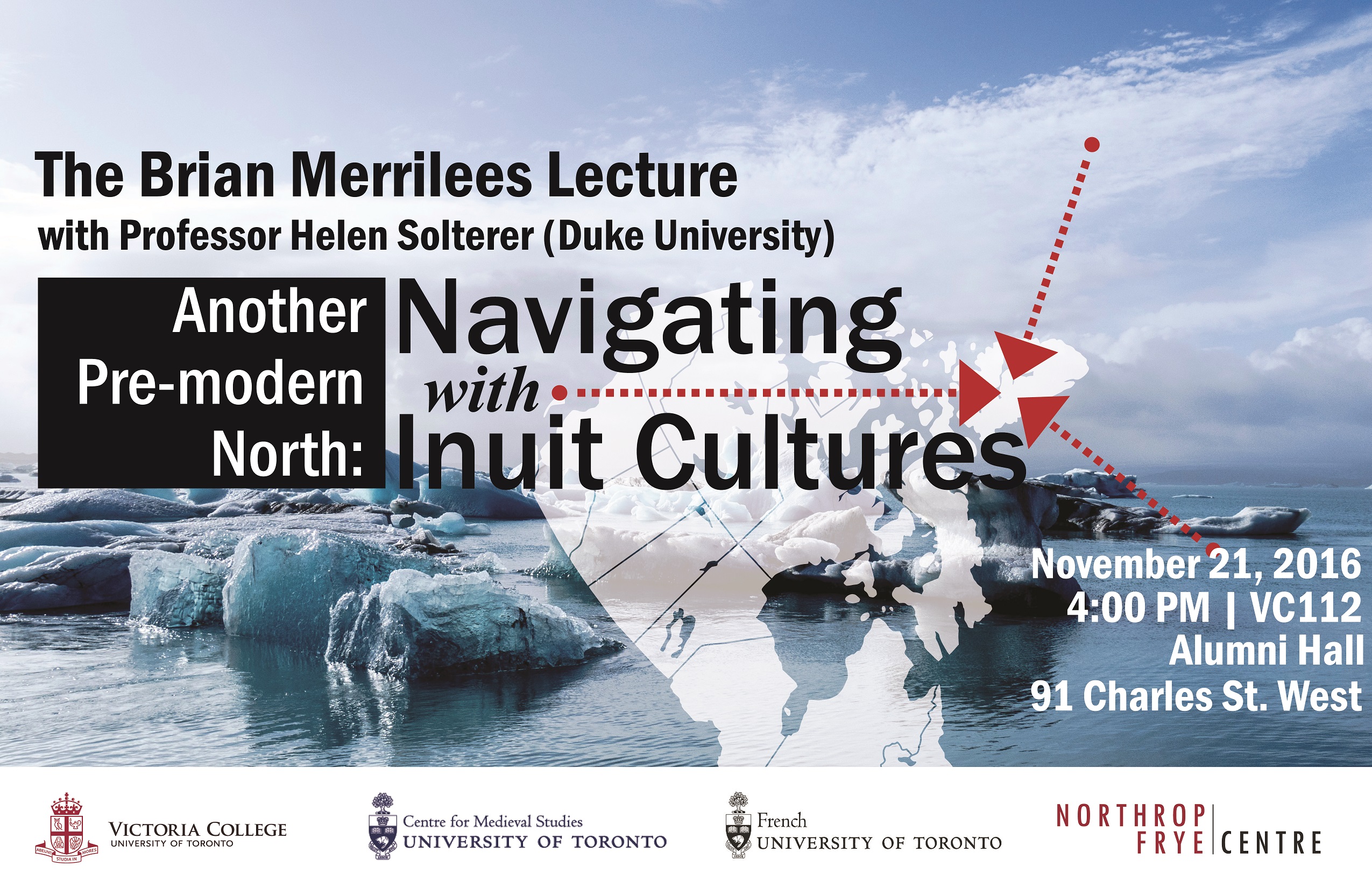
Another Pre-Modern North: Navigating with Inuit Cultures
Nov. 21, 2016
The Second Brian Merrilees Lecture
Speaker: Helen Solterer (Duke University)
The Anglo-Norman Voyage of Brendan, a fantastical travel narrative edited by Brian Merrilees, offers a timely challenge to go farther and widen perspectives on the pre-modern North. What happens when we depart not from Brendan’s European coordinates, but from Arctic ones? In this paper, Prof. Solterer explores the North from the horizon of indigenous Inuit peoples, tracking what makes their cultures distinctive, pre-modern ones. Incorporating elements of material culture and styles of graphic narration, Solterer tests the case of Inuit aesthetics and our conceptions of pre-modern literary and visual arts.
About the speaker
Helen Solterer is Professor in Romance Studies, Duke University, working on pre-modern literature and culture, and its interplay with contemporary thought. She is the author of Medieval Roles for Modern Times: Theatre and the Battle for the French Republic (Penn State Press: 2010) and The Master and Minerva: Disputing Women in French Medieval Culture (Berkeley: 1995). Her current book, Timely Fictions (forthcoming), a set of pictorial essays, investigates the multiple ‘lives’ of pre-modern poetry, drama, narrative. As Director of The Centre for French and Francophone Studies at Duke University, she curates the Francophone Digital Humanities project, Making Medieval Poetry, working with collaborators in France, Tunisia, and North America.
Feb. 16, 2017 | Thoughts Take Shape | Amy Fox
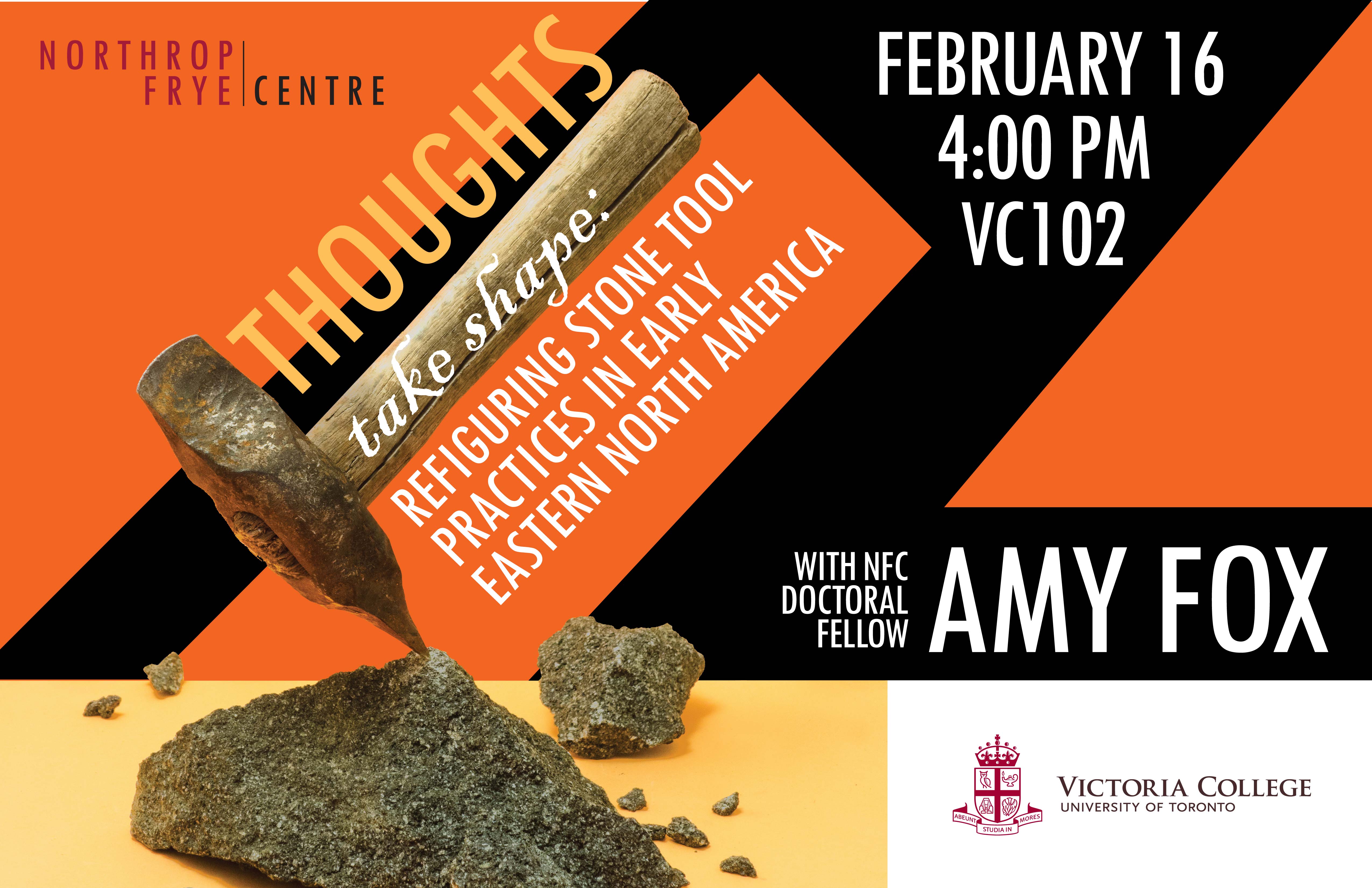
Thoughts Take Shape: Refiguring Stone Tool Practices in Early Eastern North America
Feb. 16, 2017
NFC Doctoral Fellow Lecture Series
Speaker: Amy Fox (Anthropology)
From expensive crafting workshops to viral “lifehacking” videos online, people create, employ, and share information about tools and tool use in patterns that are structured by cultural preconceptions about the objects and the intended audience. Amy Fox's archaeological research focuses on stone “broad-tool” during the Late Archaic Period in Eastern North America (4000-3000BCE). She examines the technological information used to experience and exploit tools, their uses, and how these objects express cultural ideas.
This seminar argues that restructuring the descriptive techniques currently used to classify and understand stone tool collections will reform the role that projectile broad-tools play as cultural explanatory objects. Exploring novel methods of shape analysis using large data-sets that take advantage of growing computer processing abilities deftly and productively manages this issue. From this modified foundation, Amy investigates patterned expressions of technological information sharing in pre-contact North America.
Feb. 27, 2017 | Noise and the Medical Body | Julia Rombough
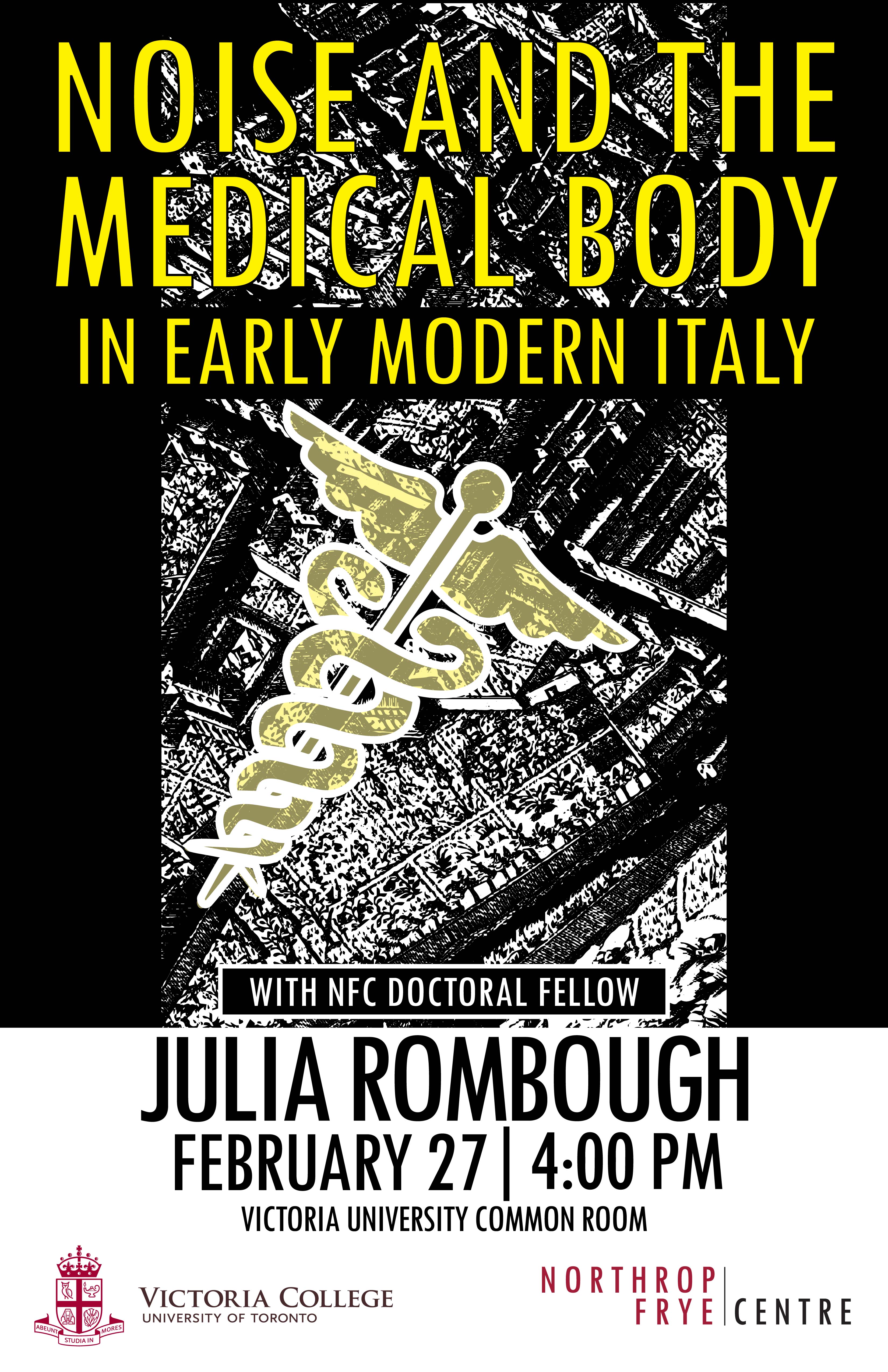
Noise and the Medical Body in Early Modern Italy
Feb. 27, 2017
NFC Doctoral Fellow Lecture Series
Speaker: Julia Rombough
Mar. 21, 2017 | Reliable Humans, Trustworthy Machines | Edward Jones-Imhotep
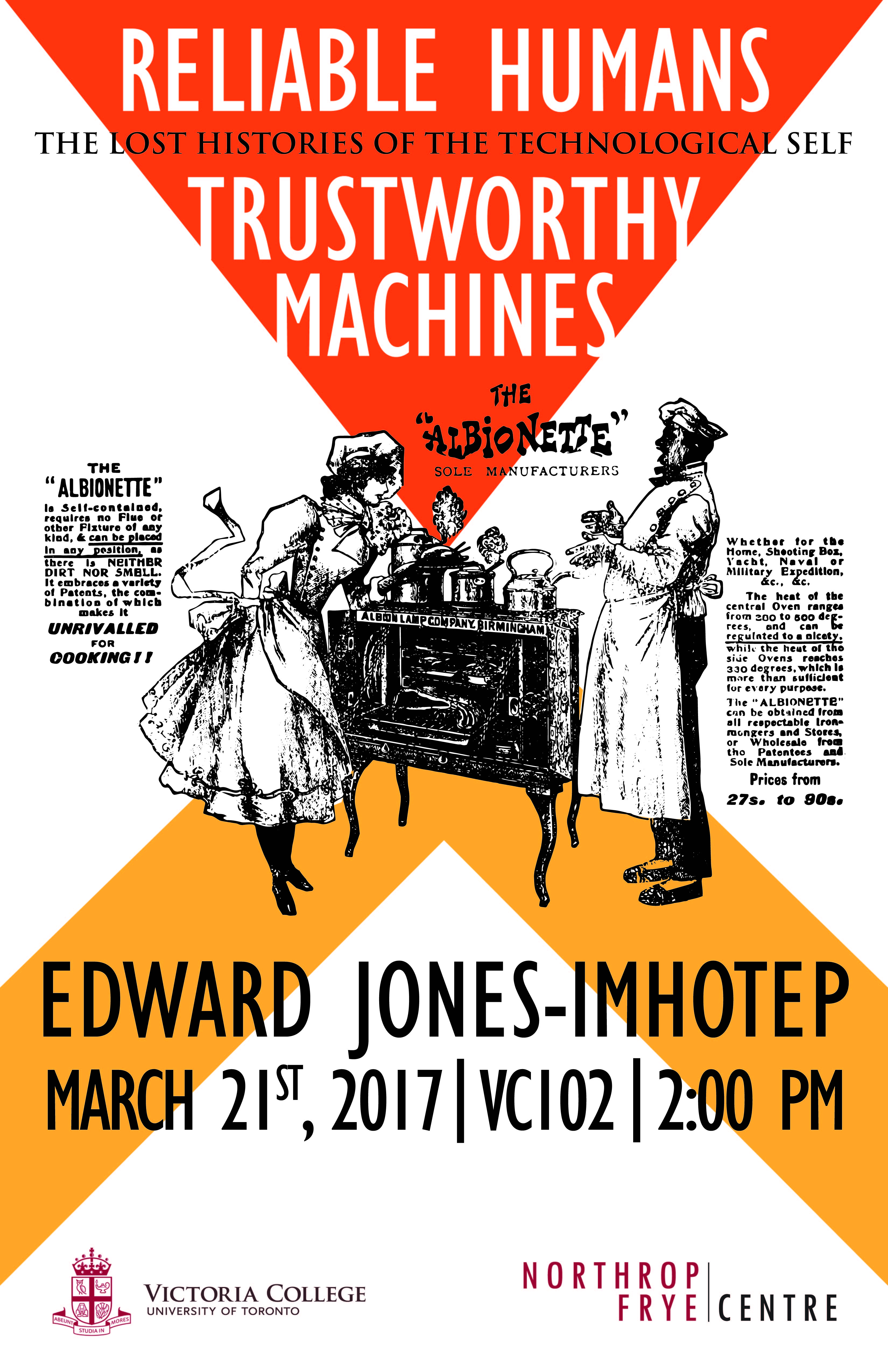
Reliable Humans, Trustworthy Machines: The Lost Histories of the Technological Self
Mar. 21, 2017
Speaker: Edward Jones-Imhotep
Mar. 24, 2017 | Making Up Neurological People | Johanna Pokorny
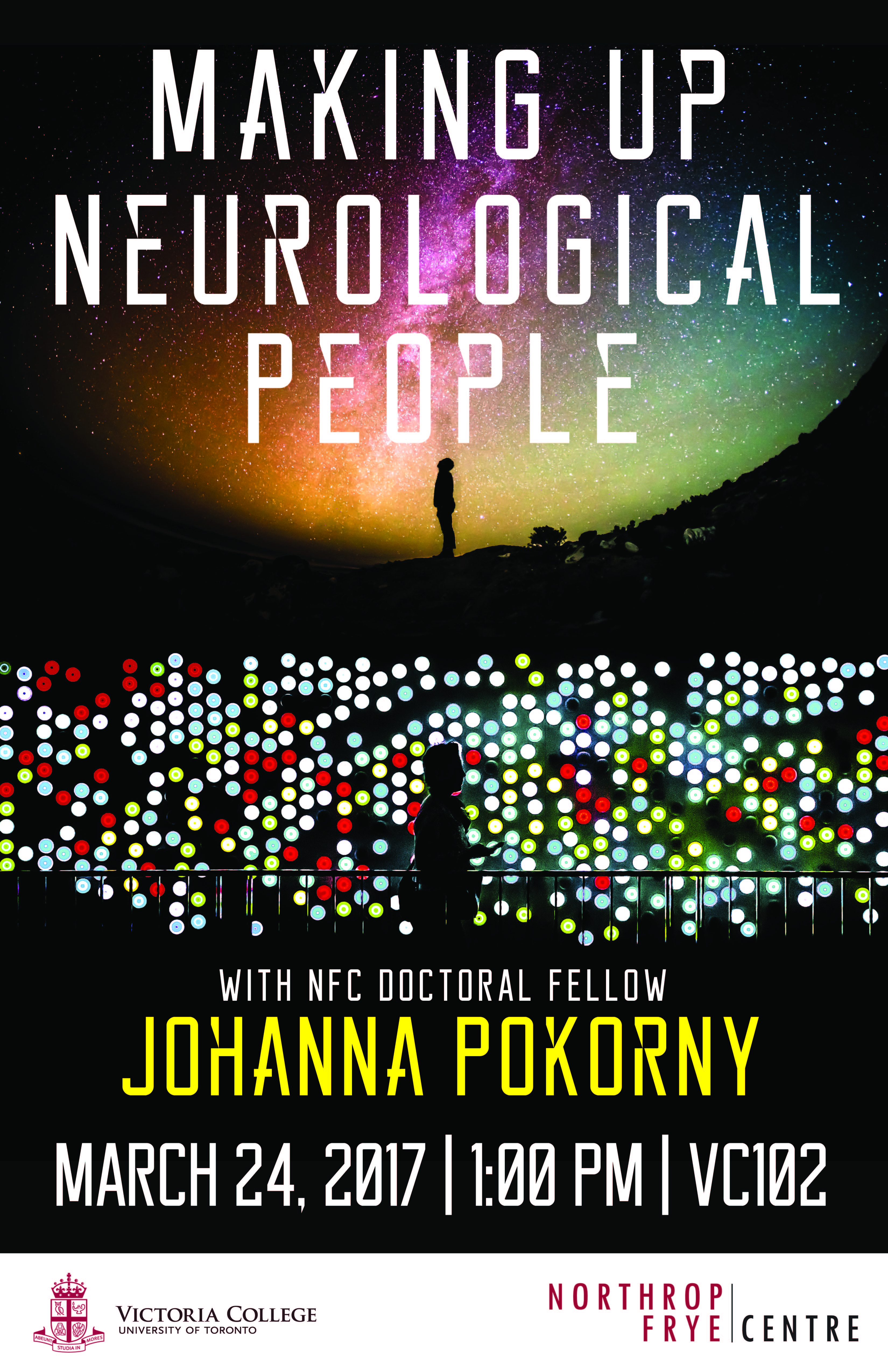
Making Up Neurological People
Mar. 24, 2017
NFC Doctoral Fellow Lecture Series
Speaker: Johanna Pokorny
Apr. 3, 2017 | No Joke | Erica Petkov
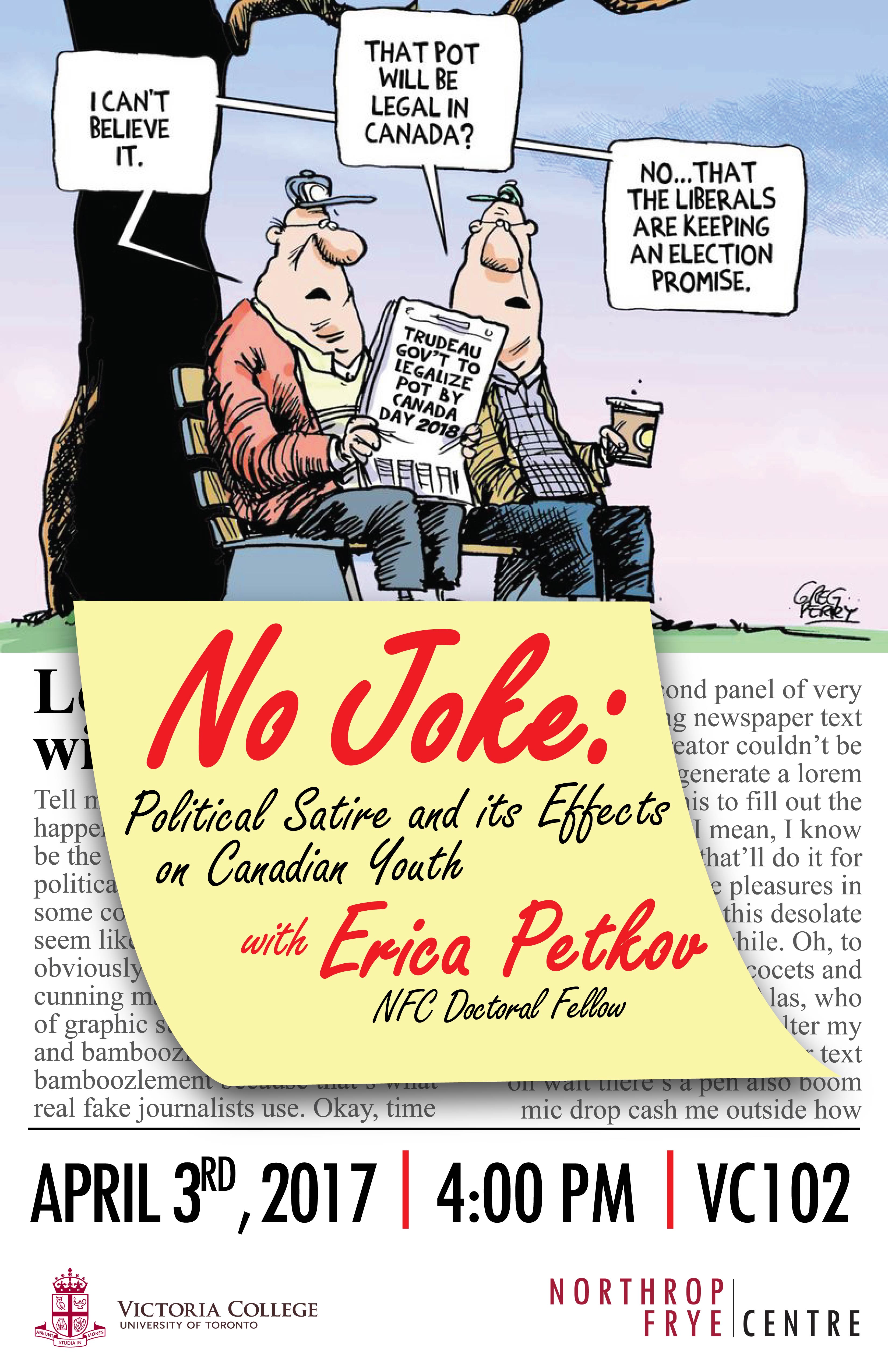
No Joke: Political Satire and its Effects on Canadian Youth
Apr. 3, 2017
NFC Doctoral Fellow Lecture Series
Speaker: Erica Petkov
How does satire affect civic attitudes and youth political participation? Does exposure to satire make people more cynical and less likely to be politically engaged, as the conventional wisdom suggests, or does it have the opposite effect, making people more aware of certain issues and leading to greater levels of political engagement? Are cynicism and participation mutually exclusive, or does satire foster a productive cynicism that leads to greater political engagement? In what many describe as a 'post-factual' and 'post-truth' world, is satire playing a key role in speaking truth to power, or is it contributing to greater polarization and dysfunction? This talk will explore these questions and more, and will feature original survey and focus group data from the Canadian context.
2015-16 Events
Oct. 1, 2015 | An Anatomy of Allegory | Marc Caplan
An Anatomy of Allegory
Oct. 1, 2015
The Annual Northrop Frye Centre Lecture
Speaker: Marc Caplan (University of Michigan)
Thursday, October 1st marked a special occasion for the Northrop Frye Centre. The second annual Northrop Frye Centre Lecture was presented by Prof. Marc Caplan, research fellow at the Frankel Institute for Advanced Judaic Studies at the University of Michigan. His book How Strange the Change: Language, Temporality, and Narrative Form in Peripheral Modernisms, a comparison of 19th century Yiddish literature with the post-colonial African novel, was published in 2011 by Stanford University Press. Caplan delivered a stimulating talk to a full Alumni Hall on Arnold Schoenberg’s abandoned opera fragment Moses und Aron, a reimagined biblical account of the Exodus from Egypt, the revelation at Mount Sinai, and the construction of the Golden Calf as both an avant-garde parable and a Baroque Tragic Drama. That very evening, the new home of the Northrop Frye Centre on the main floor of Old Victoria College Building opened its doors to much enthusiasm.
Oct. 28, 2015 | Northrop Frye and the Art of Reading | Thomas Willard
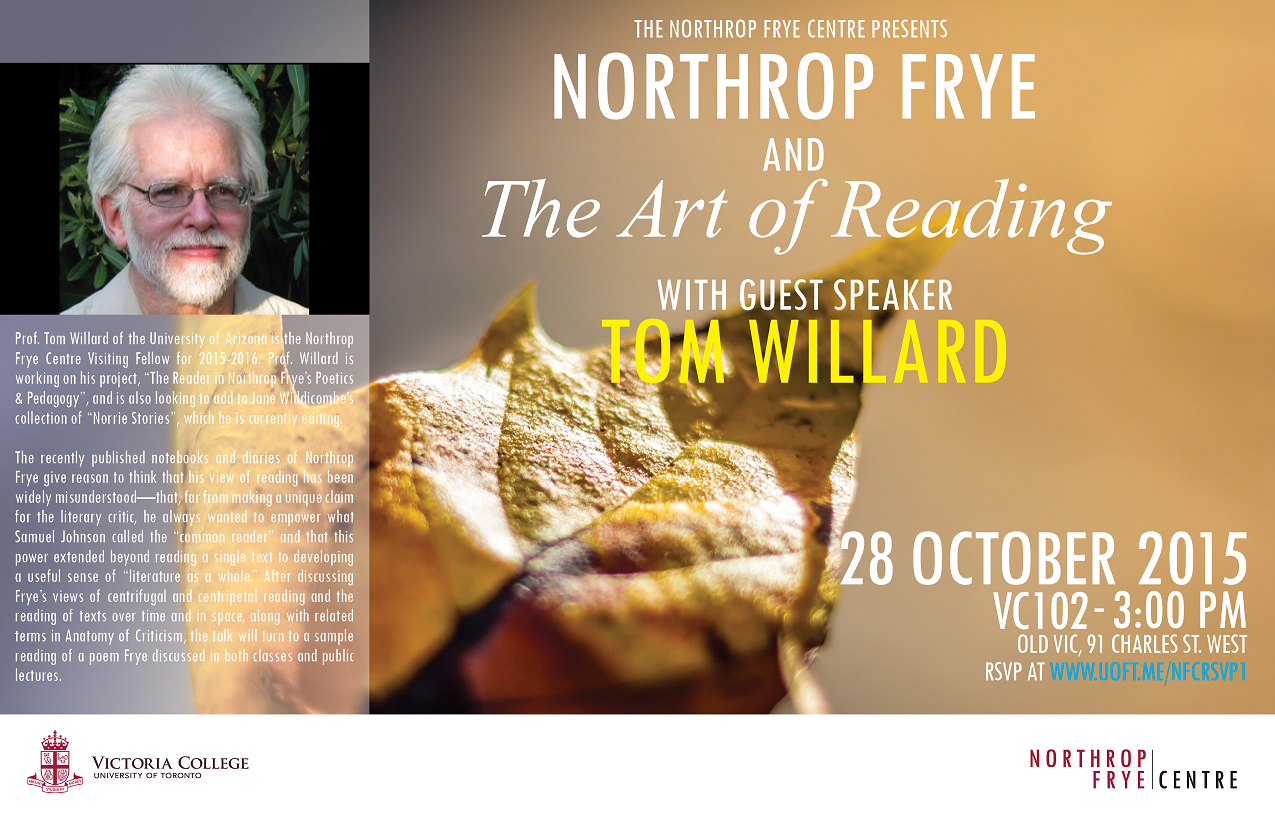
Northrop Frye and the Art of Reading
Oct. 28, 2015
Visiting Fellow Lecture
Speaker: Thomas Willard (University of Arizona)
On October 28th, the first public seminar was held in the new Northrop Frye Centre. Visiting Northrop Frye Centre Fellow Prof. Thomas Willard made use of recently published notebooks and diaries of Northrop Frye to prompt a rethink of a common misconception of Frye’s view of reading from that making a unique claim on behalf of the literary critic, to one favouring the “common reader”. Willard’s work highlights Frye’s views of centrifugal and centripetal reading and the reading of texts over time and in space, along with related terms in Anatomy of Criticism (Princeton University Press, 1957), closing the seminar with a sample reading of a poem Frye discussed in both his classes and in public lectures.
Nov. 26, 2015 | The Ethical Turn in Literary Criticism | William Calin
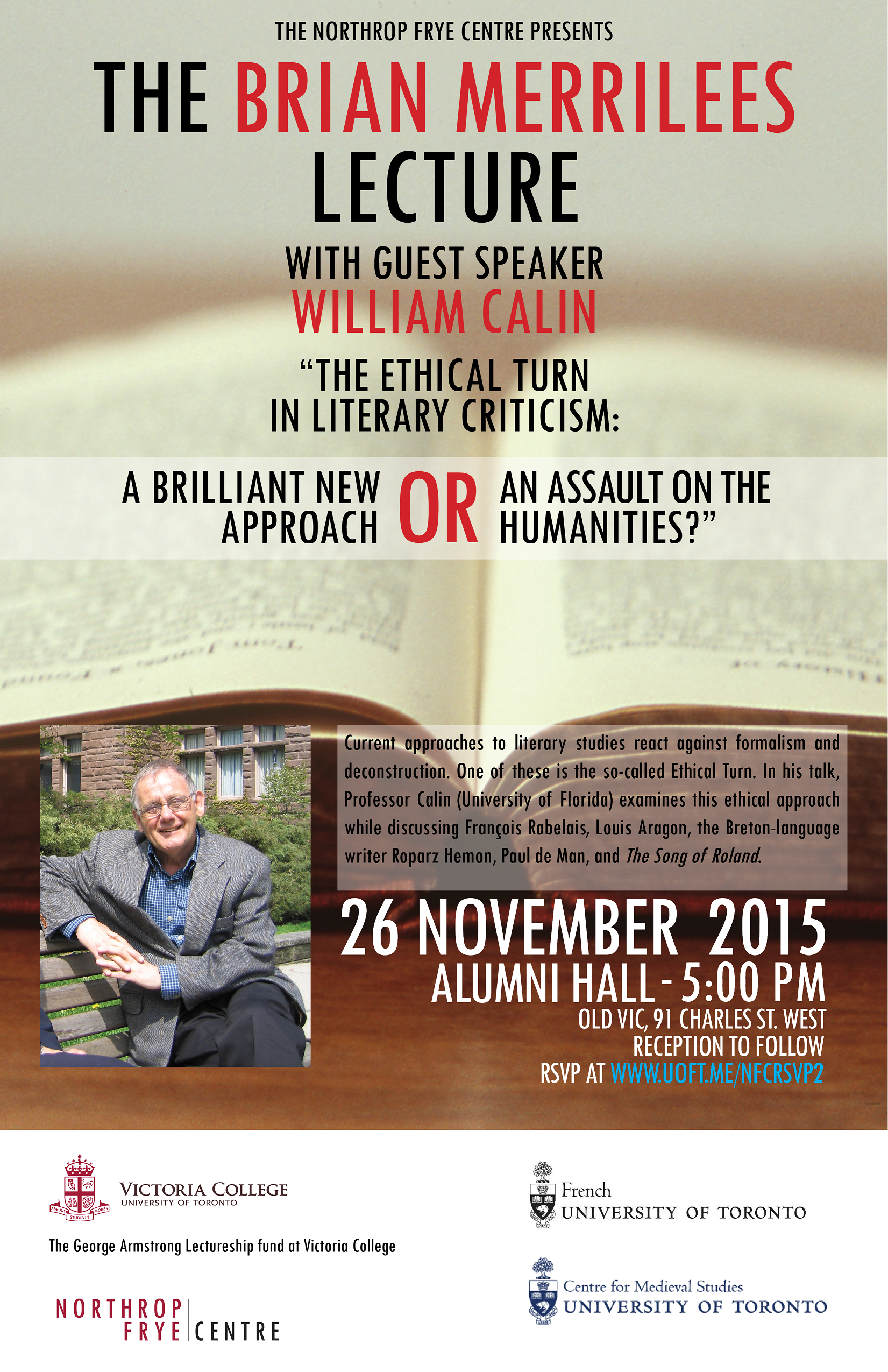
The Ethical Turn in Literary Criticism
Nov. 26, 2015
The Brian Merrilees Lecture
Speaker: William Calin (University of Florida)
On the evening of November 26th, the Northrop Frye Centre – co-sponsored by the Department of French and the Centre for Medieval Studies – hosted a special lecture by Prof. William Calin of the University of Florida in memory of Prof. Brian Merrilees, a much beloved Victoria College Fellow and past director of the Northrop Frye Centre. Prof. Calin, a contemporary and close friend of Brian, gave an insightful and provocative talk on the ethical turn in literary studies that was extremely well received by the capacity crowd in Alumni Hall. Calin examined this ethical approach while discussing François Rabelais, Louis Aragon, the Breton-language writer Roparz Hemon, Paul de Man, and The Song of Roland. The Centre was also honoured to have the Merrilees family in attendance for the occasion. The reception that followed was especially convivial and as stories were told and memories shared, we were reminded once again of our friend and colleague.
Feb. 23, 2016 | Ishinomaki | David Wang
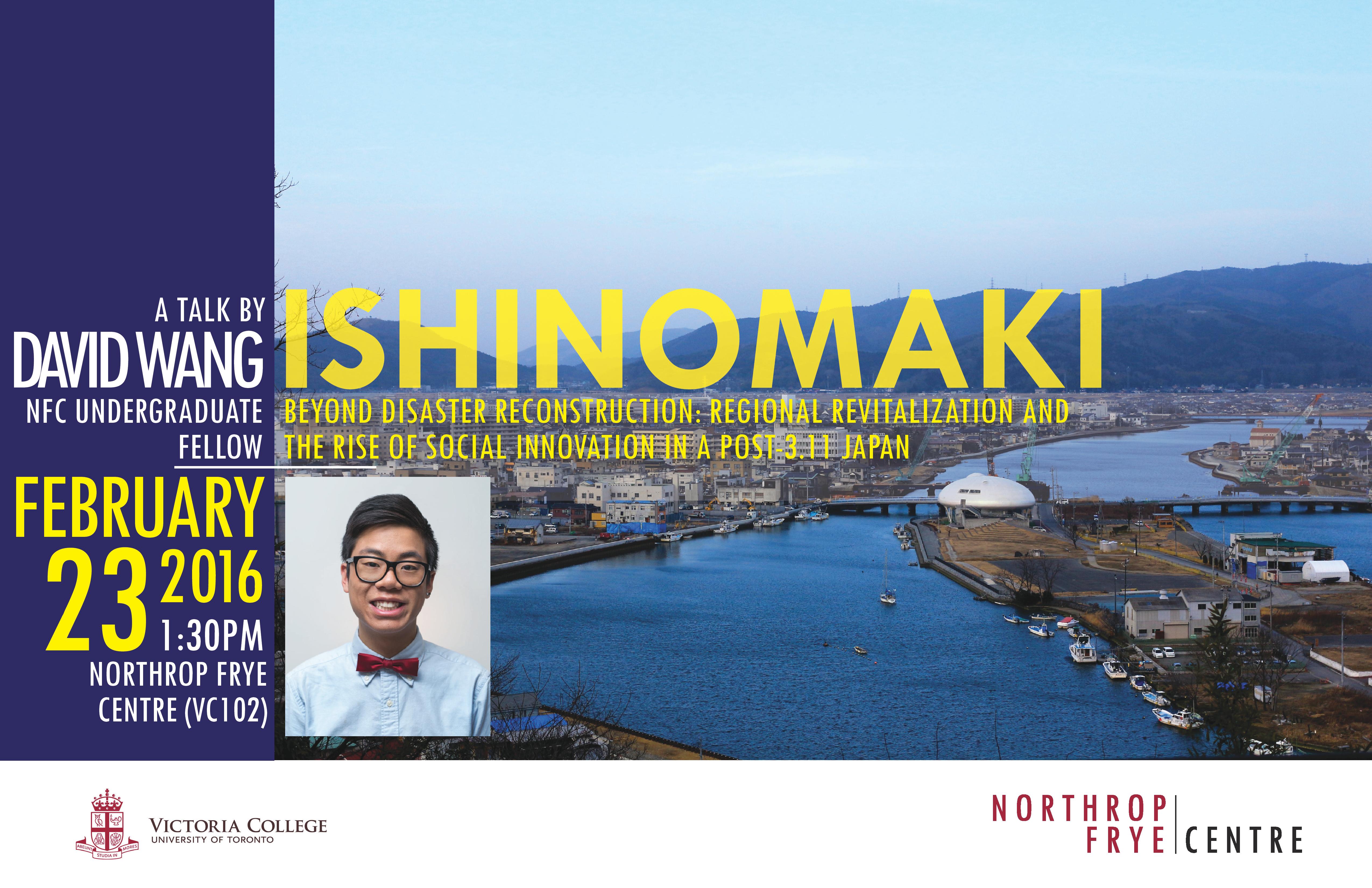
Ishinomaki
Beyond Disaster Reconstruction: Regional Revitalization and the Rise of Social Innovation in a Post 3.11 Japan
Feb. 23, 2016
Undergraduate Fellow Lecture
Speaker: David Wang
In a year of firsts, “Beyond Disaster Reconstruction: Regional Revitalization and the Rise of Social Innovation in a Post 3.11 Japan” –a presentation by NFC Undergraduate Fellow David Wang –was an especially proud moment for the Centre. Focusing on Japan in the aftermath of the 2011 Tohoku earthquake and tsunami, Wang was the first of the inaugural NFC Undergraduate Fellows to publicly present his research findings. Examining regional revitalization initiatives in post-3.11 Japan, Wang challenged participants to consider if a possible model could be gleaned from Ishinomaki that could be replicated beyond Japan and across the world. The Centre would like to extend its appreciation to David’s supervisor, Prof. Joseph Wong.
Mar. 7, 2016 | Drop Dead Gorgeous | Allison Matthews David
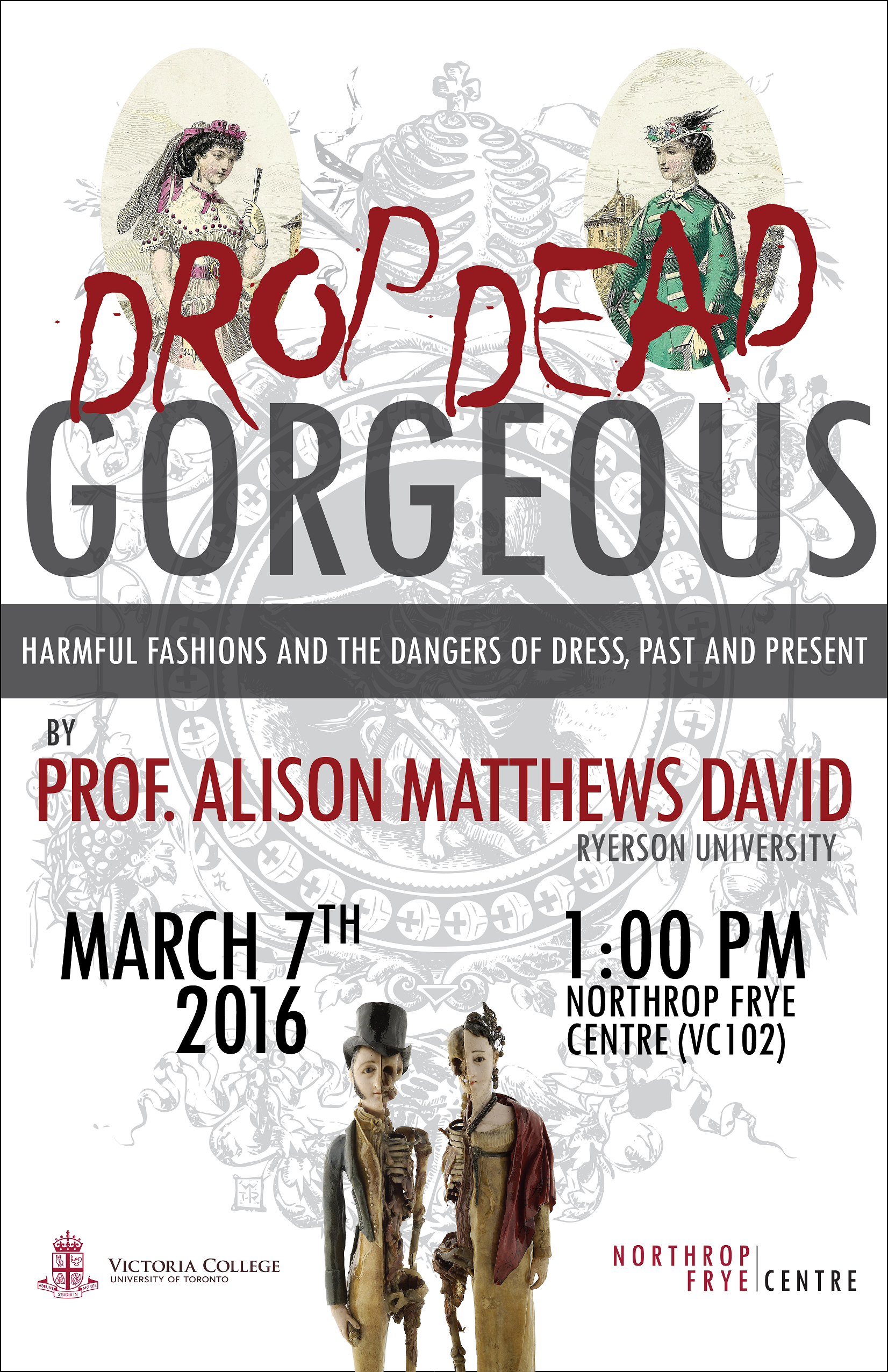
Drop Dead Gorgeous: Harmful Fashions and the Dangers of Dress, Past and Present
Mar. 7, 2016
Public Guest Seminar
Speaker: Allison Matthews David (Ryerson University)
From insidious murder weapons to blaze-igniting crinolines, clothing has been the cause of death, disease and madness throughout history, by accident and design. Clothing is intended to protect, shield and comfort us, but as Prof. Matthews David’s illustrated at her visit to the Northrop Frye Centre on March 7th, lurking underneath the seemingly innocuous garments can be mercury laced hats, frocks laden with arsenic and literally 'drop-dead gorgeous' gowns. Matthews David's stimulating, and at times alarming findings, pulls from her most recent publication, Fashion Victims: The Dangers of Dress Past and Present (Bloomsbury, 2015), a project funded through the Standard Grant from the Social Sciences and Humanities Council of Canada (SSHRC).
Mar. 21, 2016 | Popular Culture and Public Memory in an Imaginal Era | Derek Foster
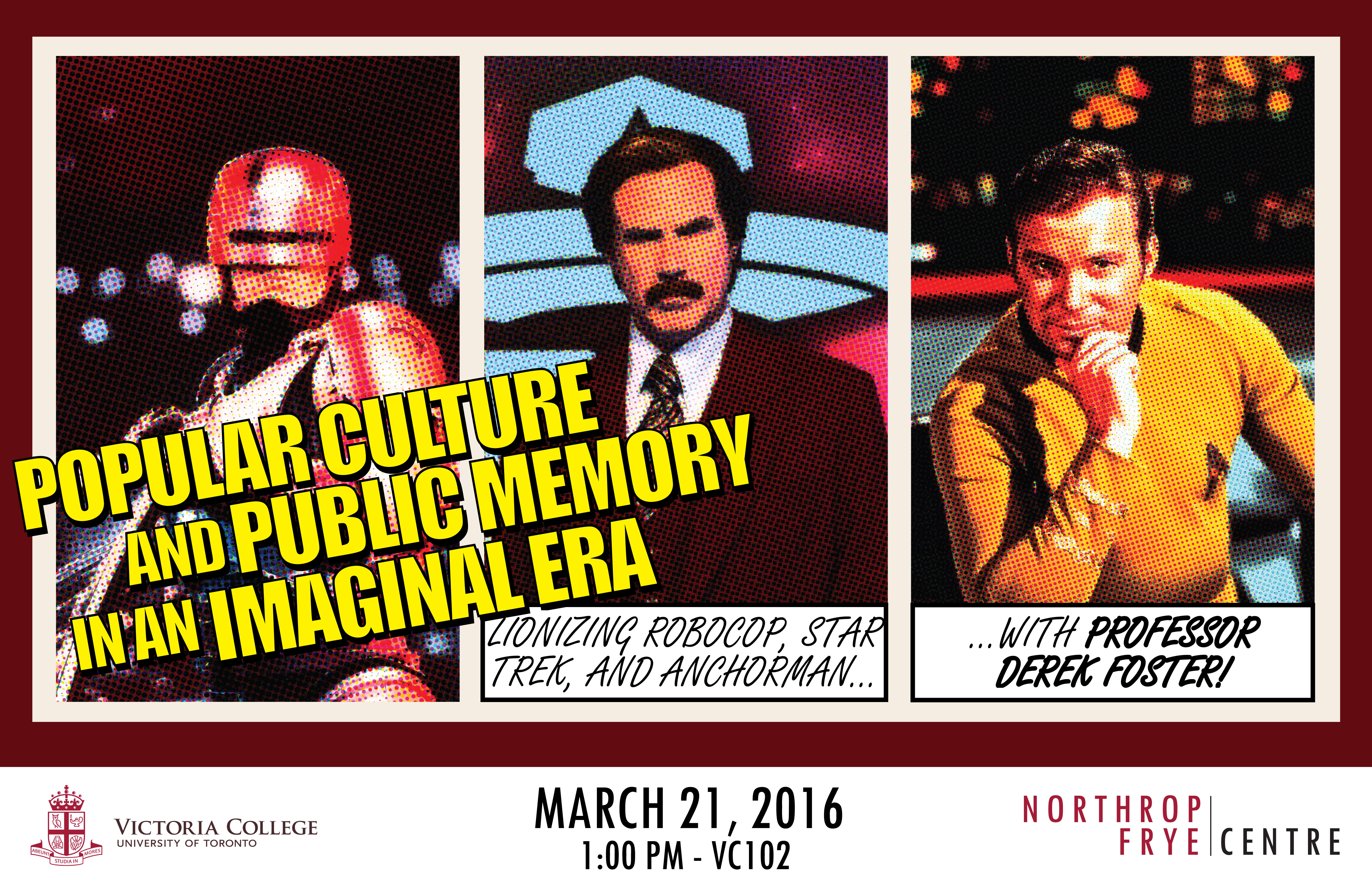
Popular Culture and Public Memory in an Imaginal Era: Lionizing Robocop, Star Trek, and Anchorman
Mar. 21, 2016
Public Guest Seminar
Speaker: Derek Foster (Brock University)
Following Kenneth Burke’s proposition that fictional narratives are “equipment for living,” what happens when these same narratives become equipment for remembering? Public memory involves the fashioning of communal understandings of the past in order to serve the needs of the present. Meanwhile, popular culture narratives are typically seen as disposable tools of distraction, entertaining but not edifying texts. However, in a world beset by “memorial mania,” we see statues erected to dystopian crime fighters, towns themed after science fiction narratives, and museum exhibits dedicated to fictional newscasters, to name just a few examples of popular culture commemoration.
About the speaker
Prof. Derek Foster of Brock University and President of the Popular Culture Association of Canada offers an explanation for why these trends have emerged and what they might represent through the visual and material rhetoric of commemoration.
Mar. 24, 2016 | Art for Art’s Sake or Art for Life’s Sake? | Katie Fry
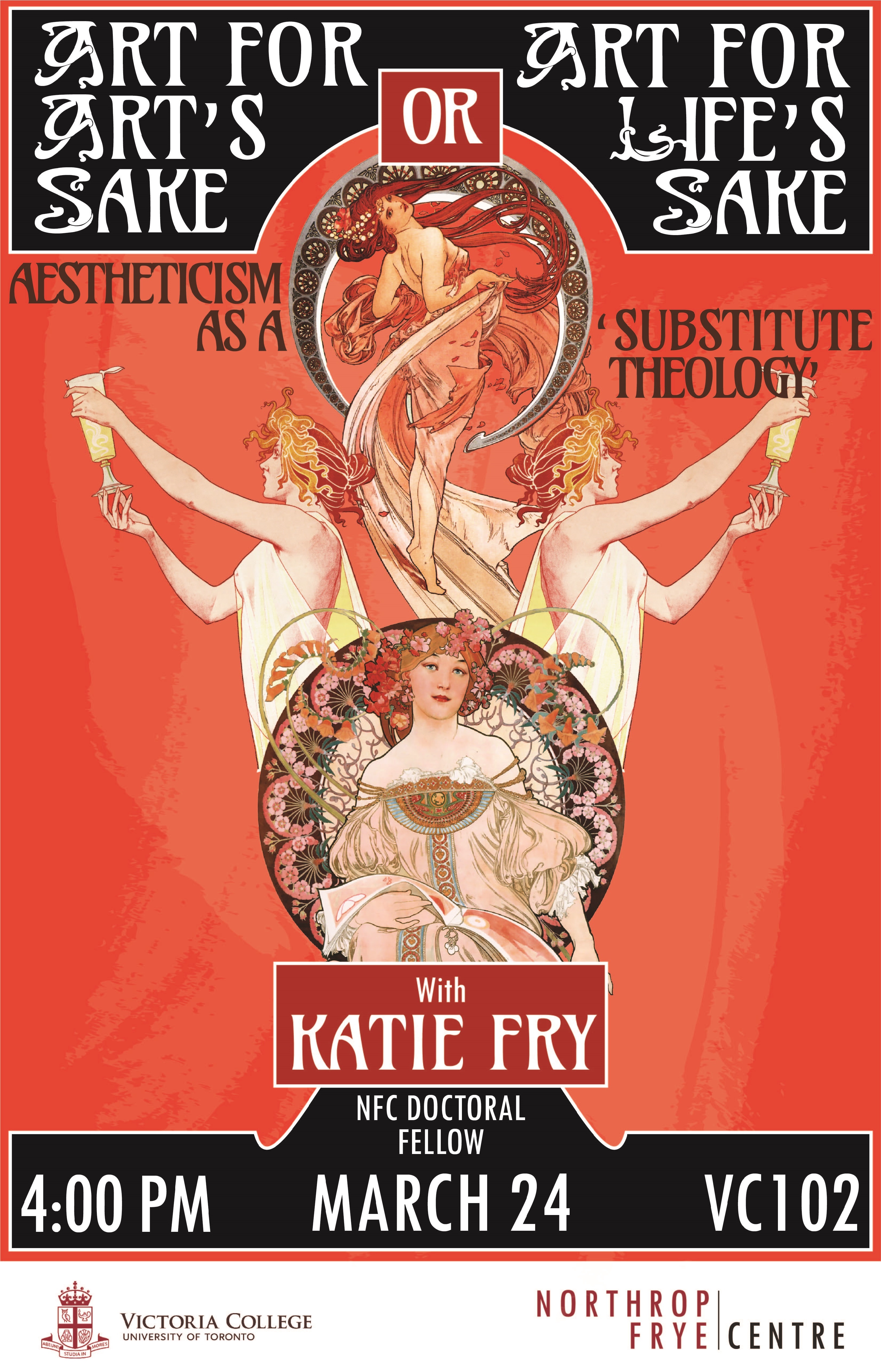
Art for Art’s Sake or Art for Life’s Sake? Aestheticism as a Substitute Theology
Mar. 24, 2016
NFC Doctoral Fellow Lecture Series
Speaker: Katie Fry (Comp. Lit.)
The first of NFC’s Doctoral Fellows to present their current research, Katie Fry examined the doctrine of “art for art’s sake” and its claims that art is valuable in its own right without a need to fulfill any external purpose or function. Fry’s talk examined both endorsements and critiques of l’art pour l’art in an effort to elucidate how this aesthetic principle became a way of life and even a surrogate religion for its most ardent practitioners.
Mar. 28, 2016 | Earle Toppings Archival Project
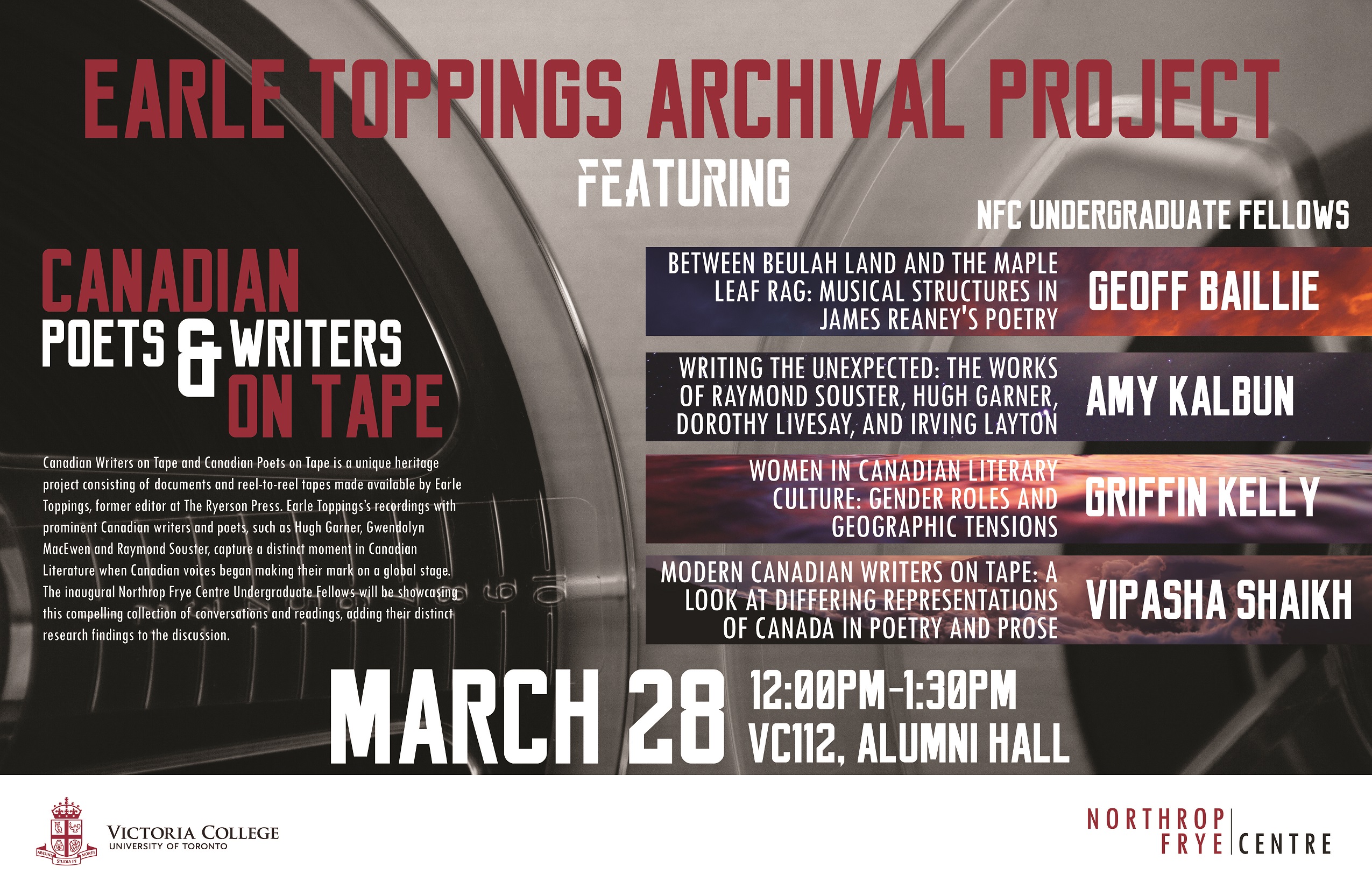
Earle Toppings Archival Project
Mar. 28, 2016
Public Presentation by NFC Undergraduate Fellows
Canadian Writers on Tape and Canadian Poets on Tape is a unique heritage project consisting of documents and reel-to-reel tapes made available by Earle Toppings, former editor at The Ryerson Press. NFC Undergraduate Fellows Geoff Baillie, Amy Kalbun, Griffin Kelly, and Vipasha Shaikh showcased this compelling collection of conversations with prominent Canadian writers and poets, capturing a distinct moment in Canadian Literature when Canadian voices began making their mark on a global stage while adding their own distinct takes and research findings to the discussion. The Centre would like to acknowledge the hard work of supervisor Prof. Anne Urbancic for leading the project, and to Mr. Toppings for his generosity.
Mar. 29, 2016 | Between Facts and Myths | Emma Planinc
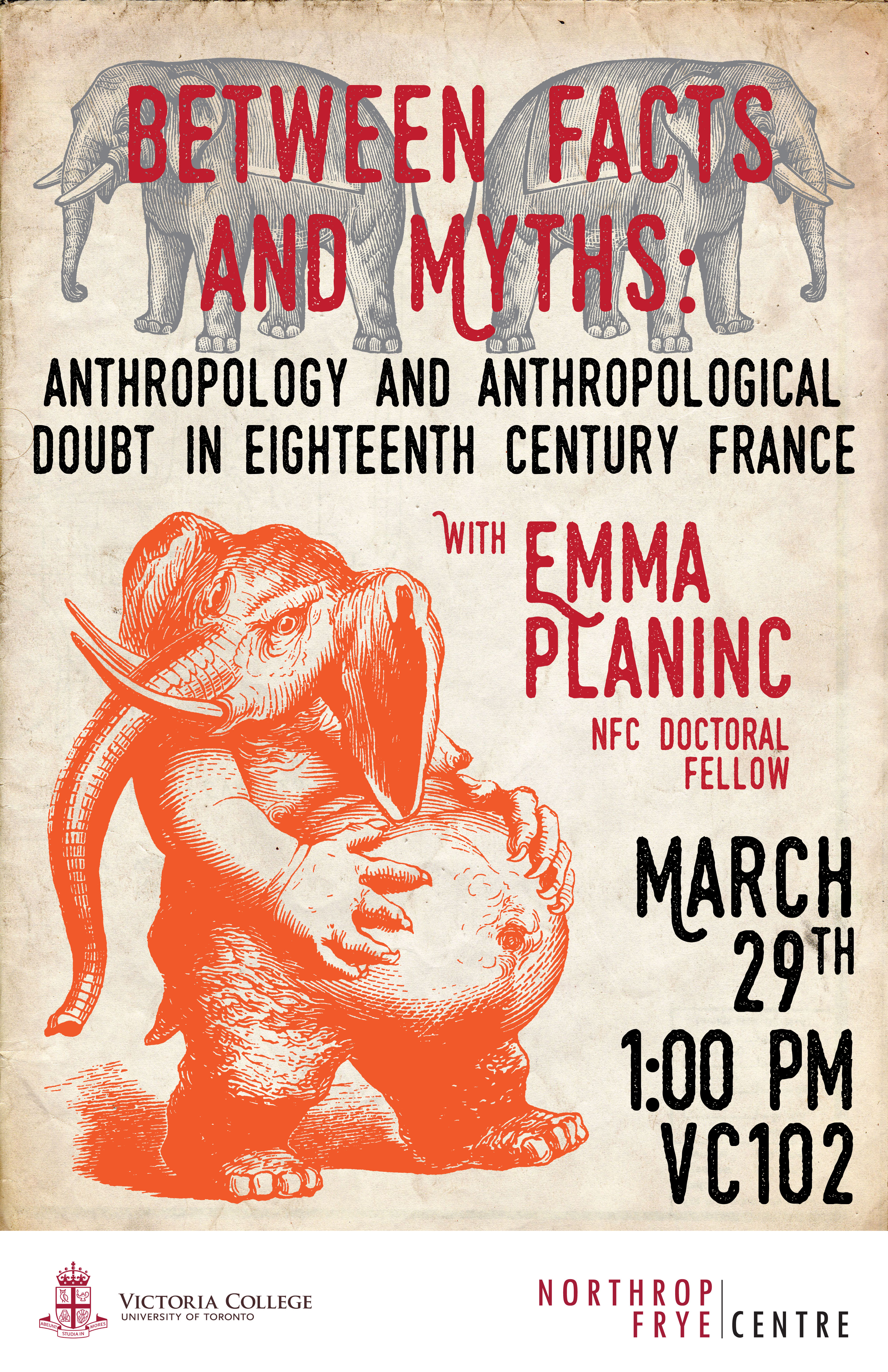
Between Facts and Myths: Anthropology and Anthropological Doubt in Eighteenth Century France
Mar. 29, 2016
NFC Doctoral Fellow Lecture Series
Speaker: Emma Planinc
Accounts of newly discovered animal species and human populations abounded in the 17th and 18th centuries, the results of explorations of uncharted waters and the New World. Because many philosophes in 18th century France did not have direct involvement with these discoveries, in their attempts to parse out the distinction between ape and man (and between “civilized” and “uncivilized” man) they primarily relied on descriptions found in travel literatures. In this talk, NFC Fellow Emma Planinc investigated the philosophes’ accounts of the distinctive nature of the human being, and accounts that question the distinction of humanity in relation to the animal kingdom. While revolutionary theories about the nature of man undeniably arose from this new empirical evidence, ultimately the philosophies of human nature generated from these facts and discoveries were constructed as myths about what ought to be seen as true.
Apr. 5, 2016 | The Taking, Killing, and Destroying of Deer | Alexandra Logue
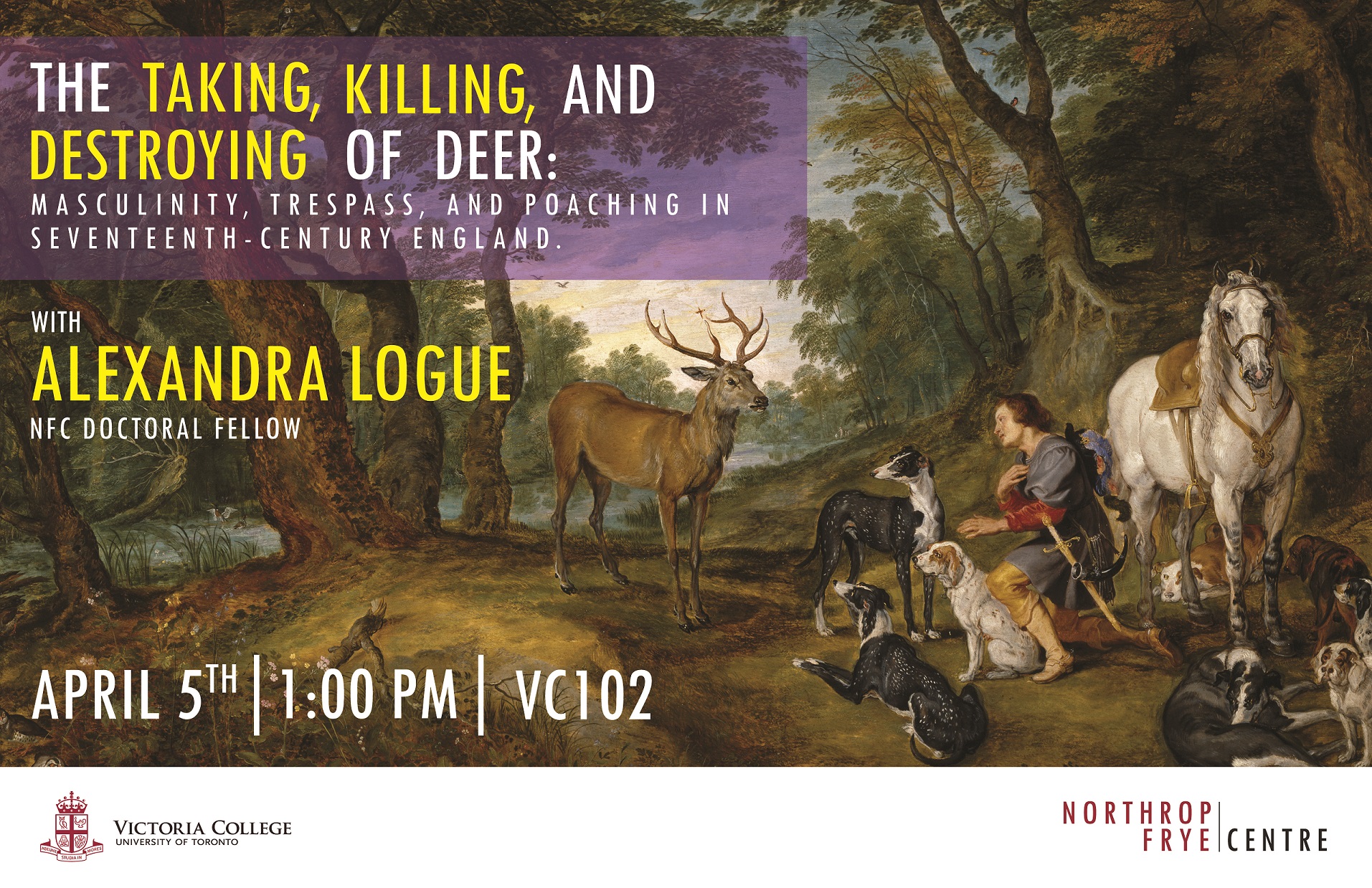
The Taking, Killing, and Destroying of Deer: Masculinity, Trespass, and Poaching in Seventeeth-Century England
Apr. 5, 2016
NFC Doctoral Fellow Lecture Series
Speaker: Alexandra Logue
On April 5th Alexandra Logue capped off a series of strong NFC Doctoral Fellow talks with her study of early modern English deer hunting, a “princely and royal chase”. English courts at the time were full of cases against gangs of men who poached deer and other animals from the King’s forests. Poachers challenged the potent symbols of masculinity and honour that were integral to the ritualized violence of the hunt. This talk examined the relationship between masculinity, power, and control over property in the rural landscapes of seventeenth-century England, demonstrating how in cases of unlawful hunting, violence against animals symbolized violence against the King.
Apr. 7-9, 2016 | On Nearness, Order and Things
On Nearness, Order and Things: Collecting and Material Culture from 1400 to Today
Apr. 7-9, 2016
A Joint Conference by NFC and CRRS
In convolute H of The Arcades Project, Walter Benjamin calls collecting a form of practical memory and "the most binding manifestation of nearness." As the influence of thing theory and object-oriented ontology on the humanities grows and the interdisciplinary reach of material culture expands, how we experience our proximity to the objects, agents and actants that make up our environment becomes more and more compelling. This conference sought to address questions surrounding collecting and its many nuances as they relate to the themes of proximity, ordering and "thingness" from theoretical, artistic and practical perspectives.
The two days of conference panels with over 97 registered participants cast a wide temporal net with papers reflecting on both contemporary and early modern themes from a variety of disciplinary perspectives such as anthropology, art, history, economics, gender studies, museology and sociology. Invited artist, Carlota Caulfield (Mills College), an expert on avant-garde and experimental art, gave a reading from her lyrical work on collecting and lead an open discussion on the affective nature of the practice. Her presence was hailed as a refreshing addition by conference participants, providing the event with greater breadth in the ways in which we may consider themes of "presence" and "order" within a more broadly-defined framework of material culture. Keynote lectures by Benjamin Schmidt (University of Washington) and Susan Buck-Morss (CUNY Graduate Center, Cornell University) headlined the conference and brought innovative, multicultural, and interdisciplinary elements to the programme. A leading researcher in the fields of material culture studies and early modern European history, Benjamin Schmidt’s keynote “Alchemy at Meissen: On the Collecting of China and the Transmutation of the World” explored early modern Europe’s collecting of porcelain, and more broadly, European engagements with the material culture of Asia. This provocative talk explored how material culture and the mastery of materiality shaped broader cultural geographies, demonstrating the importance of objects. Susan Buck-Morss, an expert on Walter Benjamin, the Frankfurt School, and the politics of culture, delivered a memorable keynote; “Year One: Re-membering History”. In her thought-provoking presentation, Buck-Morss examined first-century scholarship, disassembling conventional vertical histories of ownership that have colonized time and legitimized modern divisions between nations, religions and civilizations, to make visible a changed structure of history, the philosophical implications of which offers an alternative route away from the cul-de-sac of the post-periods. Additionally, Buck-Morss gave a graduate master class on the morning of April 8th at the Jackman Humanities Institute, “From Coin Collecting to Archaeological Sites: To Whom Does the Past Belong?” which proved to be a highly valuable experience for students and JHI Fellows in attendance.
A major highlight of the conference was the Material Culture Program Poster Session held on Friday, April 8th. Undergraduate students enrolled in VIC444H1S –Themes in Material Culture were invited to share their poster research projects and present them to all conference attendees, thus allowing them to interact closely with established scholars and build their own professional networks in an inclusive and interdisciplinary setting. The posters were very well received and applauded for their research excellence and ingenuity, with several conference panelists referencing specific posters during their own presentations.
Knowledge mobilization was a key principle and major outcome of this conference. The diversity between the panels and keynote presentations together with the even mix of established, international academics, emerging scholars, and professionals resulted in thought-provoking discussions. Jane Corkin, director and curator of the Corkin Gallery, only added to this exchange representing the “business” of collecting and adding an important industry-informed facet to the conference. Conference organizers were especially grateful to the Corkin Gallery for hosting the welcome reception on Thursday, April 7th, encouraging the exchange of knowledge from academic sectors to professional and community-based partners. This collaboration between the Northrop Frye Centre and the Centre for Reformation and Renaissance Studies proved to be a fruitful way of strengthening the growing relationship between Victoria College’s two research centres. The collaboration proved to be an ideal way to combine both early modern scholarship with non-period-specific theoretical literature on collecting, taking advantage of these two branches of scholarship and understanding. Both Centres would like to thank the generosity of the Jackman Humanities Institute, Queen’s University, and Victoria University for their sponsorship of this initiative. We would also like to thank the following institutions at the University of Toronto:
Centre for Comparative Literature
Centre for Medieval Studies
Centre for the Study of France and the Francophone World
Department of English
Department of Germanic Languages and Literatures
Department of History
Department of the History of Art
Department of Spanish and Portuguese
Faculty of Arts & Science
2014-15 Events
Sep. 19, 2014 | Fatalities | Ara H. Merjian
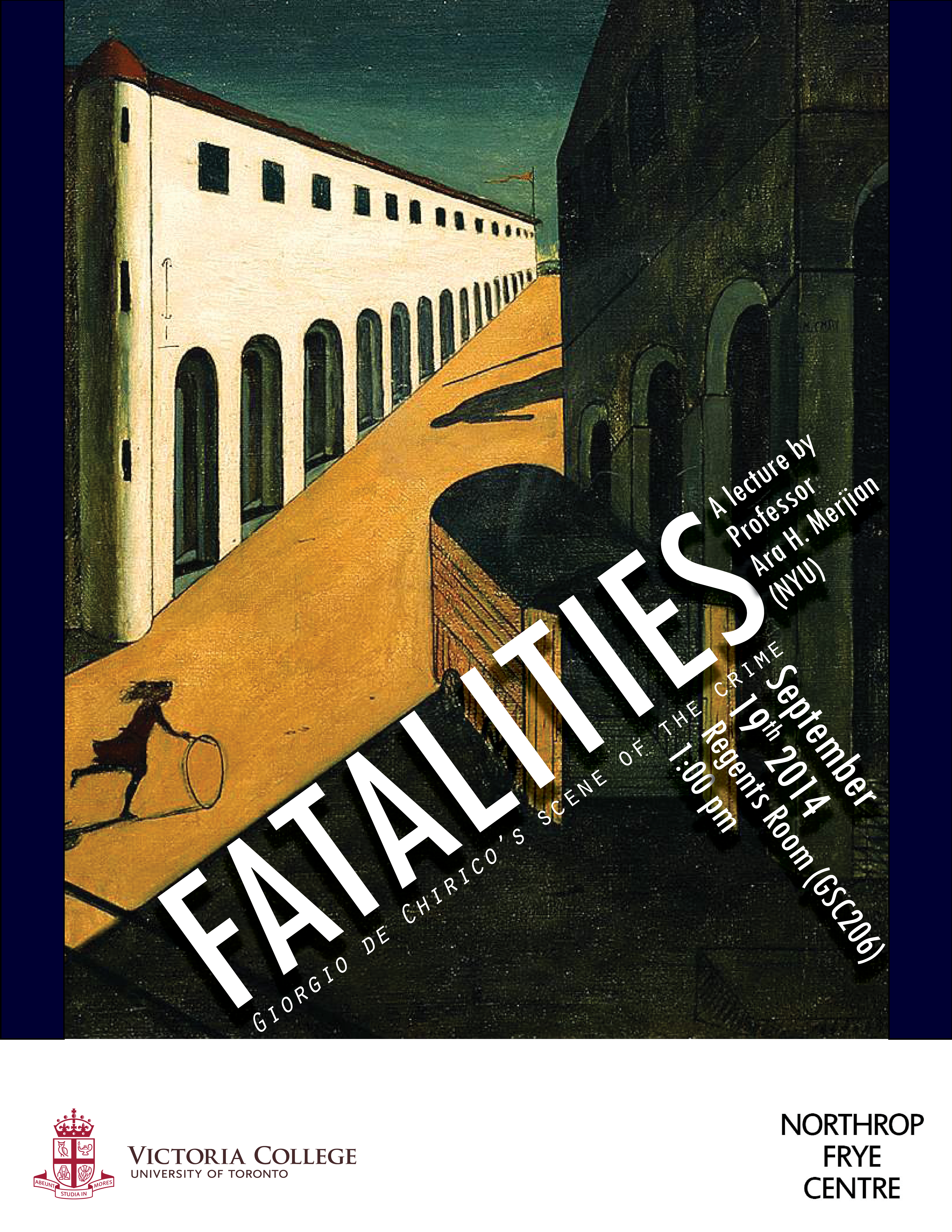
Fatalities: Giorgio de Chirico’s Scene of the Crime
Sep. 19, 2014
Public lecture
Speaker: Ara H. Merjian (New York University)
Prof. Ara Merjian’s paper on the artist Giorgio de Chirico, a painter of evacuated city spaces and fragmented narratives in and around their disquieting structures, examined the rapport between de Chirico’s paintings from pre-war Paris and the roman policier – the crime genre upon which the painter himself drew, and to which his images have contributed in turn. The talk ranged from the pulp fiction of the Fantômas series to the contemporary photography of Eugène Atget, and the Surrealist movement in considering de Chirico’s work.
About the speaker
Ara Merjian is Associate Professor of Italian Studies at New York University, and affiliated with the Institute of Fine Art and the Department of Art History.
Sep. 25, 2014 | The Force of Fiction | William Egginton
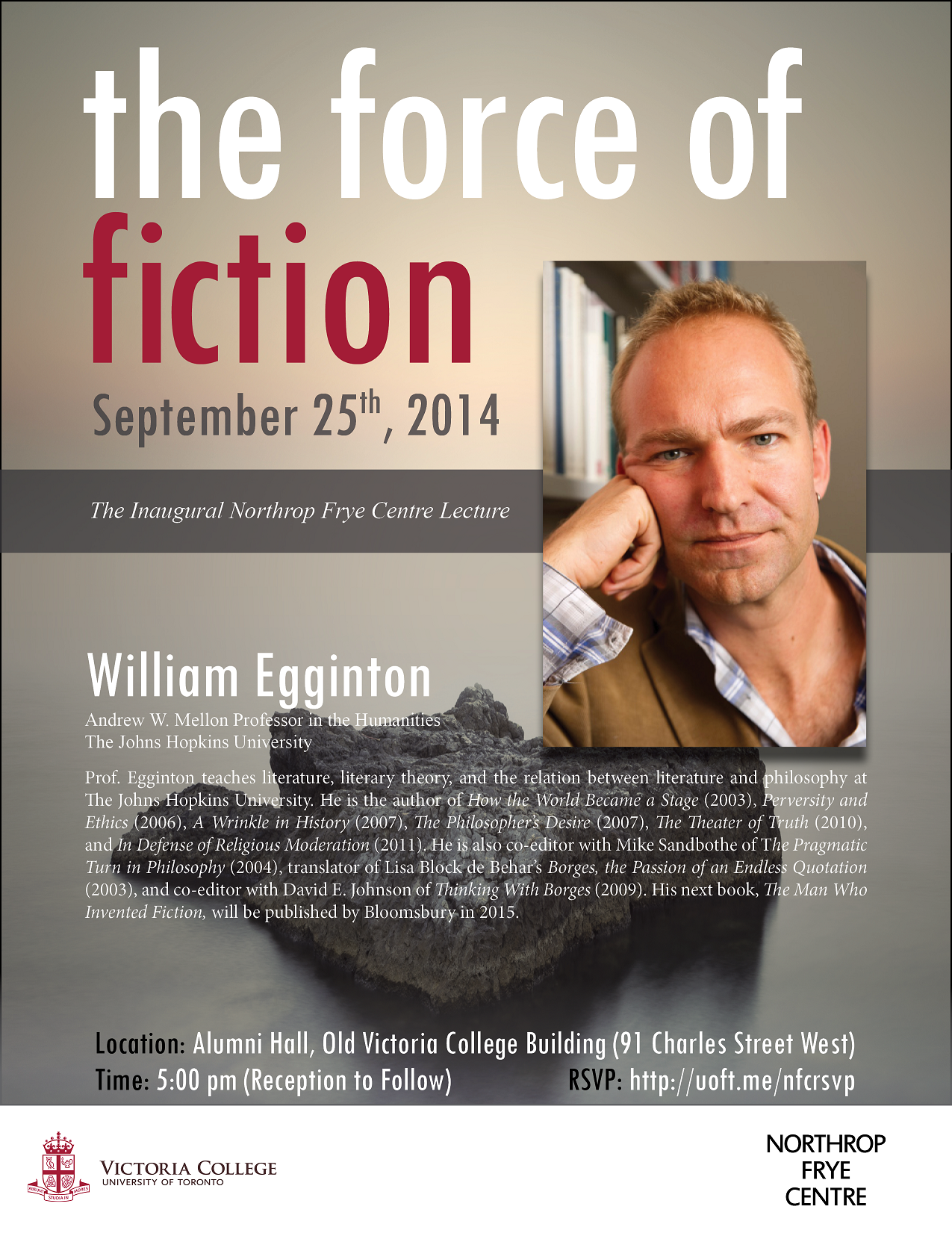
The Force of Fiction
Sep. 25, 2014
Inaugural Northrop Frye Centre Lecture
Speaker: Willliam Egginton (Johns Hopkins University)
The evening of September 25th marked the inaugural “Northrop Frye Centre Lecture” as part of the Centre’s revitalization. Prof. William Egginton delivered a talk entitled “The Force of Fiction” to a packed Alumni Hall, Old Victoria College Building. The lecture interrogated theories of fiction in an attempt to elucidate the force of fiction, both in its potential for synchronizing beliefs and behaviour as well as in its capacity to disrupt conformity and usher in new truths. Its scope ranged from discussions of fiction and character in Plato, Aristotle, Boccaccio, and Frye to the Konstanz School of Reception Aesthetics in addition to tackling Rabelais’s Gargantua and Pantagruel and Cervantes’s classic, Don Quixote.
About the speaker
William Egginton is the Andrew W. Mellon Professor in the Humanities, and Chair of the Department of German and Romance Languages and Literatures at Johns Hopkins University. His most recent book, The Man Who Invented Fiction will be published by Bloomsbury in 2015.
Oct. 15, 2014 | Apocalypse and Alchemy | B.W. Powe
B.W. Powe‘s Marshall McLuhan and Northrop Frye: Apocalypse and Alchemy
Oct. 15, 2014
Book Launch
Speaker: B.W. Powe (York)
On October 15th, The Northrop Frye Centre proudly presented the launch of B.W. Powe's much-anticipated Marshall McLuhan and Northrop Frye: Apocalypse and Alchemy, published by University of Toronto Press. The event featured a multimedia presentation and conversation with poet, novelist, essayist and philosopher B.W. Powe and award-winning author and critic, Philip Marchand.
About the speaker
B.W. Powe is an Associate Professor of English at York University, and director of its Creative Writing Program.
Oct. 29, 2014 | Looking for Marshall McLuhan in Afghanistan | Rita Leistner
Rita Leistner’s Looking for Marshall McLuhan in Afghanistan
Oct. 29, 2014
Book Launch
Speaker: Rita Leistner (artist and photo journalist)
On October 29th, the Northrop Frye Centre hosted a celebratory launch for Rita Leistner’s Looking for Marshall McLuhan in Afghanistan. The work uses the optics of literary criticism to create a bridge between the literary and the photographic, between "writing" and "writing with light" to propose a theory toward understanding this moment in history when smartphones and war first collide. In this way, Looking for Marshall McLuhan in Afghanistan sheds light on old and new technologies, on a failed war, and on what connect us as humans. Rita Leistner is an award-winning artist and photojournalist, and an Associate of Victoria College.
Nov. 4, 2014 | The Victoria College Fellows Soirée
The Victoria College Fellows Soirée
Nov. 4, 2014
Celebration of the Northrop Frye Centre
This collegial event, presented by the NFC and the Victoria College Fellows Committee celebrated the Centre’s revitalization and toasted a successful Fall term. Held at the home of Prof. Ken Bartlett, it was a chance for Fellows to socialize off-campus and helped promote collegiality.
Jan. 23, 2015 | Geographies of Violence | Colin Rose
Geographies of Violence: Mapping Homicide Trends Across Time and Space, Bologna, 1600—1700
Jan. 23, 2015
NFC Doctoral Fellow Lecture Series
Speaker: Colin Rose
The recent rise of the “digital humanities” has led historians to develop new research tools and methods that incorporate computers’ ability to analyze, manipulate and display large quantities of data of varying types. This talk argued that Geographic Information Systems, or GIS digital mapping, not only helps historians to visualize and present historical data, but also to analyze it, compare it, and, ultimately, to use it. Utilizing his own research on homicides in 17thcentury Bologna, NFC Doctoral Fellow Colin Rose demonstrated how historical GIS can contribute to our understanding of social history by analyzing documentary evidence through geospatial and temporal cartography.
Feb. 5, 2015 | City Maps, Poetic Bodies | Joanne Leow
‘It's paper, paper, maps’: City Maps, Poetic Bodies
Feb. 5, 2015
NFC Doctoral Fellow Lecture Series
Speaker: Joanne Leow
In a period dominated by the use of city maps from GPS to blueprints, and in the work of urban planners and property developers, maps have become the dominant way that we understand and experience space. Through her talk, NFC Doctoral Fellow Joanne Leow’s demonstrated the role of the literary in the production of urban spaces and how we negotiate our way around the city through various layers of histories, memories, and the present. Reading texts from transnational cities like Singapore, Vancouver, and Toronto through the lens of spatial theory, Leow examined how human sociality and complexity can intervene in the capitalist city.
By pairing literary readings of poems with condominiums, verses with architecture, and stanzas with ruins, Leow forces the question of how literature might alter the ways in which we dwell in space beyond maps.
Feb. 9, 2015 | Changeable Conditions
Changeable Conditions: British Writing About the Weather, 1700-1795
Feb. 9, 2015
NFC Doctoral Fellow Lecture Series
Speaker: Morgan Vanek
How, in the space of a century, did weather turn from a force that governs the mind and marks the body into a force that could be mitigated by more forward-thinking governance? In what ways does this shift in thinking affirm the changing political and economic priorities of the British Empire during a period of imperial expansion? In this talk, Vanek tracked the change in writing about the weather in the fifty years before the beginning of the Anthropocene and explored how eighteenth-century writers leveraged the threat of environmental influence to both justify a British right to govern all over the world and to establish the limited view of human agency that continues to underpin contemporary debate about the reality of climate change.
Mar. 6, 2015 | Archipelagos of Empire | Stephanie Malia Hom
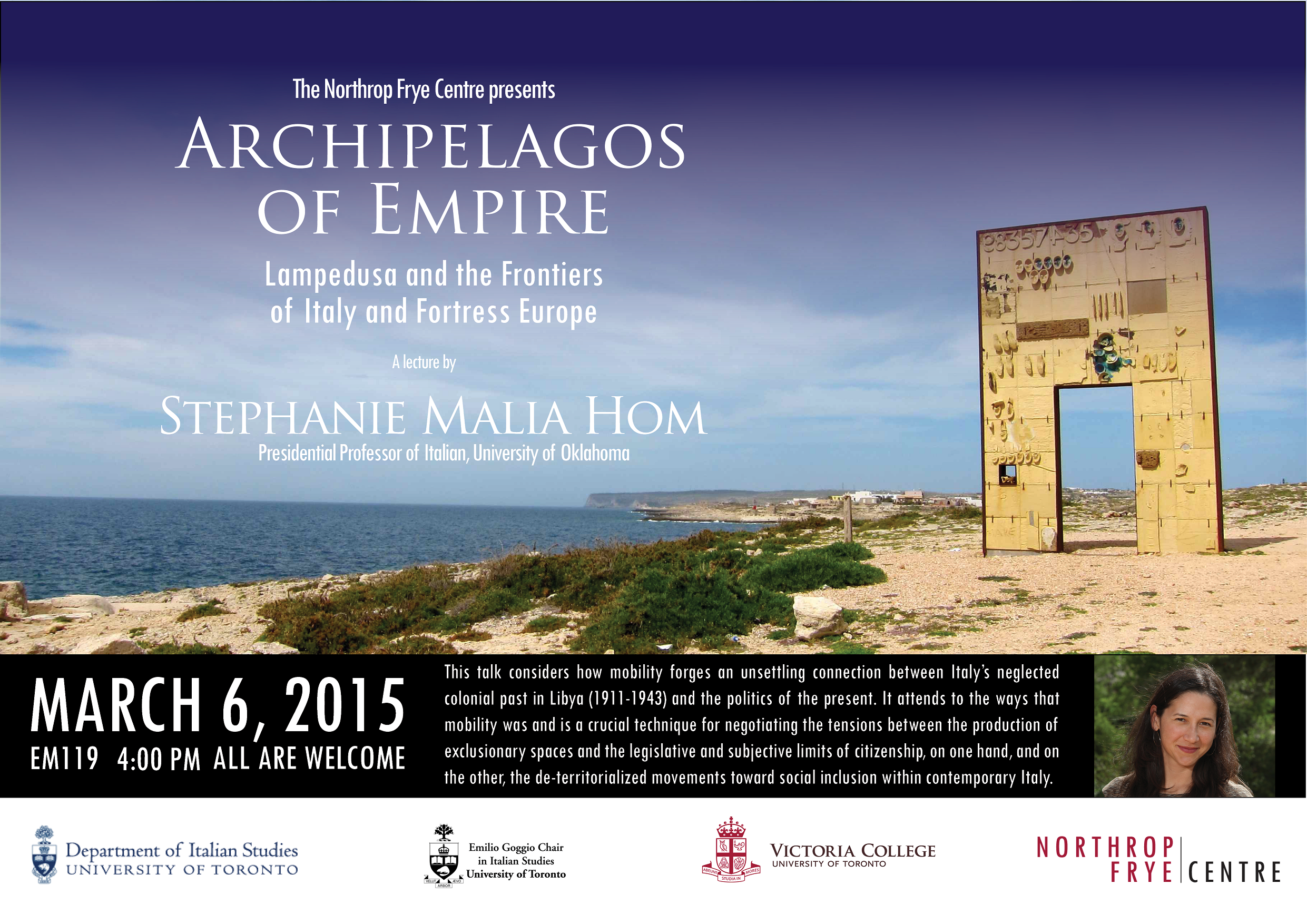
Archipelagos of Empire: Lampedusa and the Frontiers of Italy and Fortress Europe
Mar. 6, 2015
Public Guest Lecture
Speaker: Stephanie Malia Hom (University of Oklahoma)
Prof. Stephanie Malia Hom’s public lecture on Lampedusa, the centre of contemporary Italy’s immigration crisis, if not Europe as a whole, considered how mobility forges an unsettling connection between Italy’s neglected colonial past in Libya (1911-1943) and the politics of the present. It considered the ways that mobility was and is a crucial technique for negotiating the tensions between the production of exclusionary spaces and the legislative and subjective limits of citizenship, on one hand and the de-territorialized movements toward social inclusion within contemporary Italy on the other.
About the speaker
Prof. Malia Hom is currently the Marta Sutton Weeks Fellow at the Stanford Humanities Center, while on sabbatical from her position as Presidential Professor of Italian at the University of Oklahoma. She is the author of The Beautiful Country: Tourism & the Impossible State of Destination Italy, published by University of Toronto Press in 2015.
